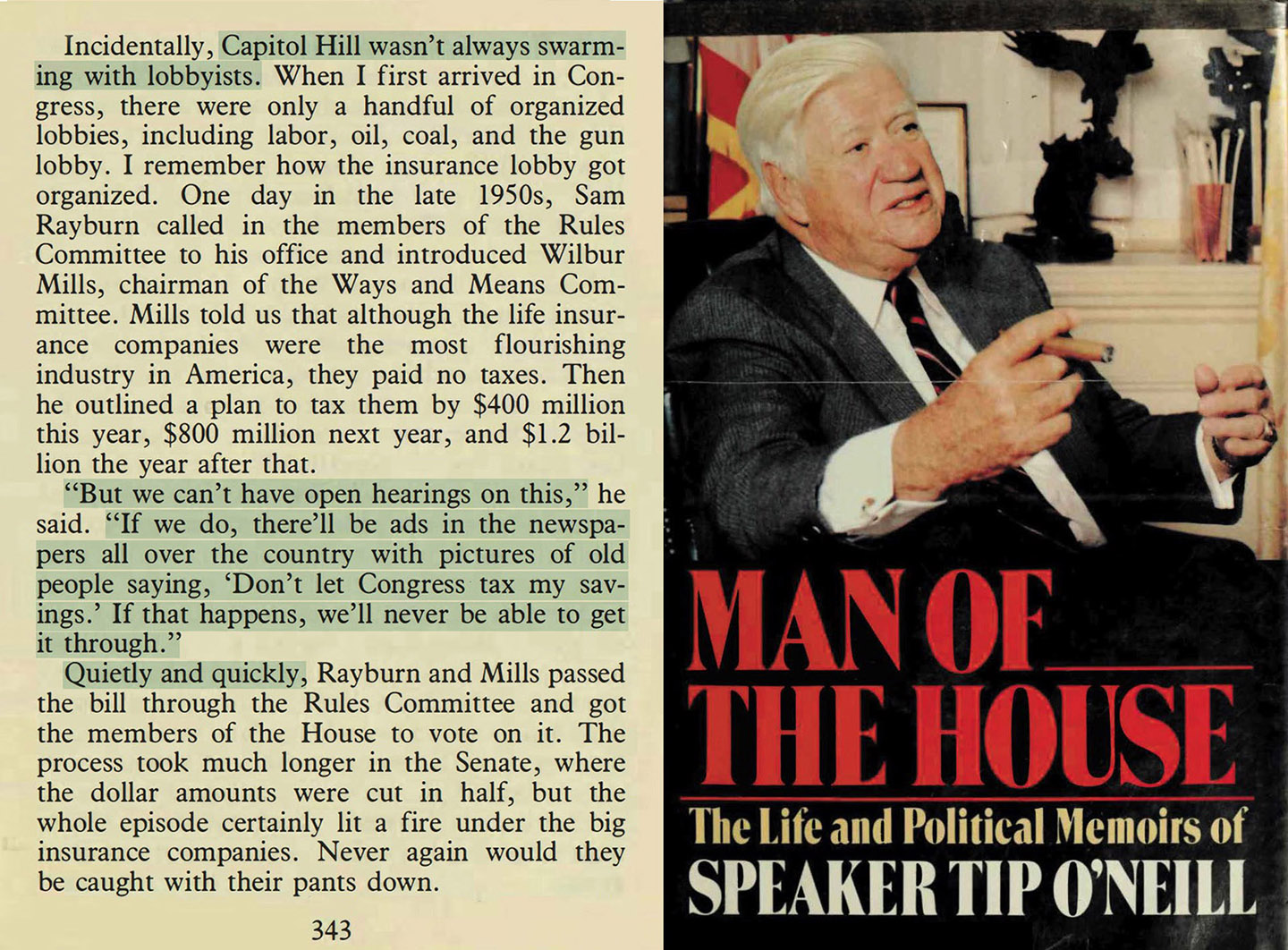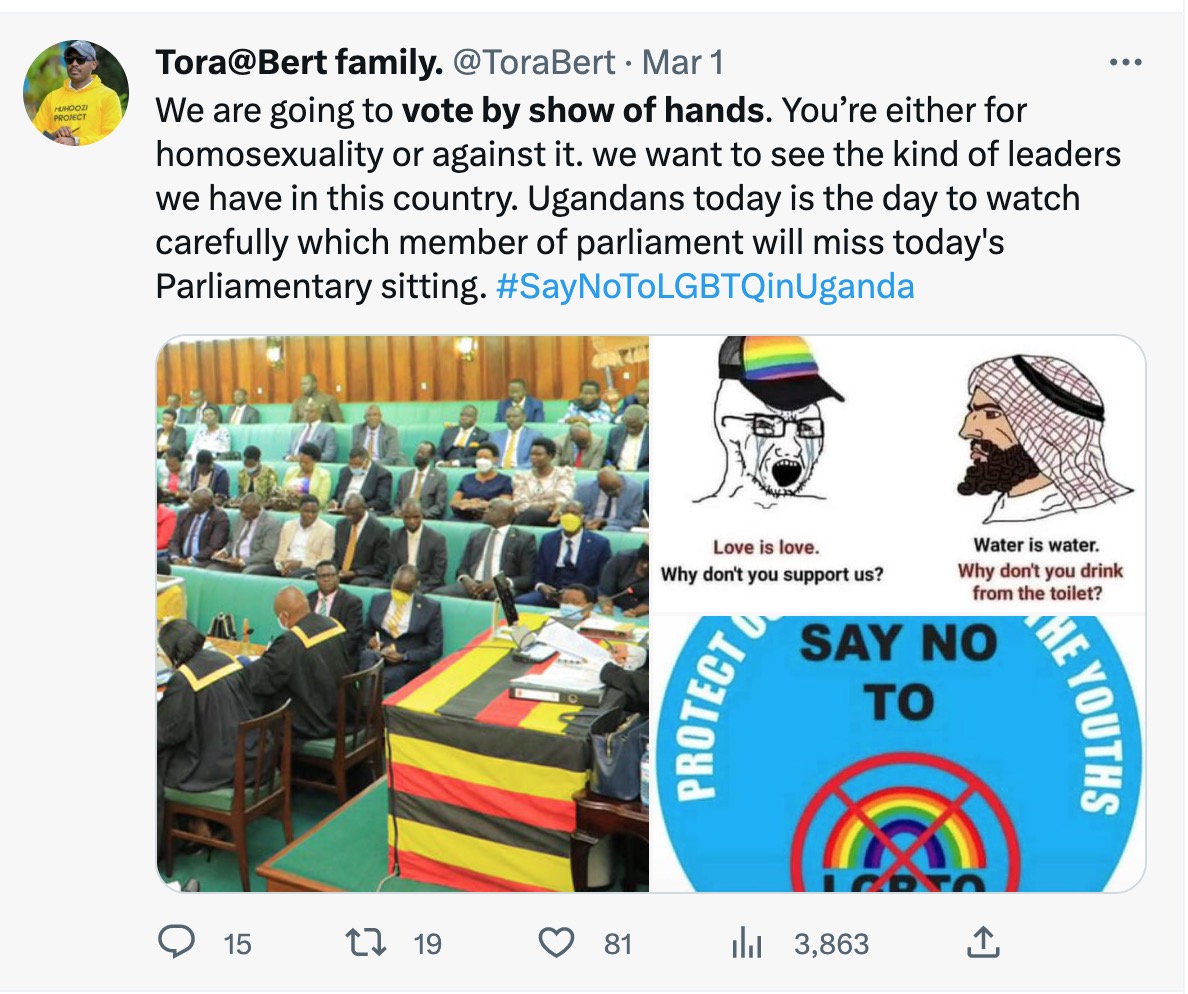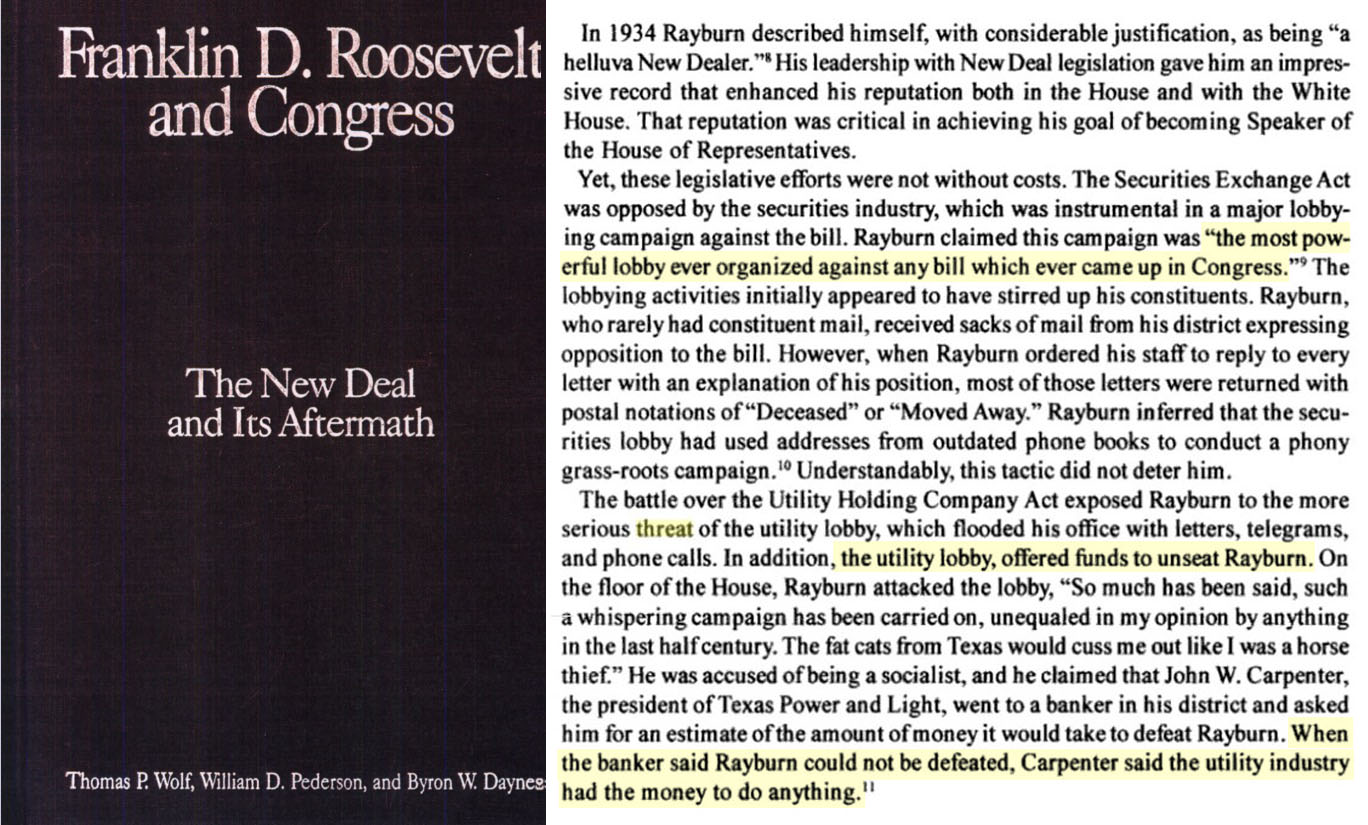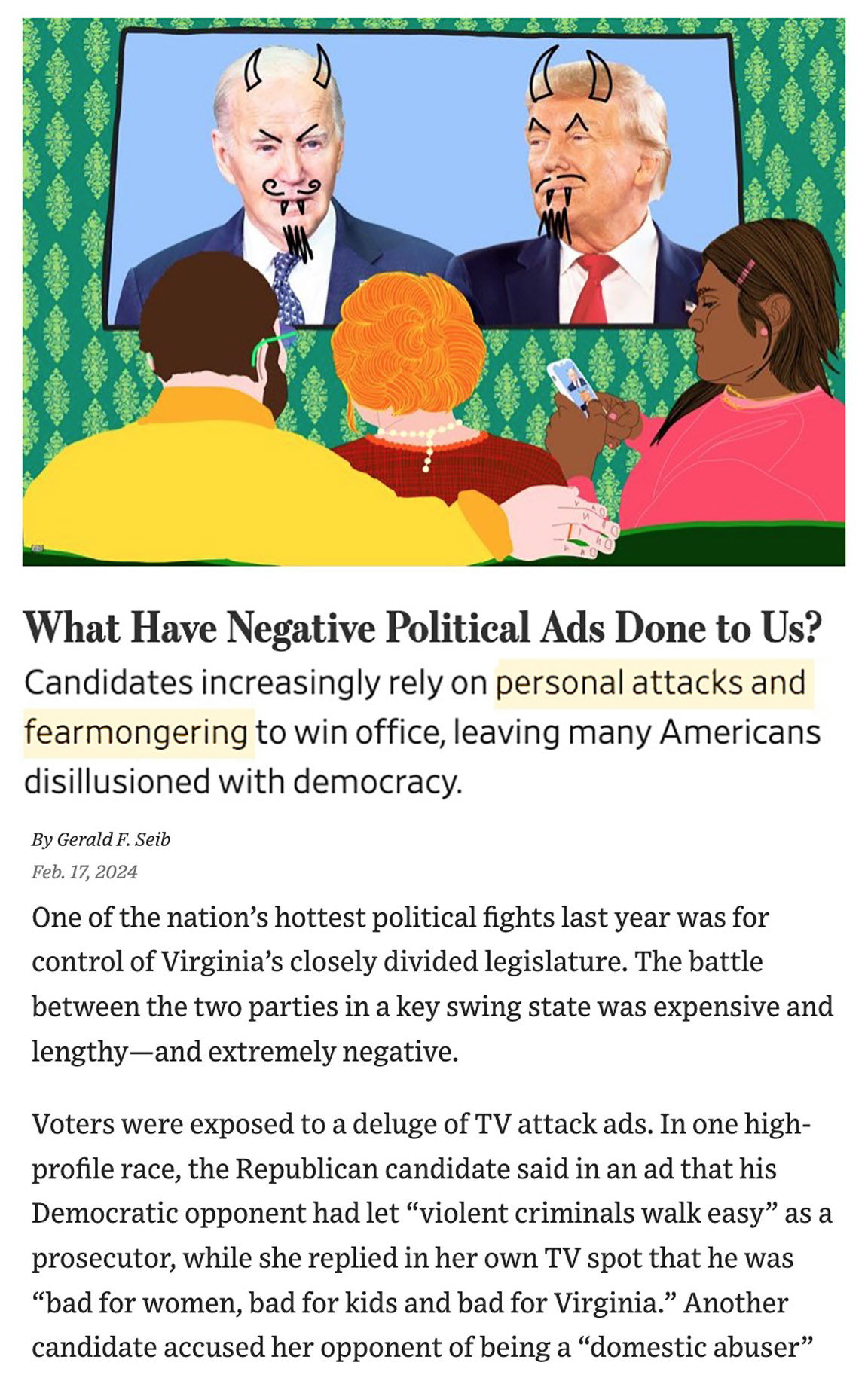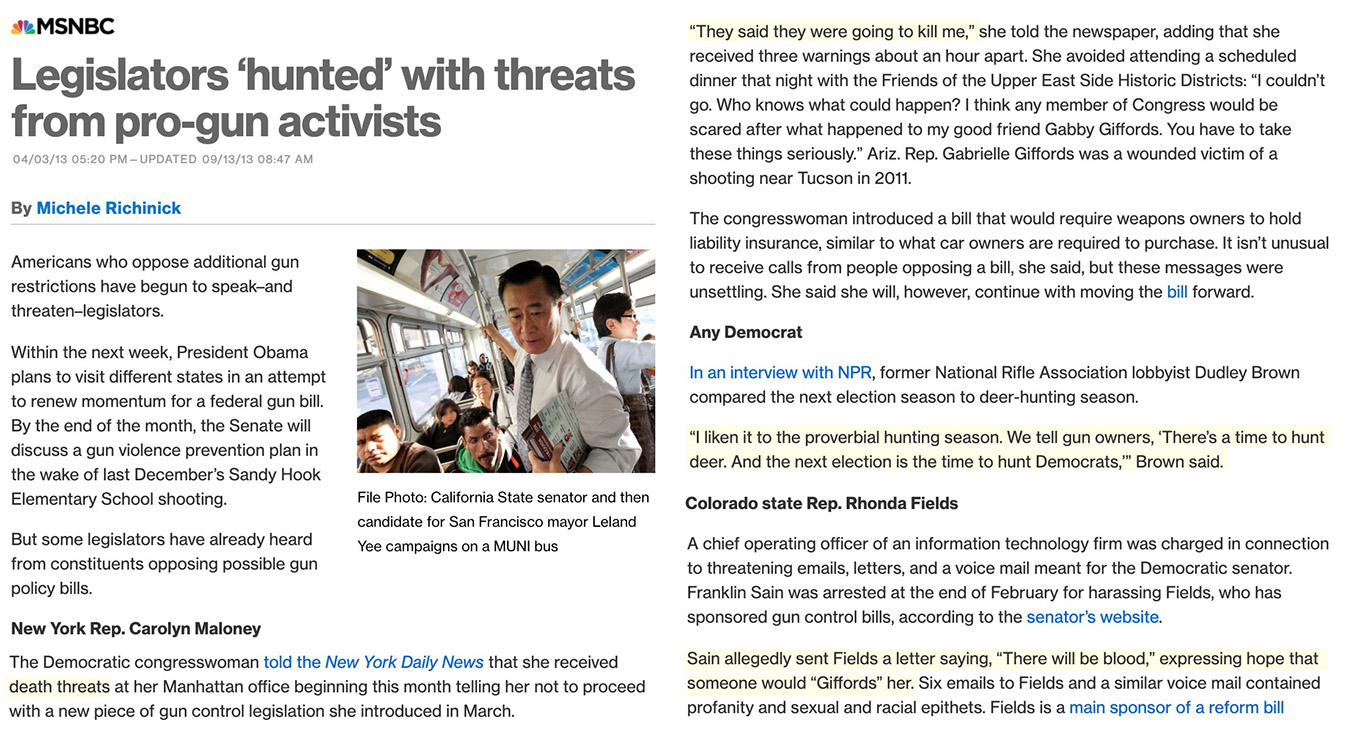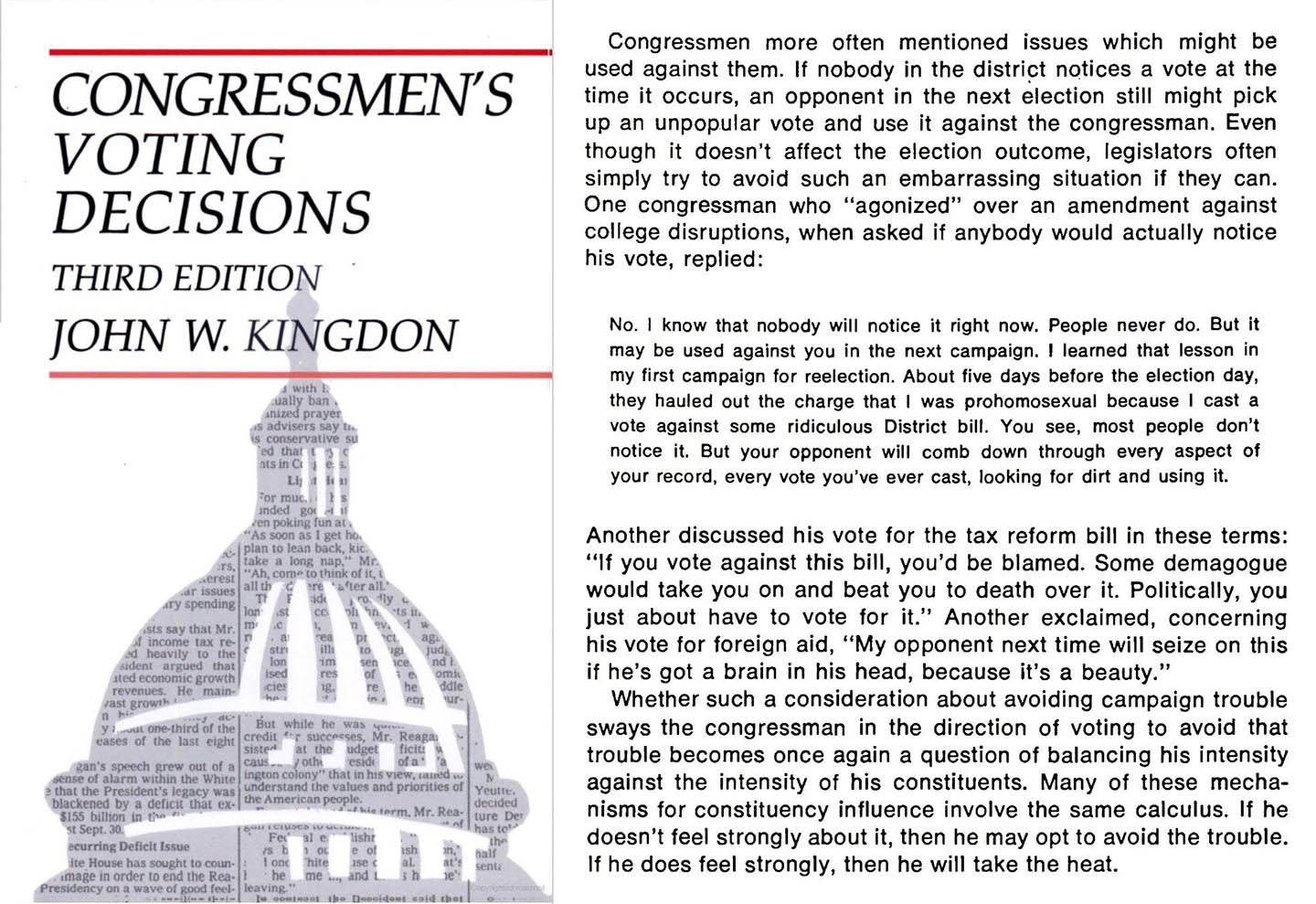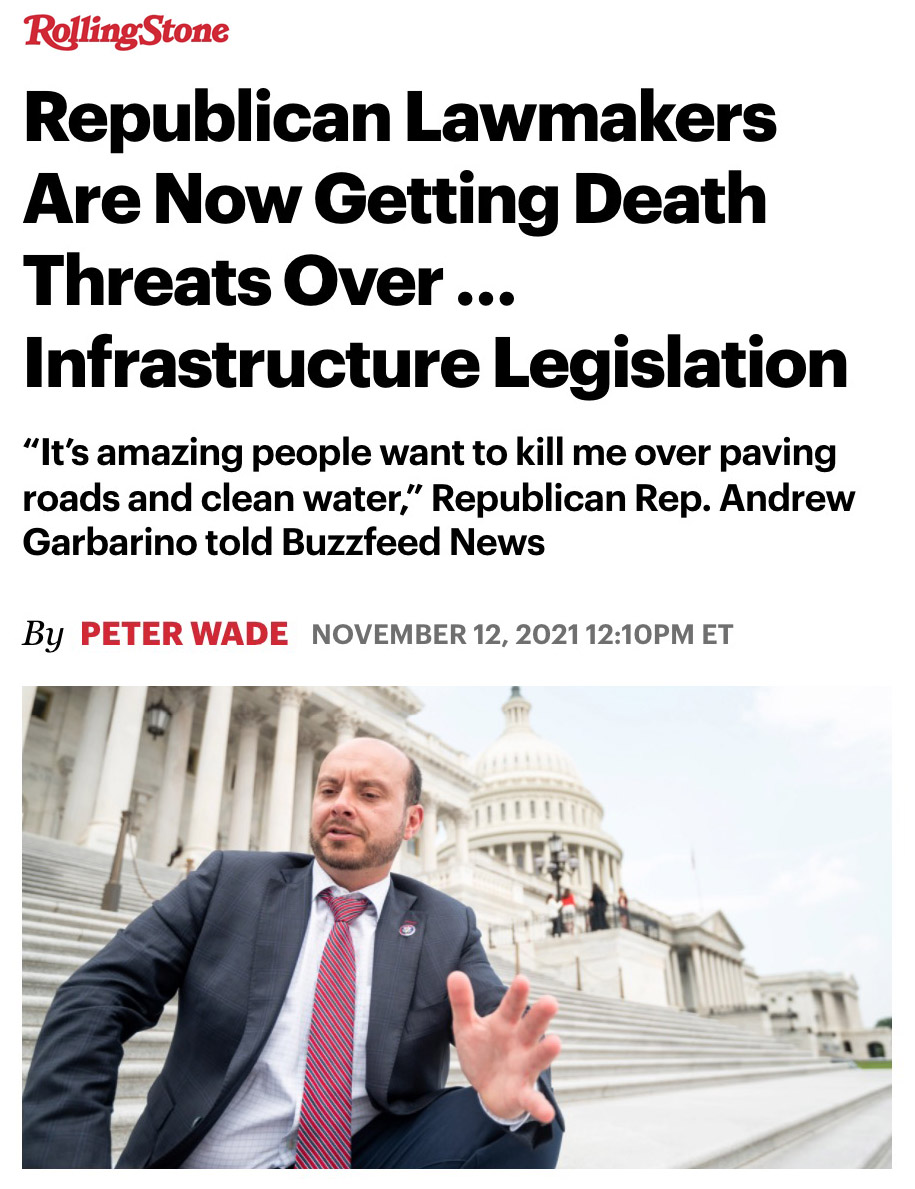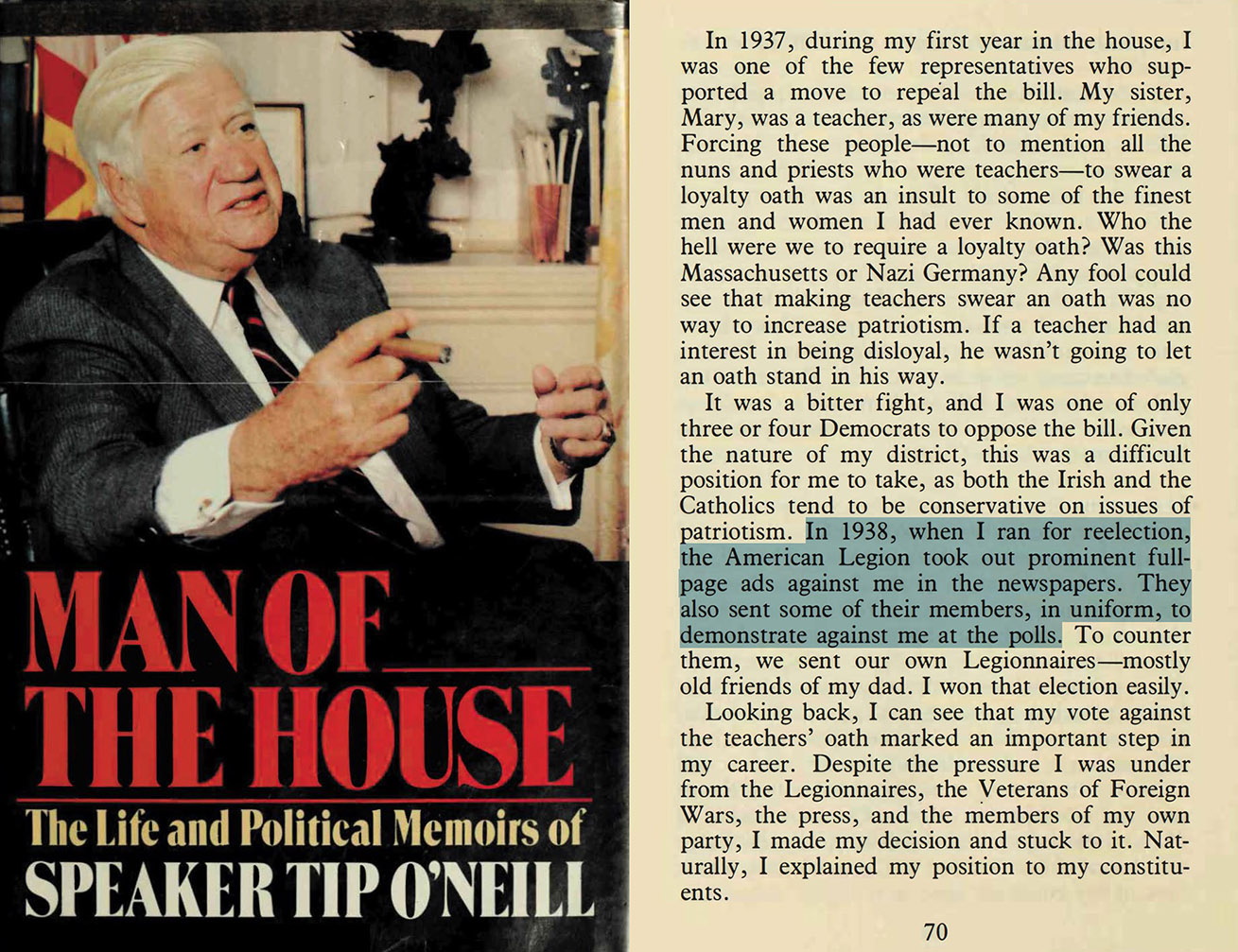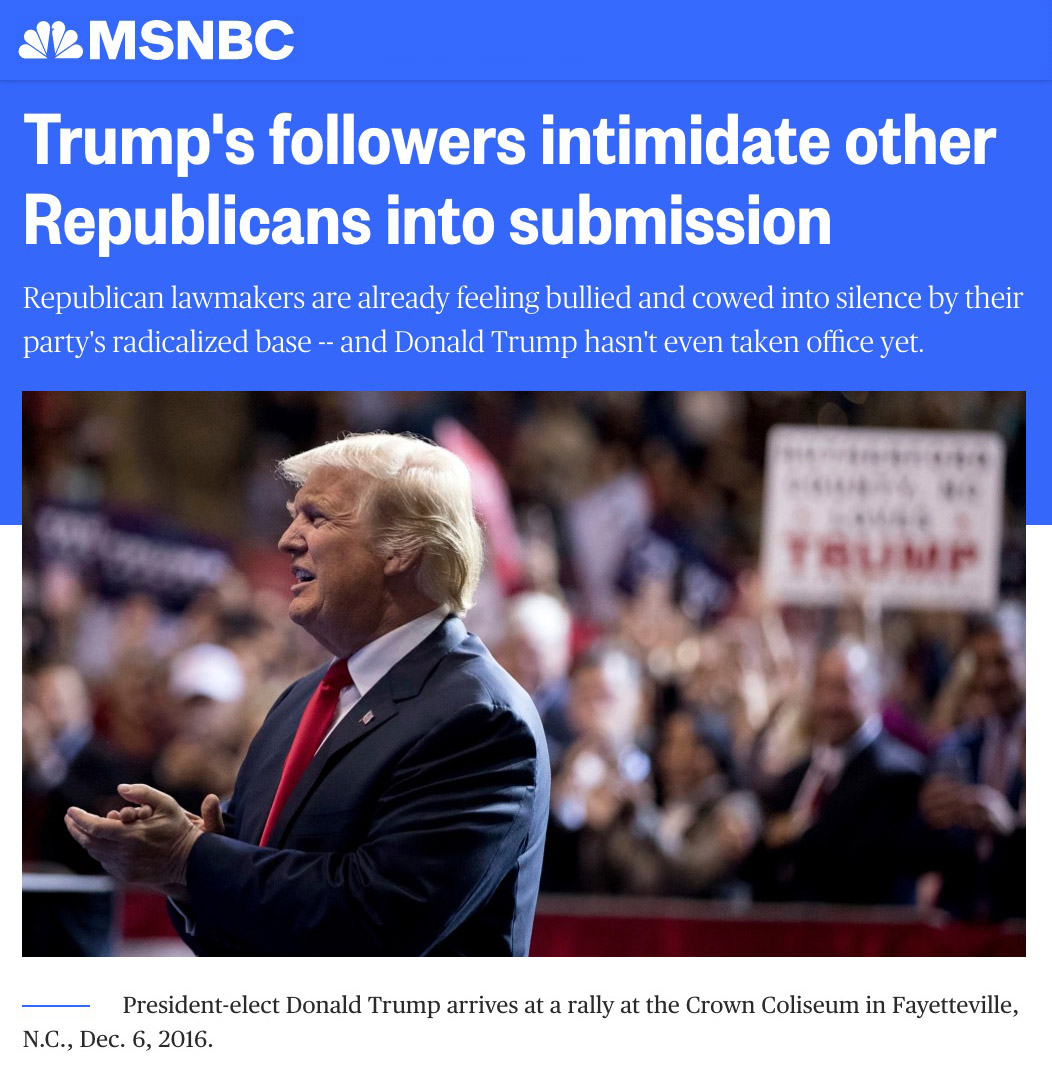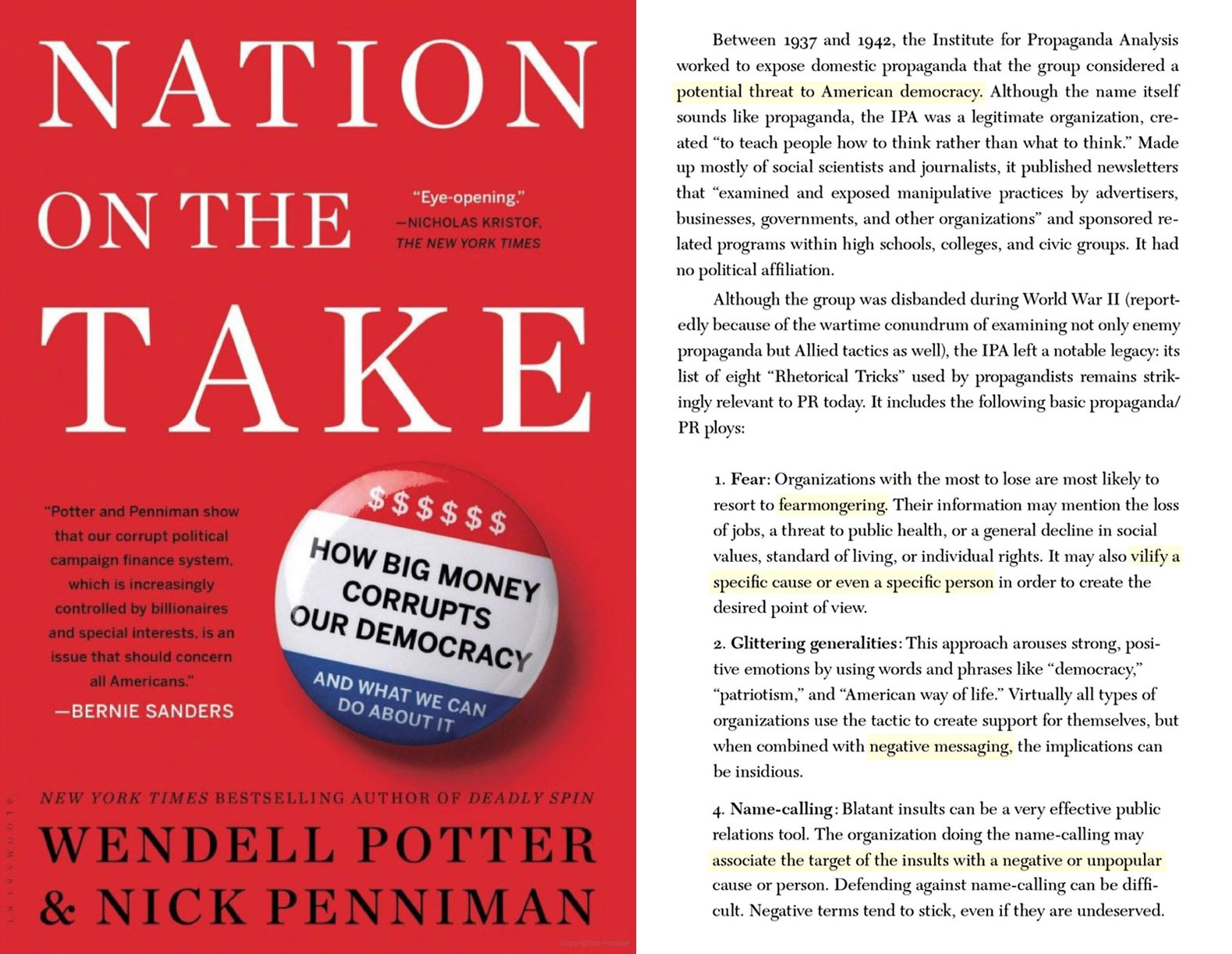500+ Academic Citations
Introducing Brubery:
Bribery’s Evil Twin
The Politics of Intimidation
Introducing Brubery: Bribery’s Evil Twin
In 1950, Edgar Lane published his study on how lobbyists influence policy makers. His conclusion - members are threatened, not bribed.
Despite the press’ obsession with the various (and rare) occurrences of bribery, the same dynamic is true today. Intimidation and threats are the currency of government. In a world where euphamisms like ‘arm-twisting’ abound, political money is overwhelmingly spent on attack ads, opposition research, and threats. Campaign finance is threatened as a form of challenger funding or spent to purge disenting voices.
Because this principal use of money in government has no name, we had to give it one – brubery. Where bribery refers to an exchange (cash or favors granted for policy outcomes), brubery is the opposite. With brubery, money is used as a cudgel or threat, and when cash or favors are distributed, they are directed away from the intended political actor - who receives nothing more than threats, attacks or even violence.
In its most common form, wealthy groups threaten attack ads or challenger funding, yielding results often without spending anything at all. And when cash is released it overwhelmingly lands in the pockets of media giants via advertising. Thus, brubery is best viewed as a form of intimidation or bloodless political assassination.
This means that challengers often receive support not because of who they are, but who they aren’t. And because funders aren’t looking to change the challengers’ voting behavior, scholars end up ripping their hair out trying to find causal quid-pro-quo links that don’t exist.
The goal of brubery is to change the behavior of political actors by threatening their demise. And challenger funding, attack ads, smear campaigns, funded ‘grass roots’ protests, and push polls are often combined (or merely threatened) in low-budget primary takedowns of even powerful national politicians. These actions provide fantastic economical leverage for even moderately wealthy groups. And unlike bribery, the targeted political actor is rarely the only victim of this fear. For example, the celebrated public takedown of individual political actors by the NRA generate fear in many (or most) other political actors.
Given that 95% of dark money is used to purchase attack ads, brubery is likely the principal driver of corruption in government. Yet, by mistakenly assuming that campaign money falls under a form of bribery, many scholars fail to see how this process works. Bribery (the donation of cash for political favors) is exceedingly rare and brubery is rife. A simple google search for ‘attack ad’ shows the extent of this problem. Even overt death threats are far more common than bribery.
This debunking of bribery jives even with the data concerning legislator wealth. Despite what the public and press suggest, we find that adjusting for just two factors (age and education), legislator net worth is broadly in line with the wealth of median voters. Only through the lens of brubery does this make sense, as the billions spent on attack ads and challenger campaigns fill the coffers of media giants – not the pockets of politicians.
Insidiously, brubery is often enacted on the cheap as a form of whispered or implied intimidation. Corporations and groups often reap rewards by simply threatening to carry out negative attack ads or fund primary challengers. Police unions work as powerful lobbyists, threatening legislators with inaction and rising crime. Big oil overwhelms primaries with cash to take out moderate incumbents like Bob Inglis. Amazon and Google threaten to pull jobs from one state and move to another. Presidents threaten to campaign against marginal Senators, etc. The effects of these threats (often implied) are seismic, resulting in a system where corrupt policy goals can be achieved without spending anything at all.
Thus, even in a world dominated by campaign finance, powerful interests (via threats) often end up paying less for policy outcomes. And, the more wealth one possesses, the less one needs to spend to achieve results.
By James D’Angelo – January 4, 2025
Introducing Brubery: Bribery’s Evil Twin
In Shakespeare’s Richard III, the angry King shouts out in fury “I’ll make a corpse of him that disobeys.” This sentiment is the essence of brubery. Instead of attempting to win the favor of his opposition via gifts, bribes or kindness, King Richard threatens their destruction.
Centuries later, Richard III’s sentiment has come full circle. Along with the rise of congressional transparency – via the sunshine laws of the 1970s – came an equal surge in negative advertising. Internally, this upended the dynamics of the legislative process as more and more amendments were proposed not to create better legislation but to put opposition members on record. Embarrassing, roll-call votes on hot-button issues (pornography, abortion, flag burning, crime, etc.) are the foodstuff of negative ads and political control.
Observing this pernicious dynamic, Senator Tom Daschle remarked “negative advertising is the crack cocaine of politics.” In short, politicians aren’t bought (despite a smattering of examples of real bribery), they are terrorized. They don’t profit from corruption, they are just another of the victims.
Here we present citations (with links to original sources) on this problem of brubery which highlights the power of intimidation (not legalized bribery) to control policy. For citations on the broader problem of transparency click here, with respect to how partisanship is driven by transparency click here. For citations on weaponized transparency (another major driver of partisanship) click here. For more on this six-year study on the pitfalls of all forms of legislative transparency browse the papers and talks on this site.
Citations
It might be possible for the interest group to secure the same favours, not by contributing, but simply by threatening the incumbent with a donation to the challenger.Nicolas Motz 2015
Parties, Interest Groups, and Political Outcomes
Now, wealthy interests don’t even need to spend their money to buy results — the mere threat of a super PAC attack campaign can do the trick.J. Adam Skaggs 2013
Blame the Role of Money
A special interest group’s threat of contributing $1 dollar to the opponent can induce the same level of support to the special interest policy as an actual $1-dollar contribution.Marcos Chamon & Ethan Kaplan 2013
The Iceberg Theory of Campaign Contributions - Political Threats and Interest Group Behavior
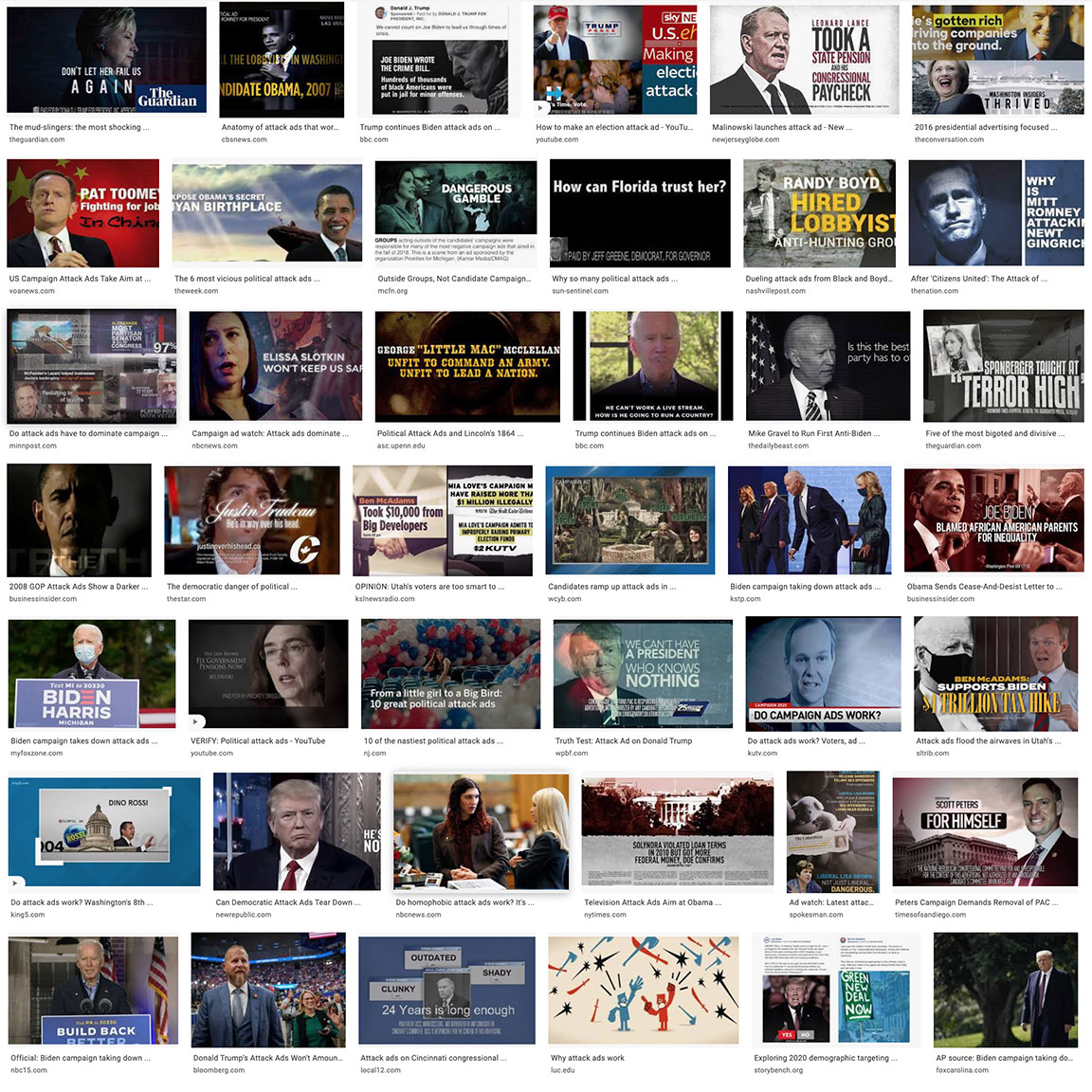
Google Search 2021 – “Attack Ads”
Note: Statistically bribery doesn’t exist on the federal level, but there are millions of examples of attack ads, slander and intimidation each year - the most salient of which are the primary use of dark money - attack ads.

Google Search 2021 – “Attack Ads”
If we target three or four liberals now, we’ll send a shiver down the spine of every other liberal in the Senate. They won’t dare oppose President Reagan’s policies. They know that if they do, they’ll have to pay the price at the polls.Lobbyist John “Terry” Dolan 1981
Who’s For the Hit List?
A recent study of campaign ads in the 2012 presidential race was headlined, “Presidential Ads 70 Percent Negative in 2012, Up from 9 Percent in 2008”. One of the reasons for this is the 1100% increase in spending by interest groups, 86% of which has gone for negative advertising. Restore Our Future, Inc., for example, spent $42.5 million on independent expenditures between 2011 and 2012, of which 93.5% was spent on negative ads.Rep. Charles A. Gonzalez 2012
Congressional Forum Reviewing the Impact of Citizens United
Although only 10% of advertisements aired in the 1960 campaign were negative, in the 2012 campaign only 14.3% of aired ads were positive.Conor M. Dowling and Yanna Krupnikov 2016
The Effects of Negative Advertising
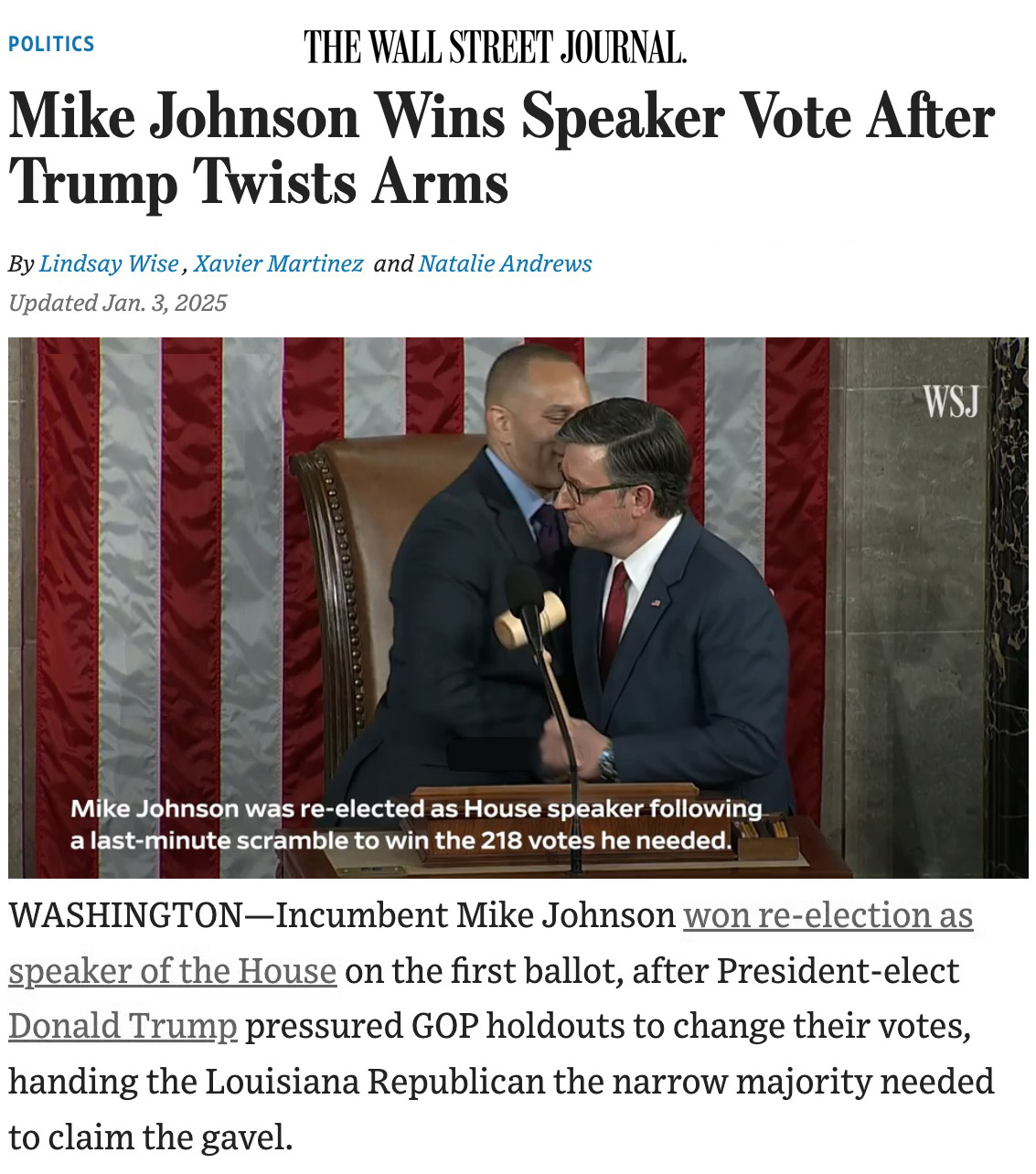
Lindsay Wise, Xavier Martinez, Natalie Andrews 2025 - Mike Johnson Wins Speaker Vote After Trump Twists Arms
Text: Incumbent Mike Johnson won re-election as speaker of the House on the first ballot, after President-elect Donald Trump pressured GOP holdouts to change their votes, handing the Louisiana Republican the narrow majority needed to claim the gavel.

Lindsay Wise, Xavier Martinez, Natalie Andrews 2025 - Mike Johnson Wins Speaker Vote After Trump Twists Arms
Impeachment votes should be held in secret. They’re too ripe for intimidation.Matthew Cooper 2022
Should Impeachment Votes Be Cast in Secret?
When the Koch brothers’ big money comes in and bombs you in a small Republican primary election, it’s pretty scary. When the paid-for rightwing attack machine turns its chatter-guns on you in your Republican primary, that can be pretty scary.Sheldon Whitehouse 2017
Captured
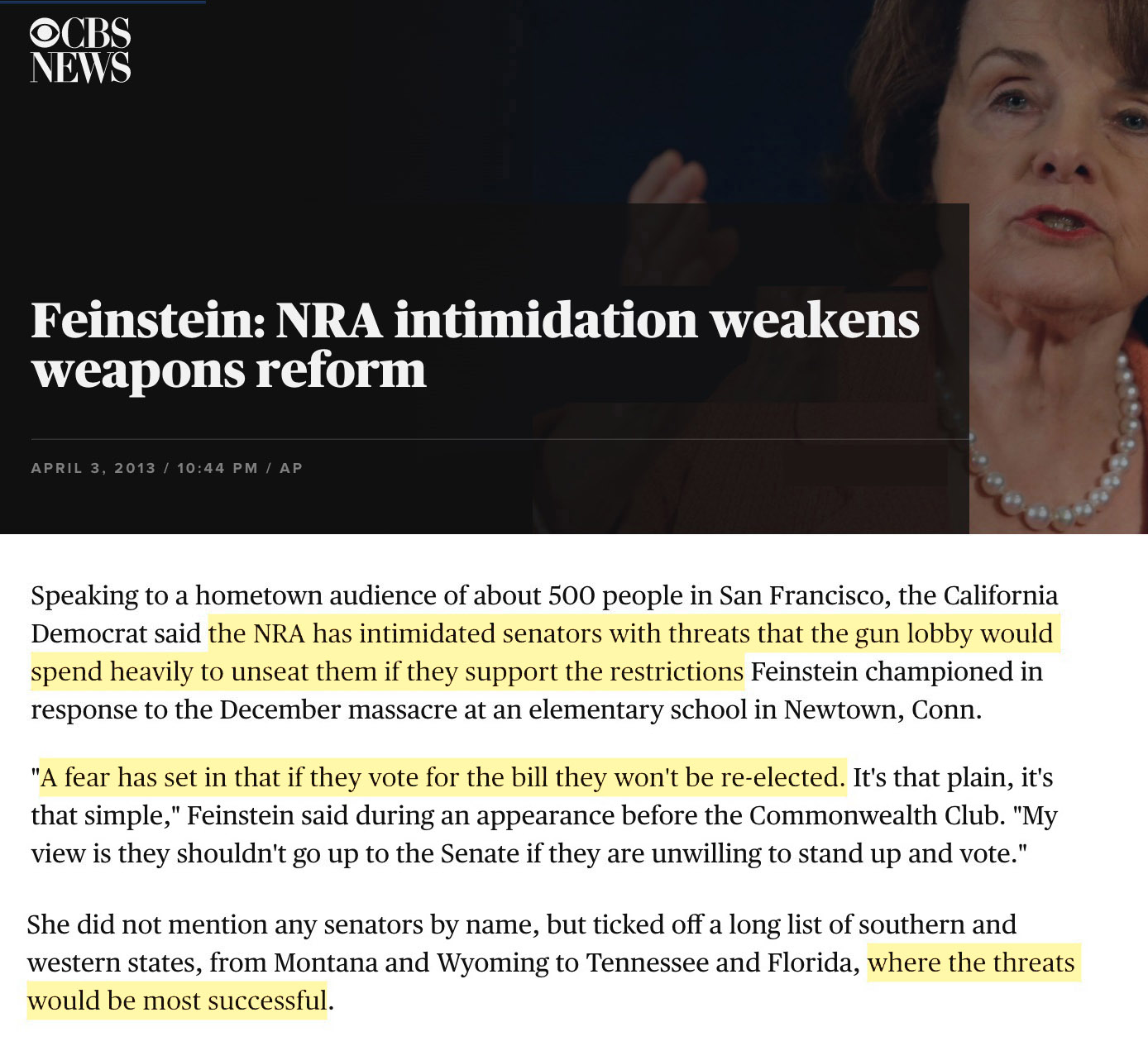
CBS News 2013 - NRA intimidation weakens weapons reform

CBS News 2013 - NRA intimidation weakens weapons reform
The threat is plain: step out of line, and here come the attack ads and the primary challengers – all funded by the deep pockets of the fossil fuel industry.Sheldon Whitehouse 2017
Captured
The thing to do is to give the money to the candidate’s “super PAC,” where no limits apply, to pay for attack ads against the candidate’s opponent.Editorial New York Times 2014
The Line at the ‘Super PAC’ Trough
For those Congressmen and Senators who did try to take an independent line there was swift reaction both from Trump himself who denounced his Republican critics as RINOs and from the threat of well-funded primary challenges.Gillian Peele 2022
Developments in American Politics
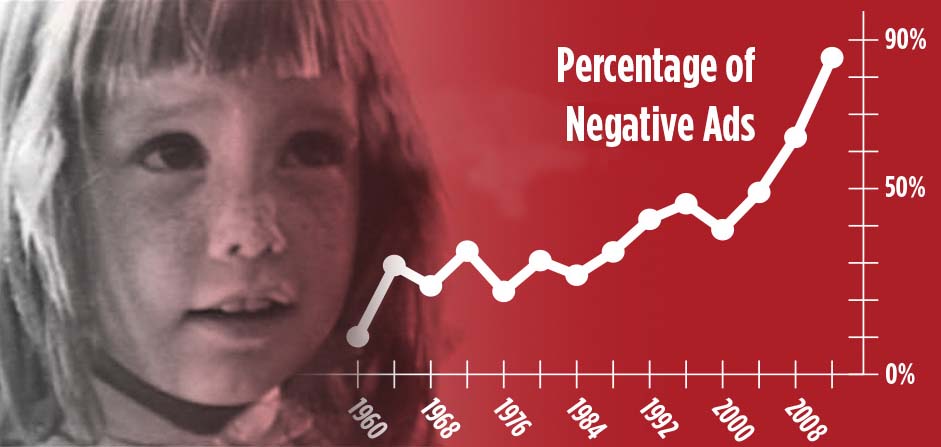
Mitchell Lovett 2016 - When campaign ads go low, it often works

Mitchell Lovett 2016 - When campaign ads go low, it often works
The ethics report noted “strong-arm tactics” in which the lobbying firm threatened to withdraw financial support or encourage businesses to relocate out of a member’s district.Jeremy Pelofsky 2010
Ex-lobbyist indicted for illegal campaign donations
Trump and his allies spent 81 percent of their ad dollars on invective against Harris and Tim Walz. Less than 1 percent went to ads touting the former president’s accomplishments or policy proposals.Gus Wezerek 2024
Trump’s Extraordinarily Negative TV Ads
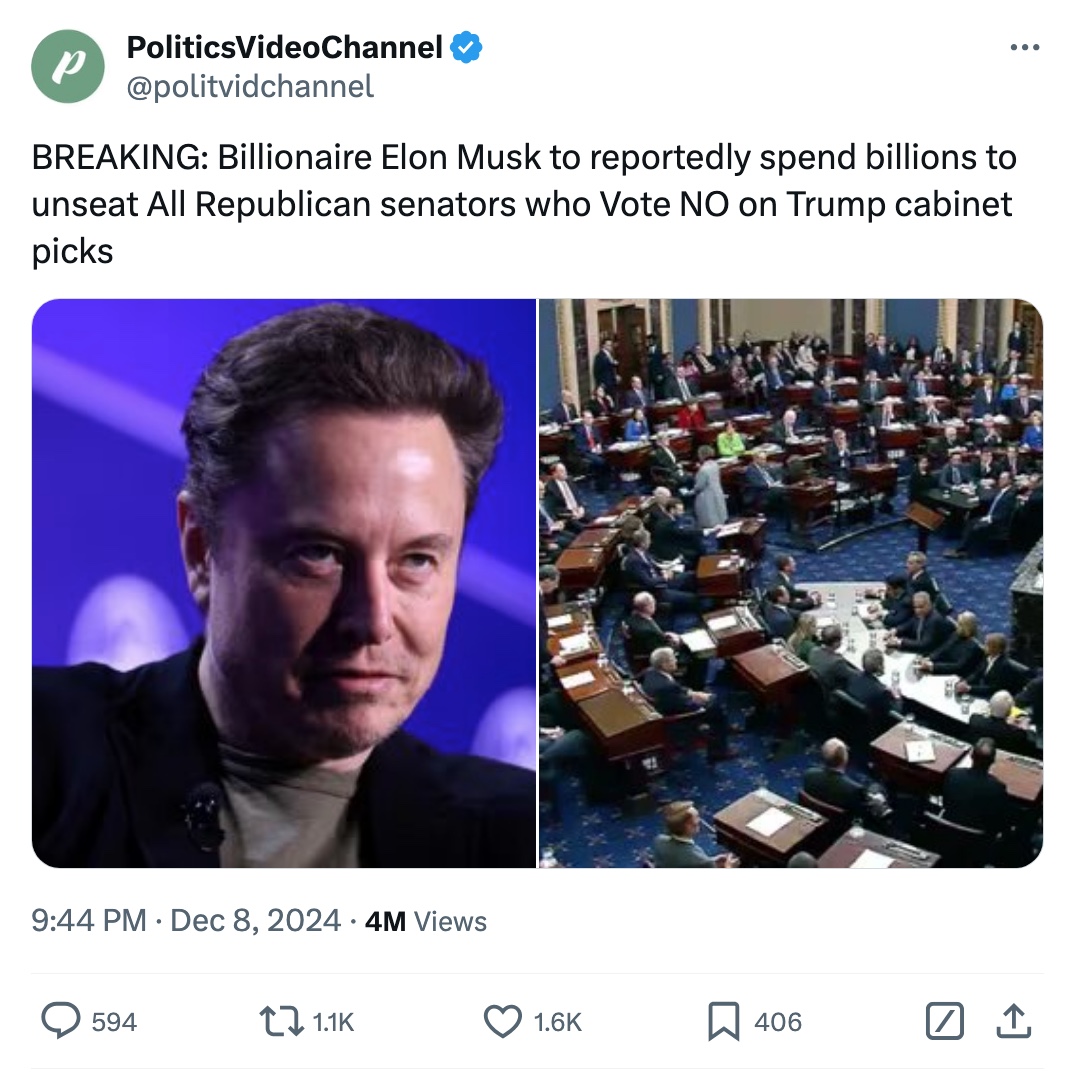
Twitter 2024 - Threatening member’s votes
Text: BREAKING: Billionaire Elon Musk to reportedly spend billions to unseat All Republican senators who Vote NO on Trump cabinet picks

Twitter 2024 - Threatening member’s votes
The NRA activated its playbook – denouncing the legislation, alerting its members and threatening lawmakers.Frontline 2015
Gunned Down
Observable donations are just a limited fraction of the ones that interest groups threaten to make, so that the influence of donors to legislators is much bigger than the observed amount of contributions.Alberto Parmigiani 2021
The Negative Agenda Power of Campaign Contributions: Evidence from U.S. Congress
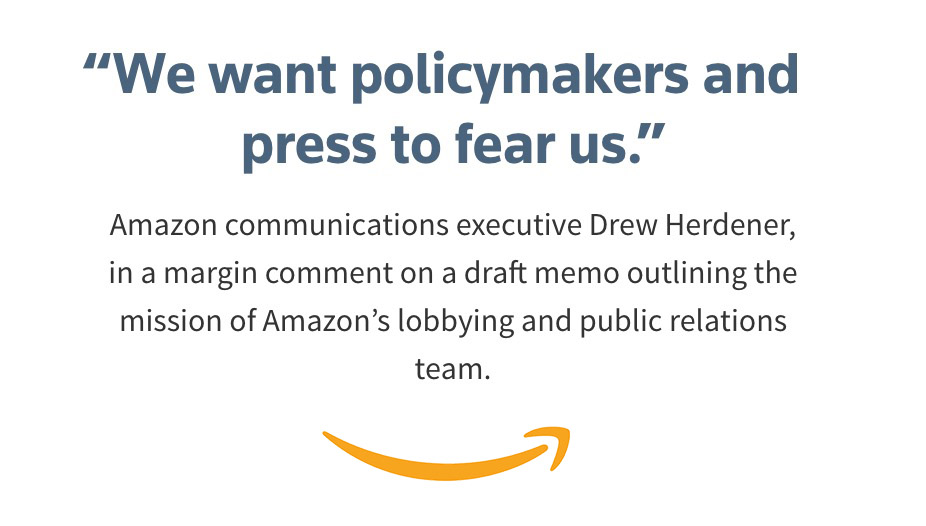
Jeffrey Dastin 2021 - Amazon Wages Secret War

Jeffrey Dastin 2021 - Amazon Wages Secret War
According to Advertising Age, over $450 million were spent in the 1986 House and Senate races. And over 50% of that amount was spent in negative political advertising.Karen S. Johnson-Cartee & Gary Copeland 2013
Negative Political Advertising
Coupled with these new techniques of lobbying came another that perhaps was more important than all the others. Actually, in a way, it was the aim of all the others: the implicit threat to hurt the re-election of those Representatives not responsive to the lobby's wishes… Neil MacNeil 1963
Forge of Democracy
Some allies have kept lists of Republicans who have been critical of Trump in a bid to block them from getting jobs in a second term, according to a person with knowledge of the list. “You have a lot of people who want to come back in, but we remember what people have said in the past,” one longtime Trump ally said.Josh Dawsey & Michael Scherer 2024
Republicans fear they will be targets in Trump’s retribution campaign

Trump Threatens Republicans Who Don’t Help Him Exact Vengeance 2023

Trump Threatens Republicans Who Don’t Help Him Exact Vengeance 2023
Since the recent threat by the Colombian underworld, more than 550 lower-court judges in Bogota resigned temporarily, Suarez said. This decade, 220 judges, magistrates and judicial employees have been killed, including Justice Minister Rodrigo Lara Bonilla in 1984. The current justice minister, Monica de Greiff, 32, and her 3-year-old son, Miguel Jose, also have been threatened.Fuszara Forero 1989
Fear of Assassination Remains a Fact of Life for Many
[Before the passage of the 1970 Legislative Reorganization Act] If an amendment is defeated in the Committee of the Whole, it is virtually impossible to get a roll call vote on it later when the Committee rises and the House goes back into regular session, preparatory to taking final action on a bill. As a result, Representatives can vote for crippling amendments to bills which they then vote for on final passage – and their constituents are none the wiser. This secret voting has an ancient history. In Britain in the 17th century, the House of Commons evolved it as a device to shield individual members from intimidation by King James I and King Charles I. When a difficult decision had to be taken, the House simply became a committee, the Speaker was excluded as a probable royal spy, and a vote was taken with no record kept. When the House of Representatives was organized in 1789, it took over this practice.William Shannon 1970
The House Decides to Stop Being So Secretive
Former President Donald J. Trump lashed out at Republicans in Congress while campaigning in Pennsylvania on Saturday, threatening members of his party who do not share his appetite for pursuing corruption investigations against President Biden and his family — and for retribution. “Any Republican that doesn’t act on Democratic fraud should be immediately primaried,” said Mr. Trump, to the roaring approval of several thousand supporters at the Erie Insurance Arena.Neil Vigdor 2023
Trump Threatens Republicans Who Don’t Help Him Exact Vengeance 2023
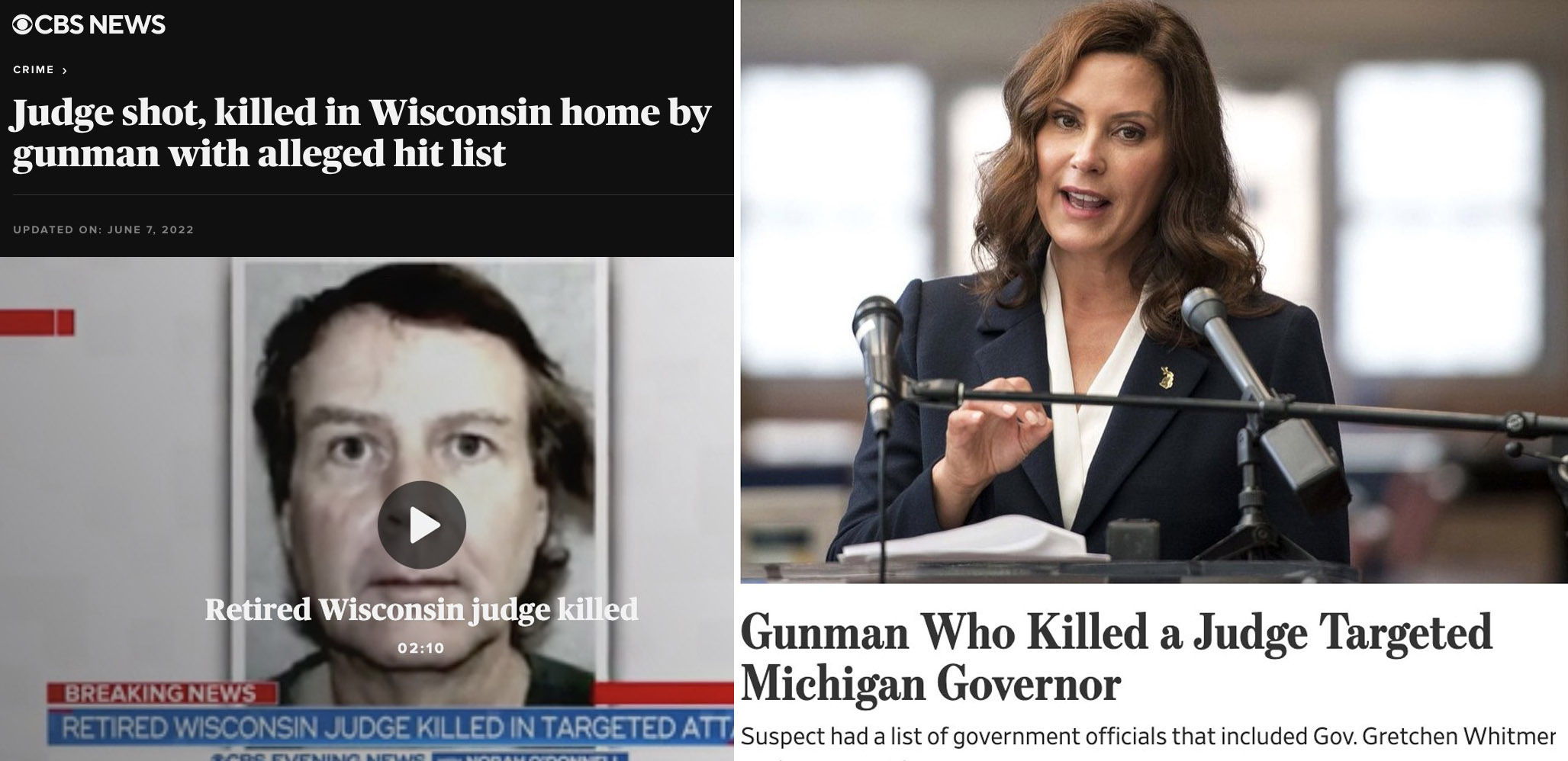
Gunman Who Killed a Judge Targeted Michigan Governor 2022

Gunman Who Killed a Judge Targeted Michigan Governor 2022
“I think the arm twisting was very intense. Committee assignments were threatened,” Huelskamp says. “Folks who received money from the NRCC were warned they may not receive that money again.”Lauren Fox 2013
‘Goosebumps Kind Of Day’ For New Members of Congress
We have glorious news from Tallahatchie. Seven tory submissionists were hanged there in one day; and the so-called Union candidates, having the wholesome dread of hemp before their eyes, are not canvassing the county.John Hill Aughey 1863
The Iron Furnace
“Unfortunately, not all actors engage in ‘informed criticism’ or anything remotely resembling it,” Roberts wrote. “I feel compelled to address four areas of illegitimate activity that, in my view, do threaten the independence of judges on which the rule of law depends: (1) violence, (2) intimidation, (3) disinformation, and (4) threats to defy lawfully entered judgments.” Public officials “regrettably have engaged in recent attempts to intimidate judges,” he wrote, by baselessly suggesting they were politically biased. Although he did not name any such officials, in 2018 Roberts rebuked Trump for complaining about an “Obama judge” who had ruled against him.Jess Bravin 2024
Chief Justice Says Intimidation and Violence Threaten Judicial Independence
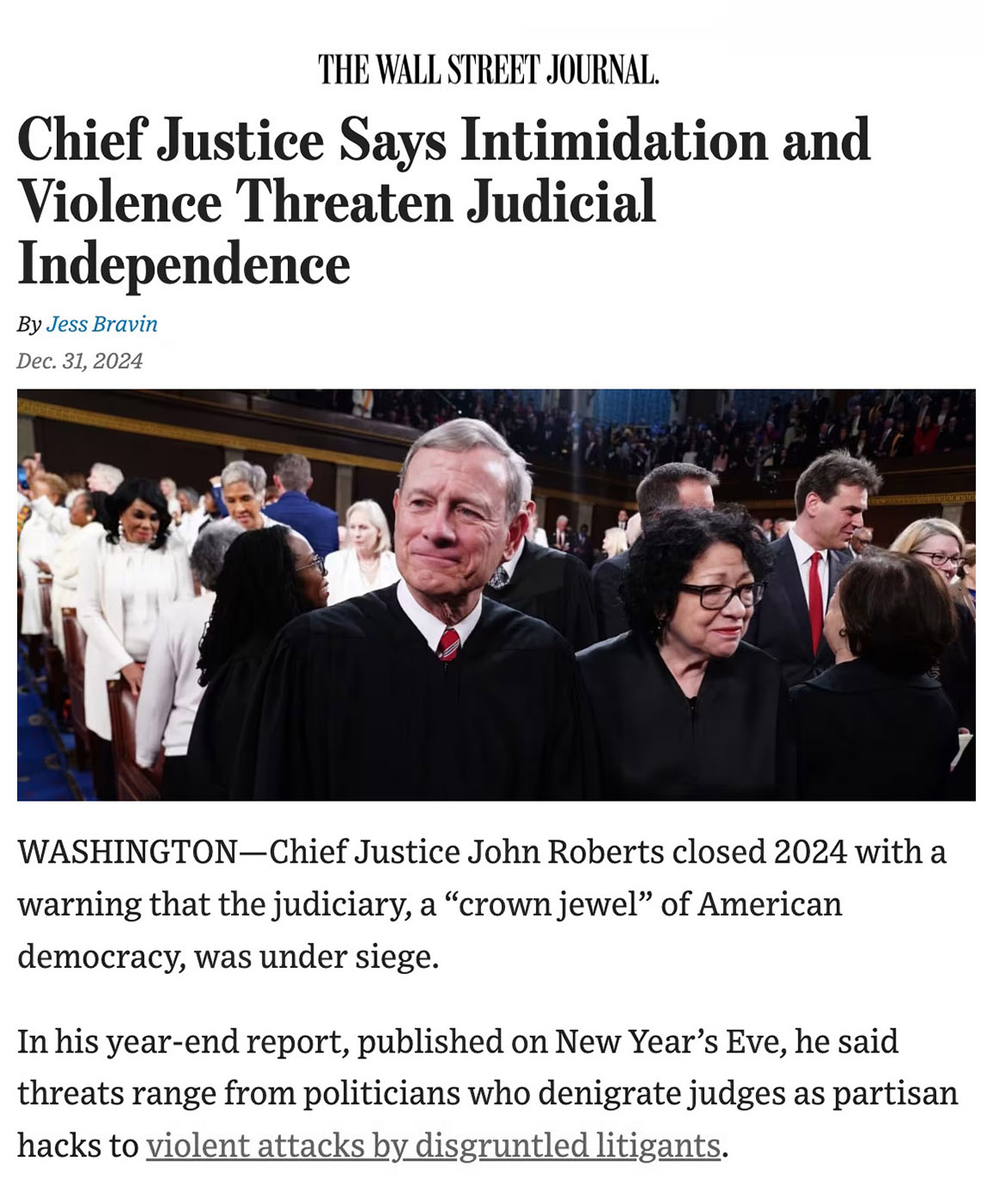
Jess Bravin 2024 - Chief Justice Says Intimidation and Violence Threaten Judicial Independence
Chief Justice John Roberts closed 2024 with a warning that the judiciary, a “crown jewel” of American democracy, was under siege. In his year-end report, published on New Year’s Eve, he said threats range from politicians who denigrate judges as partisan hacks to violent attacks by disgruntled litigants.

Jess Bravin 2024 - Chief Justice Says Intimidation and Violence Threaten Judicial Independence
It was now dangerous to utter a word in favour of the Union. Many suspected of Union sentiments were lynched. An old gentleman in Winston county was arrested for an act committed twenty years before, which was construed as a proof of his abolition proclivities.John Hill Aughey 1863
The Iron Furnace
The Chamber of Commerce holds members of Congress in vulnerable seats hostage and terrorizes them with threats of removal.Alyssa Katz 2015
The Influence Machine: The U.S. Chamber of Commerce and the Corporate Capture of American Life.
Entities may be exerting influence even in districts in which they haven’t spent money—because the fear of primary challenges sponsored by outside groups may lead representatives in deeply conservative districts to adopt hardline positions.Norm Ornstein 2013
The money behind the fiscal cliff hardliners
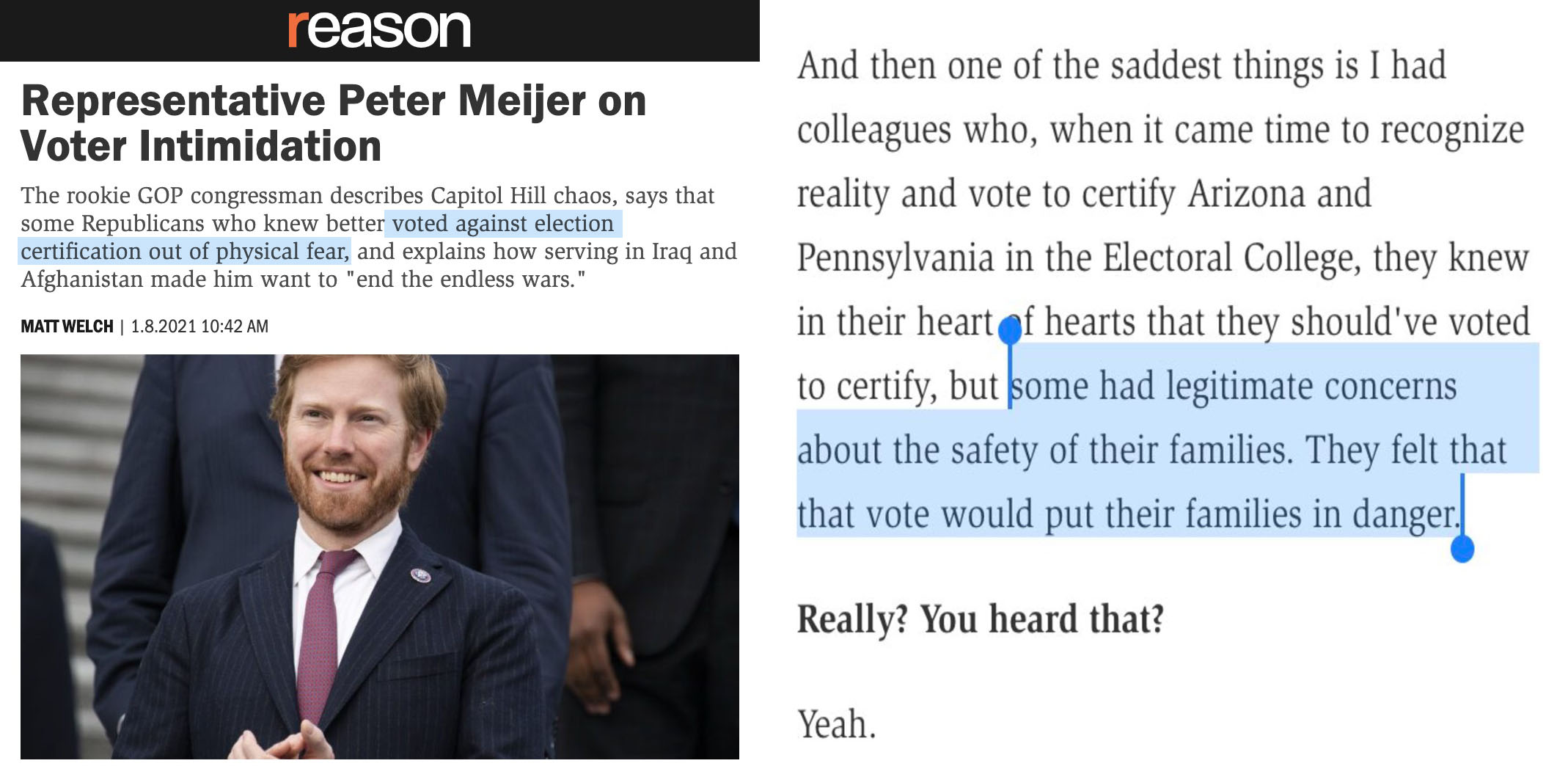
Rep Peter Meijer 2021 - Physical Intimidation
Meijer noted that some Republicans who knew better voted against election certification out of physical fear. QUOTE: “And then one of the saddest things is I had colleagues who, when it came time to recognize reality and vote to certify Arizona and Pennsylvania in the Electoral College, they knew in their heart of hearts that they should've voted to certify, but some had legitimate concerns about the safety of their families. They felt that that vote would put their families in danger.”

Rep Peter Meijer 2021 - Physical Intimidation
Today, we have the situation where there are threats based on individual votes. Ten thousand dollars may come in against you from one group because of a single vote.Rep. David Obey 1983
Politics and Money (Elizabeth Drew)
The sole purpose of unlimited campaign contributions is to coerce politicians into making choices they otherwise may not make.Robert J. Fontaine 2018
Congratulations, Maryland, for ‘flunking’ this test
Outside groups have also spent more money in Georgia this cycle than almost anywhere else. According to OpenSecrets, outside groups have spent $161.8 million in Georgia. Nearly $59.6 million has been spent against Republicans while $57.9 million has been spent against Democrats.Nick Whooten 2022
Money, money, money (Open Secrets)
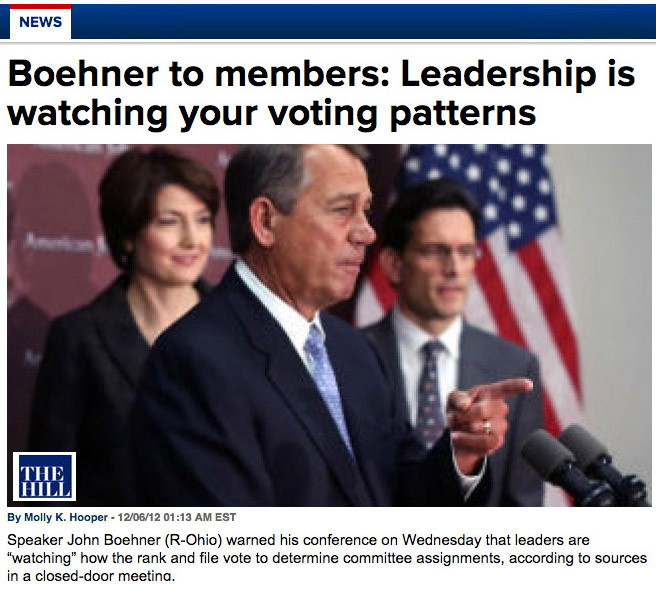
John Boehner 2012 - Leadership is Watching Your Votes

John Boehner 2012 - Leadership is Watching Your Votes
At the federal level, bribery is almost extinct.Lawrence Lessig 2011
Republic Lost
Super PACs may be bad for America, but they’re very good for CBS.CBS president Les Moonves 2012
Dark Money Dominates ElectionNote: Because attack ads are the opposite of bribery, politicians don’t receive any of the money, but billionaire owned media companies do. Media giants made record profits in the 2010 midterm elections (Extra!, 1/11), which followed on the heels of the Supreme Court decision Citizens United.
The view that corrupt politicians favor private interests over the common good in exchange for financial support is attractive. However, it is a conception that leads to a misdiagnosis of the problem.Stephen Medvic 2016
Flawed But Not Corrupt
In 2015, former US Representative, Tom Davis tells PBS news hour that members are afraid of negative ads, vote scoring and attacks by powerful interests.
In 2015, former US Representative, Tom Davis tells PBS news hour that members are afraid of negative ads, vote scoring and attacks by powerful interests.
Interest groups keep score on certain roll-call votes – seeing to it that issues arise in a form that it can keep score on – and then sends out mailings showing who voted “wrong,” and raising money against them.Elizabeth Drew 1983
Politics and Money
The White House and Intel Committee felt a need to scare Members of Congress into line for a certain set of controversial pro-war and/or surveillance votes.Edward Snowden 2024
What Prompted the Turner Statement?
About a week later some 900 members of Ohio Chambers of Commerce descended upon Washington. They swarmed through the corridors of the Capitol summoning their Senators and Representatives to conferences. At a Mayflower Hotel banquet they served notice on Ohio members of Congress that the Wagner Act was to be amended and punitive taxes repealed—or else. Not one of them got slapped. Not a newspaper deplored this intimidation by the mass lobby from Ohio. To the contrary, the press hailed it for the most part as a healthy manifestation of business interest in the affairs of the government. The experiment was so successful that the Chamber of Commerce subsequently held similar banquets for several other state delegations.Kenneth G. Crawford 1939
The Pressure Boys
The Committee’s record already shows that the insurance lobby knws all the dodges. I has paid a reporter $100 to supply inside information on the proceedings of a state legislature, entertained the wives and daughters of influential law makers, [and] threatened a doctor-legislator with loss of his insurance examination fees unless he voted “right.”Kenneth G. Crawford 1939
The Pressure Boys
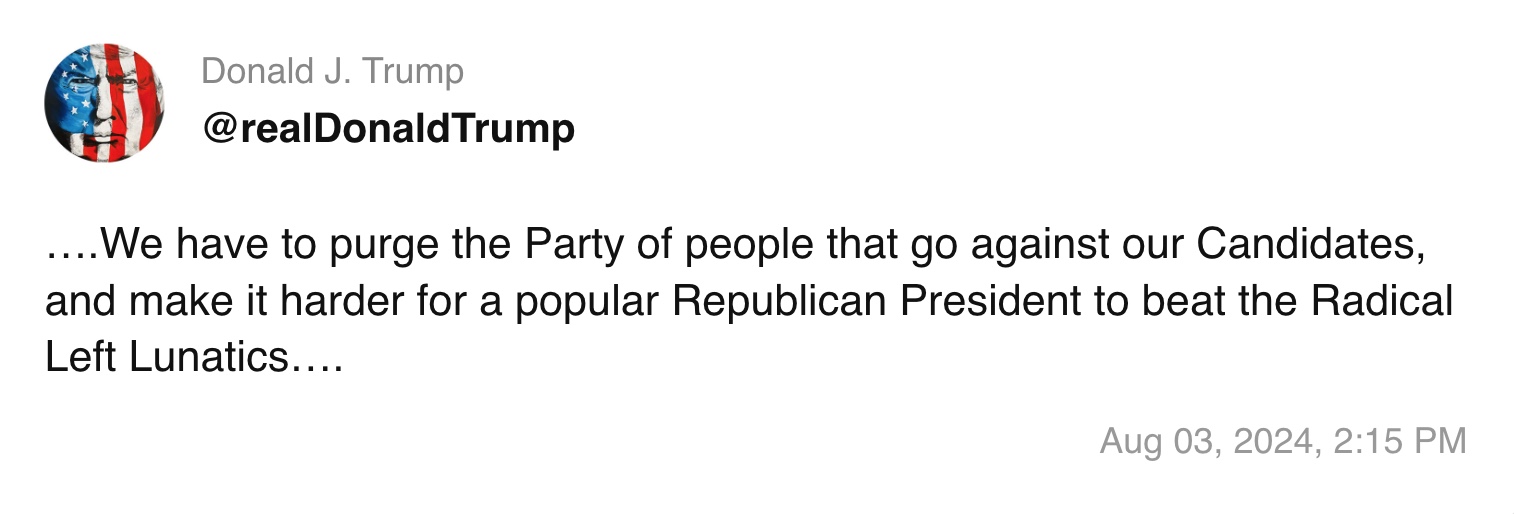
Donald Trump 2024 - Purging Dissent on Truth Social
Text: We have to purge the Party of people that go against our Candidates, and make it harder for a popular Republican President to beat the Radical Left Lunatics. Geoff Duncan is a loser who is disintegrating on his own. Congratulations to Josh McKoon for purging our Party of Misfits and people that don’t want to see us succeed!

Donald Trump 2024 - Purging Dissent on Truth Social
We’ve tracked over 50 instances of armed protesters using firearms to chill free speech and harass and intimidate legislators over the past year, including attacks on Michigan, Oregon, and Iowa’s state capitols.Giffords Org 2021
Firearms Should Be Banned from State Capitols. Here’s Why.
If you will make a public statement in support of the president's tax cut package and state that you intend to vote for it, we will withdraw all [attack] ads planned in your district. In addition, we will be glad to run radio and newspaper ads applauding you for your vote to lower taxes." NCPAC (National Conservative Political Action Committee) 1981
Letter to US House Member Stephen NealNote: Dolan and NCPAC are familiar with political controversy. The group has specialized in running negative radio and television ads attacking liberal Democrats. NCPAC and Dolan have been criticized by some Republicans, but in May President Reagan's political adviser, Lyn Nofziger, endorsed the group's activities. NCPAC's commercials create "a climate of doubt" about the Democrats and are, "on balance," a help to the administration, Nofziger said. ---> From Kenworthy 1995 'Both Channell and Dolan were closet homosexuals whose early deaths were caused by AIDS, Dolan in 1986, Channell’s in 1990. The political causes they supported ranged from neutral to hostile on gay rights. Dolan’s advice on turning Congress included a form of political “outing.” The way to get some members of Congress to “vote right” was to intimidate them with the “threat of political exposure back home.”'
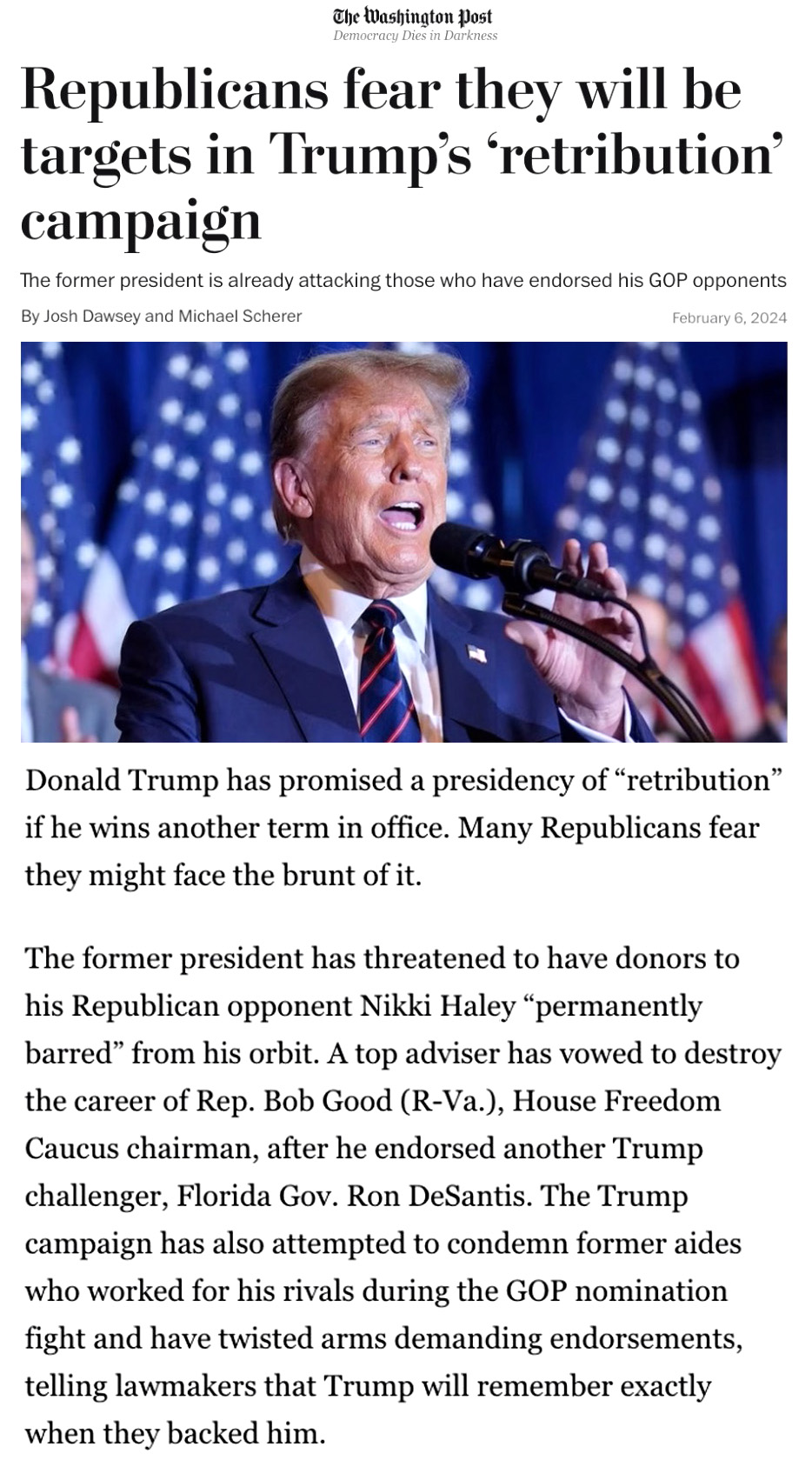
Josh Dawsey & Michael Scherer 2024 - Republicans fear they will be targets in Trump’s retribution campaign

Josh Dawsey & Michael Scherer 2024 - Republicans fear they will be targets in Trump’s retribution campaign
It seems that in the Citizens United era, the real beneficiaries of political advertisements are ad agencies, D.C. consultants and media companies who rake in record profits.Michael Corcoran 2013
Dark Money Dominates Election
The votes of legislators are not free. They are subject to a form of bribery, and also to terrorism. Kogelmann does not address this angle in his book, but there is good reason to believe that terrorism is an even more effective tactic than bribery. Instead of making a contribution to a legislator to try to get an amendment added, the lobbyist can instead threaten to donate to a primary challenger or run a bunch of attack ads. Astral Codex 2023
Book Review: Secret Government
The National Rifle Association warned members of Congress that it would oppose supporters of the bill, terrifying some members of U.S. House of Representatives. Ironically, the NRA has no apparent motive for secrecy: In fact, its name on voter scorecards is precisely what causes representatives to tremble.Philadelphia Inquirer 2020
This Election, Sponsored by...(Guns)
The reason so many candidates turn to negative advertising in this and every election cycle is simple. Negative advertising works.Andrew Ricci 2016
The dirty secret about negative campaign ads — they work
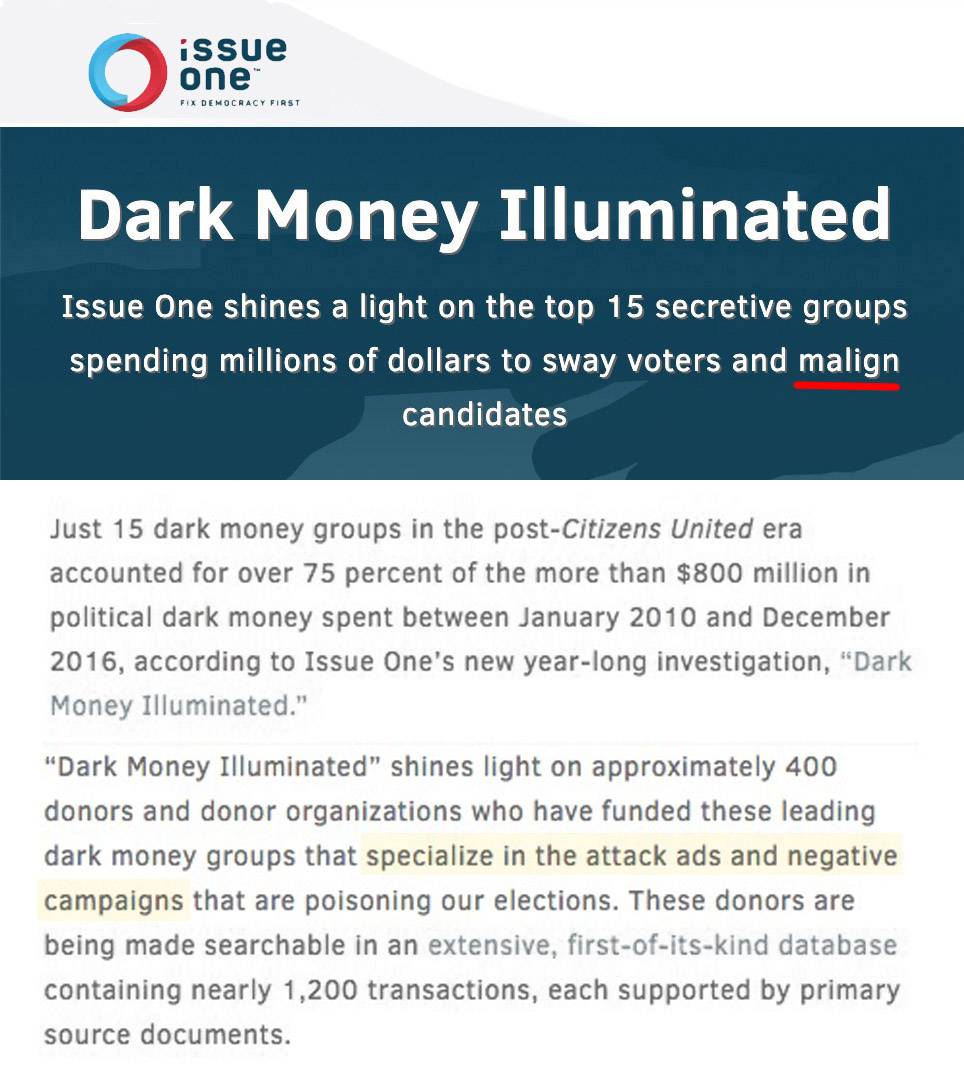
Andrew Ricci 2016 - The dirty secret about negative campaign ads — they work

Andrew Ricci 2016 - The dirty secret about negative campaign ads — they work
The only way they (the NRA) can lobby is through threats and intimidation.Senator Ben Campbell 1994
Senator Will End His NRA Membership
Receiving large amounts of early donations helps scare off challengers.Christina Carr 2010
Monetary Oppression
One of the biggest revelations to me in my conversations with Romney was just how important the threat of political violence was to the psychology of elected Republicans today,” said Coppins, who recalled Romney telling him “story after story about Republican members of Congress, Republican senators, who at various points wanted to vote for impeachment—vote to convict Trump or vote to impeach Trump—and decided not to, not because they thought he was innocent, but because they were afraid for their family’s safety. They were afraid of what Trump supporters might do to them or to their families.” That “raises a really uncomfortable question,” Coppins said, which is “how long can the American project last if elected officials from one of the major parties are making their political decisions based on fear of physical violence from their constituents?Brian Stelter 2023
Mitt Romney: Republicans Didn’t Impeach Trump Because They Feared Violent Attacks
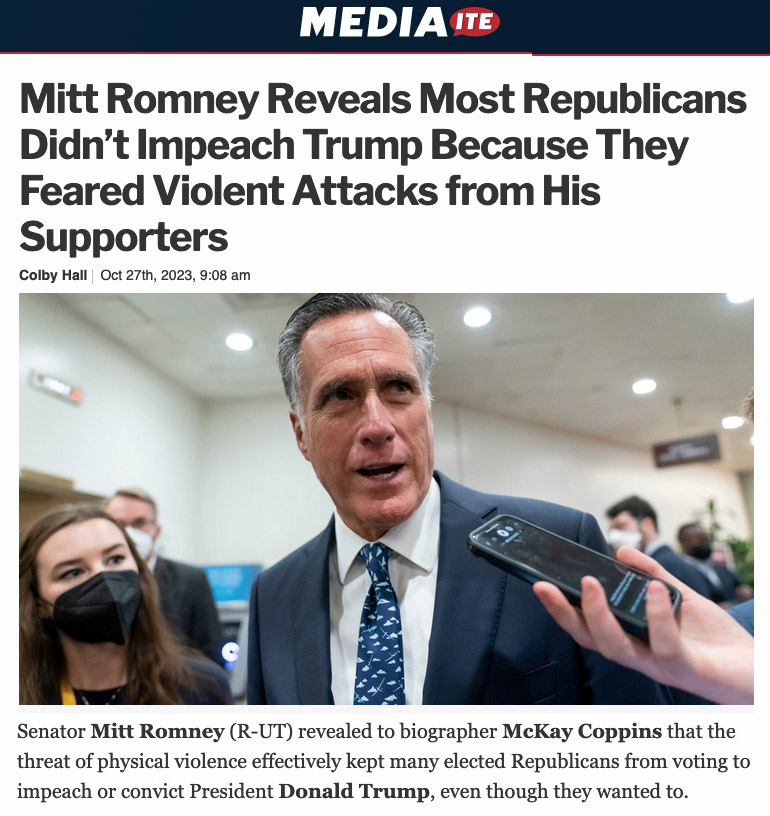
Colby Hall 2023 - Republicans Feared Violent Attacks from Trump Supporters

Colby Hall 2023 - Republicans Feared Violent Attacks from Trump Supporters
No carrot would be necessary to make them vote the right way; the stick would do it.Jon Elster 2013
Securities Against Misrule
This week, spending by Crossroads GPS, Americans for Prosperity, Patriot Majority and other nondisclosing groups broke $200 million. Almost all of it — 88 percent — went for attack ads, and 83 percent of that negative spending was directed against Democrats. Robert Maguire and Viveca Novak 2012
Shadow Money’s Top 10 Candidates (Open Secrets)
The advertisements produced by these super PACs are usually negative. A review of the top races targeted by outside spending groups shows clearly that most of the spending is against candidates in specific races.Sheila Krumholz 2013
Campaign Cash and Corruption: Money in Politics, Post-Citizens United
These leaders are now living in a world where threats are part of the political discourse. They won’t talk about bipartisan legislation to improve America, but these leaders and their followers sure are eager to make death threats. Naturally, those calling for the killings say they don’t actually intend to hurt anyone. They claim they’re joking, or making a figurative political statement, or using violent animation as a way of speaking to younger people in their own language, or some such phony justification for their dangerous words and actions. But regardless of how they explain it, what they’re really doing is lowering the social guardrails that discourage a civilized society from making threats and intimidation. They encourage their followers to imagine political assassination as part of daily political life in America. Maybe the target of their threats is the president, or members of Congress, or a local school board member, or a neighbor, or a guy a few seats down at the corner bar. It doesn’t matter to the right’s increasingly militant extremists: Anybody who doesn’t support the Big Lie, isn’t opposed to coronavirus safety precautions, etc., is fair game as the target for a terroristic threat. Party affiliation doesn’t even matter. Witness the death threats that the Republicans who supported President Joe Biden’s infrastructure package got from extremists in their own ranks.J. Scott Applewhite 2021
Political threats and intimidation have no place in civilized society
American Jews want desperately to help Israel; so they rely on the Israeli lobby to tell them how. Highly organized, smart, and constantly alert, the Israeli lobby uses political intimidation if everything else fails.Steven L. Spiegel 1985
The Other Arab-Israeli Conflict
TV ads are the political equivalent of carpet bombing while a telephone pollster is a sniper.Allen Raymond 2008
How to Rig an Election: Confessions of a Republican Operative
Traditionally, super PACs function as candidates’ attack dogs, running negative ads that candidates wouldn’t want to be associated with.Anna Massoglia & Tatyana Monnay 2020
Democratic ‘Dark Money’ Groups
Marco Rubio, in the town hall meeting w Parkland students and families, deflected the direct charge about accepting money from the NRA by saying that he accepts contributions from “anyone who supports my agenda.” The better and more pointed question is (obviously): is it not the money “for” him that is at issue but his fear of NRA money plowed in to unseat him if he doesn’t do their bidding?Robert Reich 2018
Gun control letter from MoveOn.org
Contributions are almost never rewarded with an explicitly promised return (in other words, full-blown bribery is quite rare.)Clayton Peoples 2013
Campaign Finance and Policymaking
A 2020 PBS Frontline report suggests that Amazon intimidates potential witnesses in public antitrust hearings. Confirmed witnesses are terrified of speaking publicly. At the same time Amazon is one of the nation’s biggest lobbyists, and through Jeff Bezos’ purchase of the Washington Post, also one of the biggest proponents of transparency. Immediately after purchsing the paper, they added the ubiquitous tagline “Democracy Dies in the Darkness.”
A 2020 PBS Frontline report suggests that Amazon intimidates potential witnesses in public antitrust hearings. Confirmed witnesses are terrified of speaking publicly. At the same time Amazon is one of the nation’s biggest lobbyists, and through Jeff Bezos’ purchase of the Washington Post, also one of the biggest proponents of transparency. Immediately after purchsing the paper, they added the ubiquitous tagline “Democracy Dies in the Darkness.”
Incumbents often engage in “preemptive spending.” By raising significant amounts of money early in the game, they scare off challengers.Stephen E. Frantzich & Claude G. Berube 2010
Congress: Games and Strategies
Wall Street bankers and investors have poured money into Alexandria Ocasio-Cortez‘s primary challenger’s campaign in an effort to stop the representative’s re-election bid.Daneille Zoellner 2020
Wall Street investors put money behind AOC challenger
The campaign itself was a barroom brawl every bit as ruthless as any modern contest, with mud-slinging, scare tactics, and backstabbing.John Ferling 2005
Adams vs. Jefferson
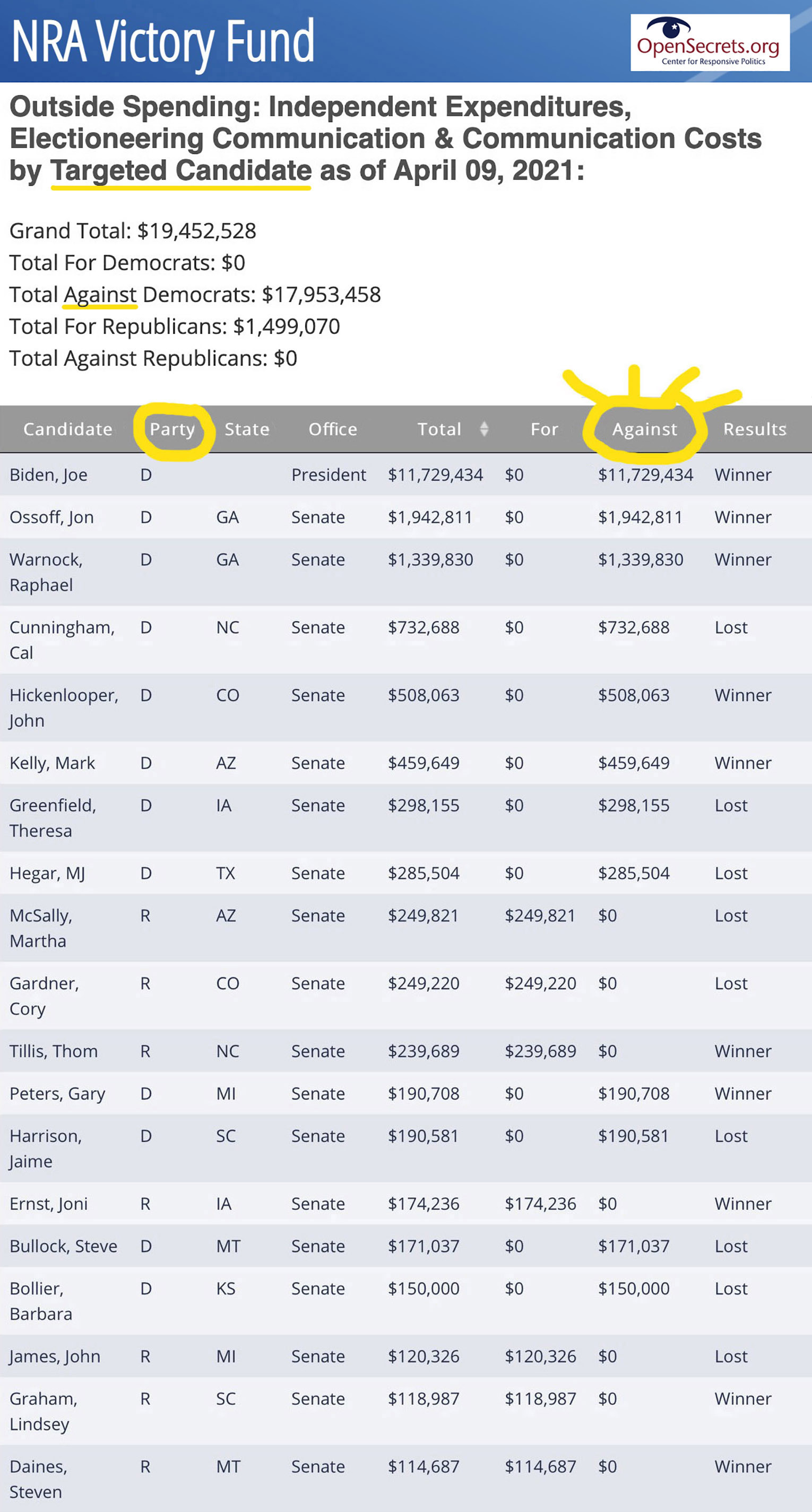
Open Secrets 2021
The NRA spends far more money “against” democrats (and moderate republicans) than they do for republicans.

Open Secrets 2021
Fear of lobbyists may outweigh fear of voters.Justin Fox 2014
Harvard Business Review
...lobbyists for Big Tobacco swarmed the House floor, bullying members as the vote grew nearRepresent.us 2018
Boehner hands out tobacco lobby checks on House floor
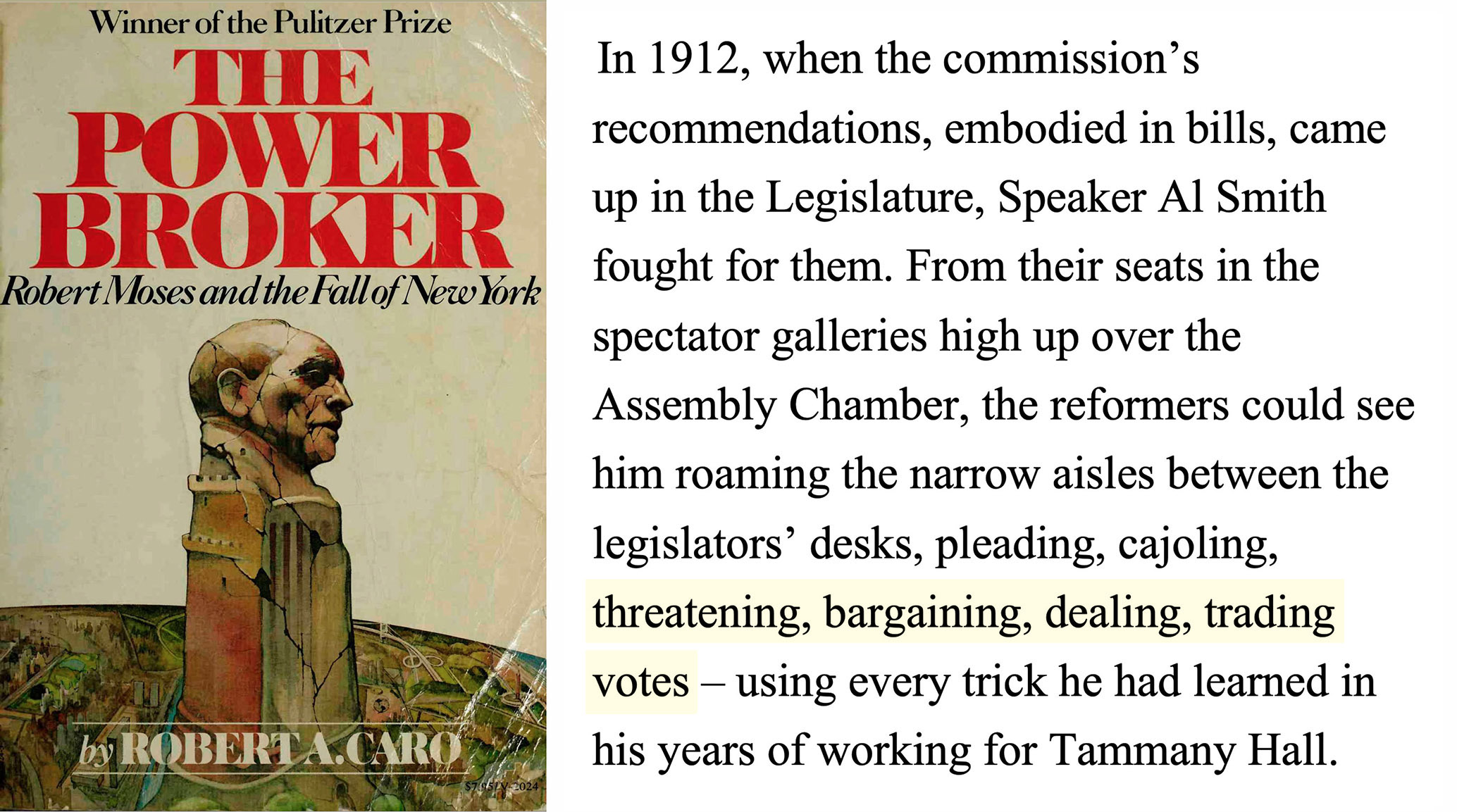
Robert Caro 1975 - The Power Broker - Robert Moses and the Fall of New York
In 1912, when the commission’s recommendations, embodied in bills, came up in the Legislature, Speaker Al Smith fought for them. From their seats in the spectator galleries high up over the Assembly Chamber, the reformers could see him roaming the narrow aisles between the legislators’ desks, pleading, cajoling, threatening, bargaining, dealing, trading votes – using every trick he had learned in his years of working for Tammany Hall.

Robert Caro 1975 - The Power Broker - Robert Moses and the Fall of New York
I have seen good and able legislators ignore their better judgment for fear of angering a constituency or special interest group.Rep. Timothy J. Penny 1996
Common Cents
John Henderson voted for acquittal, the last important act of his Senatorial career. Denounced, threatened and burned in effigy in Missouri, he did not even bother to seek re-election to the Senate.John F. Kennedy 1955
Profiles in Courage
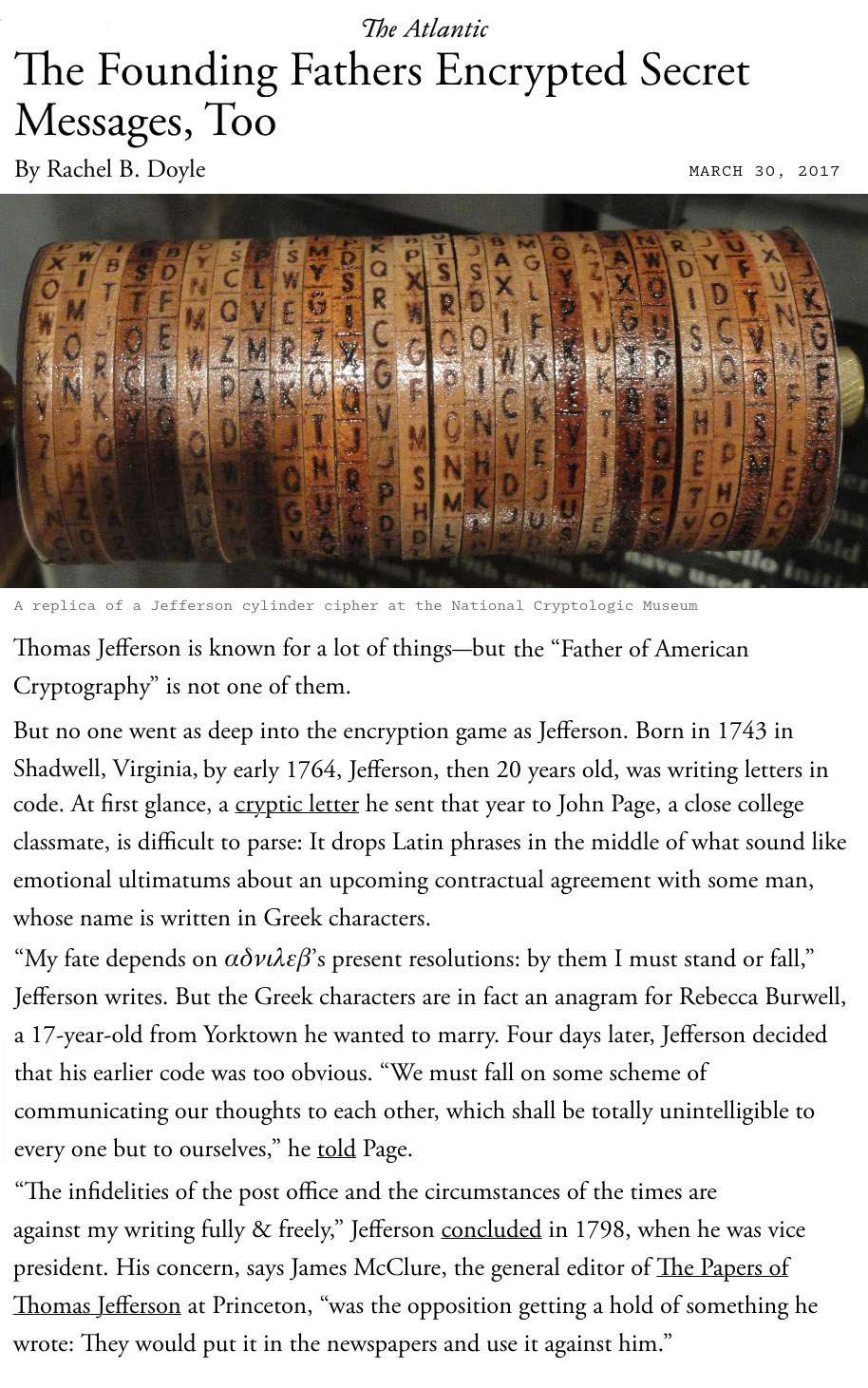
Rachael Doyle 2017 - The Founding Fathers Encrypted Secret Messages, Too
Text: Thomas Jefferson is known for a lot of things — but his place as the “Father of American Cryptography” is not one of them. The Founding Fathers relied on encryption throughout their careers: George Washington, Benjamin Franklin, Alexander Hamilton, John Adams, John Jay, and James Madison all made ample use of codes and ciphers to keep their communiqués from falling into the wrong hands. Partisanship and public perception mattered as well. Jefferson’s concern, says James McClure, the general editor of The Papers of Thomas Jefferson at Princeton, “was the opposition getting a hold of something he wrote: They would put it in the newspapers and use it against him.”

Rachael Doyle 2017 - The Founding Fathers Encrypted Secret Messages, Too
The cudgel of secret spending need not even be swung to have its desired effect; merely brandishing it can be enough to get the attention, and obedience, of a politician.Sheldon Whitehouse 2017
Captured
Most of what happens in Washington is driven by ideological passion, the desire to do good, or the fear of being harmed.Jonathan Rauch 1999
Government’s End (Demosclerosis)
The politics of hate is the most successful money making campaign we have.Larry Lessig 2020
The Swamp (HBO Documentary)
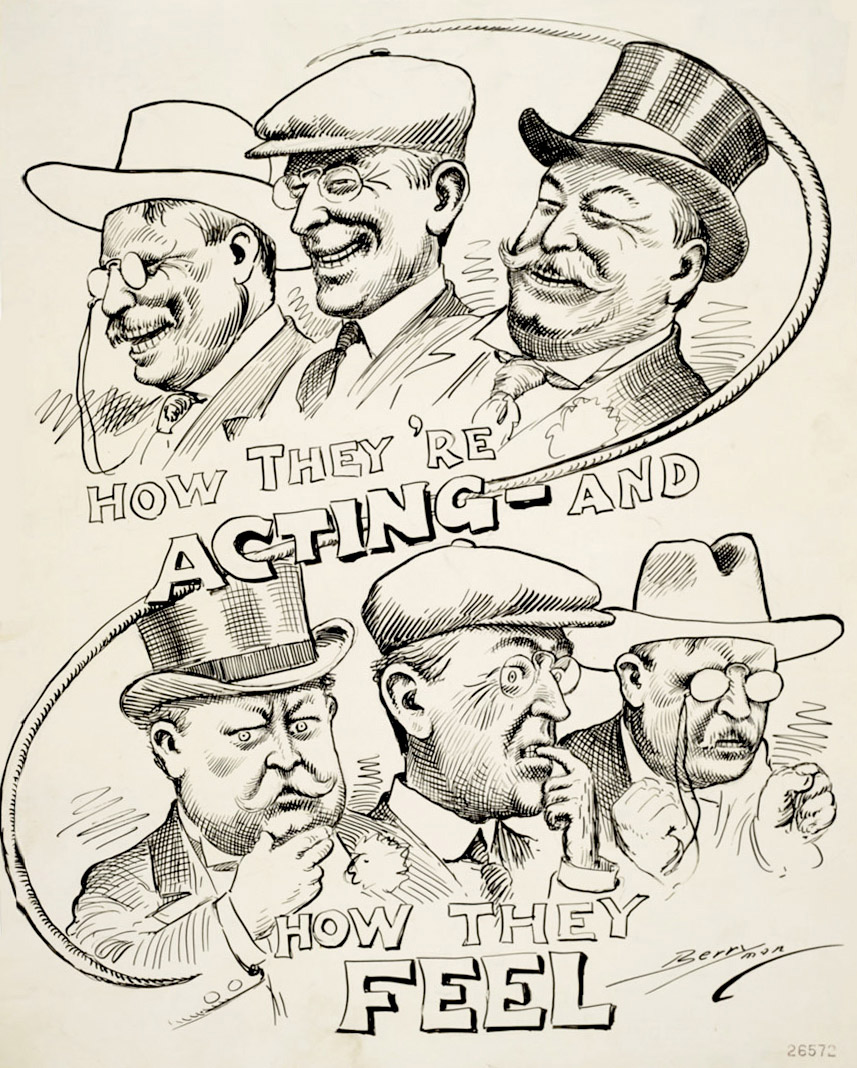
Clifford Berryman 1912 - How They Act and How They Feel
Since the dawn of politics pundits have noted that internally politicians are terrified of the voters and interest groups but have little choice but to act confident.

Clifford Berryman 1912 - How They Act and How They Feel
So, forget bribery. Lobbyists, like the police union and the NRA, prefer to terrorize lawmakers. It is cheap, retains its effects for decades, and casts a wide net. Worse, when presented publicly, threats are roundly regarded as fair play.James D’Angelo 2020
How Lobbying Killed George Floyd
The presidential candidacy of the environmental activist Al Gore in 2000 posed an obvious threat to the fossil fuel industry. That election cycle, Koch Industries and its employees disbursed over $800,000 in support of his opponent George W. Bush and other Republicans.Jane Mayer 2016
Dark Money
To exclude audience pressure that might bring delegates under the sway of emotion (vanity or fear), the assembly should debate in secret or, alternatively, vote in secret.Jon Elster 2008
The Optimal Design of a Constituent Assembly
Brennan Center for Justice 2024 - Intimidation of State and Local Officeholders: A Threat to Democracy
Local and state officeholders are facing an alarming amount of harassment, death threats, and other abuse that interferes with their work. It makes them less willing to hold public events, advocate for contentious policies, and do other parts of their jobs. The phenomenon hits women and people of color especially hard, worsening their underrepresentation in local and state government.
Brennan Center for Justice 2024 - Intimidation of State and Local Officeholders: A Threat to Democracy
The intimidation factor is alive and well on Capitol Hill, where most members, while privately resenting the pressure, dutifully toe the Israeli line. If voting were kept secret, I am confident that aid to Israel would have long ago been heavily conditioned – if not terminated – in both chambers.Rep. Paul Findley 2003
They Dare To Speak Out
Whether based on fact or fancy, the perception is what counts: AIPAC means power-raw, intimidating power. Its promotional literature regularly cites a tribute published in The New York Times: “The most powerful, best-run and effective foreign policy interest group in Washington.” A former Congressman, Paul N. “Pete” McCloskey puts it more directly: Congress is “terrorized” by AIPAC. Other Congressmen have not been so candid on the public record, but many House and Senate members privately agree.Rep. Paul Findley 2003
They Dare To Speak Out
The amendment, like Hatfield’s, was overwhelmingly defeated. After the vote on his amendment, Stevenson recalls, he received apologetic comments. “Several Senators came up and said, ‘Adlai, you are right, but you understand why I had to vote against you. Maybe next time.’“ Stevenson did understand why: lobby intimidation produced the negative votes. He found intimidation at work on another front too, the news media. … It’s not only the intimidation of the American politician, it’s also the intimidation of some American journalists. If it’s not the journalists. then it’s the editors and perhaps more so the publishers. Rep. Paul Findley 2003
They Dare To Speak Out
One of the most popular members of the Senate, Charles “Mac” Mathias of Maryland is something of a maverick - a role probably necessary for his political survival. He is a Republican in a state where Democrats outnumber Republicans by three to one.Rep. Paul Findley 2003
They Dare To Speak Out
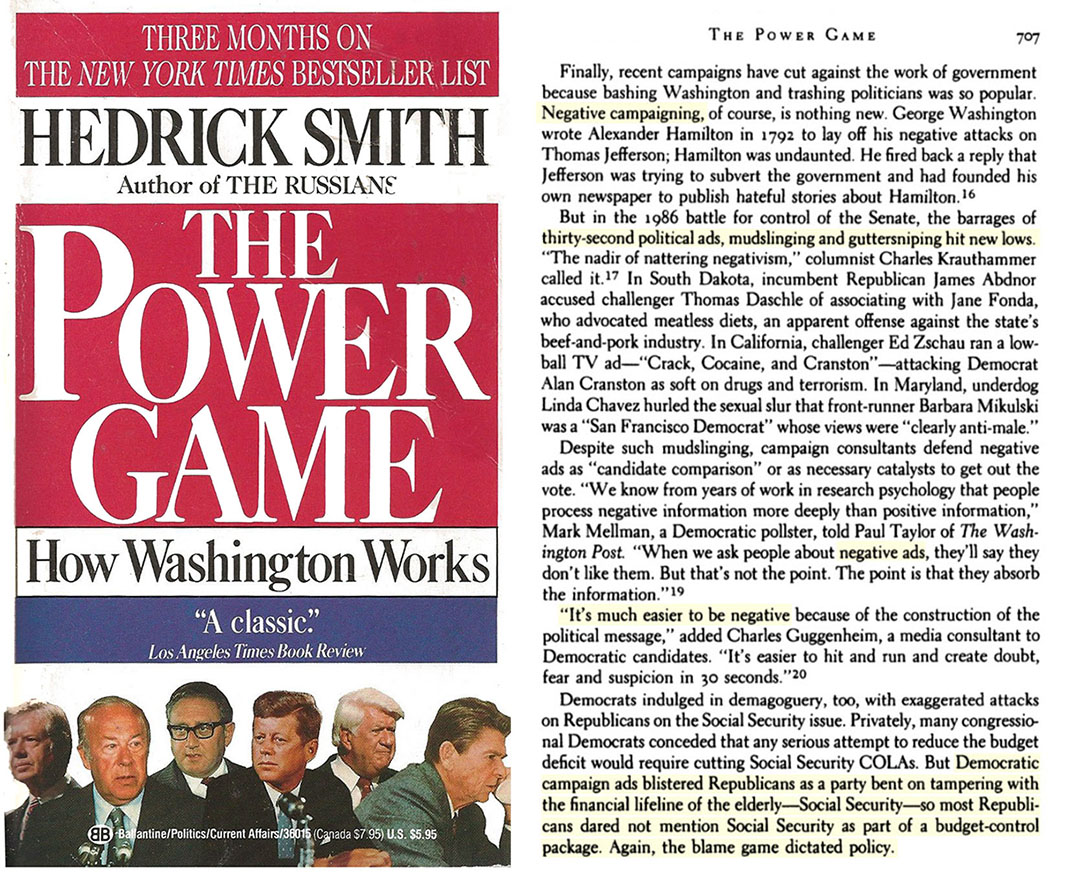
Hedrick Smith 1988 - discusses the power of negative ads to change legislation in ways that no one wants.

Hedrick Smith 1988 - discusses the power of negative ads to change legislation in ways that no one wants.
Cowed by threats, lured by enticements, legislators often make decisions they do not believe in.Robert M. Entman 1983
The Impact of Ideology on Legislative Behavior and Public Policy in the States
At the federal, state and local level, threats against elected officials have risen to record highs. In 2023, there were 8,008 recorded cases of threats against members of Congress (22 a day), according to the U.S. Capitol Police. In 2022, there were 7,501 cases, and Morelli’s threat was one of them.Ruby Cramer 2024
The Threat
On Saturday I witnessed the most blatant act of political intimidation I had seen in eleven years in Congress. The leaders of the House Appropriations Committee sent letters to dozens of lawmakers saying a vote for Penny-Kasich would jeopardize projects in their home district. In other words, the powerful lawmakers who control the federal purse strings were telling other lawmakers that a vote for our deficit-reduction package would result in a punitive cut to a program in their district.Rep. Timothy J. Penny 1996
Common Cents
My colleagues think AIPAC is a very, very powerful organization that is ruthless, and very, very alert. Eighty percent of the senators here roll their eyes on some of the votes. They know that what they’re doing isn’t what they really believe is right, but why fight on a situation where they’re liable to get beat up on?Anonymous US Senator 1991
Washington Post Interview by Lloyd Grove
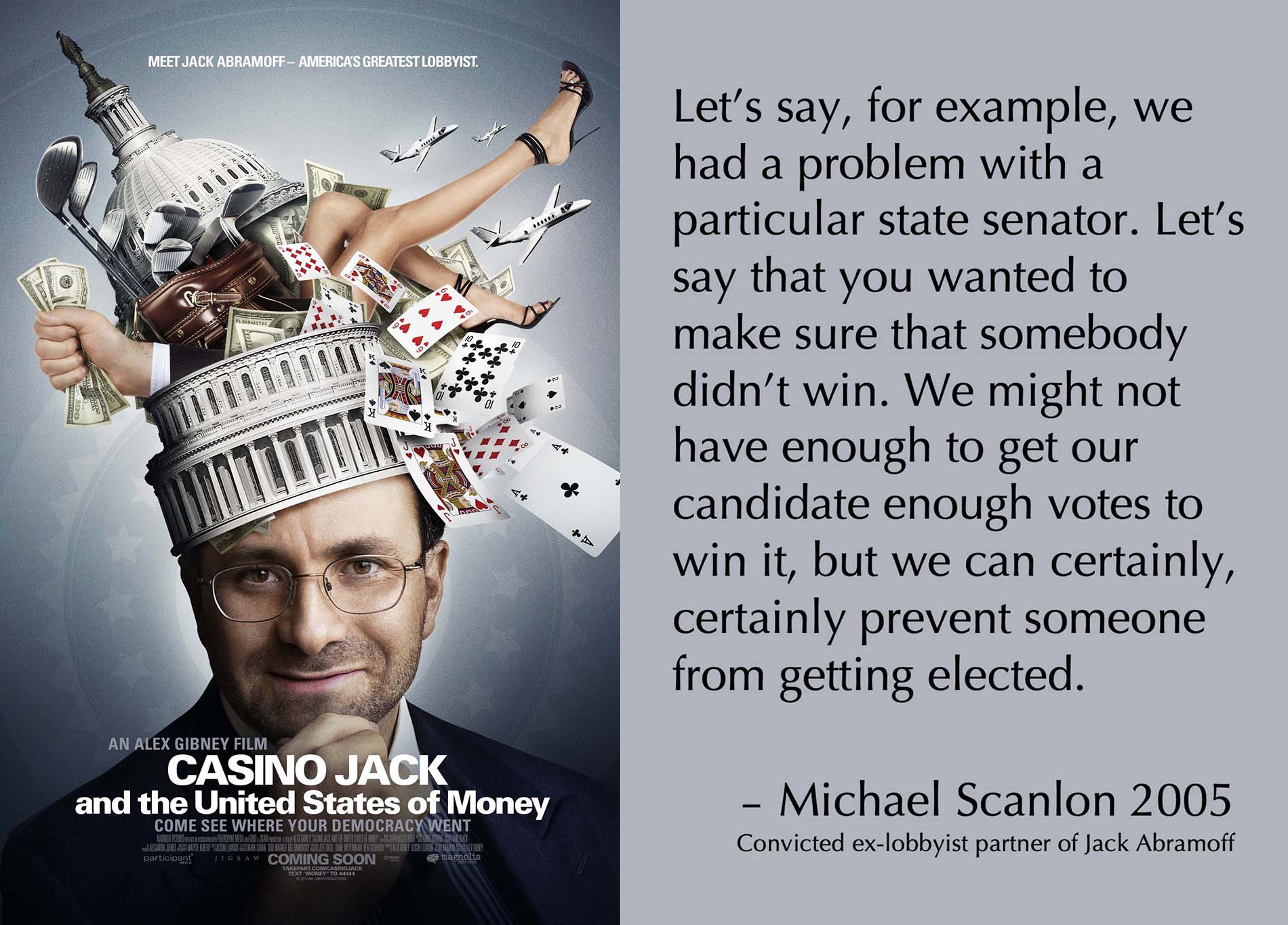
Michael Scanlon 2005 - Convicted Lobbyist

Michael Scanlon 2005 - Convicted Lobbyist
Primary challenges have become the nuclear weapon activists on each side use to punish and intimidate legislators who veer too much from party orthodoxy or resist leadership control.Ronald Brownstein 2007
The Second Civil War: How Partisanship Has Paralyzed Washington
These lobbyists constantly tried to pressure legislators to vote for liberal measures by presenting arguments in favor of a bill and by mobilizing or threatening to mobilize union members to create political pressure in a legislator’s constituency. Julian Zelizer 2015
Fierce Urgency of Now
The findings suggest that while citizens commonly give bribes to enable rule violations, this is a process of both temptations and threats: officials that do not take bribes face violent intimidations by citizens and corrupt colleagues.Aksel Sundström 2015
Violence and the Costs of Honesty
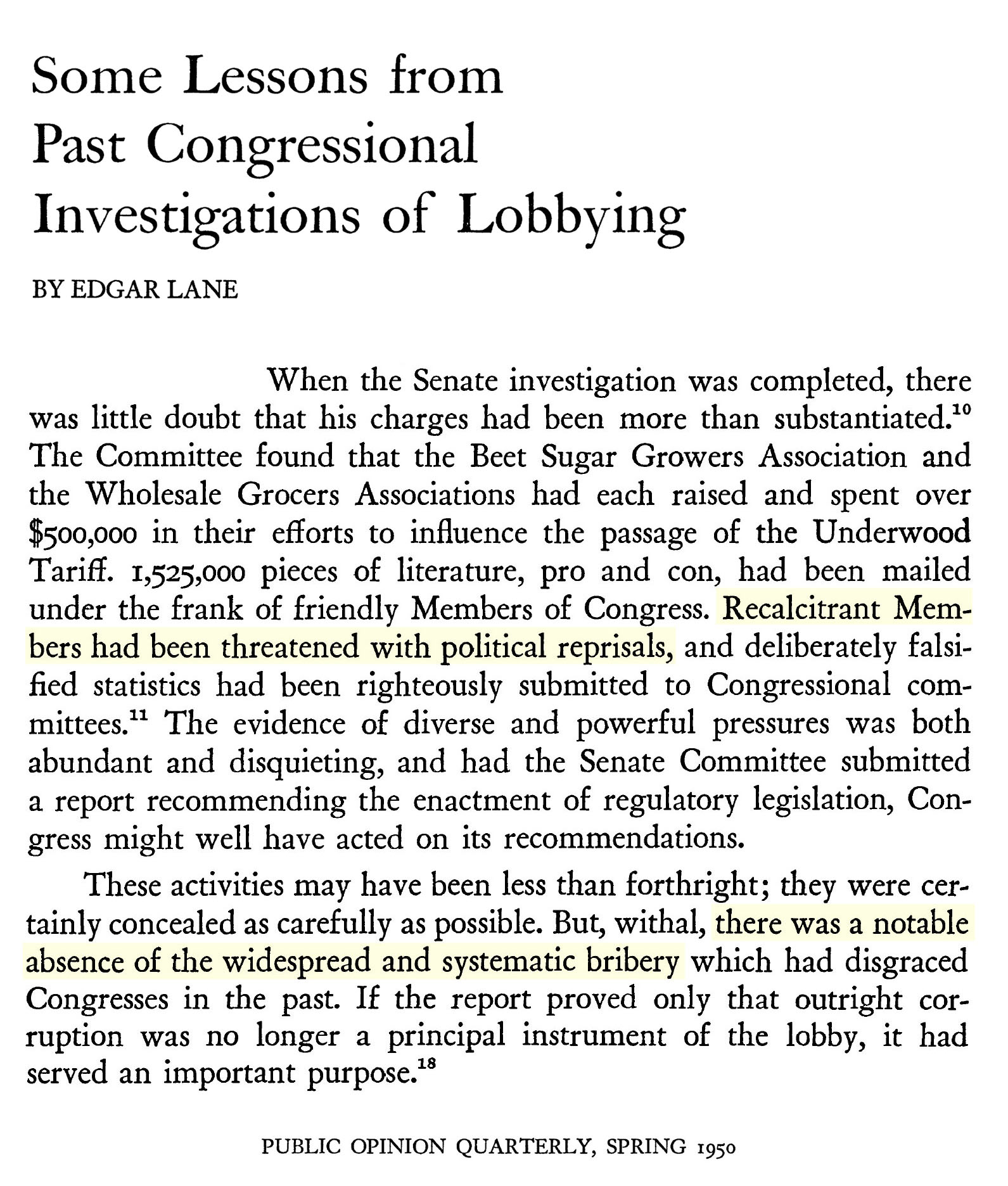
Edgar Lane 1950 - Lessons From Past Investigations
Note: For decades, Senate investigations into corruption find evidence of intimidation but not bribery.

Edgar Lane 1950 - Lessons From Past Investigations
Last year, Congress abandoned its attempt to prevent surprise bills like this one after private-equity firms poured millions into advertisements opposing the plan.Sarah Kliff 2020
The Cost of Care
Public officials are increasingly forced to take extraordinary security precautions after vitriolic words by the president.Greg Miller and Isaac Stanley-Becker 2020
Trump’s attacks on adversaries often followed by threats to their safety
It’s not just primary challenges — it’s the threat of them.Richard C. Barton 2022
Congress is polarized. Fear of being ‘primaried’ is one reason
As much as anything, it’s the threat of money spent against rather than money spent for.Sasha Chavkin 2013
Norm Ornstein on Political Intimidation
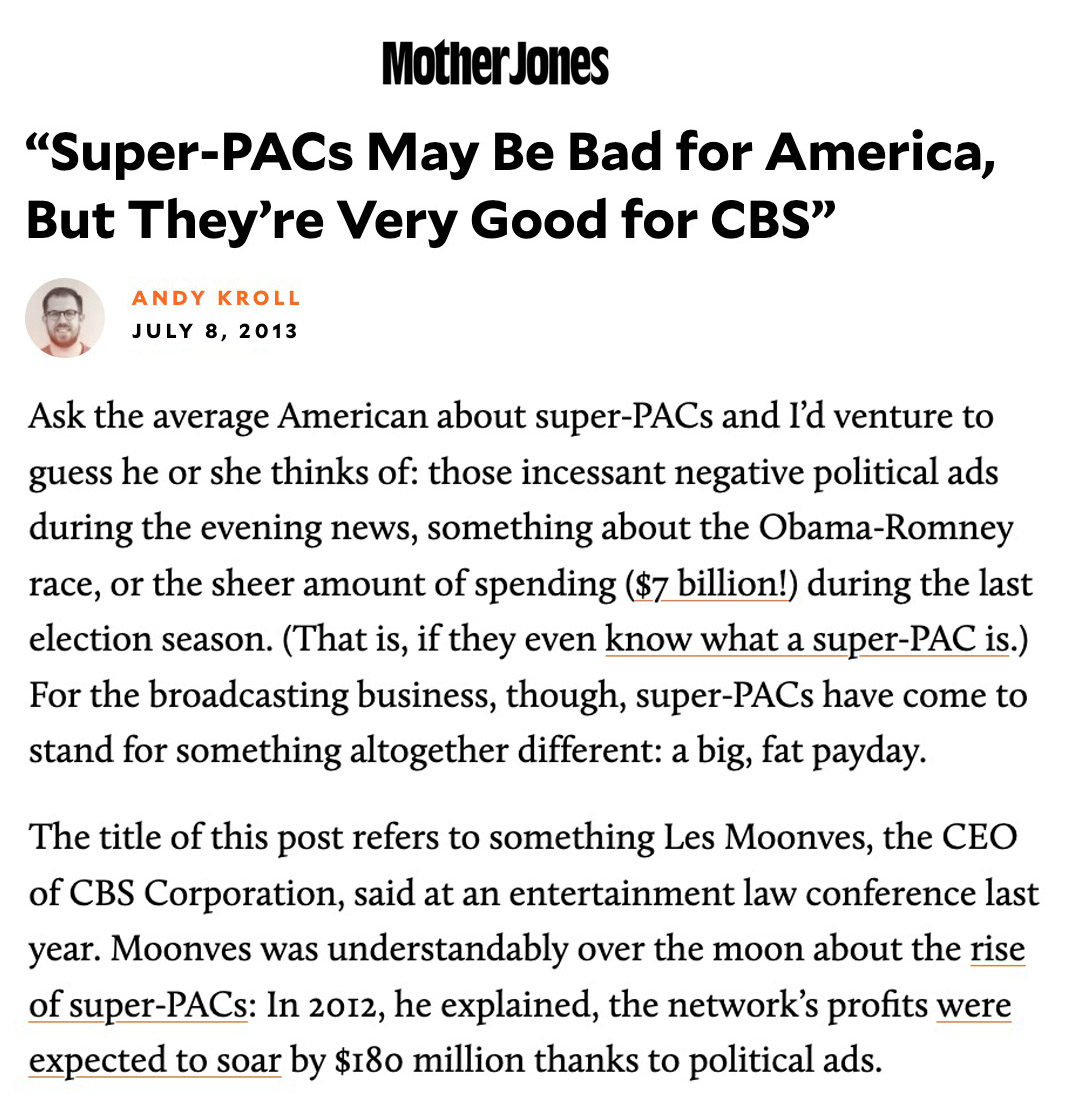
Andy Kroll 2013 - Super Pacs Very Good for CBS
Note: Because attack ads are the opposite of bribery, politicians don’t receive any of the money, but billionaire owned media companies do. Media giants made record profits in the 2010 midterm elections (Extra!, 1/11), which followed on the heels of the Supreme Court decision Citizens United.

Andy Kroll 2013 - Super Pacs Very Good for CBS
Rep. Scott Peters (D-Calif.) was threatened with a million dollars being spent against him in his primary, and, if he won, another million in the general.Edward-Isaac Dovere 2016
Pro-Trade Democrats Call Labor’s Bluff
Doing what they know to be right often places lawmakers at odds with popular opinion and undoubtedly raises the ire of certain special interest constituencies. This leads to a Congress that is largely risk-averse. A Congress where lawmakers are too often driven to cast the “safe” or “popular” vote for fear of losing their jobs...The truth is that popularity polls and special interest groups create a culture of fear in Congress.Rep. Timothy J. Penny 1996
Common Cents
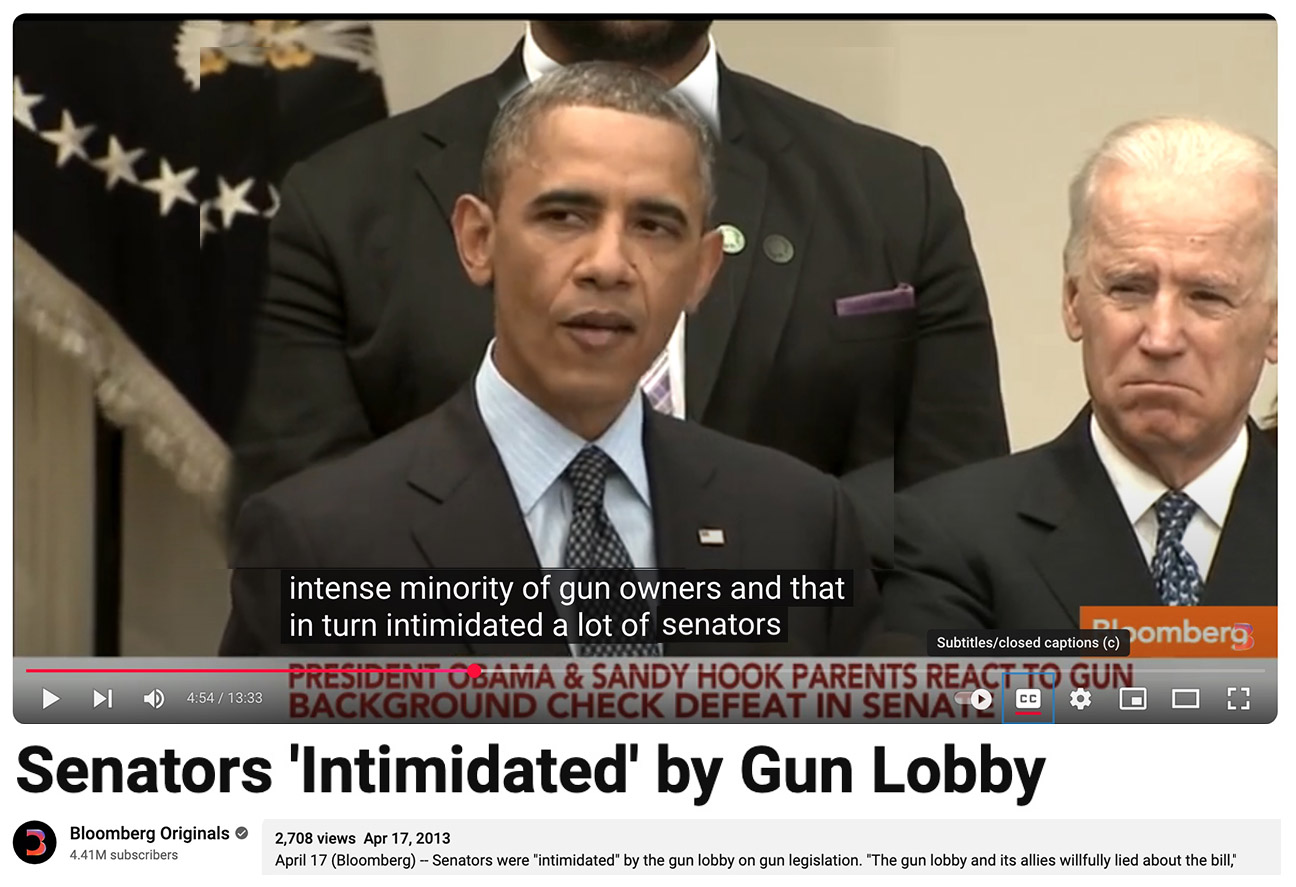
Bloomberg 2013 - Senators ‘Intimidated’ by Gun Lobby
Text: Even though the bill did the opposite. This legislation in fact outlawed any registry plain and simple right there in the text but that didn't matter and unfortunately this pattern of spreading untruths about this legislation served a purpose because those lies upset an intense minority of gun owners and that in turn intimidated a lot of Senators. And I talked to several of these Senators over the past few weeks and they're all good people. I know all of them were shocked by tragedies like New Town and I also understand that they come from states that are strongly proud. And I have consistently said that there are Regional differences when it comes to guns and that both sides have to listen to each other.

Bloomberg 2013 - Senators ‘Intimidated’ by Gun Lobby
In Congress, violent threats against lawmakers are on track to double this year. Republicans who break party ranks and defy former President Donald J. Trump have come to expect insults, invective and death threats — often stoked by their own colleagues and conservative activists, who have denounced them as traitors. Lisa Lerer and Astead W. Herndon 2021
Menace Enters the Republican Mainstream
Ms. Dingell, who said she was threatened by men with assault weapons outside her home last year after she was denounced by Tucker Carlson on his Fox News show, shared a small sample of what she said were hundreds of profanity-laden threats she has received. “They ought to try you for treason,” one caller screamed in a lengthy, graphic voice mail message. “I hope your family dies in front of you. I pray to God that if you’ve got any children, they die in your face.” Lisa Lerer and Astead W. Herndon 2021
Menace Enters the Republican Mainstream
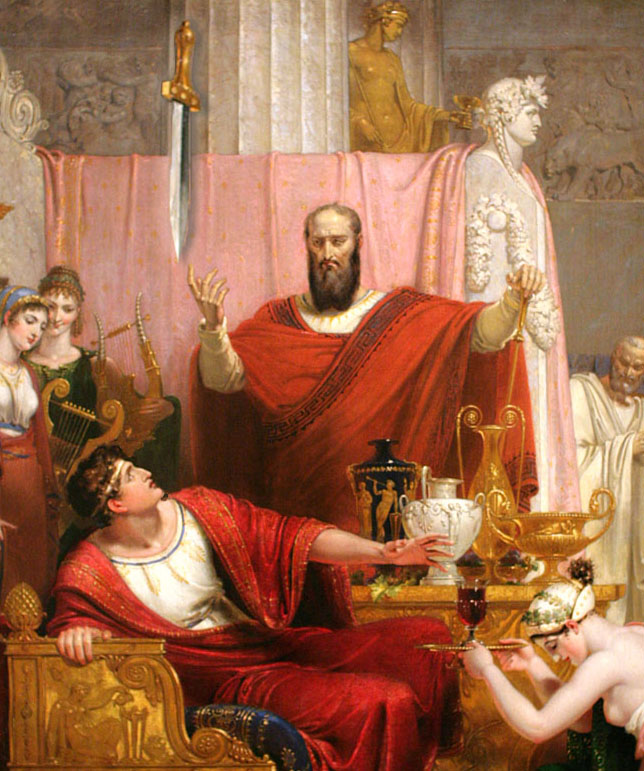
Cicero 45 BC - Sword of Damocles
Note: Damocles was a courtier in the court of Dionysius II of Syracuse, a fourth century ruler of Syracuse. Damocles exclaimed that, as a great man of power and political authority, Dionysius was truly fortunate. Dionysius offered to switch places with him for a day, so he could taste that fortune first-hand. In the evening a banquet was held, where Damocles very much enjoyed being waited upon like a king. Only at the end of the meal did he look up and notice a sharpened sword hanging directly above his head, held only by a single horse-hair. Immediately, he lost all taste for the festivities and asked leave, saying he no longer wanted to be so ‘fortunate.’ Dionysius had successfully conveyed a sense of the constant threat under which powerful politicians live.

Cicero 45 BC - Sword of Damocles
Republican Philadelphia City Commissioner Al Schmidt says his office, which runs the vote count, has received death threats.Bill Whitaker 2020
“It is not cheating, it is democracy”: A first-hand look at ballot counting
Mr. Spafford sometimes used photographs of President Biden for target practice at a local shooting range and believed that “political assassinations should be brought back.”Alan Feuer 2025
F.B.I. Says It Found Largest Cache of Homemade Explosives in Its History at Va. Farm
The American public generally valorizes representatives who publicly “votes their conscience.” But there are valid political reasons why many refuse to do so. Maybe there’s a special interest group breathing down their neck and threatening to fundraise for a primary challenger. Maybe their district is significantly conservative or liberal, and they just can’t be seen collaborating on bipartisan legislation. Maybe they can’t stomach taking an ideological stand that will jeopardize their regular appearance on Jesse Waters or Rachel Maddow’s show. Whatever the reason, I believe we can get the courageous and principled leadership we desperately crave, as long as they have the freedom to demonstrate that legislative bravery in private.Ben Krauss 2024
The Take Bakery: Anonymous Congress
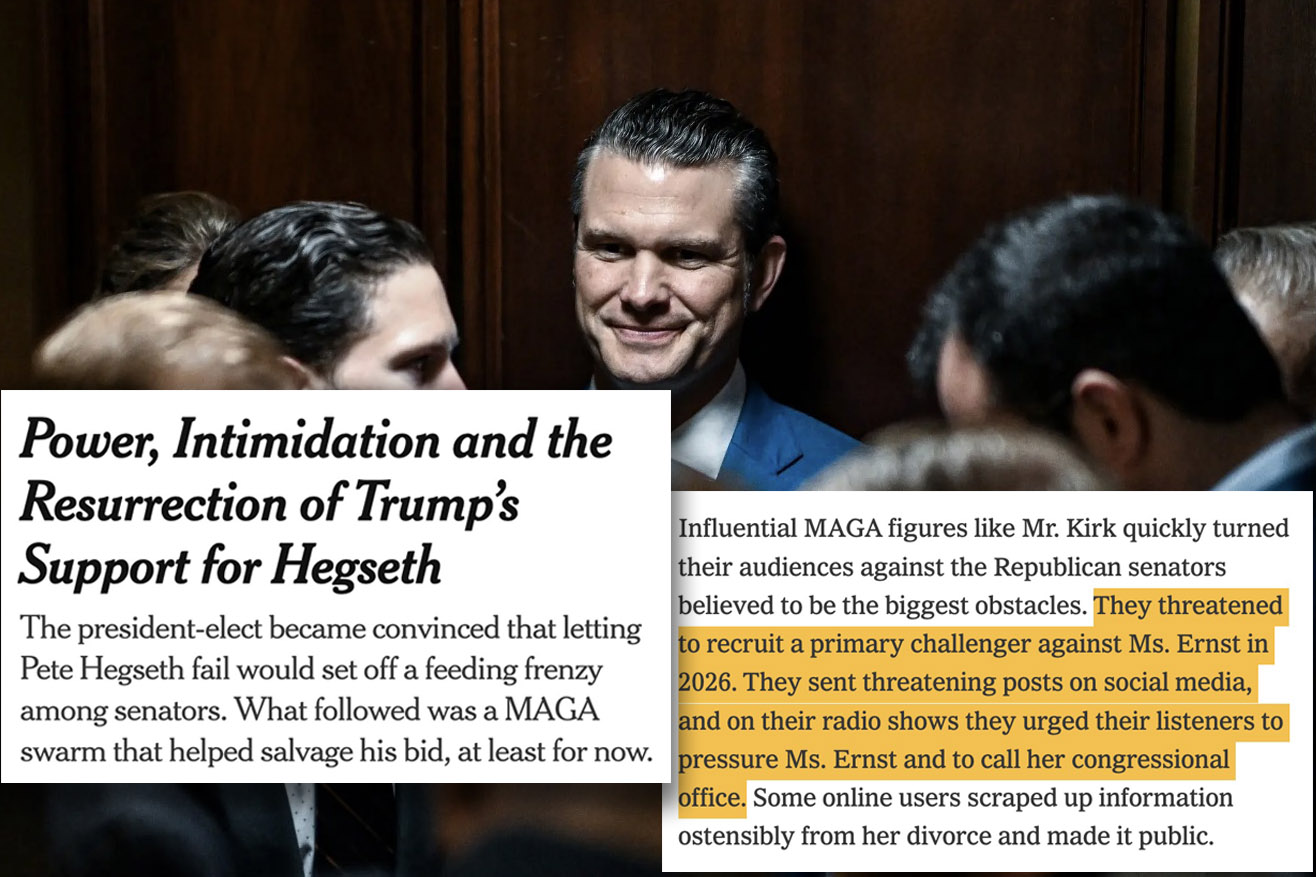
Jonathan Swan and Maggie Haberman 2024 - Power, Intimidation and the Resurrection of Trump’s Support for Hegseth
Text: Influential MAGA figures like Mr. Kirk quickly turned their audiences against the Republican senators believed to be the biggest obstacles. They threatened to recruit a primary challenger against Ms. Ernst in 2026. They sent threatening posts on social media, and on their radio shows they urged their listeners to pressure Ms. Ernst and to call her congressional office. Some online users scraped up information ostensibly from her divorce and made it public.

Jonathan Swan and Maggie Haberman 2024 - Power, Intimidation and the Resurrection of Trump’s Support for Hegseth
As Trump enters the final stretch of the presidential campaign, he’s purged his Republican Party of lawmakers and officials deemed as disloyal.Peter Eisler and Ned Parker 2024
How Trump’s intimidation tactics have reshaped the Republican Party
The Standards Committee’s investigation uncovered troubling aspects to [the lobbying firm’s] conduct. The evidence revealed instances in which [they] employed “strong-arm” tactics, threatening to withdraw financial support or encourage businesses to relocate out of a Member’s district if Members did not reverse policies opposing earmarks. Committee on Standards of Conduct 2010
Allegations Relating to the Lobbying Activities
Officeholders... reported experiencing threats or attacks within the past three years. And the volume and severity of abuse have increased in recent years, they said. More than 40 percent of state legislators experienced threats or attacks within the past three years, and more than 18 percent of local officeholders experienced threats or attacks within the past year and a half. The numbers balloon to 89 percent of state legislators and 52 percent of local officeholders when less severe forms of abuse — insults or harassment such as stalking — are included.Gowri Ramachandran 2024
Intimidation of State and Local Officeholders
For several decades, scholars have investigated whether campaign giving by interest groups successfully influences legislative policy choices, typically in the U.S. Congress. The most common approach is to regress campaign donations on roll call voting behavior. However, most of the time, the estimated coefficients from these models have either been insignificant or wrongly signed. Given the intuitive expectation that donations and actions should be linked, these findings have drawn considerable attention.Justin Fox & Lawrence Rothenberg 2011
Influence without BribesNote: Little could show the power of intimidation and challenger funding better than this. Scholars looking to find correlation between bribery and policy, find the opposite – a negative correlation. Legislators are more likely to change their votes out of fear of potential money (i.e. step out of line with the LRA and money comes flooding in to a challenger).
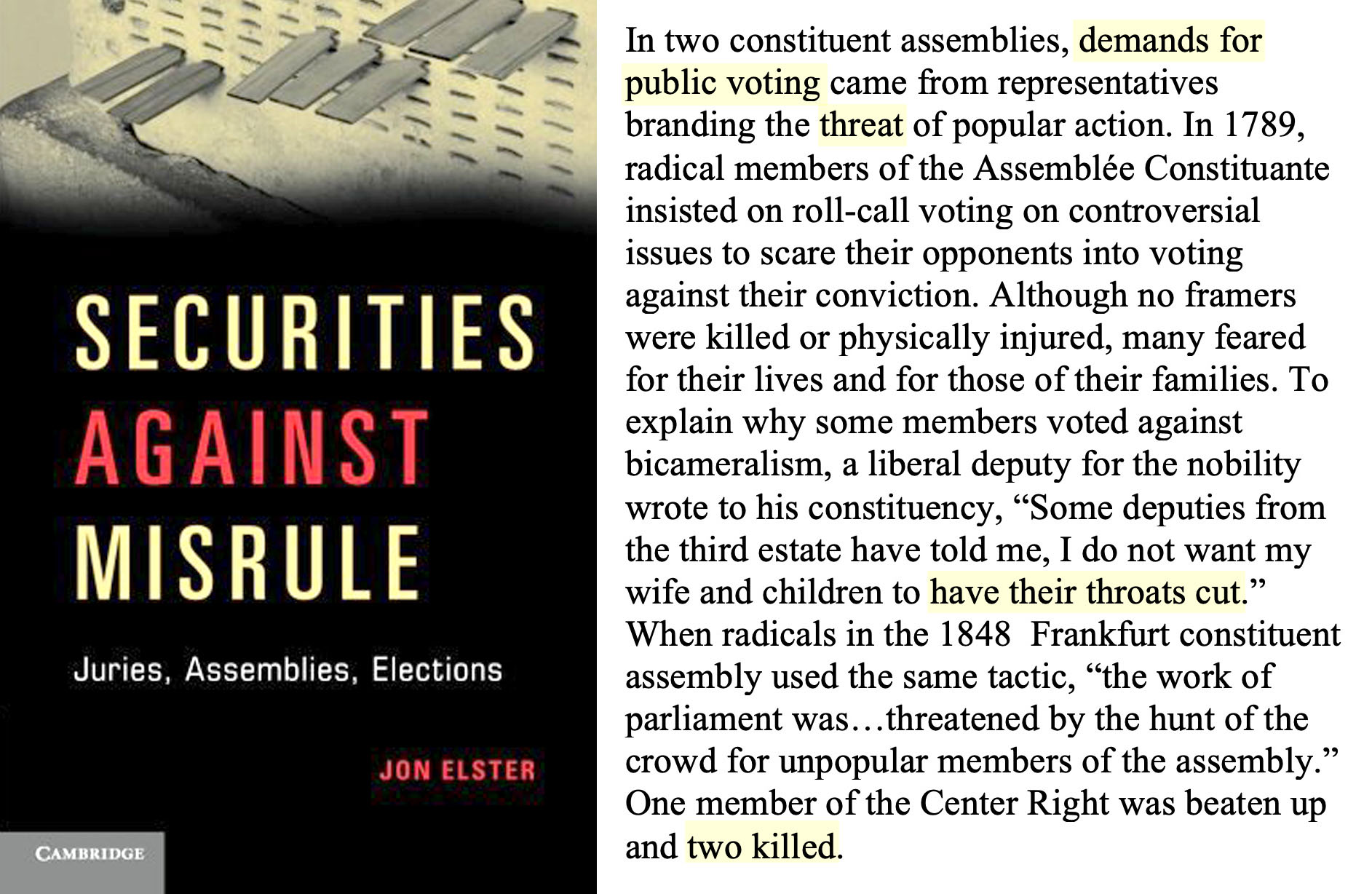
Jon Elster 2013 - Securities Against Misrule
Text: In two constituent assemblies, demands for public voting came from representatives branding the threat of popular action. In 1789, radical members of the Assemblée Constituante insisted on roll-call voting on controversial issues to scare their opponents into voting against their conviction. Although no framers were killed or physically injured, many feared for their lives and for those of their families. To explain why some members voted against bicameralism, a liberal deputy for the nobility wrote to his constituency, “Some deputies from the third estate have told me, I do not want my wife and children to have their throats cut.” When radicals in the 1848 Frankfurt constituent assembly used the same tactic, “the work of parliament was… threatened by the hunt of the crowd for unpopular members of the assembly.” One member of the Center Right was beaten up and two killed.

Jon Elster 2013 - Securities Against Misrule
“Public” opinion takes opinion out of private society and places it in broad daylight, to use one of Tocqueville’s favorite phrases. Public and private are blurred together, and it becomes clear that democracy is government by public opinion. Private opinion – in the sense of what might be reserved to oneself against what most people think – tends to disappear; it proves to have required an aristocratic social state in which independent nobles had the standing to say what they pleased. This shows us why Tocqueville puts little trust in the power of representative institutions to hold out against the people’s desires: public opinion makes the people’s representatives conform to their desires regardless of the apparent latitude that representative offices with constitutional terms might seem to afford. He would have seen the public opinion polls of our day as vivid confirmation, with the aid of science, of the trend he saw already in his day.Harvey Mansfield & Delba Winthrop 2000
Tocqueville: Democracy in AmericaNote: As Toqueville noted, democratic lawmakers are terrified of going against public opinion, no matter how rash. If they do they pay a price. This is one of the reasons why a shelter of secrecy allows lawmakers to deliberate better.
More and more, independent expenditures are focusing on negative campaigns. Independent PACs are becoming the “hit men,” free-wheeling within the political process. Hidden behind the protection of the First Amendment, these PACs are turning to negative campaigns, often times resorting to distortions and innuendoes without proper accountability or balance. I was shocked to learn that 80 percent of the 1982 PAC independent expenditures were for negative oriented campaigns.Rep. Bruce Vento 1983
Hearings on Campaign Finance Reform
The general finding [in the literature] was that heavy spending against a measure tended to lead to the measure's defeat, whereas heavy spending in favor of a measure had minimal effect. That basic finding has held up well in studies using more sophisticated techniques.Arthur Lupia & John G. Matsusaka 2004
Direct Democracy: New Approaches to Old Questions
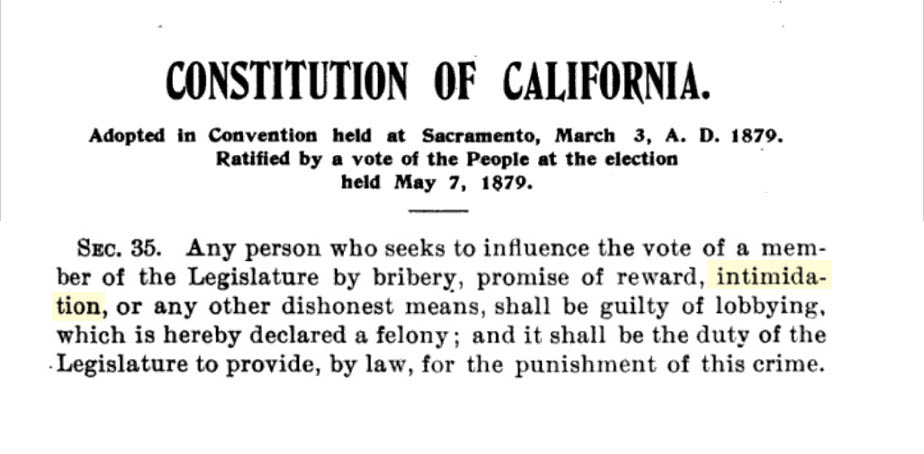
California Constitution 1879 - A Felony to Lobby

California Constitution 1879 - A Felony to Lobby
Gabrielle Giffords, the former U.S. representative, was absolutely right: the minority of senators who blocked common-sense reforms did so based on “political fear and on cold calculations about the money of special interests” like the National Rifle Association. Last year, the N.R.A. outspent the leading gun control lobby 73 to 1. Senators facing tough re-election campaigns ignore the wishes of 90 percent of Americans because they fear the gun lobby could mount a $9 million ad campaign against them.J. Adam Skaggs 2013
In Gun Legislation, Blame the Role of Money
The 2012 campaign cycle was “the greatest windfall” for political operatives in American history, Democratic consultant Hank Sheinkopf has said—a $6 billion spending frenzy unmatched in U.S. politics. So who pocketed all that cash [which is overwhelmingly spent on attack ads]? Most of it went for ads on TV, radio and the Internet, of course; media buys are the biggest expense in any election.Lee Aitken 2014
The Campaign Casino: Elections Have Become a Get-Rich-Quick Scheme, and the Press Is Missing the StoryNote: Given that 95% of dark money is used to purchase attack ads, brubery is likely the principal driver of corruption in government. But the beneficiaries are not politicians, they are the billionaire-owned media giants and political consultants.
In that same election, James Hoffa of the Teamsters Union announced plans to “purge” fifty-six Representatives who had voted for the Landrum-Griffin labor bill in 1959, and the Teamsters contributed financially to the opponents of forty of the fifty-six.Neil MacNeil 1963
Forge of Democracy
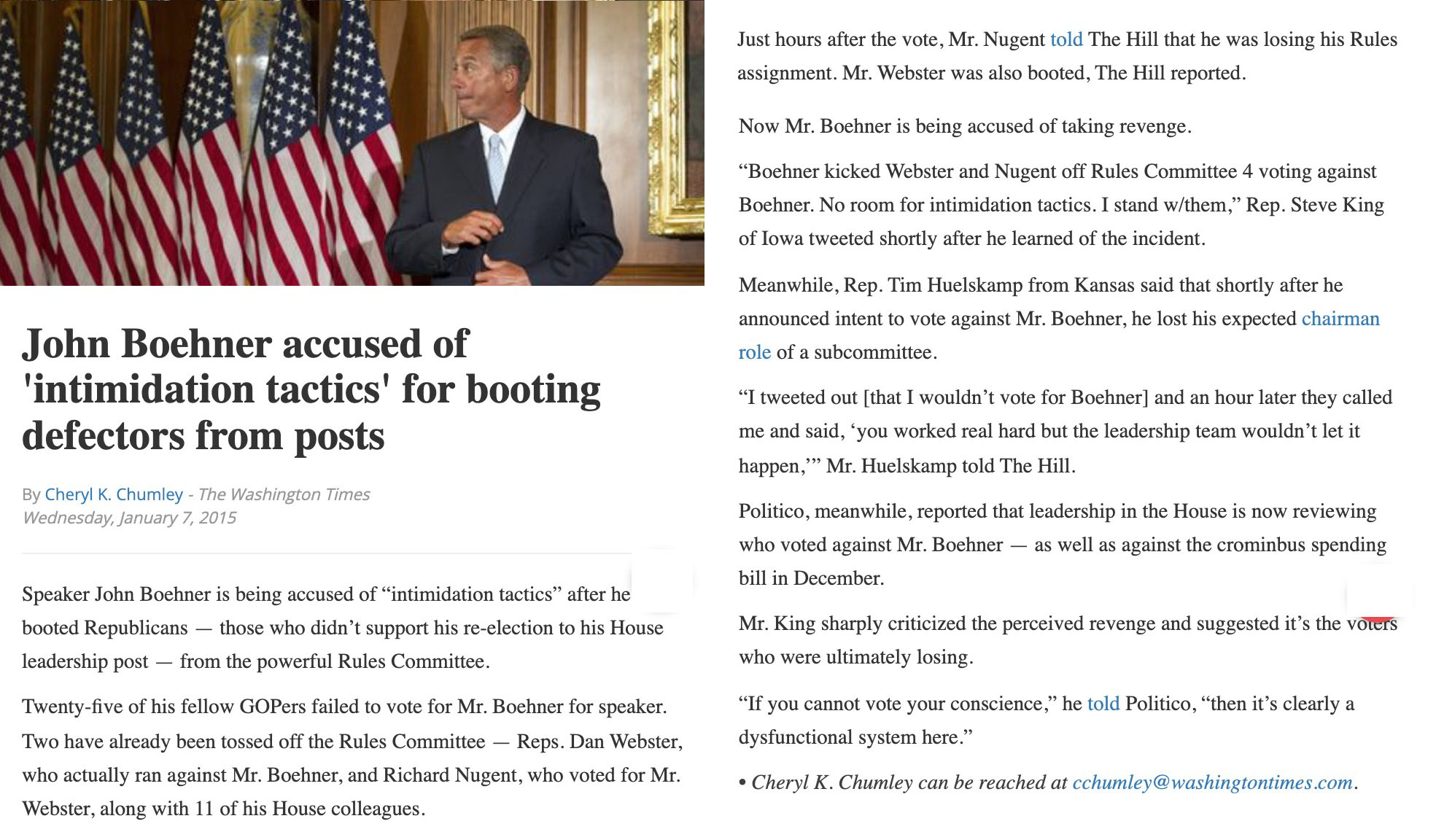
Cheryl K Chumley 2015 - Intimidation Tactics

Cheryl K Chumley 2015 - Intimidation Tactics
The freshmen Republicans had not yet been assigned committees, and there were rumors that Halleck was subtly suggesting that those who voted with Rayburn would receive poor assignments when they were made. William Scranton of Pennsylvania received by telephone a threat to cut off future campaign funds. Neil MacNeil 1963
Forge of Democracy
“Washington establishment consultants advise progressive candidates to send out a tweet saying, ‘we stand with Israel’” because they want to “avoid getting a million dollars spent against them,” he said. “It becomes a real policy question that AIPAC spending has forced.”Alex Kane 2022
AIPAC Spent Big to Defeat Progressives This Election Cycle
Koch’s “proxy army,” as one Rowley reader called it…was occupying the Republican Party, using the threat of well-funded primary challenges to force its elected officials to do the cause’s bidding or lose their seats. Nancy MacLean 2018
Democracy in Chains
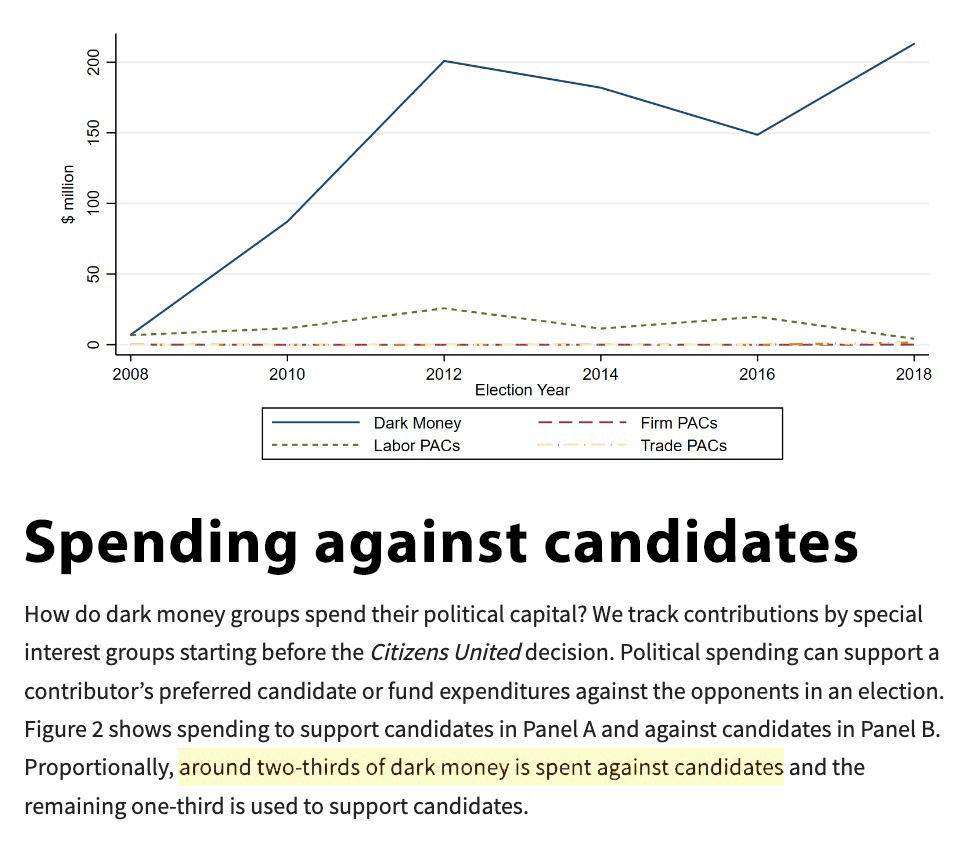
Matthew Denes 2022 - Dark Money Dominates Spending by Special Interest Groups
TEXT: How do dark money groups spend their political capital? We track contributions by special interest groups starting before the Citizens United decision. Political spending can support a contributor’s preferred candidate or fund expenditures against the opponents in an election. Figure 2 shows spending to support candidates in Panel A and against candidates in Panel B. Proportionally, around two-thirds of dark money is spent against candidates and the remaining one-third is used to support candidates. (NOTE: it is likely that that remaining one-third is used as ‘challenger funding’, and is therefore another form of negative/attack spending.)

Matthew Denes 2022 - Dark Money Dominates Spending by Special Interest Groups
Most of this money also is spent against, rather than for, a candidate.Mike Dennison 2020
U.S. Senate contest is now the most expensive campaign in Montana history
“It’s easier to bully politicians than to bully voters” Jim Kessler replies. Recalling that the Manchin-Toomey bill to expand background checks got 55 votes in the senate but fell short of the 60 needed to overcome a filibuster, he says, “If there were a secret ballot in Congress, these gun laws would pass. But there isn’t, and the NRA takes retribution.” Eleanor Clift 2014
NRA Ducks Gun Fight Out West
However, Rep. Tim Huelskamp (R-Kan.) said after the vote that “arm twisting” on Boehner’s behalf was “very intense” with threats that Republicans would lose plum committee assignments or campaign donations from the National Republican Congressional Committee if they opposed the speaker's reelection. Huelskamp is one of four Republican lawmakers who lost key committee assignments recently for reportedly voting against issues that were important to Boehner. “The intimidation and pressure was intense, there are a lot of people that wanted to vote no and today, the last call, the last twisting of arms, convinced them not to do that,” Huelskamp said. “And certainly my vote was one of no confidence. I want conservative leadership, and that has not been provided by the speaker,” Huelskamp said. Asked specifically who was intimidated to cast their votes for Boehner, Huelskamp declined to name names. Huelskamp did add that one freshman lawmaker was called prior to the vote and told their committee seat was “probably gone if you vote your conscience.”Michael Bates 2013
Bridenstine votes against Boehner for speaker
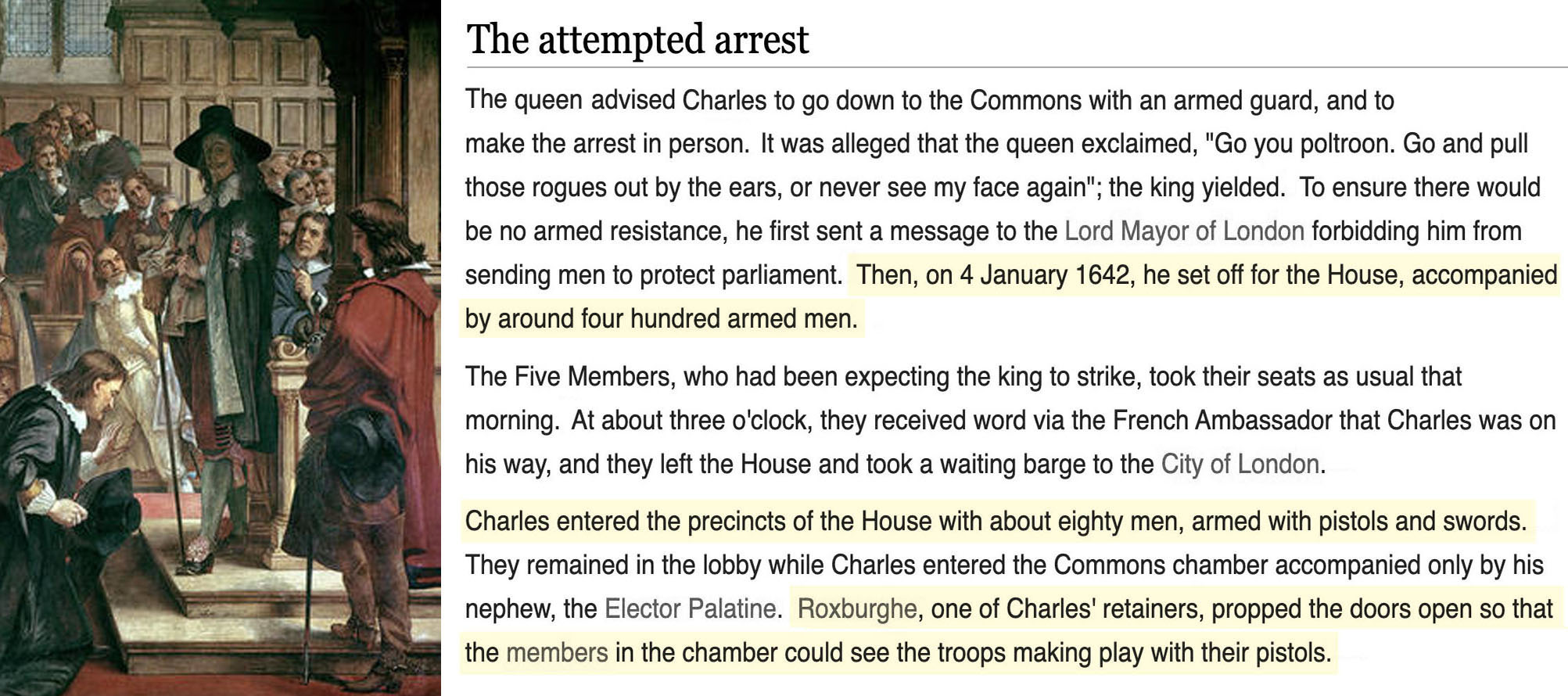
King Charles 1642 - Enters Parliament with armed guards to arrest 5 members who voted against his wishes

King Charles 1642 - Enters Parliament with armed guards to arrest 5 members who voted against his wishes
Negative spending accounted for almost 80% of all independent money spent on U.S. Senate races in 1980.V. Lance Tarrance 1982
Negative Campaigns and Negative Votes
Citizens United constituted a “stimulus package” for broadcast and cable media corporations in 2010, which saw major increases in revenue. Much of this windfall can be attributed directly to the Citizens decision, according to SNL Kagan, which described the 2010 election climate as “a political ad revenue treasure trove for broadcasters”Michael Corcoran 2013
Dark Money Dominates Election
The threat in the budget setting is that total transparency will increase damaging special-interest transfers, by exposing decision makers to intensive scrutiny and threats of electoral retaliation.Elizabeth Garrett & Adrian Vermeule 2006
Transparency in the Budget Process

Anthony King 1997 - Running Scared

Anthony King 1997 - Running Scared
Dark money is very influential and detrimental. For example, Greitens used the large amounts of dark money to threaten legislators. A few stood up to it but most were afraid of it.Jane Dueker 2018
Political Donations
Thomas Paine most probably published Common Sense anonymously because he didn’t want anyone to know it was him or he would be putting his life at risk.Socratic.org 2017
Thomas Paine originally published Common Sense anonymously
Once lobbyists knew your every vote, they used it as ammunition.Fareed Zakaria 2003
Future of Freedom
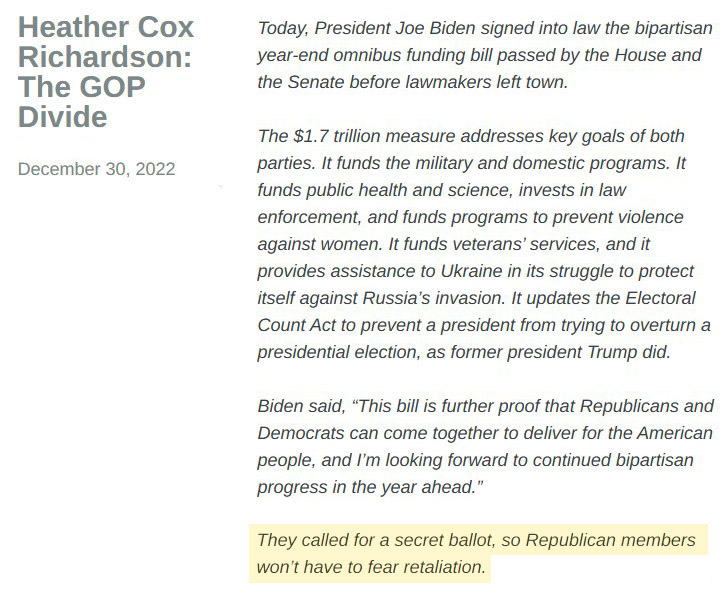
Heather Cox Richardson 2022 – The GOP Divide

Heather Cox Richardson 2022 – The GOP Divide
The game is entirely different when a lobbying group also injects tens of millions of dollars into campaign-season attack ads in order to remove members of Congress who fail to fall in line – and advertises its intentions before those members have even voted on the bills in question... The problem with terror politics is that it distorts the political marketplace.Alyssa Katz 2015
The Influence Machine: The U.S. Chamber of Commerce and the Corporate Capture of American Life.
A first move away from secrecy came in December, when Paul V directed two briefs to the Senate employing strong language to condemn Venice’s laws as leading to damnation. The pope meant to pressurize the Venetian negotiators and for the first time also threatened to proclaim an interdict unless the laws were repealed. The nuncio, who postponed the briefs’ formal presentation, used them as a bargaining tool in his own negotiations. But the pope was also ready to publicize his warning to the Republic. Manuscript copies of the briefs circulated beyond the government to which they were addressed, a kind of publication which was to become common throughout the controversy... By threatening an interdict, the briefs gave sharper edge to a simple jurisdictional dispute.Filippo Di Vivo 2007
Information and Communication in Renaissance Venice
The police union reported that it spent at least $8,732 attacking Kaplan and at least $7,119 on anti-Parker-pro-Brunner mailings. The union also reported that it spent $1,999 on a negative mailer targeting Mario Juarez, a candidate for District 5, Fruitvale-Glenview.Robert Gammon 2012
Oakland Cops’ Union Uses Scare Tactics to Help Amy Lemley
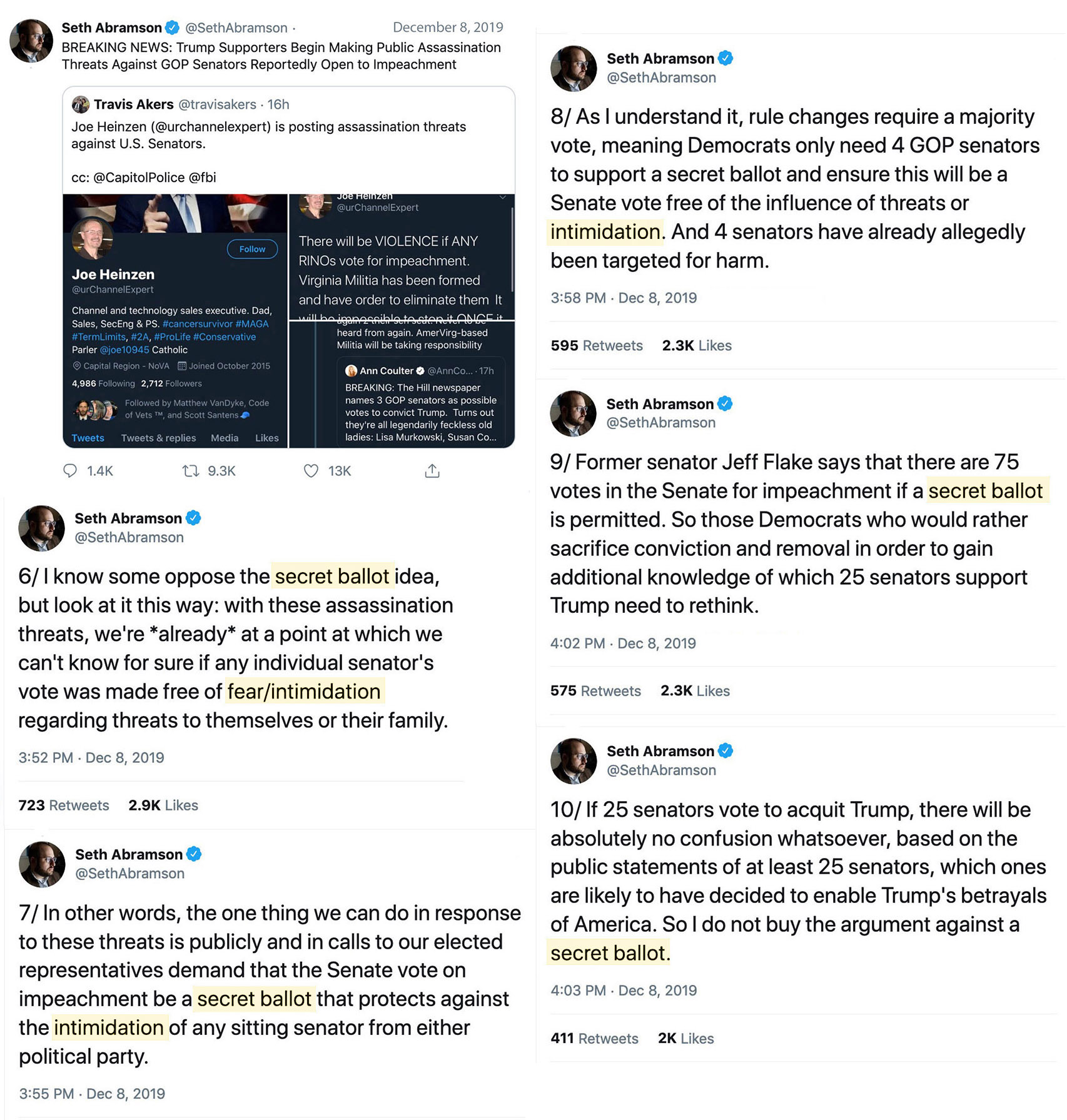
Seth Abramson 2019 – Secret Ballots, Impeachment & Intimidation

Seth Abramson 2019 – Secret Ballots, Impeachment & Intimidation
Contrary to popular opinion, there is not much outright quid pro quo corruption or bribery in Washington these days.Lee Drutman 2015
The Business of America is Lobbying
We really are all impelled by a raw fear – and that raw fear is, I would guess, a fear of what the electorate will do to us, and, of course, maybe that is the primal raw fear in this place.Senator Alan Simpson 1985
Government’s End (Demosclerosis)
One reason that congressional Republicans pursued unpopular tax cuts aggressively and on an accelerated schedule is because they believed that if they did not, some high-dollar Republican donors would withhold financial support for their campaigns. We cannot know if such contributors would actually have failed to finance GOP campaigns in 2018, but it appears that Republicans who responded may have believed that the threat was real.Molly Reynolds 2018
Even the perceived threat of a primary alters behavior in Congress
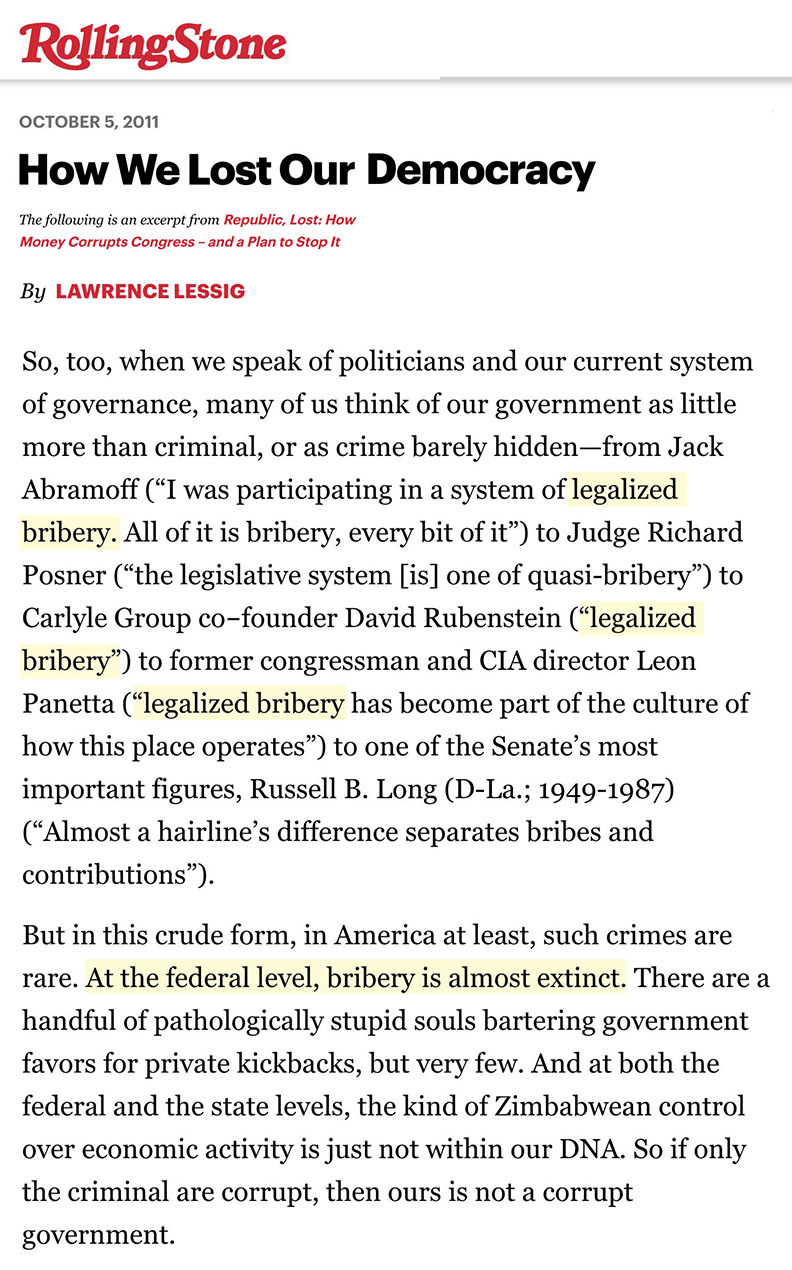
Larry Lessig 2011 - How We Lost Our Democracy
Note: Lessig takes issue with all the claims of ‘legalized bribery‘ noting that bribery hardly exists and that it must be something else driving the corruption (yet, Lessig still appears to not notice the problem of intimidation).

Larry Lessig 2011 - How We Lost Our Democracy
Money influences elections, sure, but legislators aren’t bought and sold, they are intimidated and threatened.James D’Angelo 2016
How Congressional Transparency Favors Special Interests
Health insurance lobbyists actually threaten legislators to go along with their views or suffer the consequences – no more campaign funds, contributions to competitors, etc.Wendell Potter 2009
Bureaucrat Beat
The present is a period fruitful in accusation – much anonymous slander has been and will be vented – no man’s reputation can be safe.Alexander Hamilton 1792
The Papers of Alexander Hamilton
Efforts to find empirical evidence that campaign money impacts policymaking choices have offered scant support for interest group influence. A possible explanation is that the hypothesis that those receiving campaign monies should adjust their policy choices to favor their donor requires the untenable assumption that interest groups and legislators can implement contracts.Justin Fox 2017
Influence without Bribes: A Noncontracting Model of Campaign Giving and Policymaking
A special interest group can condition its contributions not only on the receiving candidate's support but also on that of her opponent. This allows the interest group to obtain support both from contributions as well as from the implicit threat of contributing to the opponent.Ethan Kaplan 2007
The Iceberg Theory of Campaign Contributions: Political Threats and Interest Group Behavior
The transformation of election laws, and the sheer amount of money spent on races, have in the last decade thrown a tremendous advantage to business, which has the power to dominate the airwaves with attack ads. Usually—though not always—those ads succeed in wounding their targets. They also serve as a kind of nuclear deterrent, keeping members of Congress who might think of crossing the Chamber from casting votes they might regret come election time.Alyssa Katz 2015
Influence Machine: Chamber of Commerce and Corporate Capture
Donors coerce politicians, and politicians coerce donors... to refuse to accept a gift, and sometimes even to refuse to give one, is “the equivalent of a declaration of war.”Clawson, Neustadtl & Weller 1998
Dollars and Votes
We will never use emotional copy or attack candidates based on personalities. We will only attack on the issues or on the voting record of incumbents.Lobbyist James G. Aldige (Viguerie) 1983
Hearings on Campaign Finance Reform
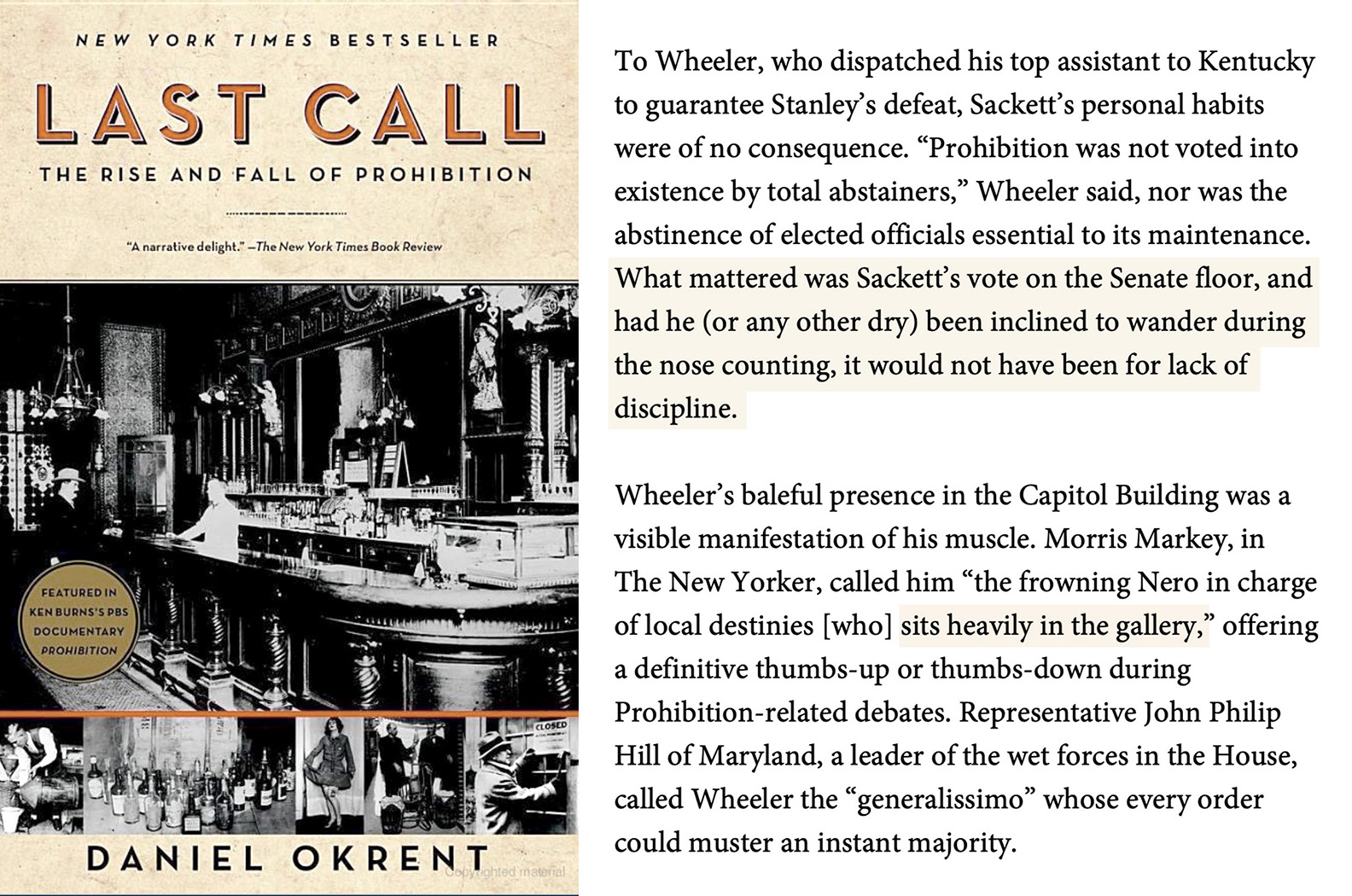
Daniel Okrent 2010 - Last Call (nose counting from the gallery)
During the debates and passage of the prohibition amendment, the most powerful special interest in the country, Wayne Wheeler of the Anti-Saloon League, sat in the gallery and watched members’ votes - ready to punish them for any ‘mistakes.’

Daniel Okrent 2010 - Last Call (nose counting from the gallery)
A lifetime member of the NRA, representative Debra Maggart said the group poured money into her small district, attacking her from every angle. She says they created a “Defeat Maggart” website, and used billboards, robocalls, radio ads, YouTube videos and 12 full-page newspaper ads to drive her from office.Samuel Burke 2012
The risk of daring to disagree with the NRA
House Speaker John Boehner and his leadership team are urging them to support his “Plan B” to avoid the automatic tax hikes of the “fiscal cliff.” But they’re also facing pressure from outside groups that could mount primary challenges against them if they do… What he’s talking about is members “getting primaried.” It’s not a real verb, but it is a real threat — with well-funded outside groups like the Club for Growth saying they will be watching these votes closely.Tamara Keith 2012
House Republicans Face Threat Of Primary Challenges In 'Plan B' Vote
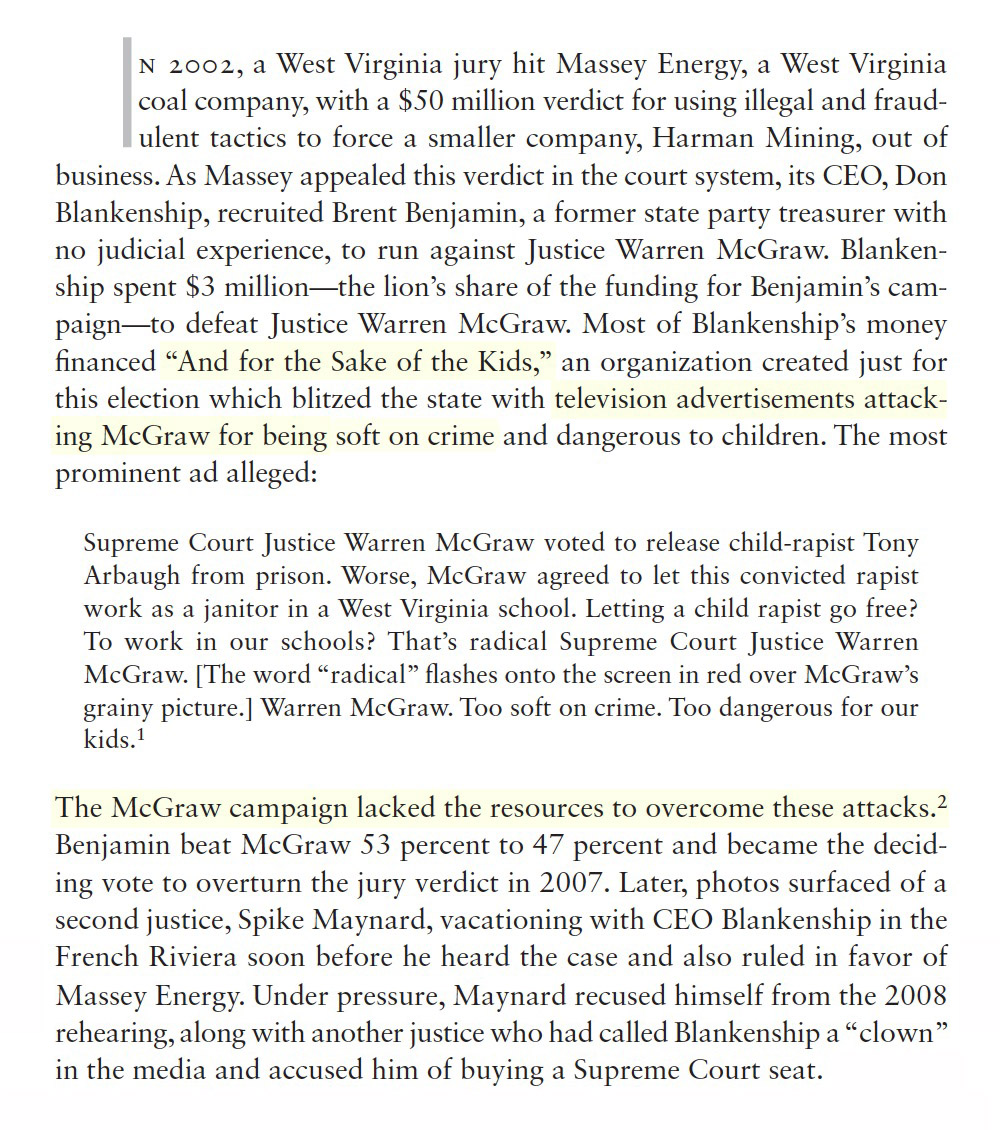
Jed Handelsman Shugerman 2012 - The People’s Courts (Crime)

Jed Handelsman Shugerman 2012 - The People’s Courts (Crime)
Most representatives and senators believe that they operate in a political system in which any serious attempts at change produce instant, well-organized opposition from the small minority who are hurt by the change. And it is these minorities who really run WashingtonFareed Zakaria 2003
Future of Freedom
Donors often call Open Secrets furious that their donations were not listed on the watchdog’s website. Clearly the recipient of the donation knows the money came in. So why the fury? The only logical explanation would be that the donor seeks to intimidate other candidates and legislators who otherwise would not know that the donor is spending to influence legislation.James D’Angelo 2016
The Pitfalls of Congressional Transparency
Corporate lobbying expenditures now dwarf the comparable investments of unions and “diffuse interest” groups… Corporations now have political operations whose savyy and scope would have seemed unfathomable even a half-century ago… They can send clear messages that they are ready to act aggressively should anybody threaten their favored policies.Lee Drutman 2015
The Business of America is Lobbying
Another benefit for both contributor and incumbent has to do with the importance of “early money” – that portion of an incumbent’s war chest that is in the bank before a challenger even comes forward. Here, reporting has a sort of prophylactic effect by sending a message to would-be challengers to stay home and tend to their insurance business, law practice or grandchildren. Disclosure of massive contributions to an incumbent can scare off potential challenger who have yet to raise their first dollar.Christopher T Robertson, Aaron S Kesselheim 2016
Blinding as a Solution to Bias
The point of a war chest is to amass reserves that scare off high–quality challengers. If the scare–off effect were to occur, then incumbents would not have to spend as much money in a campaign.Brandon Slotkin 2016
You Can Rely on the Old Man’s Money
A suspicious shell corporation called Triad Management Services… had paid more than $3 million for unusually harsh attack ads against Democratic candidates in twenty-nine races.Jane Mayer 2016
Dark Money
The HLC office in Washington became a war room for the special interests united in their opposition to price controls...HLC was going to conduct a fearmongering campaign against the Clinton plan that the insurance companies, drug companies, and hospital systems could not conduct themselves without appearing self-serving.Wendell Potter 2010
Deadly Spin
As one author noted in 1764, if essayists were forced to print their names, “The Cause of Liberty would often be left to suffer” because they would have made themselves vulnerable to the “Clamour of Party, or the Resentment of Power.” This applied to many of those who argued against the ratification of the Constitution in 1787 and 1788 and against Publius. Despite pressure to reveal their names, they used pseudonyms to protect themselves. In that polarized climate, more than one writer suggested that it was “unsafe to be known to oppose” the proposed Constitution, so true anonymity was necessary to participate in politics.Jordan E. Taylor 2018
Anonymous criticism helped make America greatNote: Madison and Hamilton wrote the Constitution, Federalist Papers, Bill of Rights and even their nullification acts under the shelter of anonymity
Describing Heritage Action’s strategy, Feulner and Needham wrote that it would “guarantee that when a wavering congressman thinks of voting for higher taxes, increased regulation, or a weaker national defense, television ads in his home district will remind him that a vote for bigger government is a vote for less freedom.” The pair also wrote that these advertisements would be supplemented by Heritage Action advocates in every state who would visit members of congress in their home offices and let them know to “vote the right way or start looking for a new line of work.”Influence Watch 2022
Heritage Foundation
Leah Stokes on The Appeal 2020
Fossil fuel companies fund primary challengers Full talk
Leah Stokes on The Appeal 2020
Fossil fuel companies fund primary challengers
Whereas legislative secrecy indirectly protects legislators from [Presidential threats], the Speech and Debate Clause does so directly by constricting the executive's opportunities… the clause is an incomplete substitute for secrecy, because the executive may use carrots as well as sticks, bribes as well as threats. Yet bribes are more expensive than threats, since a credible threat that deters its targets from disobedience is costless if the threatener never has to incur the costs of actually punishing those targets. Adrian Vermeule 2004
The Constitutional Law of Congressional Procedure
Principles of lobbying: start early, line up commitments and reinforce constantly until the vote occurs. Congressmen and legislative staff should be voting right, not purely based on the persuasiveness of our positions, but on the real fear that if they break their word, they will pay a political price for doing so.John “Terry” Dolan
Secret Contras Lobbying Proposal (Senate Investigations)Note: This citation was pulled from a series of secreet lobbying proposals that were only exposed in the Senate investigations surrounding the Iran-Contra affairs. These documents give remarkable insight into the aggressive world of lobbying and the secretive tactics of one of the most feared lobbyists - NCPAC’s chairman Terry Dolan. In the proposal, Dolan refers to Members of Congress as ‘targets’ and time and again he makes it clear that the goal is not to flatter, bribe or cajole the representatives, but instead to coerce them with overt and secretive forms of intimidation. Dolan’s goal is the absolute control of Member’s publicly recorded votes.
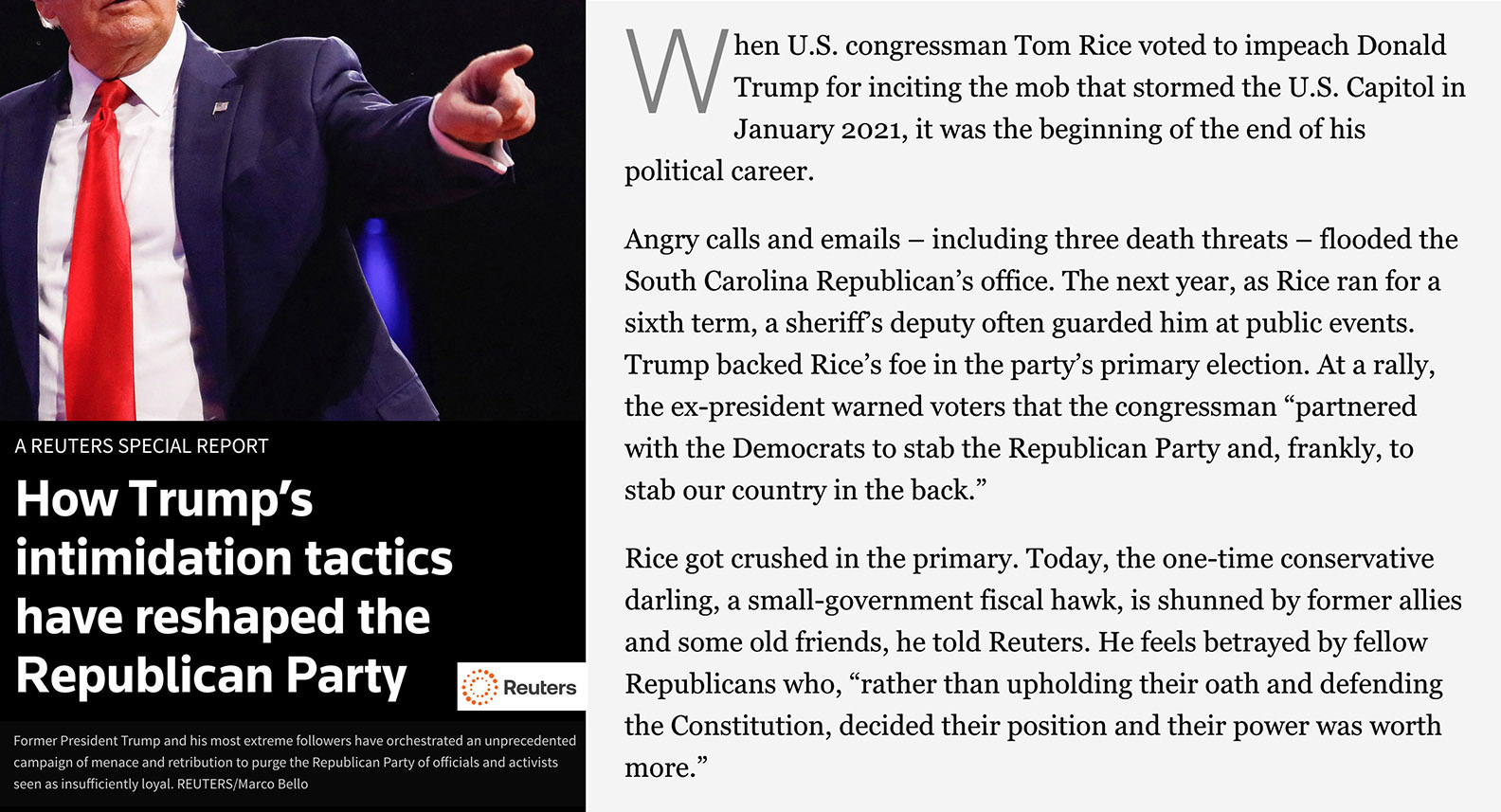
Peter Eisler and Ned Parker 2024 - How Trump’s intimidation tactics have reshaped the Republican Party
Text: When U.S. congressman Tom Rice voted to impeach Donald Trump for inciting the mob that stormed the U.S. Capitol in January 2021, it was the beginning of the end of his political career. Angry calls and emails – including three death threats – flooded the South Carolina Republican’s office. The next year, as Rice ran for a sixth term, a sheriff’s deputy often guarded him at public events. Trump backed Rice’s foe in the party’s primary election. At a rally, the ex-president warned voters that the congressman “partnered with the Democrats to stab the Republican Party and, frankly, to stab our country in the back.” Rice got crushed in the primary. Today, the one-time conservative darling, a small-government fiscal hawk, is shunned by former allies and some old friends, he told Reuters. He feels betrayed by fellow Republicans who, “rather than upholding their oath and defending the Constitution, decided their position and their power was worth more.”

Peter Eisler and Ned Parker 2024 - How Trump’s intimidation tactics have reshaped the Republican Party
Despite an outcry about shadowy spending, AFP spent a record amount of money on television ads, and the tax increase was defeated. Jane Mayer 2016
Dark Money
The only senior member reported never to have engaged in a filibuster had been so successful with threats to filibuster that he never actually had to engage in one.Barbara Sinclair 1989
Transformation of the US Senate
(Spielberg's 2012 Lincoln movie) invents a series of quick scenes involving fictional congressmen and the bribes that it takes to sway them. The most notable example of this corruption involves Rep. Clay Hawkins of Ohio (Walton Goggins) who Bilbo/Spader initially switched with the promise of a postmastership in Millersburg, Ohio. The movie actually has President Lincoln himself commenting cynically on this news by remarking, “He’s selling himself cheap, ain’t he?”. All of this is made up. There was a single lame duck Democratic congressman from Ohio who switched his vote in favor of the antislavery amendment in January 1865 but his name was Wells A. Hutchins and he did not receive any post-war patronage appointment in the federal government. Nor was he much recognizable in the character of Clay Hawkins. In real life, Hutchins was a reasonably tough, independent-minded Democrat who had voted to support the abolition of slavery in the District of Columbia in 1862 and who had backed the Lincoln Administration on several controversial issues during the war, including the suspension of habeas corpus or civil liberties – an issue that was especially unpopular among Ohio Democrats. Understanding this background helps explain why he was a lame duck in 1865 and why he was a natural target for supporting the amendment. It had nothing to do with hunting, drinking or patronage. According to LaWanda and John Cox, the lobbyists, especially Bilbo, spent most of their time in New York (not Washington) generally attempting to persuade influential Democratic newspapers (such as the New YorkWorld) and the state’s Democratic governor (Horatio Seymour) to send signals that would allow wavering lame duck Democrats to feel more confident about switching their votes.Matthew Pinsker 2013
How the “Lincoln” Movie Invented Its Lobbying Scenes
Donald Trump 2020 - Arm Twisting Legislators and Making them Cry
Transcript starting at 1:31:51 Trump: “Criminal justice reform, Obama and Joe didn't do it. I don't even think they tried. They might have wanted to do it, but if you had to see the arms I had to twist to get that done, it was not a pretty picture, and everybody knows it, including some very liberal people that cried in my office – two weeks later they are out saying, we have to defeat him.”
Donald Trump 2020 - Arm Twisting Legislators and Making them Cry
When votes look as though they may be close, clever leaders seek out those members, often cross-pressured already, whose votes might be tipped in their direction most cheaply. Leaders then induce them - through compromises, side payments, and threats – to pledge their votes should they be needed.David King & Richard Zeckhauser 2003
Vote-Buying Requires Transparency
It’s time to eliminate television coverage from Supreme Court confirmation hearings. These Senate proceedings continue to devolve into an opportunity for politicians to play to the cameras, mollify their political bases, and create soundbites that will make effective campaign commercials for the next election cycle.Joe Ferullo 2022
Eliminate television coverage from Supreme Court
Two of the rougher Supreme Court nomination hearings in recent memory happened to take place during midterm election years: Jackson’s now in 2022, and Brett Kavanaugh’s in 2018. Rather than turning on key matters of judicial philosophy and temperament, both proceedings became proxy battles for issues that mattered most to base voters.Joe Ferullo 2022
Eliminate television coverage from Supreme Court
Members of Congress who’ve been “primaried” from their party’s ideological extreme are less likely to co-sponsor legislation with someone from the other party. In fact, I find that about one-fourth of the increase in polarization in Congress over the last four decades can be attributed to the increased threat of being “primaried.”Richard C. Barton 2022
Congress is polarized. Fear of being ‘primaried’ is one reason.
Donald Trump has promised a presidency of “retribution” if he wins another term in office. Many Republicans fear they might face the brunt of it. The former president has threatened to have donors to his Republican opponent Nikki Haley “permanently barred” from his orbit. A top adviser has vowed to destroy the career of Rep. Bob Good (R-Va.), House Freedom Caucus chairman, after he endorsed another Trump challenger, Florida Gov. Ron DeSantis. The Trump campaign has also attempted to condemn former aides who worked for his rivals during the GOP nomination fight and have twisted arms demanding endorsements, telling lawmakers that Trump will remember exactly when they backed him. Cut through the 2024 election noise. Get The Campaign Moment newsletter. “MAGA disowns her and anyone else that associates/works with her,” read a recent Trump campaign social media message targeting the Trump campaign’s 2020 communications director for working last year to elect DeSantis. “TRAITOR!” Even new House Speaker Mike Johnson (R-La.) has been dragged into the crossfire. One of his top political consultants, Jason Hebert, works for Axiom Strategies, a consulting company that advised the DeSantis presidential effort. A Trump adviser called Johnson after he won the speakership to warn him not to work with Axiom, according to multiple people familiar with the call, who like others spoke on the condition of anonymity to disclose internal details. Hebert, a college friend of Johnson’s, is expected to start billing his work for Johnson through a company not tied to Axiom, one of the people said. The high-dollar donor community, which has been told in various ways to rally quickly behind Trump, has taken notice. “People took that as, ‘I am going to be president and I am going to investigate you,’” said Katon Dawson, a former South Carolina GOP chairman and Haley backer, when Trump threatened to punish her donors. “There is always a threat. If you are not for him he’s against you.” Josh Dawsey & Michael Scherer 2024
Republicans fear they will be targets in Trump’s retribution campaign
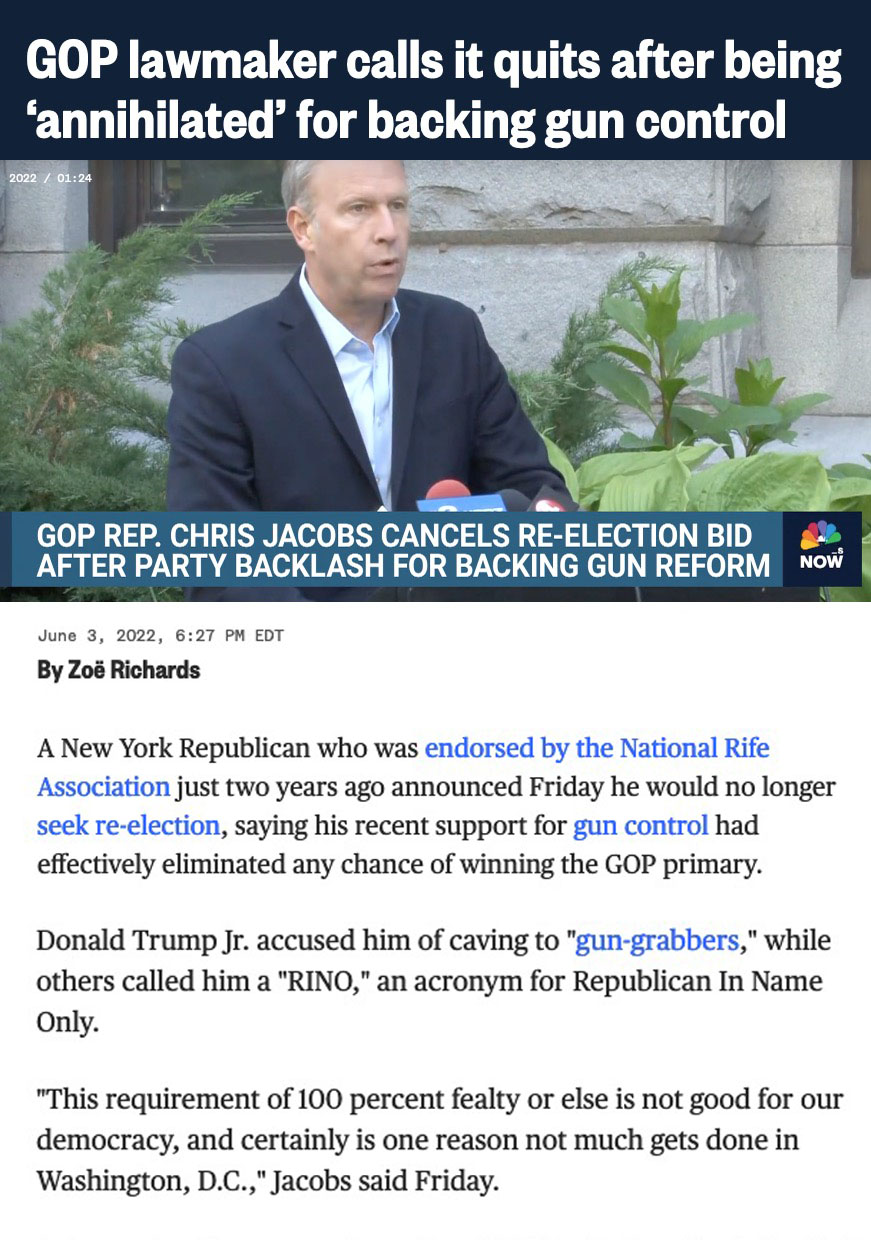
GOP lawmaker calls it quits after being ‘annihilated’ for backing gun control 2022

GOP lawmaker calls it quits after being ‘annihilated’ for backing gun control 2022
...the power of lobbyists to terrorize Congress into gutting Bill Clinton’s timid gasoline tax does...K.T. Berger 1993
Driving us to destruction
Did this great wilderness of millionaire seed men petition Congress or this committee? Where are their petitions? No ; they worked the newspapers, and the newspapers are trying to terrorize Congress.Representative Gaines 1906
Congressional Record
Many of the ads that dominated airwaves – especially from the out-side groups – were notably inaccurate. A six-month study conducted by the Annenberg Public Policy Center on behalf of the Center for Responsive Politics in early 2012 concluded that “campaign attack ads from outside groups are about 85 percent false”. They were also more likely to focus negatively on the preferred candidate’s opponent. A report from the Wesleyan Project found that 86 percent of interest group ads mentioned the opponent (versus 53 percent of candidate-sponsored ads). Outside groups’ ads, the Wesleyan Project found, produced nearly 60 percent of all political ads – way up from just over 3 percent of ads in the 2008 election.Michael Corcoran 2013
Dark Money Dominates Election
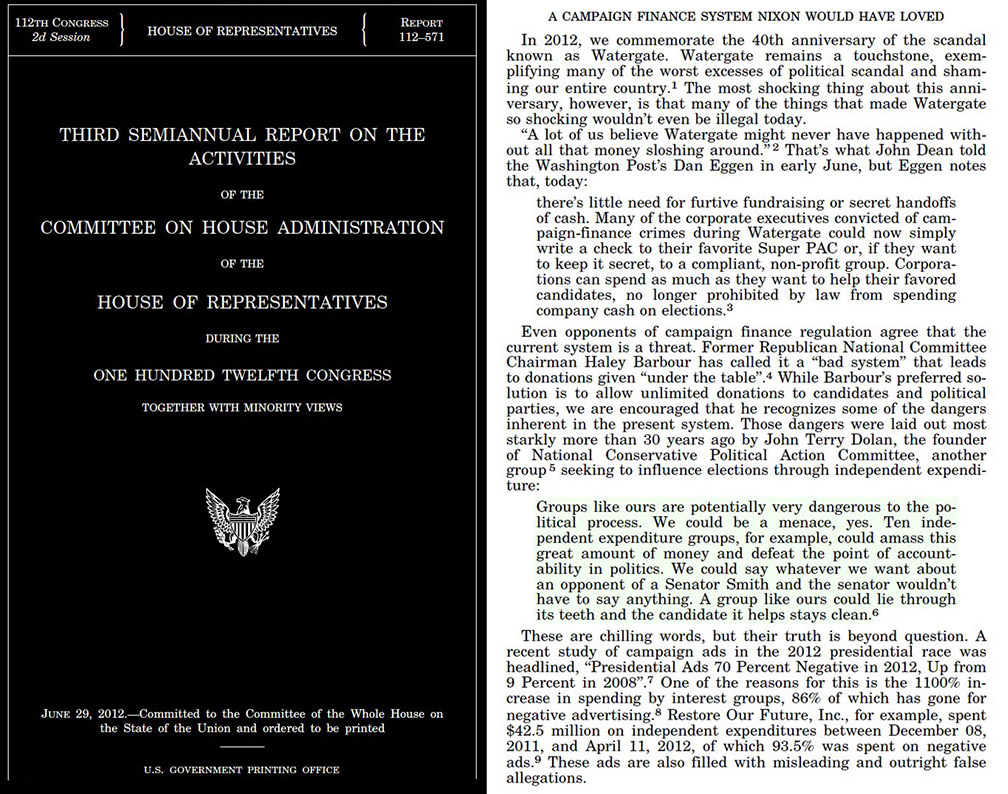
Rep Charles A. Gonzalez 2012 - Congressional Forum Reviewing the Impact of Citizens United
A CAMPAIGN FINANCE SYSTEM NIXON WOULD HAVE LOVED In 2012, we commemorate the 40th anniversary of the scandal known as Watergate. Watergate remains a touchstone, exemplifying many of the worst excesses of political scandal and shaming our entire country.1 The most shocking thing about this anniversary, however, is that many of the things that made Watergate so shocking wouldn’t even be illegal today. “A lot of us believe Watergate might never have happened without all that money sloshing around.” That’s what John Dean told the Washington Post’s Dan Eggen in early June, but Eggen notes that, today: there’s little need for furtive fundraising or secret handoffs of cash. Many of the corporate executives convicted of campaign- finance crimes during Watergate could now simply write a check to their favorite Super PAC or, if they want to keep it secret, to a compliant, non-profit group. Corporations can spend as much as they want to help their favored candidates, no longer prohibited by law from spending company cash on elections.3 Even opponents of campaign finance regulation agree that the current system is a threat. Former Republican National Committee Chairman Haley Barbour has called it a ‘‘bad system’’ that leads to donations given “under the table”. While Barbour’s preferred solution is to allow unlimited donations to candidates and political parties, we are encouraged that he recognizes some of the dangers inherent in the present system. Those dangers were laid out most starkly more than 30 years ago by John Terry Dolan, the founder of National Conservative Political Action Committee, another group 5 seeking to influence elections through independent expenditure: Groups like ours are potentially very dangerous to the political process. We could be a menace, yes. Ten independent expenditure groups, for example, could amass this great amount of money and defeat the point of accountability in politics. We could say whatever we want about an opponent of a Senator Smith and the senator wouldn’t have to say anything. A group like ours could lie through its teeth and the candidate it helps stays clean.6 These are chilling words, but their truth is beyond question. A recent study of campaign ads in the 2012 presidential race was headlined, “Presidential Ads 70 Percent Negative in 2012, Up from 9 Percent in 2008”. One of the reasons for this is the 1100% increase in spending by interest groups, 86% of which has gone for. negative advertising.8 Restore Our Future, Inc., for example, spent $42.5 million on independent expenditures between December 08, 2011, and April 11, 2012, of which 93.5% was spent on negative ads.9 These ads are also filled with misleading and outright false allegations.

Rep Charles A. Gonzalez 2012 - Congressional Forum Reviewing the Impact of Citizens United
With exceptions so rare that they are regarded as miracles and freaks of nature, successful democratic politicians are insecure and intimidated men. They advance politically only as they placate, appease, bribe, seduce, bamboozle, or otherwise manage to manipulate the demanding and threatening elements in their constituencies. The decisive consideration is not whether the proposition is good but whether it is popular—not whether it will work well and prove itself but whether the active, talking constituents like it immediately. Politicians rationalize this servitude by saying that in a democracy public men are the servants of the people.Walter Lippman 1955
Essays in Public Philosophy
There are Members [of Congress] who are intimidated by the gun lobby and the NRA.Rep. Maxine Waters 2016
Congressional Record
Les Moonves, the chief executive of CBS Corporation, cheered on Donald Trump during an investor presentation Monday and called the flood of campaign advertising dollars “phenomenal.” Though media companies have cast themselves as neutral observers of the election process, they have quietly lobbied to keep the floodgates of big money open. The National Association of Broadcasters, a lobby group for the media industry, has worked to block bipartisan campaign finance reform proposals. Moonves, who memorably said in 2012 that “Super PACs may be bad for America, but they’re very good for CBS,” has been even more bullish. On a call with investors in February, he said, “Looking ahead, the 2016 presidential election is right around the corner and, thank God, the rancor has already begun.”Lee Fang 2015
CBS Chief Cheers TrumpNote: Given that 95% of dark money is used to purchase attack ads, brubery is likely the principal driver of corruption in government. But the beneficiaries are not politicians, they are the billionaire-owned media giants.
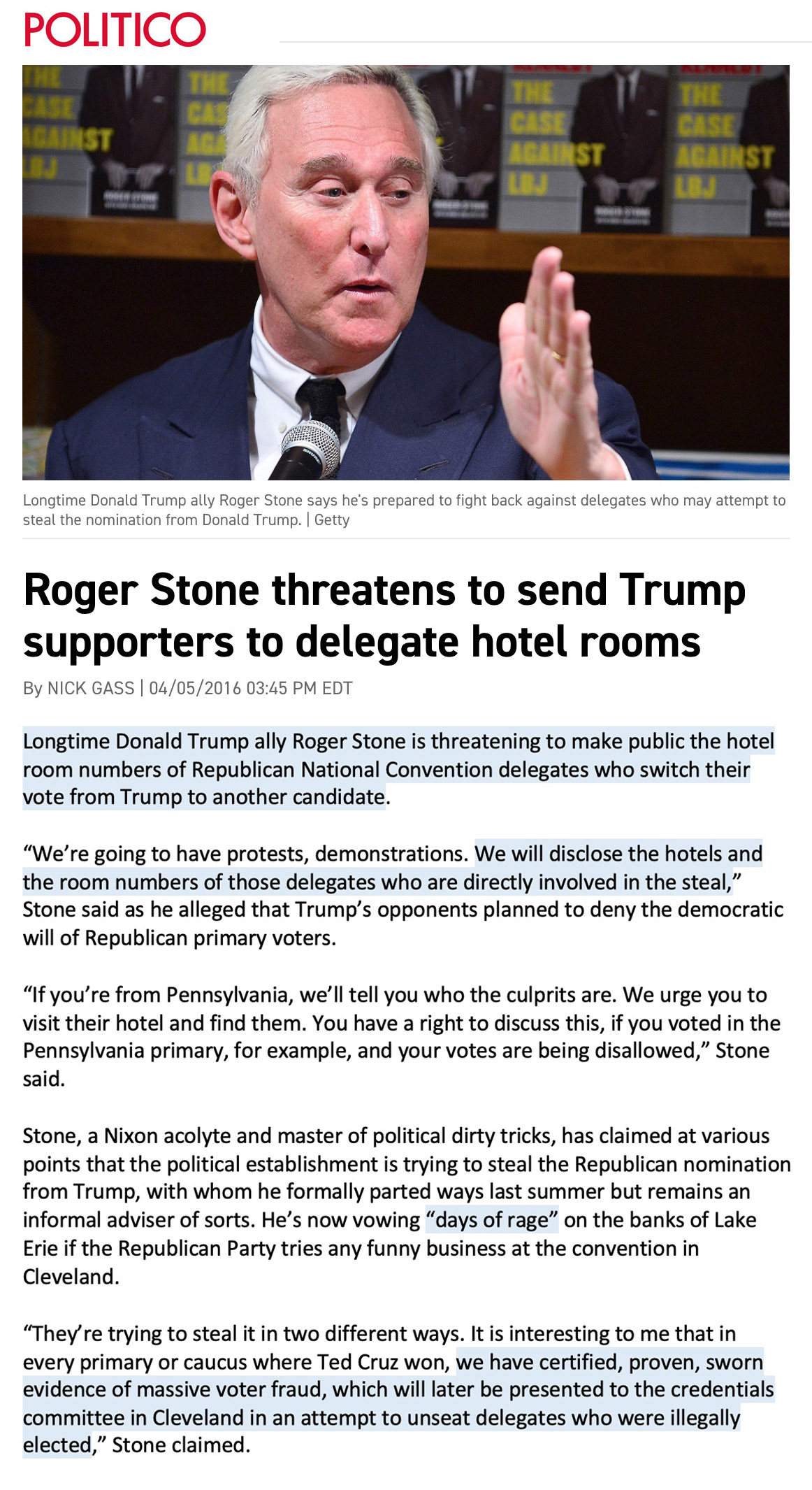
Roger Stone Threatens Voters with Riots 2016

Roger Stone Threatens Voters with Riots 2016
If you’re allowed to drop a $5 million campaign attack into a congressional race, you can just as easily threaten to drop a $5 million campaign attack into a congressional race. And if the threat works, you save the $5 million. Sheldon Whitehouse 2017
Captured
And it’s not just CBS that’s riding high thanks to political ad spending. TV stations in battleground states are magnets for ad spending, and they're driving a new wave of consolidation in the broadcast industry, leaving a handful of big media companies well-positioned to reap hundreds of millions during the 2014 midterm elections and, especially, the 2016 presidential race. Just in the past month, the Gannett company bought 20 TV stations for $1.5 billion, and the Tribune Company inked a $2.7 billion deal for 19 stations. Those deals included stations in battleground states.Andy Kroll 2013
Super PACs Very Good for CBSNote: Given that 95% of dark money is used to purchase attack ads, brubery is likely the principal driver of corruption in government. But the beneficiaries are not politicians, they are the billionaire-owned media giants.
On occasion, groups mobilize a large number of members in an effort to intimidate legislators. Florida’s doctors turned out in the thousands for a visit to the capitol on tort reform. The New Jersey Education Association, in an attempt to get broad-based bargaining on non-wage-related issues, turned out twelve thousand teachers for a march on Trenton. When the New Jersey legislature debated a bill to restrict assault firearms, almost a thousand members of the Coalition of New Jersey Sportsmen and the National Rifle Association held an aggressive demonstration in Trenton. One assemblywoman reacted: “Never in my life have I been subjected to the abuse, the verbal abuse, the vandalism of my office that occurred just this morning.” A senator had a similar reaction: “I’ve never seen that kind of intimidation in sixteen years.” But the gun enthusiasts had certainly made their point and many legislators—like it or not—got the message.Alan Rosenthal 2000
The Third House: Lobbyists and Lobbying in the States (gun control)
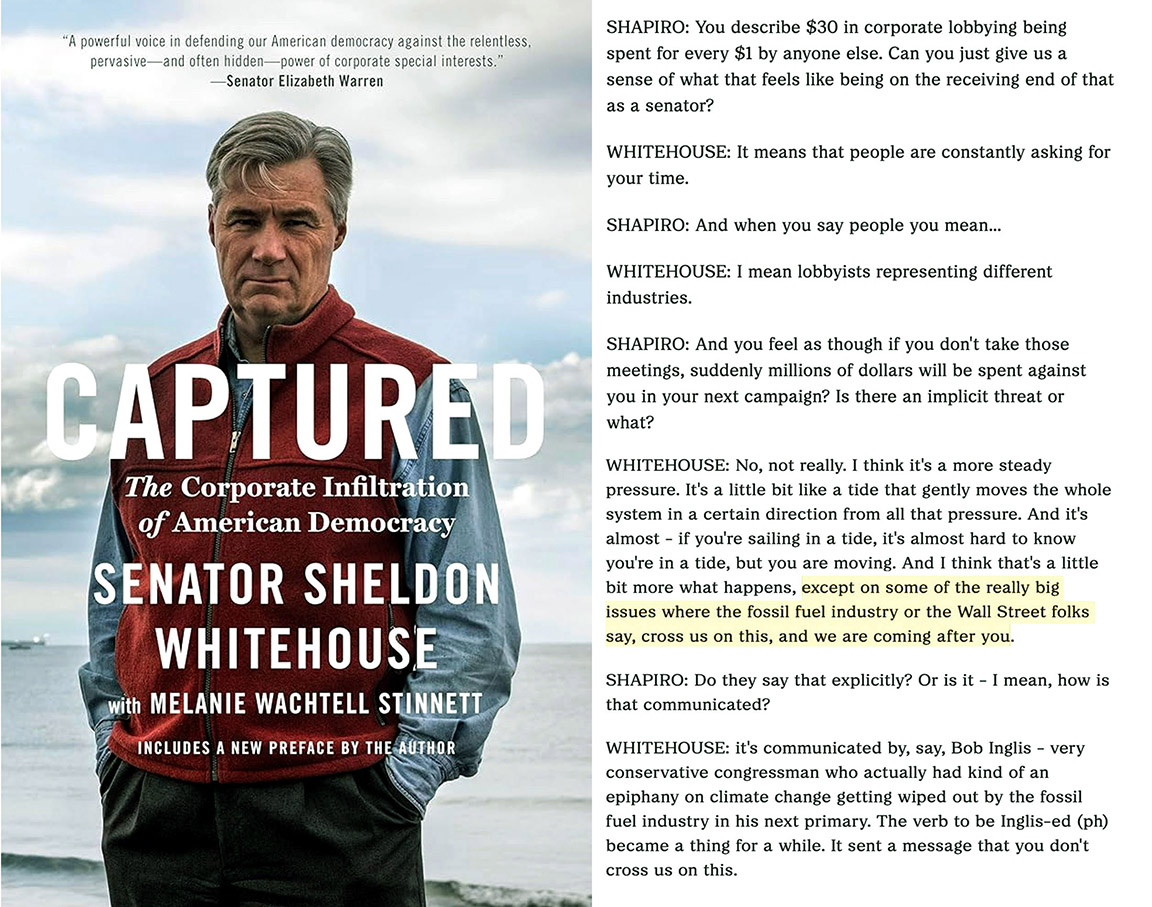
Ari Shapiro & Senator Sheldon Whitehouse 2017 - Inglis, Climate, and Terrorism
WHITEHOUSE: No, not really. I think it's a more steady pressure. It's a little bit like a tide that gently moves the whole system in a certain direction from all that pressure. And it's almost - if you're sailing in a tide, it's almost hard to know you're in a tide, but you are moving. And I think that's a little bit more what happens, except on some of the really big issues where the fossil fuel industry or the Wall Street folks say, cross us on this, and we are coming after you. SHAPIRO: Do they say that explicitly? Or is it - I mean, how is that communicated? WHITEHOUSE: it's communicated by, say, Bob Inglis - very conservative congressman who actually had kind of an epiphany on climate change getting wiped out by the fossil fuel industry in his next primary. The verb to be Inglis-ed (ph) became a thing for a while. It sent a message that you don't cross us on this.

Ari Shapiro & Senator Sheldon Whitehouse 2017 - Inglis, Climate, and Terrorism
But when a disciplined, semi-military organization like the police force engages, en masse, in a show of strength outside a building where legislation unwelcome to it is under consideration, the action smacks of intimidationNew York Times 1965
Police at City Hall
Frank Luntz, a Republican pollster who has no clients in this election, believes that ads have become notably meaner. “The goal has become to destroy your opponent,” he says, “not just defeat them.” Mr. Luntz said focus groups often complain that ads are so coarse, they make them cringe and complain, “Enough!” He’ll ask questions for a minute or so, and it soon becomes clear: Despite their disdain, or maybe because of it, voters remember that ad. They quote it. It plays in their mind. It works. Mr. Luntz calls voters, not just politicians, “hypocrites.” “They say they want ads to be positive and informative,” he says, “but parrot what they hear in the negative ones.”Scott Simon 2010
How To Destroy Your Political Opponent
As soon as the new pretrial package had passed, law enforcement and prosecutors launched an all-out offensive against the new laws… Thousands of dollars were driven towards scare-tactics and public disinformation campaigns. Inaccurate information about the impacts of bail reform was fed to the press. Fear-mongering ads and mailers were sent out in droves. Law enforcement organized anti-bail reform events and rallies across the state. Law enforcement’s Willie Horton-esque campaign to pressure elected officials into supporting their pro-incarceration efforts and rollback bail reform intensified in the months leading up to the law’s January 1, 2020 enactment date.Katie Schaffer 2020
Police Unions and Campaign Contributions
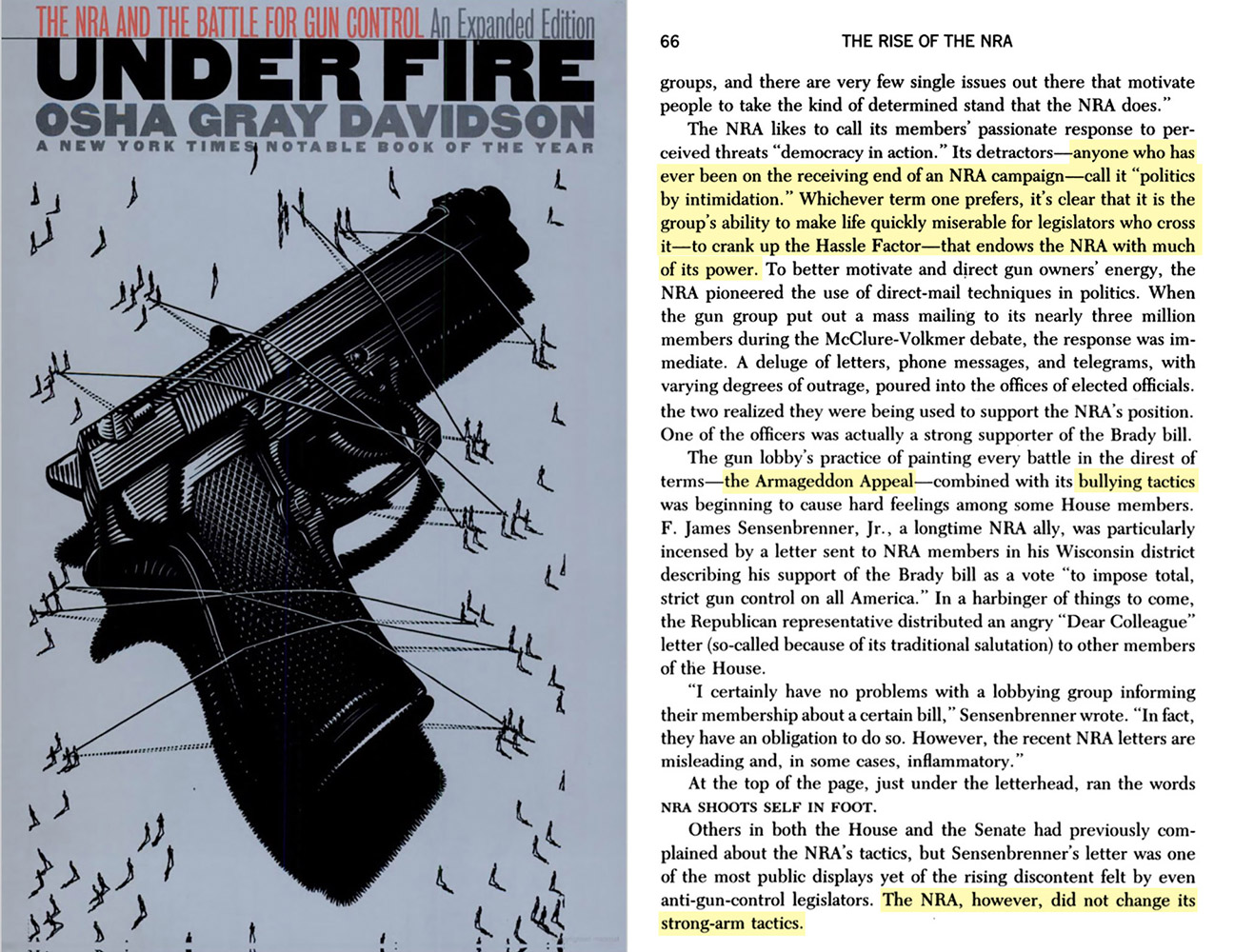
In Under Fire 1998, Osha Gray Davidson discusses how the National Rifle Association uses “Politics by Intimidation” to gain and maintain power.

In Under Fire 1998, Osha Gray Davidson discusses how the National Rifle Association uses “Politics by Intimidation” to gain and maintain power.
“Once just a noun, “primary” has become the most powerful verb in American politics. The threat of getting “primaried” is wielded early and often”Katherine M. Gehl 2021
It’s time to get rid of party primaries
The new soft money is more like a menacing bulge in one’s jacket pocket. It is a threat that adverse consequences, in the form of independent spending against an incumbent legislator, will follow if a wealthy interest group’s lobbying demands are denied.Daniel Tokaji, Renata Strause 2014
How Sausage is Made
Article IV, Section 15: A person who seeks to influence the vote or action of a member of the Legislature in the member's legislative capacity by bribery, promise of reward, intimidation, or other dishonest means, or a member of the Legislature so influenced, is guilty of a felony.California State Constitution 2024
Article IV
Imagine a deep-pocketed and domineering special interest lobby that uses menacing scare tactics, bombastic marketing and sizable campaign donations to expand its power at the expense of public safety. You may think of the National Rifle Association. But there’s another powerful organization in town that employs intimidating strategies to drive reactionary policy at the cost of progress — the San Francisco Police Officers Association.Anand Subramanian & John Crew 2018
SF Chronicle - Op-ed
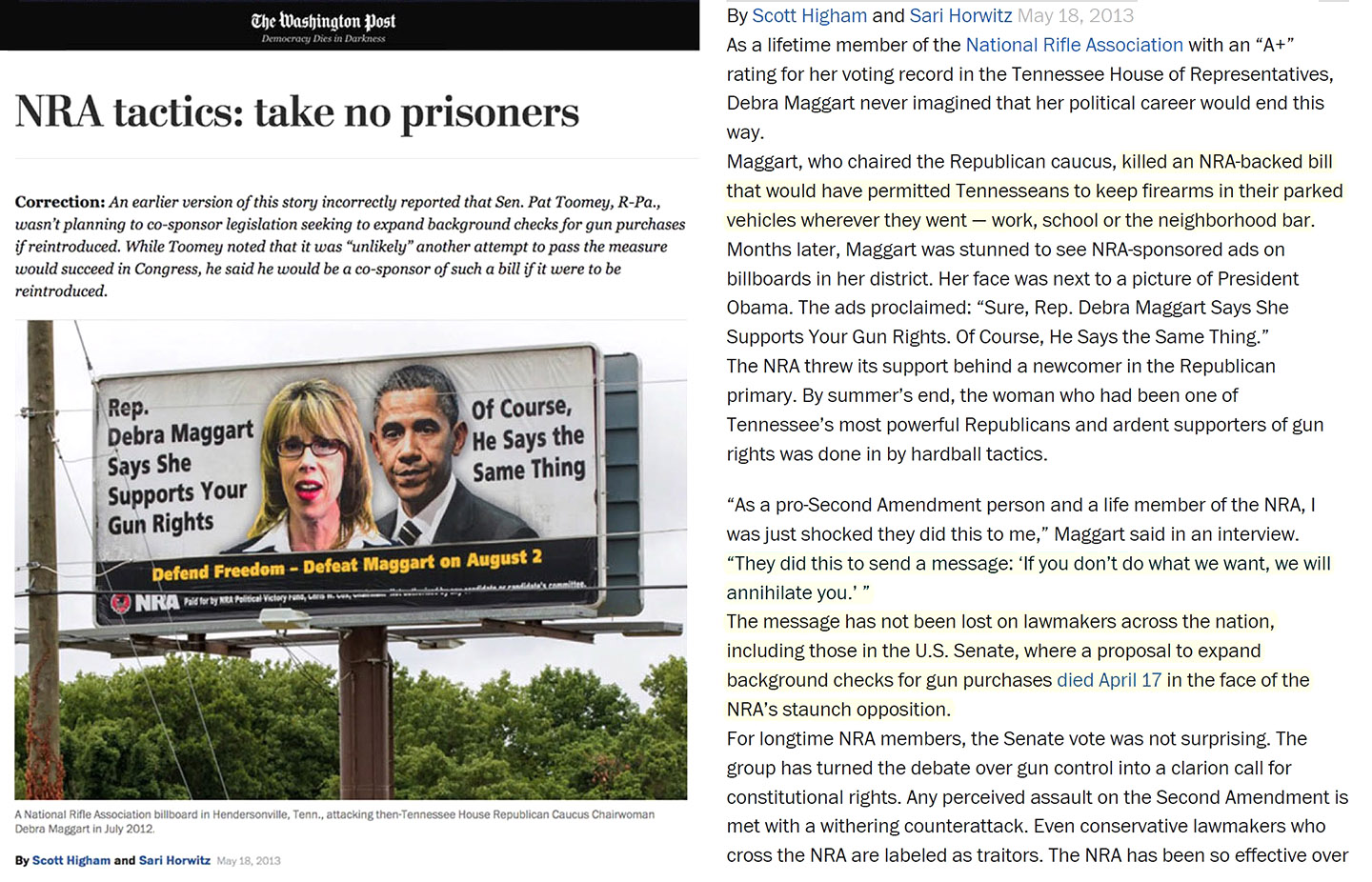
Hingham & Horowitz 2013 - NRA tactics: take no prisoners

Hingham & Horowitz 2013 - NRA tactics: take no prisoners
Burdick began receiving, as she puts it, “the usual threatening e-mails” — as did a fellow gun control advocate in the Legislature, Mitch Greenlick. He told The Oregonian that the e-mail he received from gun extremists was often abusive, obscene and anti-Semitic. He predicted that gun legislation would go nowhere because legislators were too frightened to act. “Politics by intimidation,” he called it.Joe Nocera 2013
Politics by Intimidation
Most of the money was spent against candidates — 75 percent of money was spent against either Democrats or Republicans. This leads to an increasingly negative campaign environment, potentially leading to a deterioration of the political process.Sheila Krumholz 2013
Campaign Cash and Corruption: Money in Politics, Post-Citizens United
money spent against initiatives has an effect in reducing support for the ballot question, but money spent for an initiative has no statistical effect in increasing vote share.John M. de Figueiredo 2005
How Much Does Money Matter in a Direct Democracy?
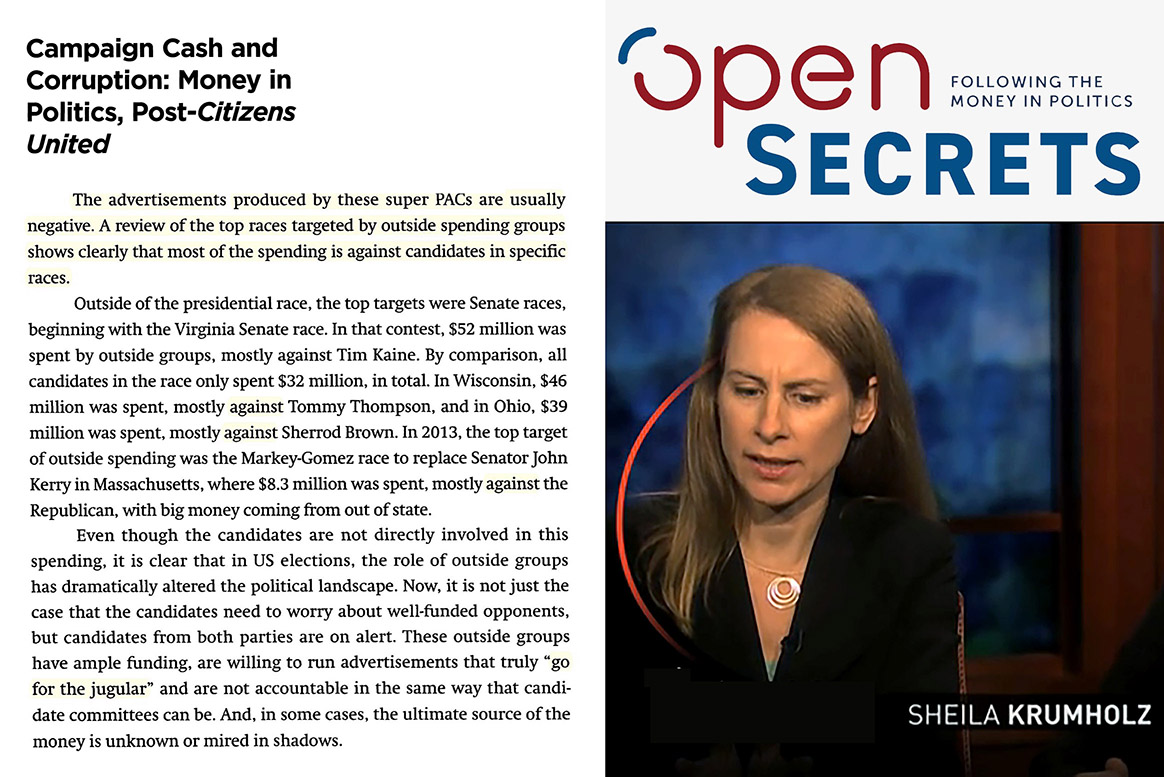
Sheila Krumholtz 2013 - Campaign Cash and Corruption: Money in Politics, Post-Citizens United
TEXT: The advertisements produced by these super PACs are usually negative. A review of the top races targeted by outside spending groups shows clearly that most of the spending is against candidates in specific races. Outside of the presidential race, the top targets were Senate races, beginning with the Virginia Senate race. In that contest, $52 million was spent by outside groups, mostly against Tim Kaine. By comparison, all candidates in the race only spent $32 million, in total. In Wisconsin, $46 million was spent, mostly against Tommy Thompson, and in Ohio, $39 million was spent, mostly against Sherrod Brown. In 2013, the top target of outside spending was the Markey-Gomez race to replace Senator John Kerry in Massachusetts, where $8.3 million was spent, mostly against the Republican, with big money coming from out of state. Even though the candidates are not directly involved in this spending, it is clear that in US elections, the role of outside groups has dramatically altered the political landscape. Now, it is not just the case that the candidates need to worry about well-funded opponents, but candidates from both parties are on alert. These outside groups have ample funding, are willing to run advertisements that truly “go for the jugular” and are not accountable in the same way that candidate committees can be. And, in some cases, the ultimate source of the money is unknown or mired in shadows. (Open Secrets)

Sheila Krumholtz 2013 - Campaign Cash and Corruption: Money in Politics, Post-Citizens United
There are a number of worries with the escalation of the TV political ad wars and the broadcast industry’s consolidation. For starters, it’s far less likely that TV stations will fact-check super-PAC ads, let alone yank misleading ads off the air, which political analyst Kathleen Hall Jamieson is trying to do with her FlackCheck.org project. (By law, TV stations can’t censor candidates’ ads, but they can vet and reject those of outside groups.) After all, super-PACs and dark-money nonprofits are a cash cow for broadcasters. Why bite the hand that feeds? When the public interest group Free Press analyzed political ads and newscast stories in six TV markets in battleground states, it found “a near-complete station blackout on local reporting about the political ads they aired.”Andy Kroll 2013
Super PACs Very Good for CBSNote: Given that 95% of dark money is used to purchase attack ads, brubery is likely the principal driver of corruption in government. But the beneficiaries are not politicians, they are the billionaire-owned media giants.
Then the New Right took on Jim Folsom, who had beaten Democratic Senator Donald Stewart in the primary. An intense ad campaign suggested that Folsom was backed by the Democratic National Committee and therefore supported its stands on ERA, gun control, federal funding of abortions, and gay rights. Not only did Folsom endorse none of those positions, but he insists he took no money from the D.N.C. On Nov. 4, Folsom lost, 48% to 51%, to Denton. The Moral Majority, says Folsom, had “a tremendous effect on my defeat.” N.C.P.A.C. was responsible for a most ambitious crusade: it drew up a “hit list” of key Democratic liberal Senators, including Idaho’s Frank Church, South Dakota’s George McGovern, Indiana’s Birch Bayh, Iowa’s John Culver, California’s Alan Cranston and Missouri’s Thomas Eagleton. In the end, only Cranston and Eagleton managed to win. The New Right claims it helped defeat the other four, but the evidence is inconclusive. The N.C.P.A.C. spent a minimum of $1.2 million on the targeted Senate races, including at least $260,000 against Church and $150,000 against McGovern. Says Terry Dolan of the two Senators: “They were the most obnoxious.” N.C.P.A.C.’s main object was to expose the incumbent’s voting record for the citizens back home. The Senators tended to vote to the left of their constituents while playing down this fact in their campaigns. Says Viguerie: “N.C.P.A.C. went up to the doorsteps and left the dead cats.”Edwin Warner 1980
Nation: New Resolve by the New RightNote: No one spoke more aggressively about intimidating members of Congress than Terry Dolan
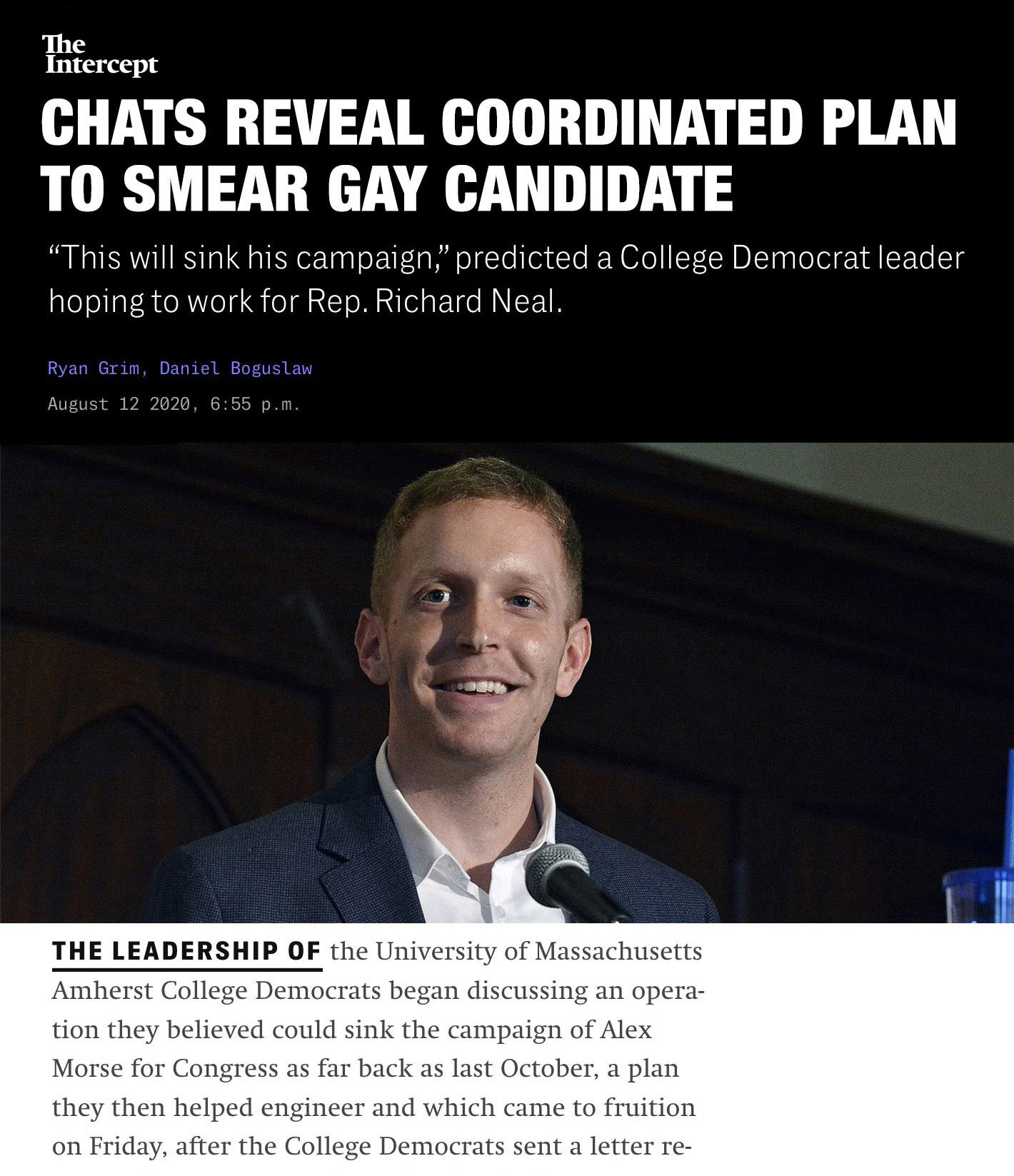
Ryan Grim & Daniel Boguslaw 2020 - Chats Reveal Coordinated Plan to Smear Gay Candidate Alex Morse

Ryan Grim & Daniel Boguslaw 2020 - Chats Reveal Coordinated Plan to Smear Gay Candidate Alex Morse
But most of [the representative’s] initiatives over the years have been thwarted by the National Rifle Association, which strikes fear in Oregon legislators, just as it does lawmakers across the country.Joe Nocera 2013
Politics by Intimidation
How public does this (lobbying) campaign intend to be? There is great value in a splashy announcement of a multi-million dollar campaign. The idea of the bank book will get press credibility and scare some members of Congress.Lobbyist John “Terry” Dolan
Secret Contras Lobbying Proposal (Senate Investigations)
Pollsters try to find an issue a majority of voters in a district or state support. Then they scour the opponent’s record to see if he or she ever voted against that issue. Generally, it doesn’t matter what kind of vote it was, just as long as it can be said it was a vote against that issue. This threat terrifies lawmakers in Washington. It’s one reason they are so skittish about debating and voting on tough issues. Rep. Timothy J. Penny 1996
Common Cents
The fear of being victimized by attack advertising is thus thought to contribute to irresponsible governance. Curbing the growth of entitlements may be sound public policy, but the common wisdom is that Medicare and Social Security are politically untouchable – in part because such unpopular decisions would be fuel for negative advertising: “Candidate X abandons the elderly.” For many incumbents, the importance of protecting one’s image from attack advertisements must take precedence over the substantive merits of policy proposals. Perhaps the voters are not the only ones being manipulated by advertising.Stephen Ansolabehere & Shanto Iyengar 1995
Going Negative
After conducting a meta-analysis of all relevant studies, one group of scholars concludes “the evidence that campaign contributions lead to a substantial influence on votes is rather thin” (Ansolabehere et al. 2003:116) [In short bribery is not a thing].Astral Codex 2023
Book Review: Secret Government
In the 2012 general election campaign, Super-PACs have cast themselves as weapons of political mass destruction. Long before the party conventions actually nominated presidential candidates, runaway campaign fund-raising by Republicans, Democrats, and independent groups was on track to outspend the record-breaking $1.8 billion presidential election of 2008,... presaging a fierce crossfire of negative attack ads in the fall campaign.Hedrick Smith 2012
Who Stole the American Dream?
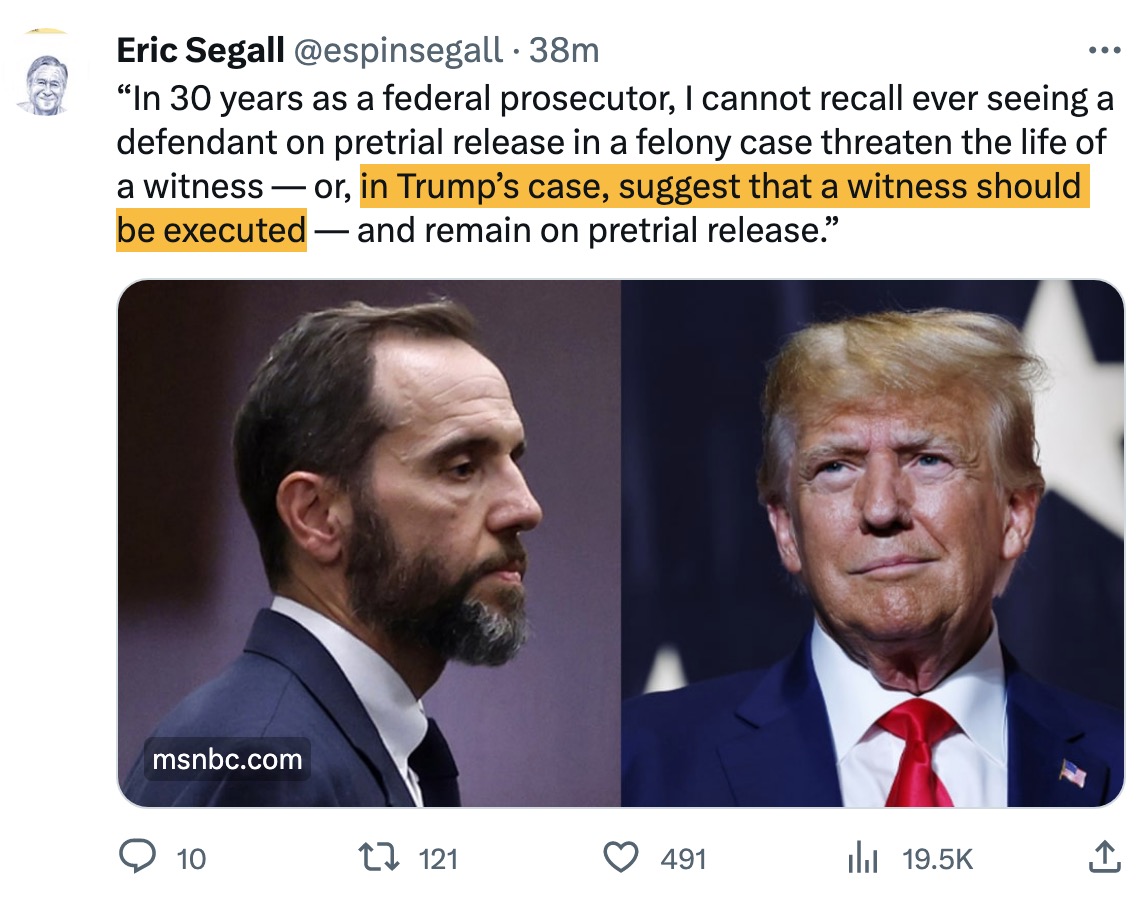
Eric Segall Twitter 2023
Text: “In 30 years as a federal prosecutor, I cannot recall ever seeing a defendant on pretrial release in a felony case threaten the life of a witness — or, in Trump’s case, suggest that a witness should be executed — and remain on pretrial release.” Trump intimidation in court case

Eric Segall Twitter 2023
Mitt Romney’s February landslide in the Florida Republican primary came on the heels of the “most negative advertising campaign in history,” according to the nonprofit Campaign Media Analysis Group. The week before the primary, 99 percent of Romney’s ads were negative, while 95 percent of Newt Gingrich’s ads were negative.Sadie Dingfelder 2012
The Science of Political Advertising
Boehner was forced to pull legislation from the floor of the House after finding that it lacked the votes to pass due to significant opposition among his fellow Republicans, who... were unwilling to back the measure “because they worried it would lead to a primary challenge” from a hard-line conservative opponent.Matt Grossman, David Hopkins 2016
Why primary elections scare Republican politicians more than Democrats
Candidates increasingly rely on personal attacks and fearmongering to win office, leaving many Americans disillusioned with democracy... in Virginia’s closely divided legislature, the battle between the two parties... was expensive and lengthy—and extremely negative. Voters were exposed to a deluge of TV attack ads. In one high-profile race, the Republican candidate said in an ad that his Democratic opponent had let “violent criminals walk easy” as a prosecutor, while she replied in her own TV spot that he was “bad for women, bad for kids and bad for Virginia.” Another candidate accused her opponent of being a “domestic abuser” based on a 20-year-old accusation that was dismissed in court. Yet another was accused of consorting with “militias and hate groups,” in part because, while a sheriff, his office met with leaders of a protest march to go over the rules they would have to follow.Gerald F. Seib 2024
What Have Negative Political Ads Done to Us?
They had spread across the country by the end of 2017. Nonetheless, in December 2017, nearly 90 percent of the Parliament voted to scrap the age limit, largely due to the ruling National Resistance Movement’s (NRM) control of the body. Even as the measure was being debated, protests erupted in the assembly and across Uganda. Six legislators were suspended for launching a filibuster, and physical brawls broke out in front of the cameras. Special Forces raided the building in an effort to quash the filibuster in violation of parliamentary rules that protect the premises from intervention by the security forces. In the scuffle, soldiers assaulted MP Betty Nambooze, breaking her back.Africa Center for Strategic Studies 2018
Scrapping Presidential Age Limits Sets Uganda on a Course of Instability
If you are a lawmaker you have to be able to sit down and have a grown up conversation about these things and not be afraid of them using bullying tactics, like they did on me – Using fear and intimidation to stifle the discussion.Rep. Debra Maggart 2012
The risk of daring to disagree with the NRA
The use of negative political advertising has produced a situation that could be manipulated for demagogic purposes, but there are other consequences. Upon election, a candidate cannot ignore the threat of future negative political ads. This has led to a growing crisis in the management of the country.Karen S. Johnson-Cartee & Gary Copeland 2013
Negative Political Advertising
The Chamber’s sword of choice remained fear-mongering.Alyssa Katz 2015
Influence Machine: Chamber of Commerce and Corporate Capture
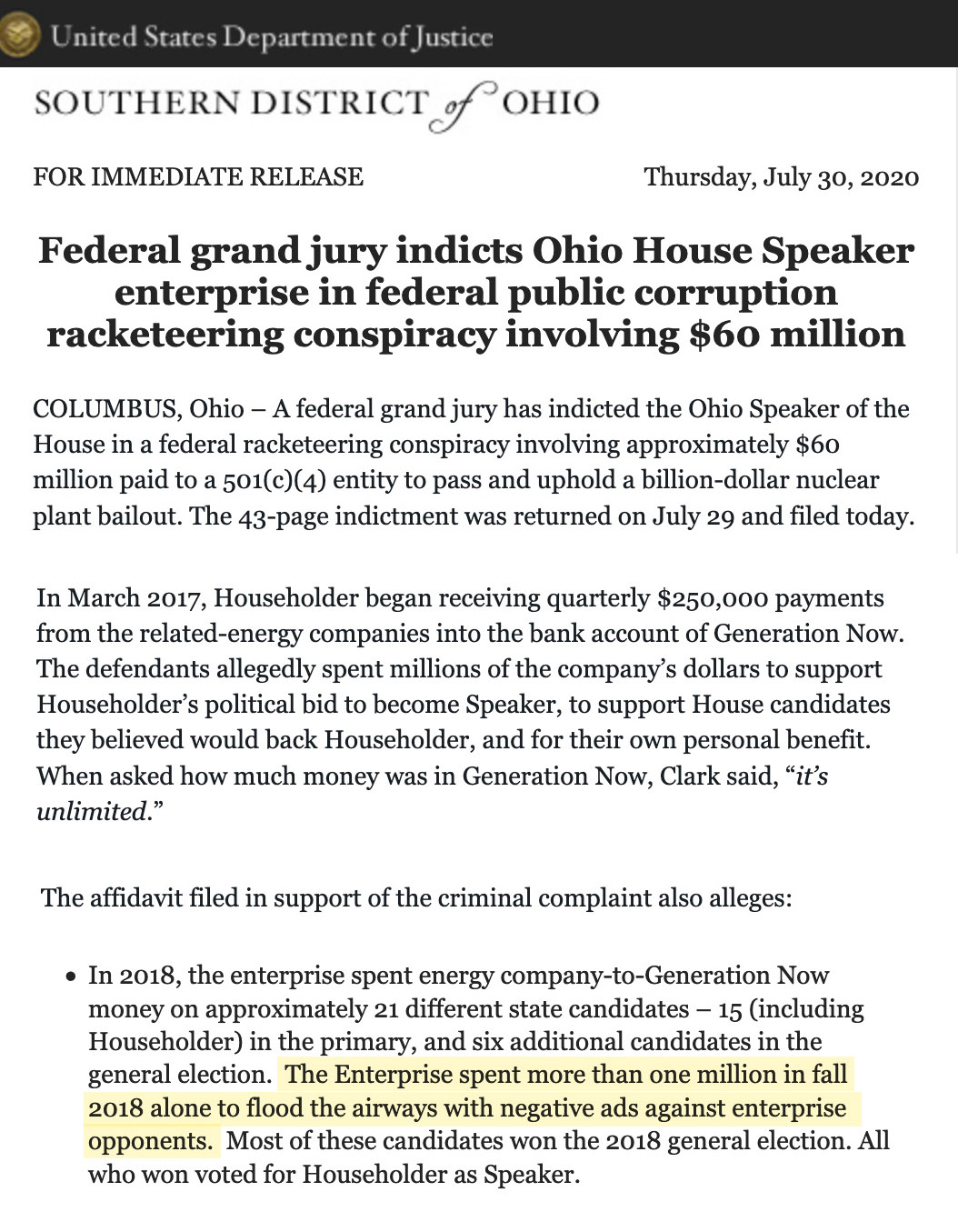
Federal Grand Jury 2020
Note: “The Enterprise spent more than one million in fall 2018 alone to flood the airways with negative ads against enterprise opponents.”

Federal Grand Jury 2020
One comment I heard: “they used to be afraid of being primaried; now they are afraid of getting shot”Marci Harris 2021
Death threats to lawmakers (Twitter)
Open voting allows legislators to give third parties credible commitments to vote in particular ways in return for bribes or in response to threats.Adrian Vermeule 2004
The Constitutional Law of Congressional Procedure
There are numerous interest groups largely aligned with each party that monitor the work, ideological purity, and votes of Members. If Members deviate from the groups’ programs and preferences, the lawmakers face the threat of a primary challenge from candidates more liberal or more conservative than they are. “In a partisan atmosphere,” remarked a GOP Senator, “it’s hard to help the other side without being accused [by well-financed ideological groups] of aiding and comforting the enemy.”Congressional Research Service 2014
The Evolving Congress
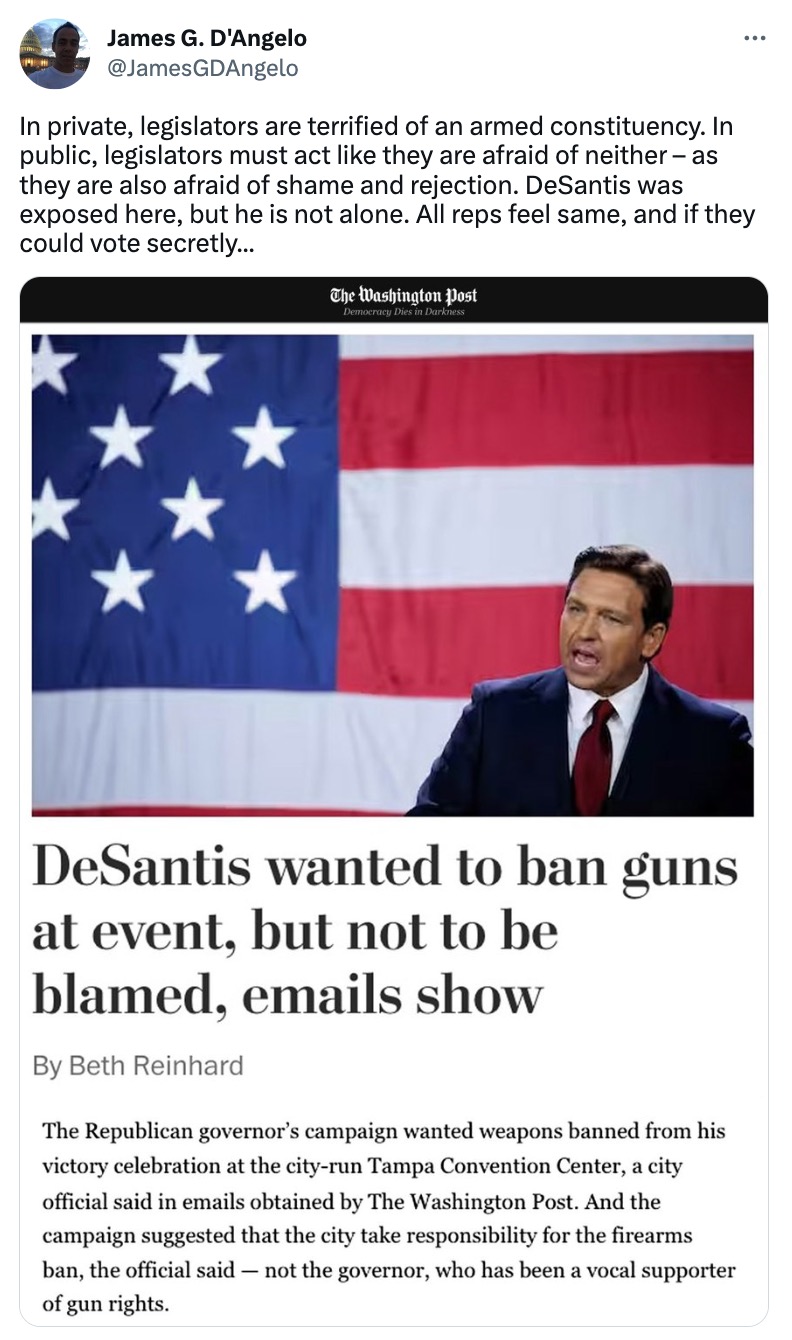
Beth Reinhard 2023 - DeSantis wanted to ban guns but not be blamed

Beth Reinhard 2023 - DeSantis wanted to ban guns but not be blamed
Full transparency can do great harm. If implemented without a notion of why some part of a system should be revealed, transparency can threaten privacy and inhibit honest conversation. “It may expose vulnerable individuals or groups to intimidation by powerful and potentially malevolent authorities” (Schudson, 2015)Mike Ananny & Kate Crawford 2016
Seeing without knowing: Limitations of the transparency ideal and its application to algorithmic accountability
All political leaders, especially incumbents, realize that personal and political behavior is under a microscope, by not only the mass media but their potential opponents as well. Often, this can create situations where legislators know that what they are voting or supporting is wrong or even unconstitutional, but they will persevere because they fear the potential negative ads which can be used to stimulate the voters’ wrath. David S. Broder (1982) suggested that this modern-day “gutless government” has created a situation in which “the art of survival means avoiding any controversial stands that an opponent could use in a future ‘attack’ ad.”Karen S. Johnson-Cartee & Gary Copeland 2013
Negative Political Advertising
Terrified judges don’t have enough protection. Political candidates fear hitting the campaign trail. Journalists write without a byline from heavily fortified newspaper buildings. This is the way of life for hundreds of judicial officials, politicians, journalists, police and others marked for death by the world’s wealthiest and most powerful drug traffickers. “It’s frightening. Anybody who says he is not frightened is lying,” Francisco Santos, managing editor of Bogota’s El Tiempo, said in an interview. Fuszara Forero 1989
Fear of Assassination Remains a Fact of Life for Many
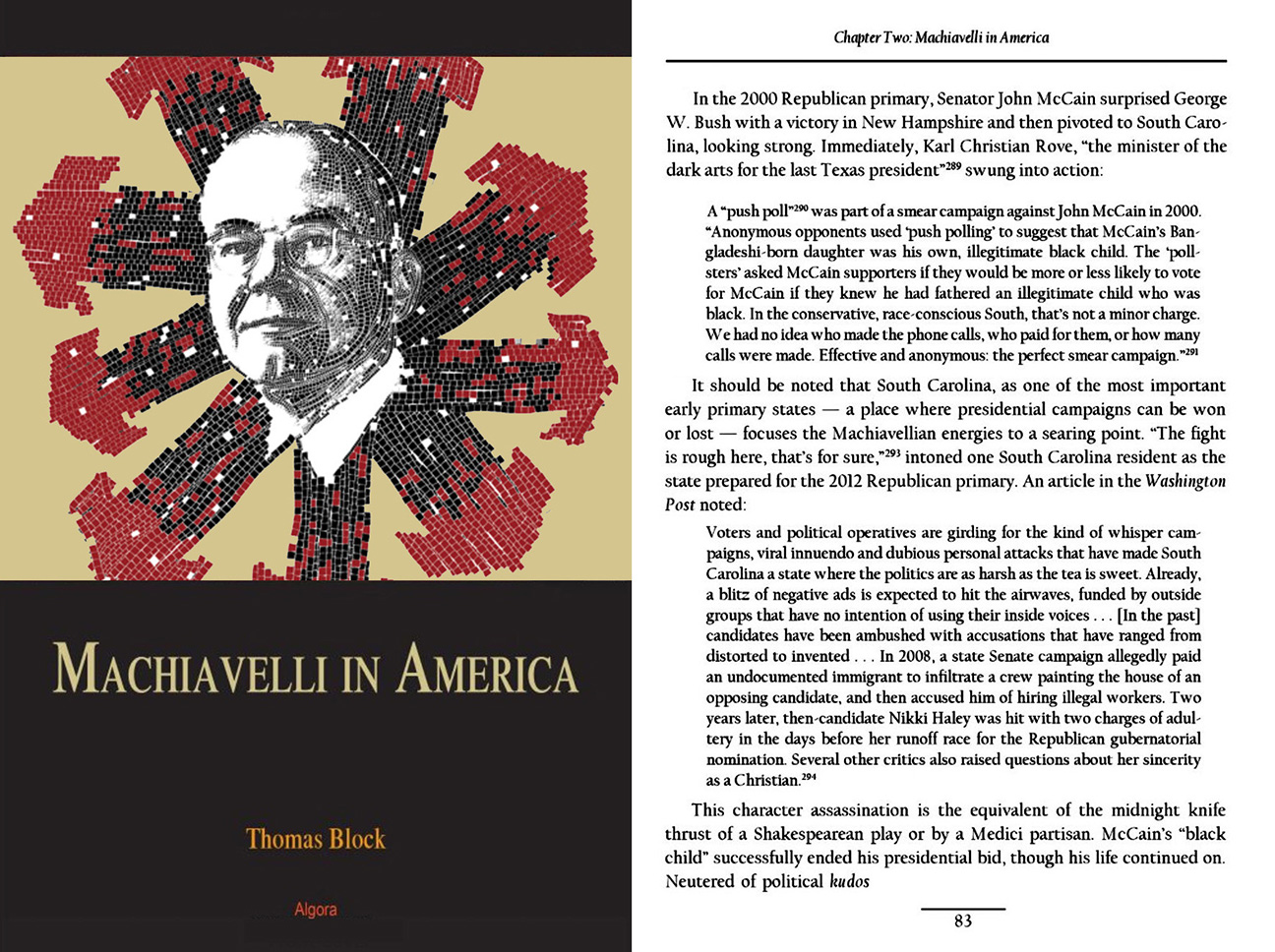
Thomas Block 2014 - Machiavelli in America

Thomas Block 2014 - Machiavelli in America
Political groups attacked both judges for being soft on crime. The Illinois Chamber of Commerce blamed Maag for voting to overturn the conviction of a man for sexually assaulting a six-year-old girl. Its ads did not mention the constitutional and evidentiary problems with the conviction. On the other side, a group of trial lawyers and labor unions attacked Karmeier for giving “probation to kidnappers who tortured and nearly beat a 92-year-old grandmother to death.” Over ominous music and a blurry image of children at a playground, another anti-Karmeier ad warned, “He used candy to lure the children into the house. Once inside, the three children were sexually molested. A 4-year-old girl, raped. Despite prosecutors’ objections, Judge Lloyd Karmeier gave him probation.” True, Karmeier had sentenced Bryan Watters to probation, but only after the appeals court had directed him to.Jed Handelsman Shugerman 2012
The People’s Courts
First, while there are benefits to transparency – and final votes on all legislation should always be on the record – there are also benefits to nontransparency. In the current political climate, for example, we would likely get better results – and more of the essential compromise on which a populous democracy depends – if legislators were permitted to negotiate privately without fear of being pummeled for “selling out” if they seek ways to advance their principles and still allow government to function. That same concern allowing government to function – is a strong argument for electing a Speaker by secret ballot, as is done in the British House of Commons. This would allow every member of the House to vote for that candidate he or she actually believes would best perform the functions of Speaker, without being exposed to retaliation for lack of fealty to one’s club.Mickey Edwards 2012
Parties Versus the People
In the beginning, lobbying did not entail a great deal of finesse. The first attempt at mass pressure on the U.S. government was accomplished with fixed bayonets during a meeting of the First Continental Congress in Philadelphia. Several hundred soldiers of a local garrison believed they were due extra compensation, and in 1783 threatened the assembled legislators with rifles shouldered. The Congress disagreed with them and boldly adjourned to meet again at a safe distance, in Princeton, New Jersey. Jeffrey H. Birnbaum 1992
The LobbyistsNote: This first known reference to ‘lobbying’ in the United States highlights the fact that bribery is not the initial reaction that groups have when they seek to change legislation. Just as our ancestors, all the way back to chimpanzees lean on intimidation and not bribery, disgruntled citizens in early America also understood that fear works better than flattery. They brought guns to Philadelphia, not bribes.
Wilhelm’s group tested the effect of the [negative] ads in six medium-size television markets, picking geographically diverse places where the airtime was inexpensive. They were Springfield, Massachusetts; Lincoln, Nebraska; Albuquerque, New Mexico; Little Rock, Arkansas; Scranton, Pennsylvania; and Flint, Michigan. The impact was impressive everywhere. Before the ads aired, 55 percent of respondents opposed a beer-tax increase; afterward, the opposition level rose to 66 percent. They were so powerful, in fact, that there were no plans to air them again. Just their threat had clout, both Wilhelm and Tom Donohue agreed. “There’s no point in pissing on their legs unless you really have to,” Donohue said.Jeffrey H. Birnbaum 1992
The LobbyistsNote: Birnbaum writes a rather insipid book on lobbying partly because he is a lobbyist himself, but there are some details like this one, highlighting the problem of threats. Here is shows that just by threatening to advertise, the organization gains benefits.
China 2018 - Intimidates and Bribes UN Votes
The public voting board was introduced in the 1970s and is visible in this video at 7:02. Transcript starting at 6:32 Narrator: “It’s been found that if an African country recognizes (votes in the UN in support of) Taiwan as a country they receive, on average, 2.7 fewer Chinese infrastructure projects within their borders each year. Conversely, if an African country votes overwhelmingly along with China in the United Nations General Assembly, they receive 1.8 more infrastructure projects per year. Considering that the General Assembly is an equal representative body where each country gets one vote no matter if they have a million residents or a billion, China’s getting a lot of influence for, in the grand scheme of things, not a lot of money.”
China 2018 - Intimidates and Bribes UN Votes
During the 2012 campaign it went into full-frontal direct political advocacy and attacks, instructing voters to cast ballots for specific candidates—or more often, against them... It proceeded to invest $32.6 million in spots that specifically told Americans how to vote, almost all in the form of attack ads.Alyssa Katz 2015
Influence Machine: Chamber of Commerce and Corporate Capture
Norm Ornstein, the great congressional scholar, told me that he thought a secret ballot [votes in Congress] could survive any judicial challenge.Matthew Cooper 2022
Should Impeachment Votes Be Cast in Secret?
Aiding the 1970s conservative resurgence was a newly organized and shockingly aggressive independent campaign offensive funded by donors on the right, run by the National Conservative Political Action Committee, or NCPAC, which introduced a whole new level of privately financed attack ads to American campaigns.Jane Mayer 2016
Dark Money
Another example of a widely dispersed, well-placed group is postal workers. One congressman explained: “There aren't too many of them, but they do go to every door in the district every day of the week. That's why members are concerned about them. They think they'd be in a good position to spread the word around. This is one organization that unabashedly and openly threatens members. Just before I was elected, they had a pay raise bill up, and they massed in the galleries in uniform-packed them and just stayed there staring down on the floor proceedings. Guys were still talking about that years later.” John Kingdon 1989
Congressmen’s Voting Decisions
In a well-publicized interview with The New York Times in 2003, Club founder Stephen Moore was quoted claiming that incumbents “start wetting their pants” when the Club threatens to run a candidate against them, and that it planned to “scalp” Arlen Specter.Robert G. Boatright 2009
Getting Primaried: The Growth and Consequences of Ideological Primaries
Just as some Republicans have been threatened regarding the health care bill, so speculation abounds on the left that “Blue Dog” Democrats will be challenged should they not support the public option. From such threats, surely some primary challenges do emerge – the primarying threats of today carry with them the promise of financial support for primary opponents. Robert G. Boatright 2009
Getting Primaried: The Growth and Consequences of Ideological Primaries
The rhetoric behind “primarying” may be an effective tool for ideological groups to threaten moderate incumbents.Robert G. Boatright 2009
Getting Primaried: The Growth and Consequences of Ideological Primaries
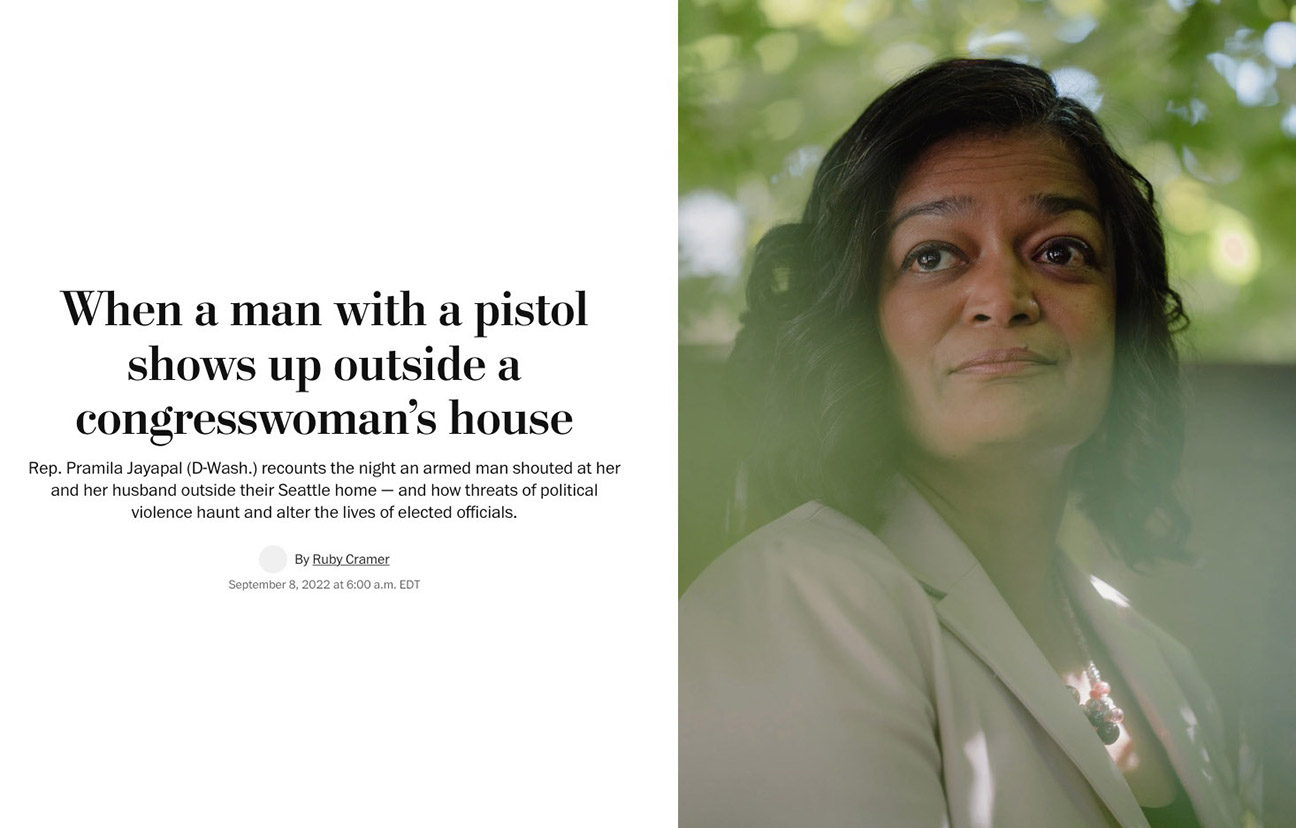
Ruby Cramer 2022 - When a Man with a Gun Shows up Outside a Congresswoman’s House

Ruby Cramer 2022 - When a Man with a Gun Shows up Outside a Congresswoman’s House
The general public is skeptical of our current system of campaign finance and feel that members of Congress are corrupt. Although the scholarly literature on campaign contribution influence is mixed, there is growing consensus that Political Action Committees (PACs) and interest groups do, indeed, have a powerful influence on policymaking in Congress. In this article, the author reviews this literature and discusses how influence occurs. Findings reveal that influence is only very rarely an explicit quid pro quo exchange. Clayton Peoples 2013
Campaign Finance and Policymaking
Does secrecy, often seen as the enemy of democracy, guarantee democracy?Matthew Cooper 2022
Should Impeachment Votes Be Cast in Secret?
Before government was conducted out in the sunshine, senators could vote as they pleased, good or bad, with little voter retribution on individual issues. But in the 1970’s national associations by the dozens were setting up shop in Washington, right down to the beekeepers and mohair producers, and with them came a new threat to the integrity of the legislative process: “single issue” politics. These groups developed very harsh methods of dealing with those who crossed them. Suddenly, every vote began to have political consequences. Congress began to finesse the tough issues and tended to straddle every fence it couldn’t burrow under. Consequently, Congress is failing to get its work done.Senator Dale Bumpers 1999
How Sunshine Harmed Congress
So, challengers must spend more to overcome the obstacles they face, from name recognition to formidable incumbent war chests meant to scare off a challenger. Unfortunately for challengers, those barriers are high enough that they rarely raise enough money to compete.Suzanne Robbins 2018
Money in elections doesn’t mean what you think it does
Nelson alleged that, behind the scenes, GOP caucus leaders offered to withdraw the 60-percent rule if Democrats would back off their threat to force roll call votes on gender equality and climate study amendment bills.John Stang 2018
Lawmakers debate 30-plus budget amendments
If electoral pressure and persuasion don’t work, AIPAC has been known to threaten politicians who appear reluctant to follow its lead.John J. Mearsheimer & Stephen M. Walt 2007
The Israel Lobby and US Foreign Policy
Richard Nixon Wins First Campaign With Negative Ads
This 2021 clip comes from CNN film/mini-series Tricky Dick. It highlights how Nixon ran attack ads distoring the public voting record of his opponents. Full show
Richard Nixon Wins First Campaign With Negative Ads
This 2021 clip comes from CNN film/mini-series Tricky Dick. It highlights how Nixon ran attack ads distoring the public voting record of his opponents. Full show
The basic message is clear: any senator or representative who crosses AIPAC [the Israel lobby] is playing with fire… As one congressional source put it in 1991, “Voting against Israel has become like voting against lumber in Washington state, except AIPAC does it all over the country.”… and why Jimmy Carter said in February 2007 that “I don’t see any present prospect that any member of the US Congress, the House or Senate, would say, ‘Let’s take a balanced position between Israel and the Palestinians and negotiate a peace agreement.’” He added, “It’s almost politically suicidal… for a member of the Congress who wants to seek reelection to take any stand that might be interpreted as anti-policy of the conservative Israeli government.”John J. Mearsheimer & Stephen M. Walt 2007
The Israel Lobby and US Foreign Policy
On January 6, the same day as the deadly riot at the U.S. Capitol, Trump told his supporters to “primary the hell” out of conservative lawmakers who did not object to the Electoral College certification.Alexandra Hutzler 2021
Republicans Most at Risk of Being Primaried in 2022
AIPAC has also played an important role in defeating a number of other politicians who took positions it disagreed with, including Representative Pete McCloskey and Senators J. William Fulbright and Roger Jepson, to name a few. Jepson’s fate is particularly revealing: he was targeted after he succumbed to a personal plea from President Ronald Reagan and agreed to support the 1981 sale of AWACS aircraft to Saudi Arabia. His opponent in the 1984 Senate race, Democrat Tom Harkin, received more than $100,000 in pro-Israel PAC money and Jepson lost his seat. Senator Alan Cranston later commented that Jepson’s fate “has sort of struck terror into the hearts of senators about switching” on Middle East votes.John J. Mearsheimer & Stephen M. Walt 2007
The Israel Lobby and US Foreign Policy
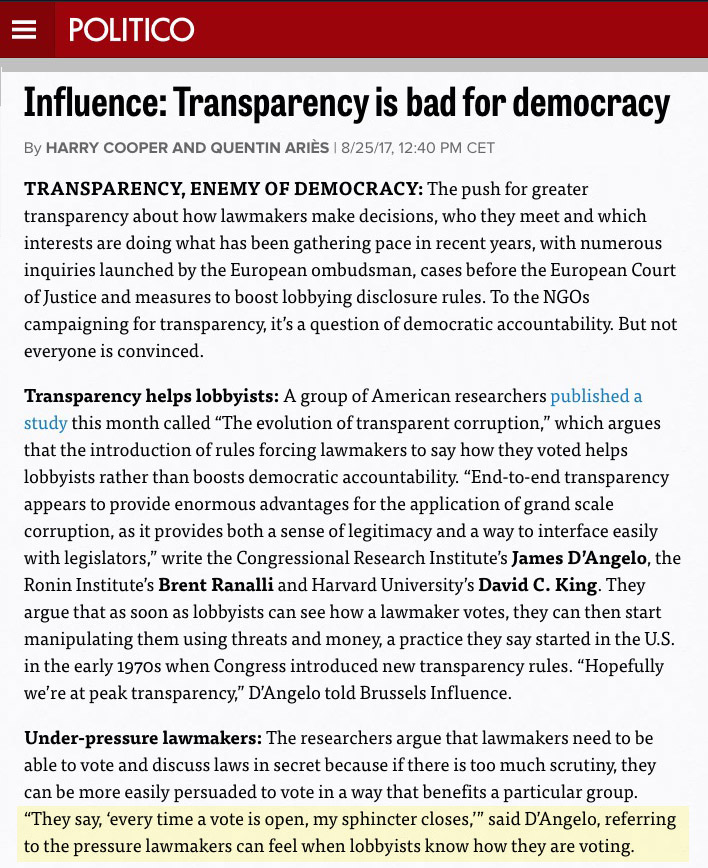
Harry Cooper & Quentin Ariés – 2017 Politico

Harry Cooper & Quentin Ariés – 2017 Politico
I will never forget that Oprah said on her show once, basically, “You know, beef’s bad, it’s not very healthy and it destroys the environment.” And got taken to task by the agriculture industry and they basically took her down and forced her to publicly apologize. And if you can take Oprah down, you’ve got muscle. David Roberts & Paul Lehner 2023
The Farm Bill is the most important climate bill this Congress will pass
Another example of the [Israel] lobby’s ability to influence elections concerns former Senator Adlai Stevenson, who ran for governor of Illinois in 1982. He first ran afoul of pro-Israel groups in 1980, when he introduced an amendment to a Senate bill that called for reducing foreign aid to Israel if it did not stop building settlements. Stevenson knew the amendment would never pass, but he wanted to show that his colleagues would support Israel even if it was acting in ways that were contrary to official U.S. policy. The measure was easily defeated, gaining only seven votes. One reluctant opponent of the amendment, Senator Quentin Burdick, told the Illinois senator, “Sorry, Adlai, but I am up for reelection.” When Stevenson ran for governor two years later, he quickly discovered that campaign contributions began to dry up, and indeed, went to his opponent. John J. Mearsheimer & Stephen M. Walt 2007
The Israel Lobby and US Foreign Policy
“Any senator or any congressmen that does not fight tomorrow, I'm telling you, their political career is over,” Eric Trump told Fox News on Tuesday night, promising any Republican who does not object to the [election] results “will get primaried.”Jack Brewster 2021
‘They Will Get Primaried’: Trump, His Allies, Threaten Republicans Who Won’t Object To Electoral College
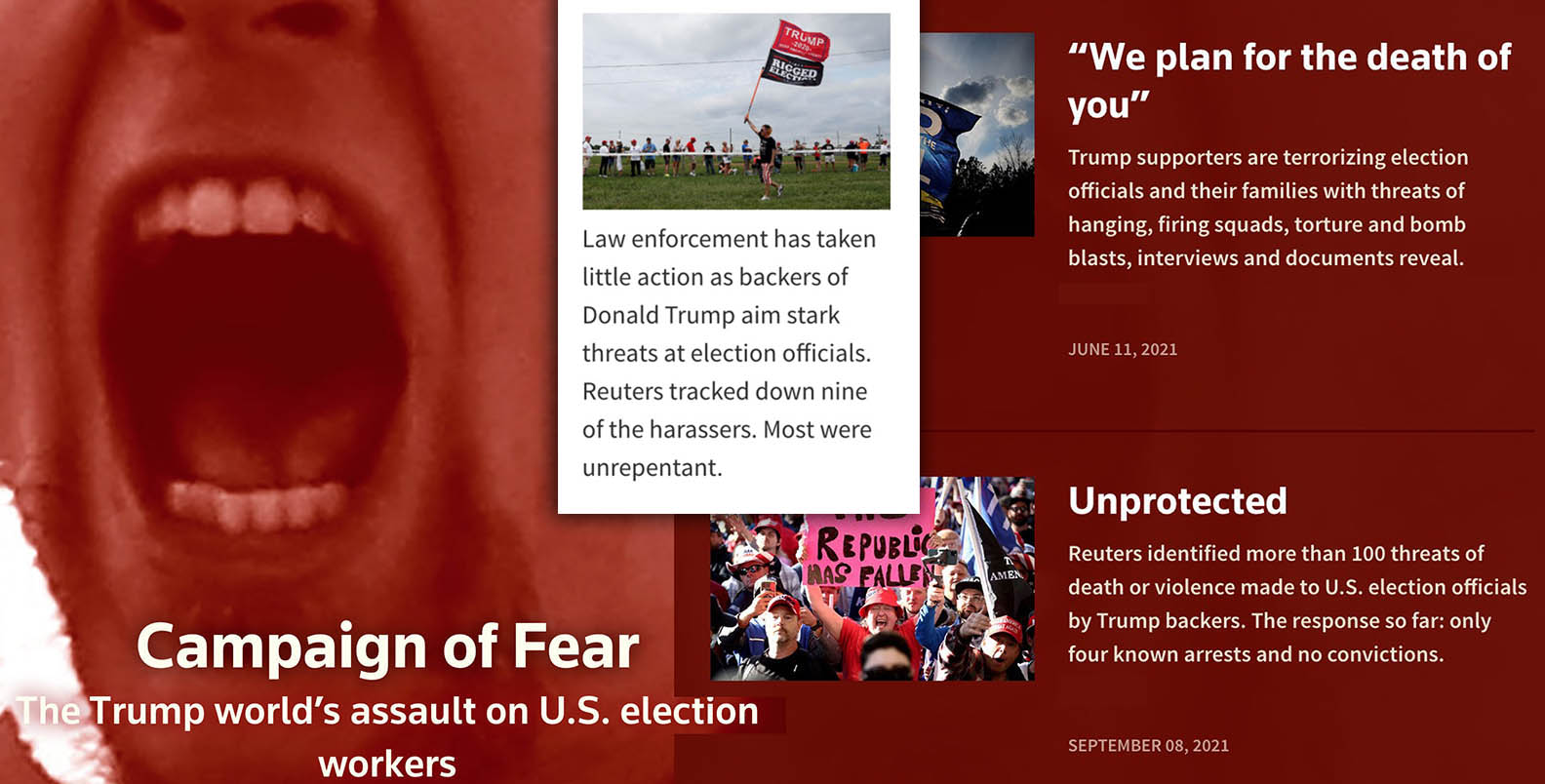
Reuters 2021 - Campaign of Fear

Reuters 2021 - Campaign of Fear
This threat that came in, it was mailed to my house. We got it a couple of days ago, and it threatens to execute me, as well as my wife and 5-month-old child.Rep. Adam Kinzinger 2022
Kinzinger shares letter that threatens to "execute" him and his family
Roberts also has chastised the Senate’s Democratic leader, Chuck Schumer of New York, for warning in 2020 that two Trump-appointed justices would “pay the price” should they vote against abortion rights. Two years later, an armed man was arrested near Justice Brett Kavanaugh’s home and charged with attempting his murder after reports that Kavanaugh had voted to overrule Roe v. Wade.Jess Bravin 2024
Chief Justice Says Intimidation and Violence Threaten Judicial Independence
On May 17 of this year, Terry Dolan, the chairman of the National Conservative Political Action Committee, and Stewart Mott, the heir to a General Motors fortune announced that they were joining together to try to defeat the Clean Campaign Act, the major campaign finance reform bill in the House, originally introduced by Representatives Dave Obey and Jim Leach. They said they were going to “target” Obey and Leach through negative TV, radio, and newspaper ads in their districts. While Terry Dolan ‘s political views are on the right and Stewart Mott’s are on the left, Dolan and Mott have at least one thing in common. They both control vast sums of money that enable them to influence elections to a far greater extent than the average citizen, and they don’t want to lose that influence.Joan Claybrook 1983
Hearings on Campaign Finance ReformNote: Ironically (or sadly) the technique these outsiders used to prevent legislation to curb the destructive use of negative advertising based on specific congressional actions, was negative advertising based on specific congressional actions.
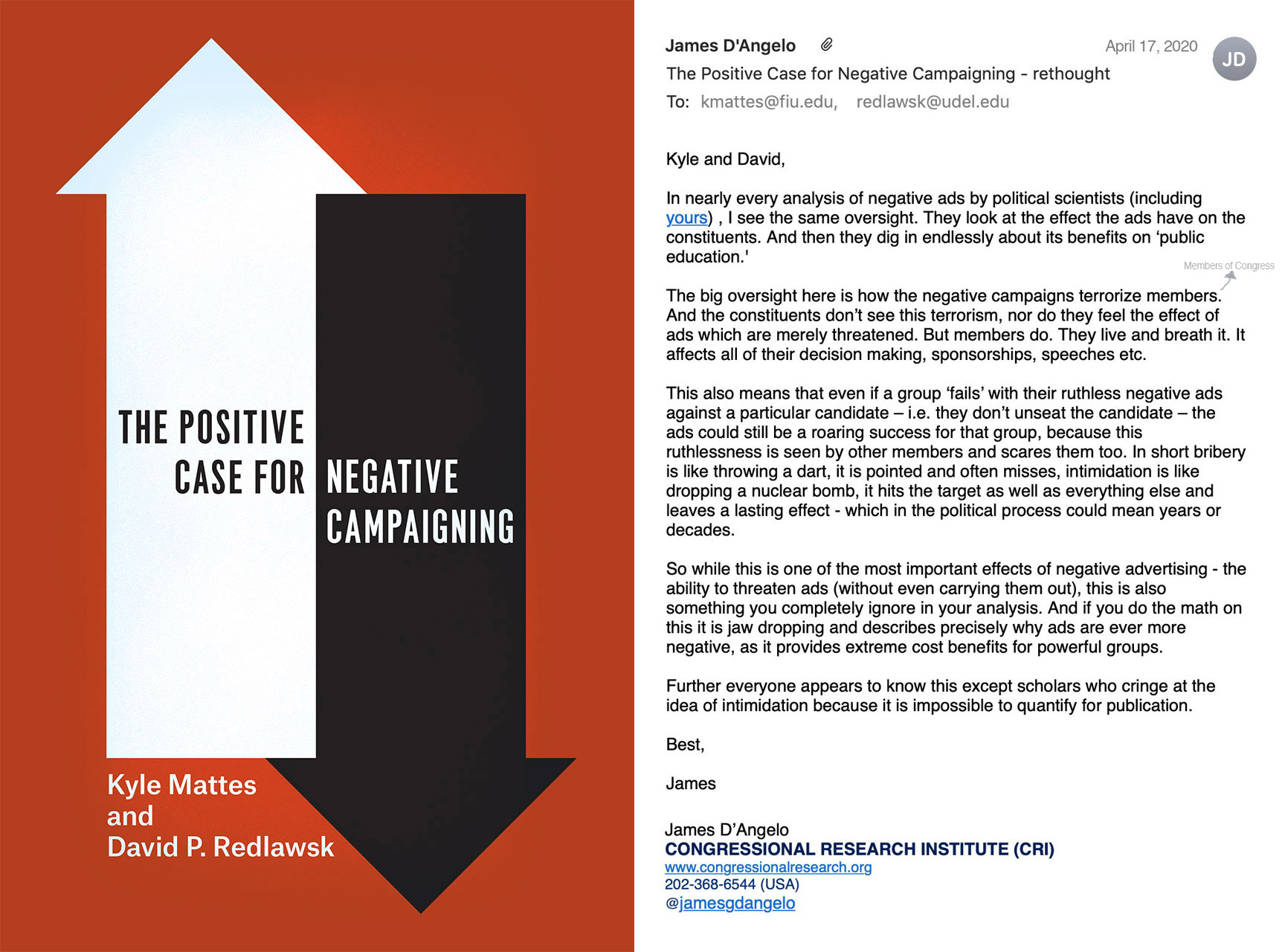
Email sent to Kyle Mattes and David P. Redlawsk (authors of The Positive Case for Negative Campaigning) about a fundamental oversight in their research on negative campaigning. Similar emails sent to John Geer (author of In Defense of Negativity), Donald Green (author of Do Negative Political Ads Work?) Chris Dolan (author of Two Cheers for Negative Ads). In response to Dolan, I wrote that leaving out the effects of negative ads on their targets (usually members of Congreess) would be akin to writing an article entitled “Two Cheers for Torture” while leaving out any reference to how it harmed the victims or corrupted their actions. In short, sure, an argument can be made for torture, even an okay one, if we leave out the pain it inflicts. With respect to Congress the fear of these types of ads is universal and entirely corrosive.

Email sent to Kyle Mattes and David P. Redlawsk (authors of The Positive Case for Negative Campaigning) about a fundamental oversight in their research on negative campaigning. Similar emails sent to John Geer (author of In Defense of Negativity), Donald Green (author of Do Negative Political Ads Work?) Chris Dolan (author of Two Cheers for Negative Ads). In response to Dolan, I wrote that leaving out the effects of negative ads on their targets (usually members of Congreess) would be akin to writing an article entitled “Two Cheers for Torture” while leaving out any reference to how it harmed the victims or corrupted their actions. In short, sure, an argument can be made for torture, even an okay one, if we leave out the pain it inflicts. With respect to Congress the fear of these types of ads is universal and entirely corrosive.
The Dolan-Mott attack demonstrates that under our present system of financing congressional campaigns members of Congress cannot even talk about limiting the influence of money in politics without being targeted. Dolan (of NCPAC) and Mott (of General Motors) have been the most outspoken, but such groups as the business-funded Public Service Research Council and Paul Wyrich’s Committee for the Survival of a Free Congress have also joined in the attack.Joan Claybrook 1983
Hearings on Campaign Finance Reform
Early fundraising success can impact a race in real ways, by scaring away potential challengers and incentivizing weak incumbents to step down.Democracy Donors 2016
A Guide for New Political Funders
Of course, to accomplish its goals, a corporation need not actually spend such sums in every race they are interested in. Far from it. Especially for offices or in areas where electoral races are generally not overwhelmingly expensive, the implied threat to spend large expenditures against elected officials could easily be enough to “persuade” them to take the “right” position... Such corruption leaves no evidence: no paper trail, no recordings, no ads. But it poisons our nation’s democracy.Michael B. Keegan 2012
Senate Judiciary Committee Testimony
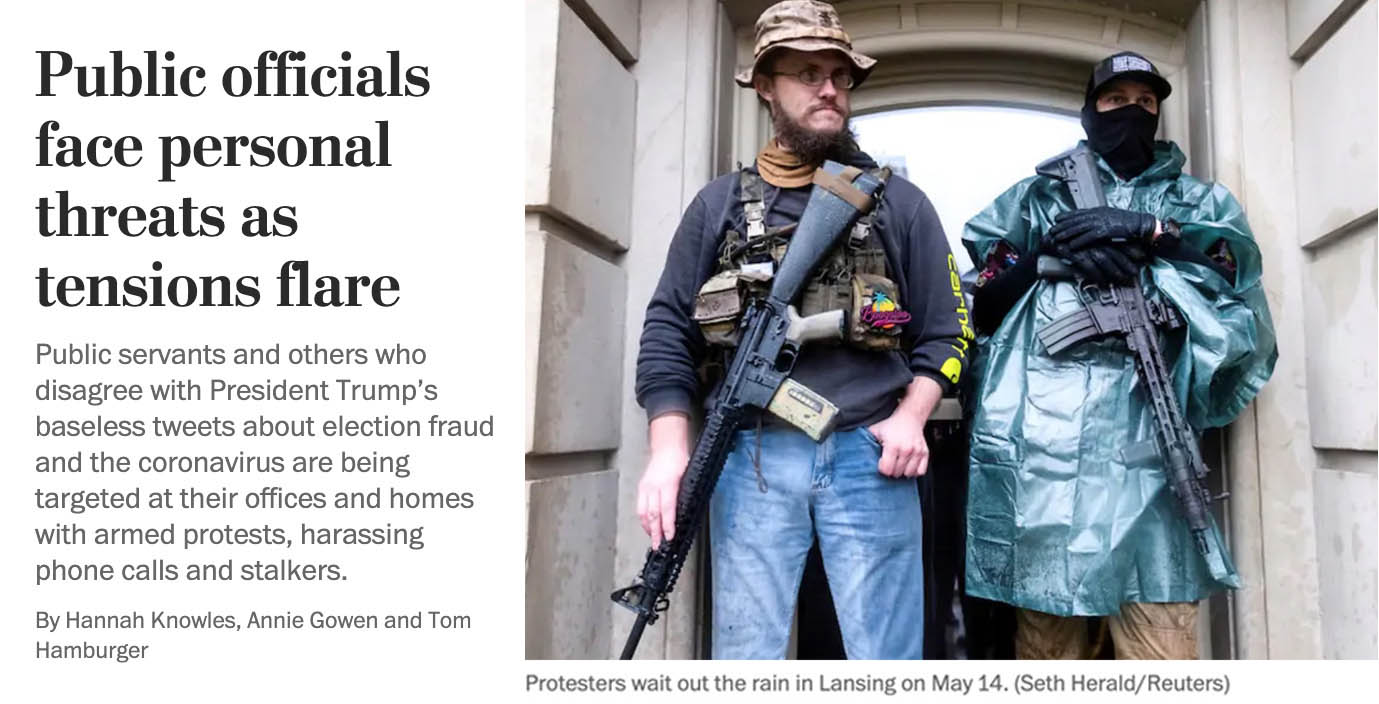
Knowles 2020 - Public officials face threats as tensions flare

Knowles 2020 - Public officials face threats as tensions flare
In the “age of impeachment,” there is a tendency for “We, the people” not to reason but to intimidate and threaten with political retribution. Is there a way to mitigate this party-induced bias? Yes, the secret ballot (in Congress).Douglas Kmiec 2020
Impeachment trial could use a secret ballot
In a letter to the Arizona lawmaker, which was first obtained by POLITICO, 70 Democratic donors — some of whom gave Sinema’s 2018 campaign the maximum contribution allowed by law — said they would support a primary challenge to Sinema and demanded that she refund their contributions to her 2018 campaign if she didn’t change her position.Holly Otterbein 2022
Top donors threaten to cut off funding to Sinema
Tactically, the negative campaign makes sense. Most incumbents start out far in front, boosted by their office’s publicity machine, and with an advantage in fund-raising. Challengers’ strategists can prove that the most efficient way to bring that incumbent within striking range is to “raise his negatives” early in the campaign. In response, incumbent campaigns decide in many cases on the strategy of the preemptive strike: raise doubts early about the challenger’s reputation, record and views, so people discount anything they hear from him. You can see where this leads to the kind of negative campaigning that has flourished this year. But it also leads to gutless government, where the art of survival means avoiding any controversial stands that an opponent could use in a future “attack” ad. That kind of cop-out cripples government’s capacity to deal with the hard choices on taxes and spending that times like these require. And that kind of campaign cripples a healthy democracy.David S. Broder 1983
Mud and Timid Government
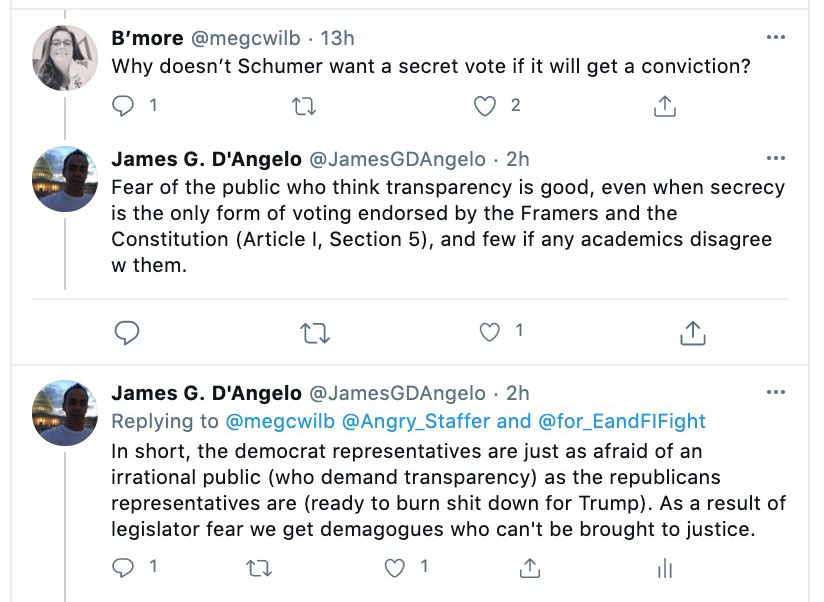
James D'Angelo Feb 2021 Twitter: both Ds and Rs equally afraid of irrational public

James D'Angelo Feb 2021 Twitter: both Ds and Rs equally afraid of irrational public
Recent research shows that campaign contributions have not had much of an effect on legislative voting behavior… Bronars and Lott (1997) examine whether retiring legislators, who are not threatened by retaliation in the next election cycle, change their voting behavior, measured as a change in voting score, when there is a change in contributions from relevant PACs. They find only modest evidence that changes in these contributions change voting behavior. Ansolabehere, de Figuieredo and Snyder (2003) examine the effect of labor and corporate contributions on voting scores assigned by the US Chamber of Commerce and likewise find no evidence that contributions affect voting in the predicted directions… But, these techniques underestimate the effect when interest groups focus their contributions on potential foes.Thomas Stratmann 2005
Some talk: Money in politics
We should assume that donations are aimed principally to enhance or to reduce the electoral prospects of existing allies or enemies (and are not intended to influence the policy choices of lawmakers)Justin Fox & Lawrence Rothenberg 2011
Influence without Bribes
Secrecy serves as an antidote to intimidation, permitting legislators to vote sincerely without fear of reprisals from their peers. Even if a legislator is not personally corrupt and is convinced his accused peer is corrupt, he might nonetheless avoid voting to expel his peer, fearing retribution of some sort. So it may be that secrecy serves as a “shield,” enabling politicians to challenge powerful legislative leaders or party bosses in ways that would be unthinkable in an open vote. Indeed, a variety of procedures – e.g., juries, trade agreements, constitution writing, admissions committees (Chambers 2004; Elster 2010) – may benefit from “shielding” participants from the public or from particular audiences, such as the injured or losing parties.Michele Buttò, Carlos Pereira & Matthew Taylor 2014
Sunshine or Shield? Secret Voting Procedures and Legislative Accountability
Maya Wiley - How Police Unions Intimidate Legislators
TRANSCRIPT STARTING AT 2:12: We don’t have a crime problem, a significant crime problem and, yet, we have watched police unions both threaten work stoppages, like threaten not to do the job if they don’t like how they’re being treated, which then terrifies the political class, you know, politicians who have to win re-election, who get worried because if you even see a very small jump in crime then suddenly there is this great talk about fear of crime and lawlessness. And we’re hearing that from republicans. We heard it from republicans today in the House. None of the numbers actually bear out the fear. And yet, and yet, that political power of fear and the political power of fear of black people in particular, Latinos in particular, have created a political condition that essentially blinds us to the extreme peace dividend that we have created in this country.
Maya Wiley - How Police Unions Intimidate Legislators
The story of how AIPAC reversed its fortunes in the mid-1980s is not only an insight into this one lobby, but a revealing case study of how all lobbying has changed in the new Washington power game... By the mid-eighties, its leadership was steering roughly $4 million in campaign contributions to friendly candidates and punishing political foes. One policy payoff was that American aid to Israel rocketed from $93.4 million in 1962, to nearly $3.8 billion in 1986... AIPAC keeps close tally on every congressional vote and provides the pro-Israeli PACs with thumbs-up or thumbs-down on Senators or House members. AIPAC follows one determining issue – American policy toward Israel and issues that affect Israel’s interest – and it cares little about other issues of concern to Jews. But on that one touchstone, AIPAC rewards friends and goes after adversaries... That is the way the new lobbying game is played.Hedrick Smith 1988
The Power Game - How Washington Works
Individual donors also lean toward incumbents, but it is early PAC money that scares off would-be challengers, reducing the number of genuinely competitive elections Hedrick Smith 1988
The Power Game - How Washington WorksFrom the same book: “As Senator Joseph Biden said, PAC money underwrites the “tyranny of the incumbency.” Early funding — well before the election — goes heavily to incumbents. For example, in 1985, PACs gave $10.5 million to twenty-seven senators seeking reelection and only $1.1 million to their challengers. The safe money sticks with sure winners who will be on important committees when the real business gets going.”
The 1984 defeat of Sen. Charles Percy (R-Ill.) – the chairman of the Foreign Relations Committee who crossed the lobby once too often – is one of several in recent years ascribed to pro-Israel money. “All the Jews in America, from coast to coast, gathered to oust Percy,” Dine claimed in a speech after the 1984 election. “And American politicians... got the message.”Lloyd Grove 1991
Washington Post - On the March for Israel
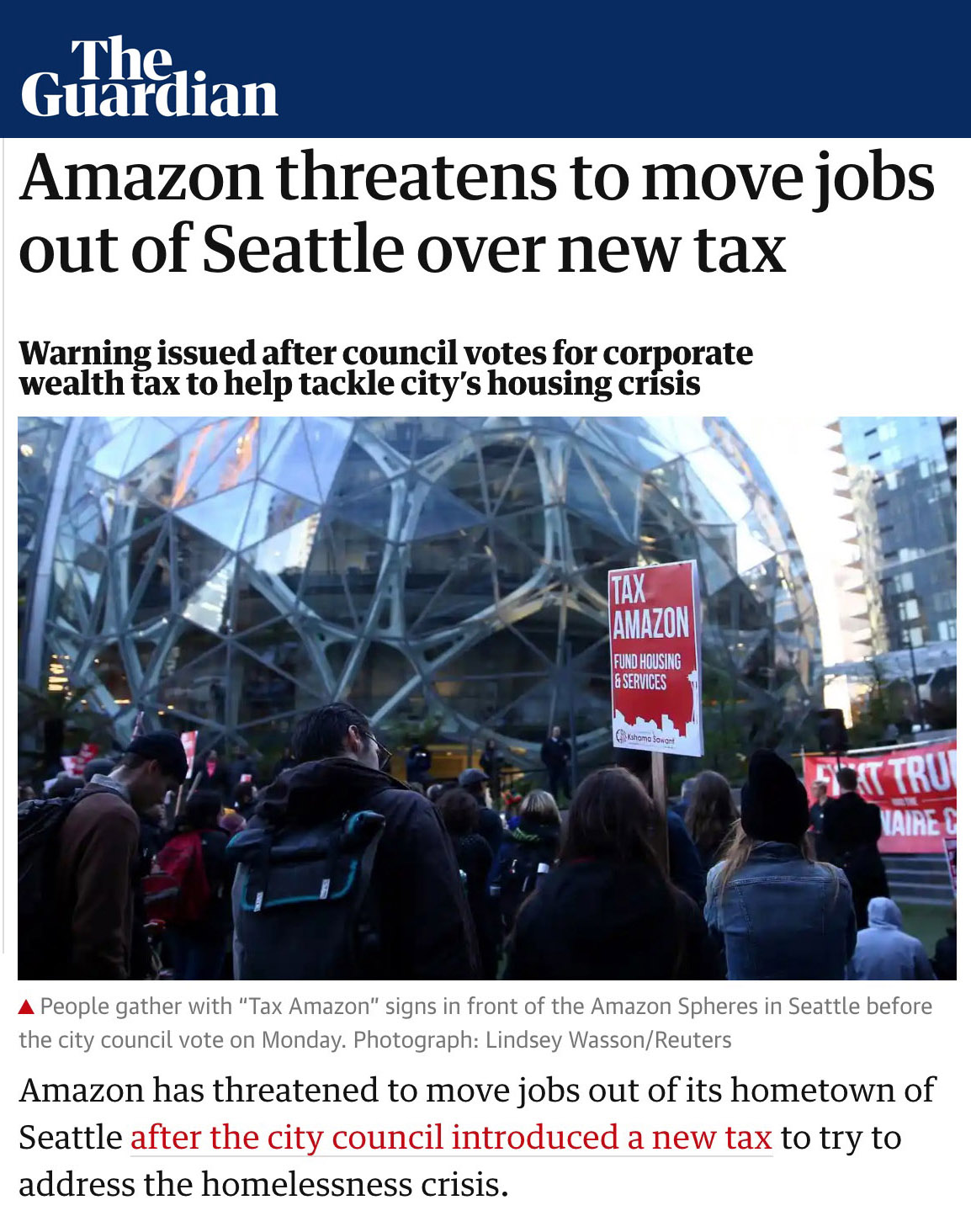
Amazon threatens to move jobs out of Seattle over new tax 2018

Amazon threatens to move jobs out of Seattle over new tax 2018
The fear that donors could fund an opposition candidate over a particular vote or stance on policy issues is a constant reality that politicians face. Al-Shabaka 2018
Dark Money: Palestine, Mega Donors, and the 2018 Midterm Elections
“I wish candidates wouldn’t use them, but attack ads work perfectly,” says Joel Weinberger, PhD, a psychology professor at Adelphi University. “Democrats know it, Republicans know it, and it’s going to get ugly this year.”Sadie Dingfelder 2012
The Science of Political Advertising
Many voters may not realize that the attack ads they watch are produced not by campaigns but by super PACs. The outsized role of “dark money” in political advertising has been a primary driver of the hyper-partisan and polarizing nature of modern attack ads, providing both a boon and a burden for political candidates.Ilana Cohen 2019
Attack Dogs
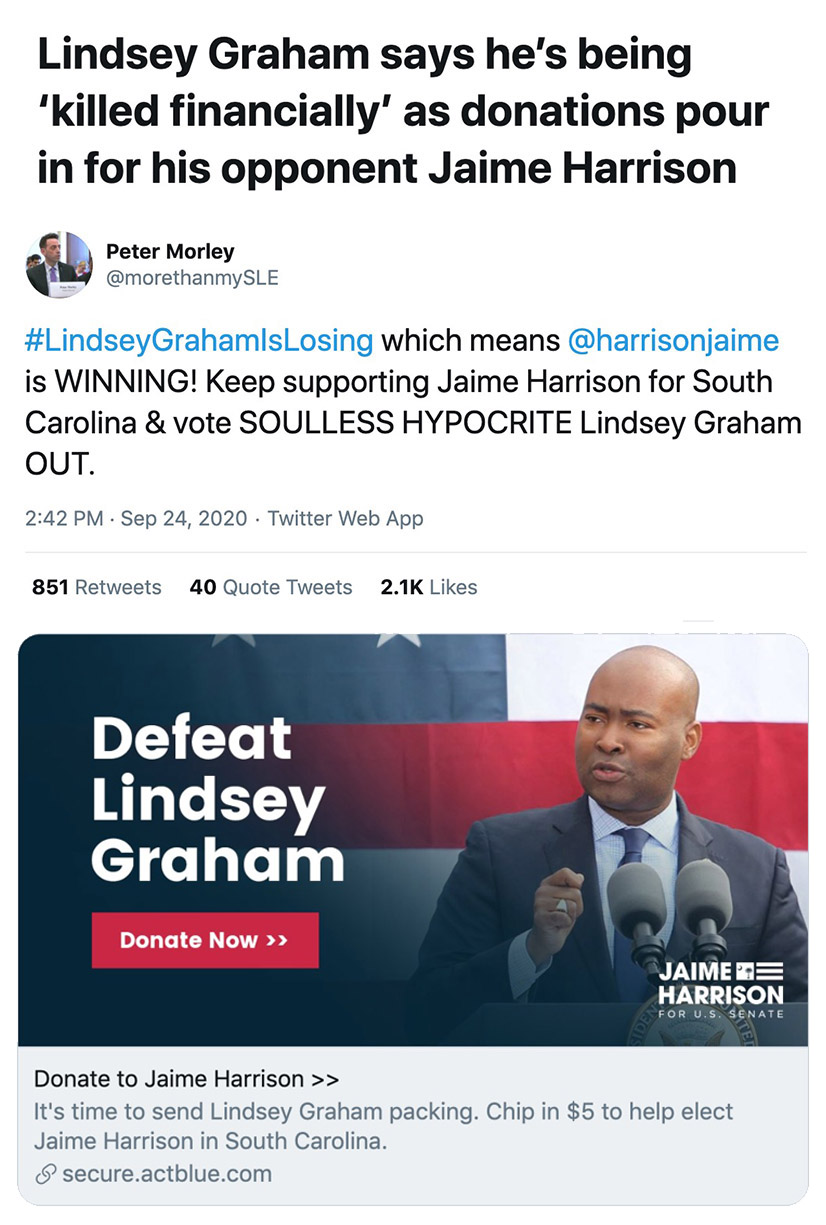
Peter Morley 2020 Twitter: raising money to eliminate Lindsey Graham

Peter Morley 2020 Twitter: raising money to eliminate Lindsey Graham
One might in fact impose secret voting both to eliminate interest-based logrolling and to make the delegates unafraid of voting the wrong way on popular proposals.Jon Elster 2008
The Optimal Design of a Constituent Assembly
As the assemblies in Paris (1789-1791), Paris (1848) and Frankfurt (1848) demonstrate with particular force, the first and the third form of publicity may interfere seriously with the quality of the debates and of the decisions. Vanity can prevent people from changing their mind as a result of argument, and fear can prevent them from speaking (and voting) their mind in the first place. Jon Elster 2008
The Optimal Design of a Constituent Assembly
If the PACs are in charge, members do not want to alienate them . “The PAC community talks with each other,” said Rep. Christopher Shays, a Connecticut Republican. “They are like-minded, and if you meet with one, you may get from another. They can get turned off to you. A whole group will say, ‘Don’t contribute to Shays.’ If you tum off a block, you may see fifty thousand dollars disappear from your next campaign and go to your opponent.”Ronald Kessler 1997
Inside Congress - The Shocking Scandals
Jonath Haidt Ted Talk 2012
“It’s like a money gun aimed at your head. If you step out of line, there is a ton of money waiting to be given to your political opponent.” Full talk
Jonath Haidt Ted Talk 2012
“It’s like a money gun aimed at your head. If you step out of line, there is a ton of money waiting to be given to your political opponent.” Full talk
“You make examples out of people… And you hit them as hard as you can,” Armendariz told a town-hall meeting in 2010. “It was kind of like how the Romans used to, you know, conquer villages in the Mediterranean,” he told his audience. “They’d go into a little Turkish town somewhere, they’d find the first five guys they saw, and they’d crucify them. And then, you know, that town was really easy to manage for the next few years.”
President Obama and his managers obviously are hoping the same thing will happen to the super PACs supporting his opponent this year and possibly to the Romney campaign itself. By calling out, investigating and doing their level best to demonize major Romney contributors, they clearly are hoping to make others pause before opening their checkbooks to the former Massachusetts governor. David Keene 2012
Obama’s plan to ‘crucify’ political opponents
When someone makes an unfair attack, the onus is on the victim to set the record straight. In these days of twenty-four-hour cable news reporting, a damaging wire story can be on the air within the hour. Any story, particularly a negative one, travels at the speed of lightChris Matthews 1999
Hardball
In the old days, you could get away with spending relatively little money. What that meant is there was sort of more generalized propaganda. The Republicans who ran against you would say, ‘Vote for so and-so instead of your Congressman Tony Beilenson, who is too liberal and is for big government and votes for abortion rights.’ Or, ‘He voted to raise taxes.’ Some general stuff. Now with five-hundred-thousand-dollar to eight-hundred-thousand-dollar campaigns, there are TV ads that talk about specific votes. There didn’t used to be that. It comes back to money. Elections are much bigger affairs. A lot more information, most of it negative, is sent out… Everybody hates it, but this is what people respond to, apparently. You are wasting your money if you buy nice ads.Rep. Anthony Beilenson 1997
Inside Congress (by Ronald Kessler)
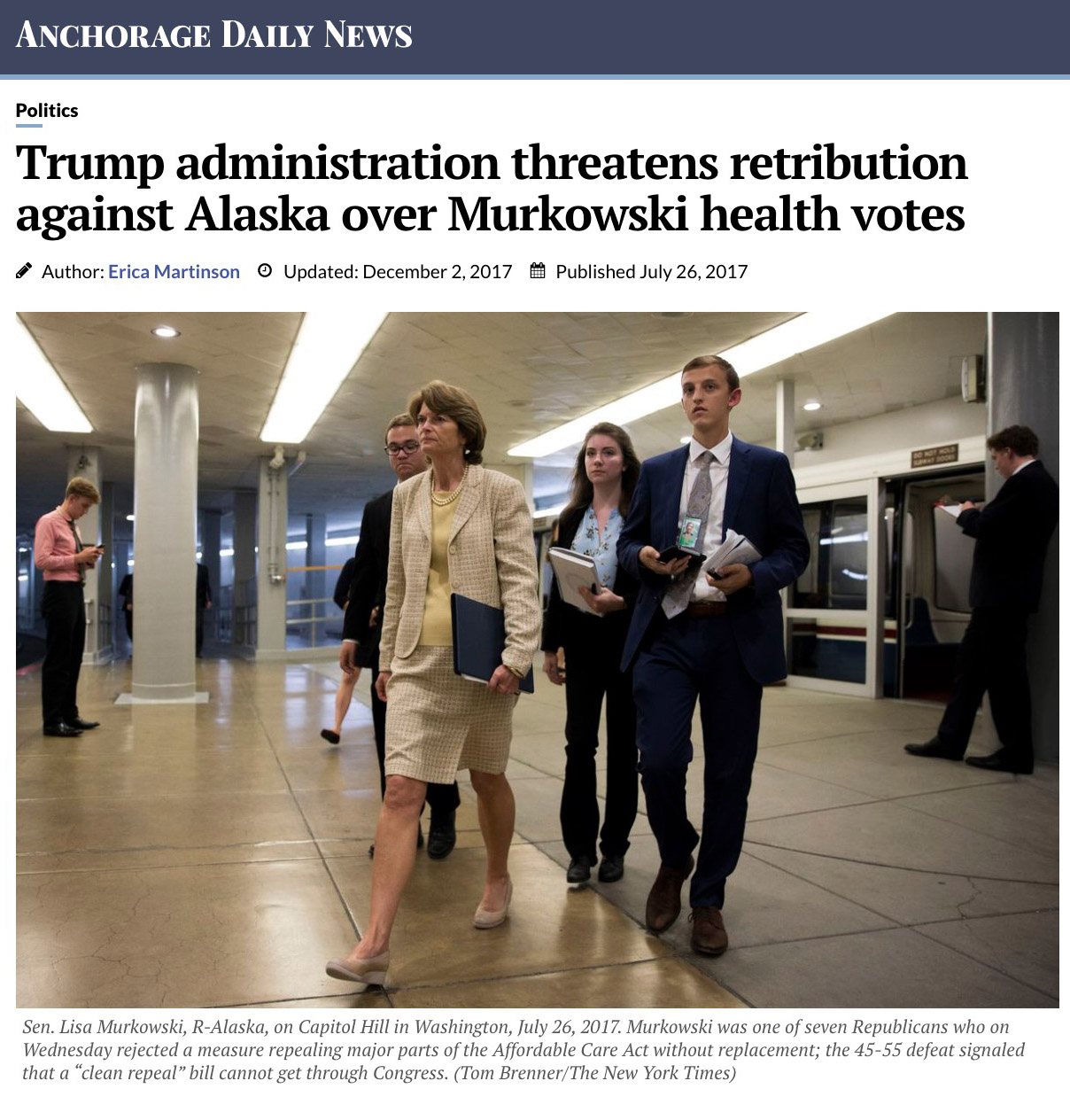
Trump threatens Senator Murkowski over Health Care votes

Trump threatens Senator Murkowski over Health Care votes
In her analysis of congressional races from 1972, Burrell (1994)… [Women] are as effective in raising funds from PACs and from large donors and in raising money early in the campaign cycle, funds that are thought to be important in establishing the legitimacy of a candidate, garnering media attention, and perhaps scaring away potential challengers. … The most successful of these, EMILY’s List (EMILY stands for “Early Money Is Like Yeast,” the idea that early dough generates more dough later on), identifies potential women congressional candidates who look as though they are well positioned to challenge an incumbent or take an open seat.Sue Thomas & Clyde Wilcox 2005
Women and Elective Office
The term ‘hit list’ first became a part of our political vocabulary in 1980, when four of six incumbent U.S. Senators targeted for defeat by the National Conservative Political Action Committee lost their re-election bids.Brad Bannon 1982
NCPAC’s role in the 1980 Senate elections.
House Democratic Leader Nancy Pelosi of California showed that she has learned from former House Majority Leader Tom DeLay of Texas and other GOP practitioners of strong-arm tactics to keep her caucus aligned. So serious have Democrats become about catching up — both at the ballot box and in party discipline — that in mid-December, Pelosi lambasted Edolphus Towns of New York for being absent during a crucial roll call on the spending cut bill that Republicans won by two votes. Pelosi threatened to yank Towns' seat on the Energy and Commerce Committee, which would ordinarily be a high price to pay for a single missed roll call. But Towns was a repeat offender in Pelosi's book, having helped the opposition by voting in favor of the Central American trade pact in July. Then, as well, the GOP had prevailed by two votes.Congressional Quarterly 2005
House Democrats Reach Record Unity
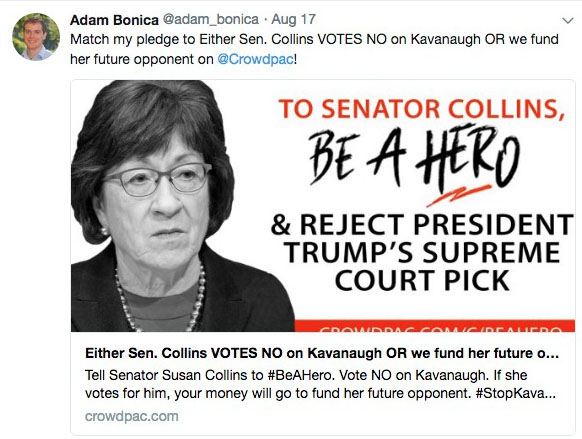
Adam Bonica and others liberals 2018 - Go-fund-me/CrowdPAC to eliminate Senator Collins

Adam Bonica and others liberals 2018 - Go-fund-me/CrowdPAC to eliminate Senator Collins
Outside spending functions as a, usually implied, threat.Daniel Tokaji, Renata Strause 2014
How Sausage is Made
Even the threat of big money being spent against a person or cause is enough to influence policies.Richard L. Hasen, Paul Bisceglio 2016
Plutocrats United: Campaign Money, the Supreme Court, and the Distortion of American Elections
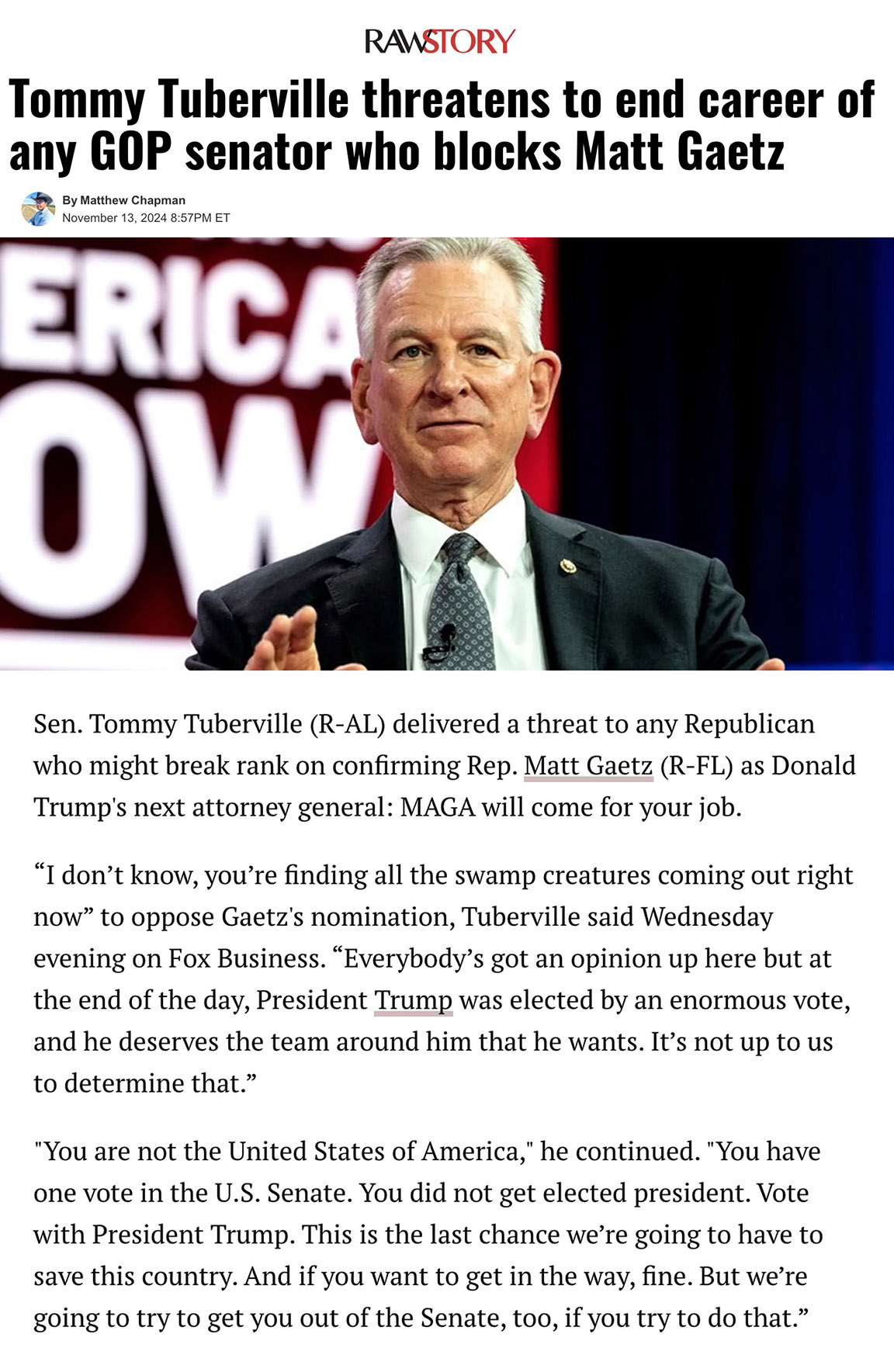
Tommy Tuberville threatens to end career of any GOP senator who blocks Matt Gaetz
Text: Sen. Tommy Tuberville (R-AL) delivered a threat to any Republican who might break rank on confirming Rep. Matt Gaetz (R-FL) as Donald Trump's next attorney general: MAGA will come for your job. “I don’t know, you’re finding all the swamp creatures coming out right now” to oppose Gaetz's nomination, Tuberville said Wednesday evening on Fox Business. “Everybody’s got an opinion up here but at the end of the day, President Trump was elected by an enormous vote, and he deserves the team around him that he wants. It’s not up to us to determine that.” "You are not the United States of America," he continued. "You have one vote in the U.S. Senate. You did not get elected president. Vote with President Trump. This is the last chance we’re going to have to save this country. And if you want to get in the way, fine. But we’re going to try to get you out of the Senate, too, if you try to do that.” Matthew Chapman Raw Story

Tommy Tuberville threatens to end career of any GOP senator who blocks Matt Gaetz
California’s Constitution, in Article IV that deals with the legislative branch of state government, makes it a felony for a person who seeks to improperly influence the vote or official action of a state legislator. Section 15 of Article IV not only provides that the person who seeks to improperly influence a legislator, but also the legislator who is “so influenced,” is guilty of a felony. What are the bases for this improper influence? Section 15 provides four of them: “A person who seeks to influence the vote or action of a member of the Legislature in the member’s legislative capacity by bribery, promise of reward, intimidation, or other dishonest means, or a member of the Legislature so influenced, is guilty of a felony.”… “Intimidation” is not defined in California law. One dictionary definition is when you frighten or threaten someone, usually in order to persuade them to do something that you want them to do. What might constitute intimidation? Under Section 15, it might include efforts by someone to get a Member to vote, not vote, or take an official action because the Member felt threatened or frightened.Chris Miceli 2023
What Is Improper Influence in the California Legislature?
Using threats or force to compel a public officer to perform an official act could also be prosecuted under the Penal Code pursuant to California’s extortion law. This section provides: “Extortion is the obtaining of property from another, with his consent, or the obtaining of an official act of a public officer, induced by a wrongful use of force or fear, or under color of official right.” Voting is an official act by a legislator. But are legislative negotiations permissible even if they result in a vote by wrongful use of fear or under color of an official right?Chris Miceli 2023
Peaking Under the Dome: Is It Deal-Making or Vote Trading in California’s Capitol?

Legislative Privilige - Jefferson, Madison, and the Speech and Debate Clause
Text: The Articles of Confederation also included a legislative privilege provision, which became the basis for the Speech or Debate Clause of the U.S. Constitution in 1789. A decade after the Constitutional Convention, Thomas Jefferson and James Madison explained the purpose of the Speech or Debate Clause in the following terms, in the course of persuading a grand jury to abandon an effort to prosecute several members of Congress for issuing allegedly “seditious” newsletters: That in order to give to the will of the people the influence it ought to have, and the information which may enable them to exercise it usefully, it was a part of the common-law, adopted as the law of this land, that their representatives, in the discharge of their functions, should be free from the cognizance or coercion of the co-ordinate branches, Judiciary and Executive.’ Jefferson and Madison continued that “to put the representative into jeopardy of criminal prosecution, of vexation, expense, and punishment before the Judiciary, if his communications, public or private, do not exactly square with their ideas of fact or right” would destroy the proper separation of powers and leave only a shell of representative democracy. – Steven Huefner

Legislative Privilige - Jefferson, Madison, and the Speech and Debate Clause
“His fear of opposition from some of these industries is so overwhelming that they have succeeded in immobilizing him with regard to regulatory legislation. For example several years ago he received a political scare when the electric companies bankrolled his opponent in the general election. Since then, according to [Congressman Robert 0.) Tiernan [D., R.I.], ‘Macdonald will not touch them.’ That interpretation is confirmed by Macdonald’s former aid, Marty Kuhn, who states that ‘Even though [Congressman MacDonald] easily defeated his opponent, the experience made him sort of paranoid. He is now reluctant to do anything that would offend the power people.’” David Mayhew 1974
The Electoral Connection
Representative Marjorie Taylor Greene revealed that Musk and Ramaswamy spoke about creating “naughty and nice” lists to monitor Congress members’ actions. “Elon and Vivek talked about having a naughty list and a nice list for members of Congress and senators and how we vote and how we’re spending the American people’s money,” Greene said, as reported by news agency AP. After Trump's victory, Elon Musk, who poured millions into Republican candidate's campaign to make him win, hinted that he would take a strong stance against Republican lawmakers who refuse to align with Trump’s agenda.Economic Times 2024
Elon Musk has a warning for Republicans who don't align with Trump’s agenda
Donald Trump’s team has threatened to weaponize Elon Musk against any Republican senators who plan to block the confirmation of his cabinet picks, according to a report. One of the president-elect’s senior advisers warned senators that if they vote against his nominees, they could be forced to face primary challenges funded by Musk, ABC reported. “If you are on the wrong side of the vote, you’re buying yourself a primary,” a senior adviser told ABC’s chief Washington correspondent Jonathan Karl. “That is all,” the adviser said. “And there’s a guy named Elon Musk who is going to finance it.” “The president gets to decide his Cabinet. No one else,” the adviser added.Rhian Lubin and James Liddell 2024
Trump team weaponizes Elon Musk in threat to senators who won’t confirm cabinet picks
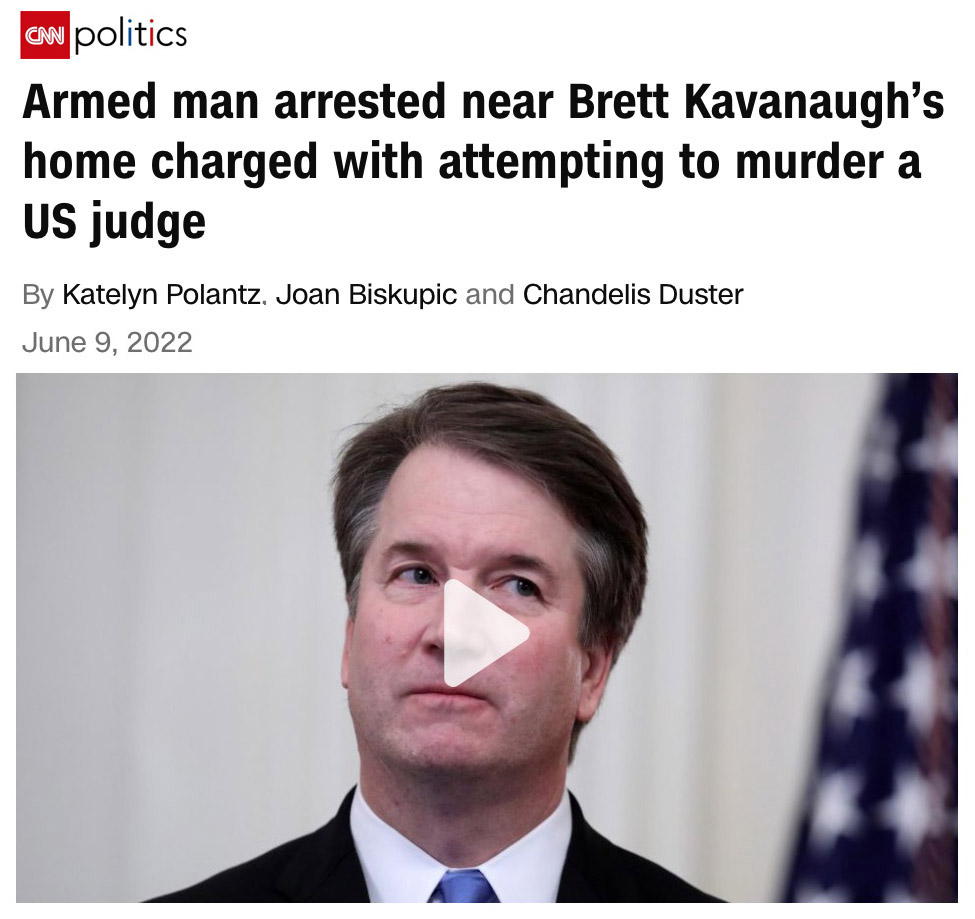
Armed man arrested near Brett Kavanaugh’s home charged with attempting to murder US judge

Armed man arrested near Brett Kavanaugh’s home charged with attempting to murder US judge
A lobbyist for a corporation could say [to a member of Congress], ‘We have this organization ready to air ads against you. What do you think about this bill?’Lisa Rosenberg 2012
The State of K-Street: Work in the Shadows
Had the deliberations been open while going on, the clamors of faction would have prevented any satisfactory result; had they been afterwards disclosed, much food would have been afforded to inflammatory declamation. Propositions made without due reflection, and perhaps abandoned by the proposers themselves, on more mature reflection, would have been handles for a profusion of ill-natured accusation. Every infallible declaimer, taking his own ideas as the perfect standard, would have railed without measure or mercy at every member of the Convention who had gone a single line beyond his standard.Alexander Hamilton 1792
The Papers of Alexander Hamilton
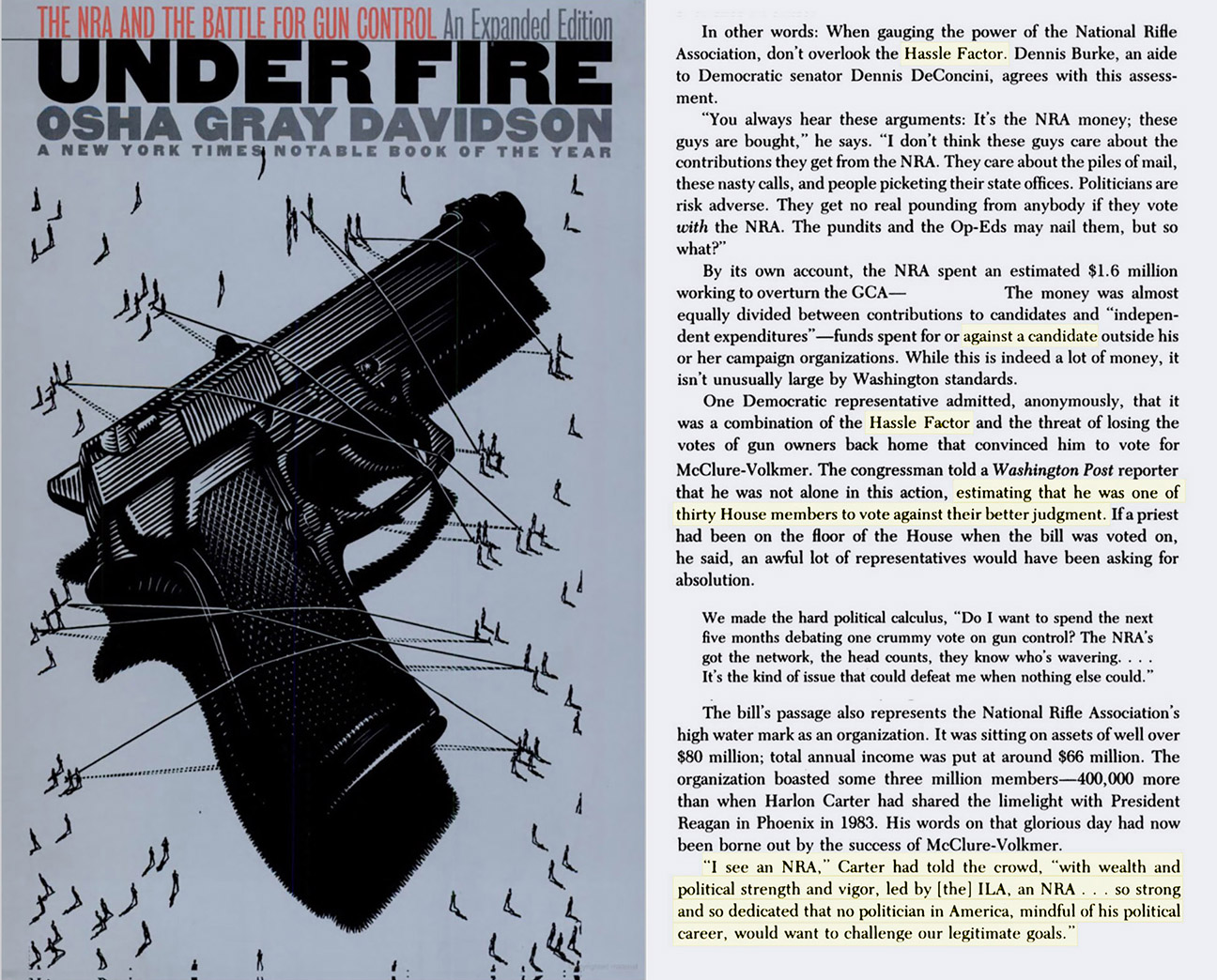
In Under Fire 1998 Osha Gray Davidson discusses how the NRA looks to spend money ‘against a candidate.’ And how the President, Harlon Carter, threatens members’ careers: “no politician in America, mindful of his political career, would want to challenge our legitimate goals.”

In Under Fire 1998 Osha Gray Davidson discusses how the NRA looks to spend money ‘against a candidate.’ And how the President, Harlon Carter, threatens members’ careers: “no politician in America, mindful of his political career, would want to challenge our legitimate goals.”
By encouraging with rewards or threatening with punishments, to influence the legislator’s judgment was to menace the whole fabric of American government and deserved the severest condemnation.Neil MacNeil 1963
Forge of Democracy
Republican leaders of the House have in recent years occasionally threatened to cut off these campaign contributions to party members unduly independent of their leadership.Neil MacNeil 1963
Forge of Democracy
Imagine a situation where the issues we are voting on are very controversial and sensitive and a Member may not have the courage to stand out during roll call and tally; could we rather not have provided for secret voting as was in the previous rules especially to do with issues of constitutional amendments?Monicah Amoding 2017
Parliament House, Kampala, Uganda July 20, 2017
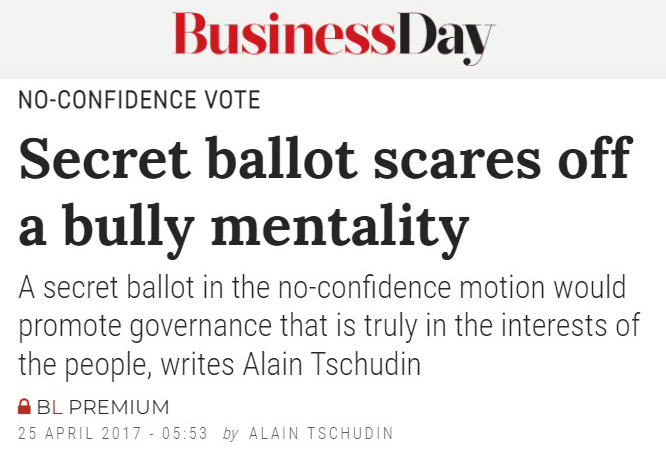
Alain Schudin 2017 - Secret ballot in Parliament scares off a bully mentality (South Africa)

Alain Schudin 2017 - Secret ballot in Parliament scares off a bully mentality (South Africa)
These activist political groups, especially labor unions and women’s organizations, made up a new force in American politics: the “bullet vote” that threatened extinction to the careers of politicians careless of their interests. The Woman’s Suffrage movement that revolutionized American politics in 1 920 by gaining the right to vote for women and the Anti-Saloon League that brought the prohibition of alcoholic beverages in the United States in the same year were the envy of other lobbyist groups. They proved above all the value of an open campaign carrying the intimidating threat of retaliation at the polls to those Congressmen who failed to heed the group’s demands. “The really effective lobby no longer works through back doors,” wrote a newspaperman in 1927. “It no longer wears a mask or waits for darkness to come for an opportunity to strike...The lobby – the intelligent lobby – has changed to conform to new conditions. Neil MacNeil 1963
Forge of Democracy
The January 6 insurrection at the Capitol seemed to mark a new peak in extremist intimidation targeting public officials. But it was hardly the only act of political violence to break the period of relative stability that followed the assassinations of the 1960s. There was the 2017 shooting of U.S. Rep. Steve Scalise and colleagues by a Trump detractor. There was the hammer attack on U.S. Rep. Nancy Pelosi’s husband by a right-wing conspiracy theorist who sought the then House speaker in her home. Then there were threats by Republican extremists against Republican members of Congress for refusing to support their preferred candidate for speaker. These acts grabbed headlines and spurred increases in security for federal officials.Yet over the same period, with far less attention and often little recourse, officeholders serving in local and state government across the country have faced a barrage of intimidating abuse. Threats and attacks constrain how freely officeholders interact with constituents, narrow the spectrum of policy positions they feel safe to support, and make them less willing to continue in public service. Unaddressed, the problem stands to endanger not just individual politicians but, more broadly, the free and fair functioning of representative democracy — at every level of government.Gowri Ramachandran 2024
Intimidation of State and Local Officeholders
William Green of Pennsylvania, political boss of Philadelphia, has denied he has used any similar threats of disciplinary action in keeping his colleagues from Philadelphia in harmony with party policy, but the Philadelphians in the House normally have voted together. “On party matters,” Green said, “we are usually agreed ninety-eight or ninety-nine per cent of the time. We usually talk it over before the vote.” Neil MacNeil 1963
Forge of Democracy
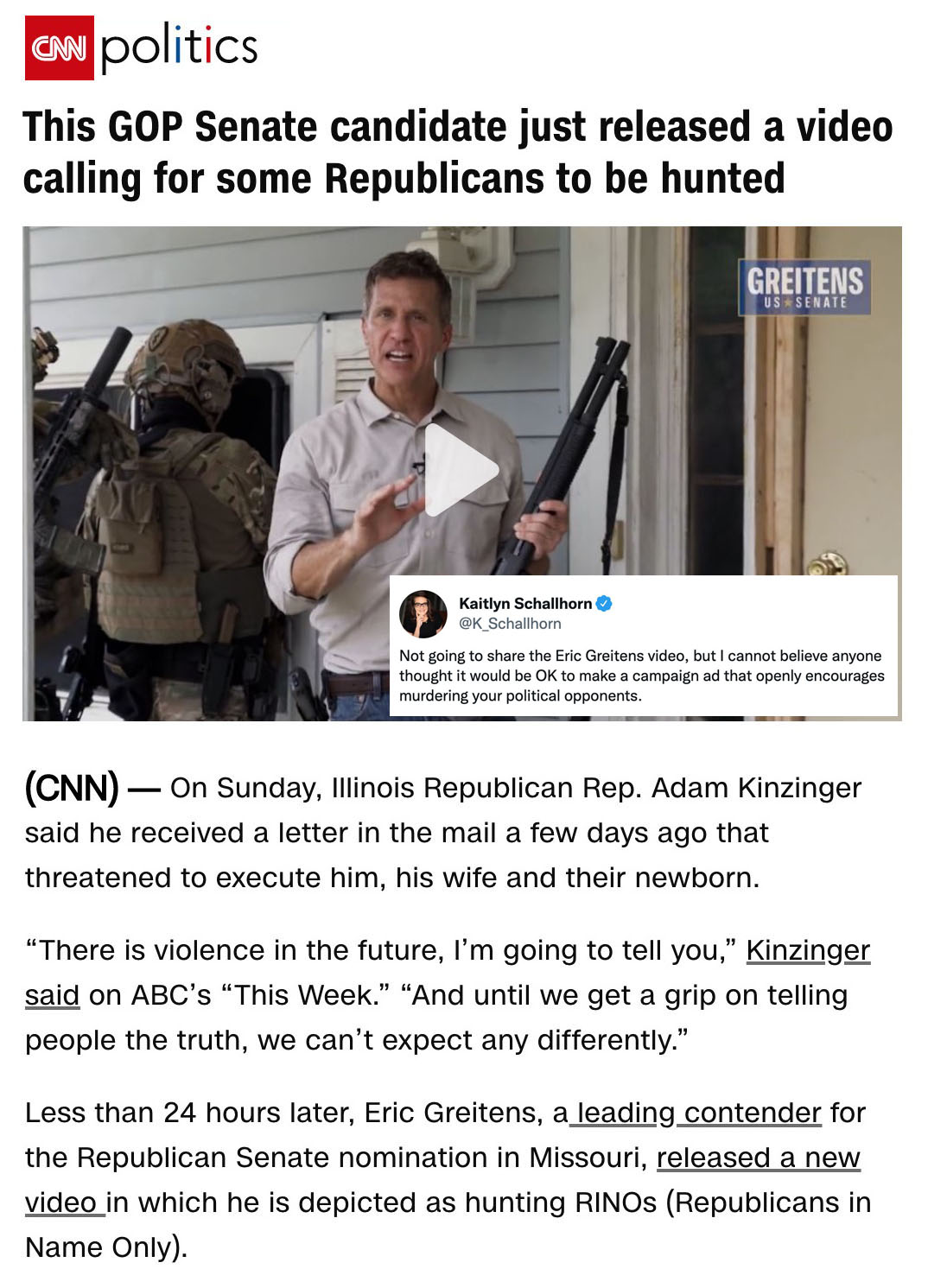
Chris Cillizza 2022 - GOP Senate candidate calling for Republicans to be hunted

Chris Cillizza 2022 - GOP Senate candidate calling for Republicans to be hunted
Representatives needed nerve to speak their minds on the floor; some, like Josiah Quincy of Massachusetts, refused to be silenced by open threats to their personal safety. Quincy, the Federalist leader in the House, resolved at the start of his career in the House in 1805 that he would boldly speak his views and neither be provoked into sending a challenge nor shamed into accepting one. It was not an easy resolve to keep; for his friend and colleague, Barent Gardenier of New York, was shot down, severely wounded, in a duel with George Campbell of Tennessee, Democratic leader of the House, and Quincy more than once believed that Campbell and Henry Clay, too, were trying to lure him into a duel. It was no wonder that the House acquired the name of the “Bear Garden” for its turbulence and furious partisanship. Neil MacNeil 1963
Forge of Democracy
The smoke-filled room is making a comeback. Condemned as a corrupt, anti-democratic means for nominating candidates to public office, the smoke-filled room has recently found prominent and diverse defenders. Last winter, Democratic stalwart Geraldine Ferraro celebrated the institution when she urged Democratic superdelegates to exercise their controlling power independently of, or even counter to, the will of the Democratic Party's rank and file. A few weeks earlier, Justice Scalia celebrated the smoke-filled room as a traditional, legitimate and accepted means for selecting candidates for public office, and hence one on which New York State could permissibly rely to select nominees for state trial judge. Smoke-filled rooms are not all alike, and the differences among them matter. This paper explores these differences by comparing the role of the smoke-filled room in the nomination process Barack Obama traversed in order to become the Democratic Party's nominee for president with the one Margarita Lopez Torres confronted when she sought her party's nomination to become a trial judge in Brooklyn. Broadly similar in structure, both nomination processes rely on decentralized state-run primaries to select delegates to attend party-run conventions that select the party's nominee.Ellen D. Katz 2008
Smoke-Filled Rooms
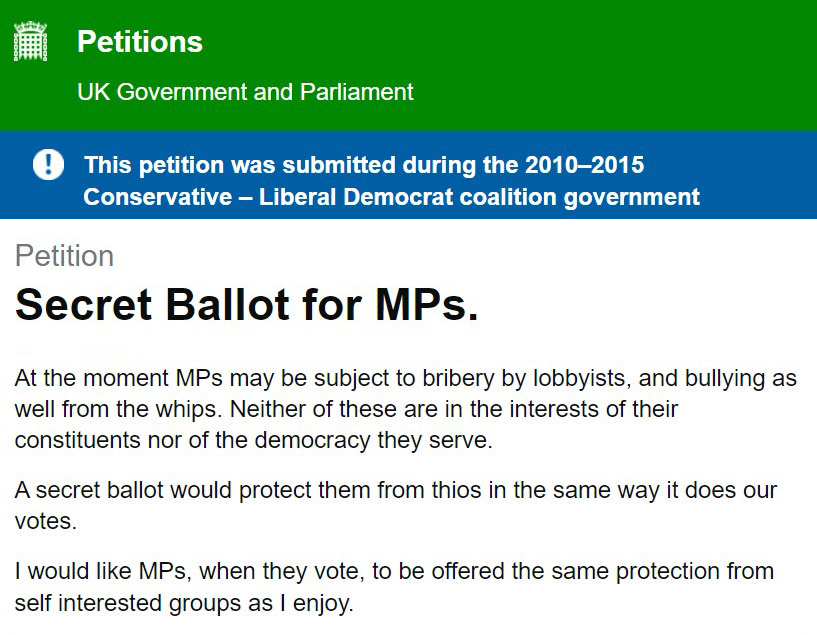
Petition 2012 - Prevent Bullying of MPs by employing secret ballots in Parliament (UK, England)

Petition 2012 - Prevent Bullying of MPs by employing secret ballots in Parliament (UK, England)
A legislator can hardly turn around or make a move in the corridors of the State House without being confronted with a veiled threat of the effect on his political fortunes of a vote for or against a particular proposition. Sometimes the threat is not very well veiled.Henry Parkman, JR 1938
Lobbies and Pressure Groups: A LegislatorÆs Point of View
The modern lobby, although it may use in some measure such methods and individuals to attain its ends, relies to a much greater degree on the quality of fear that is omnipresent with every legislator. Organized big businesses with large resources at their disposal, such as the chain store organizations, or retail trade, tobacco, oil, insurance, or utility interests, no longer endeavor to protect themselves or obtain special advantage solely by the crude methods of the professional lobbyist. While they retain and employ full-time men at the capitol to create and maintain friendly relations with the legislators, they also devote much time and effort to putting on imposing mass demonstrations at public hearings and, even more impressive to the average legislator, to arranging for barrages of letters, telegrams, telephone calls, and personal visits from his constituents.Henry Parkman, JR 1938
Lobbies and Pressure Groups: A Legislator’s Point of View
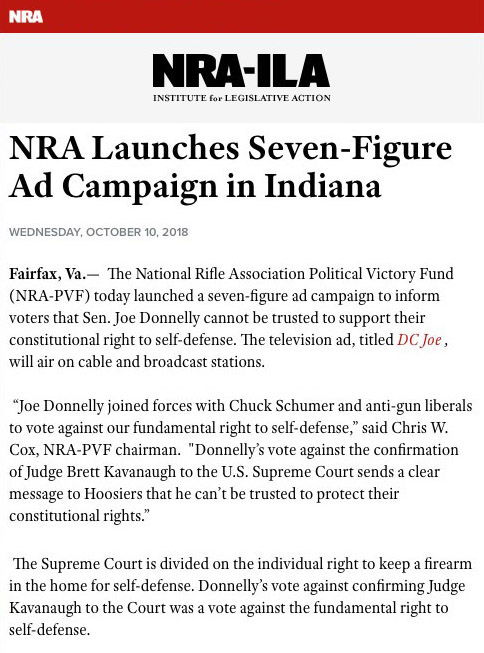
NRA boasts about their expensive attack ads 2018

NRA boasts about their expensive attack ads 2018
It’s no secret our campaign is taking on the political establishment and the big money interests who are now running negative ads against us in Iowa. The billionaire class is getting nervous—and they should.Bernie Sanders 2020
Super PAC ads swamp Dem primary
Political parties did not exist prior to electoral democracy, unless one counts the mobs of clienteles that Roman politicians could mobilize to rally and intimidate opponents.Francis Fukuyama 2014
Political Order and Decay
The Democratic primary — distinguished for most of the past year by how forcefully its contestants rejected big money — is awash in super PAC ads and dark-money spending. ...And increasingly, the messages are turning negative.Maggie Severns 2020
Super PAC ads swamp Dem primary
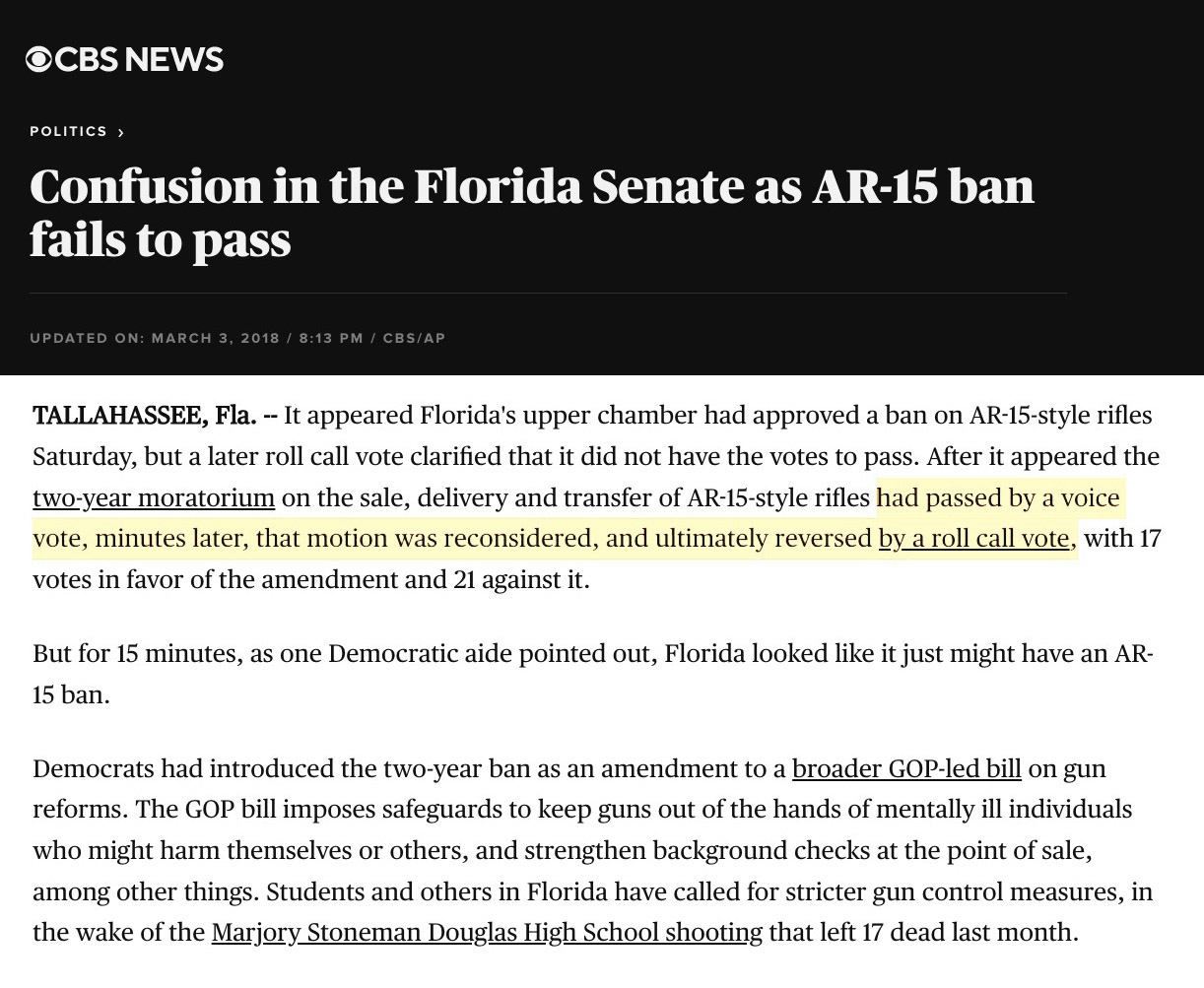
CBS 2018 - Florida Gun Control Passes on Secret Vote, Immediately Rescinded on Transparent Vote (NRA)

CBS 2018 - Florida Gun Control Passes on Secret Vote, Immediately Rescinded on Transparent Vote (NRA)
The AFL-CIO is still the most powerful union in Washington, but AFSCME is a close second. Together, the two are a terrifying force, and most Democrats would do anything not to incite their wrath.Rep. Timothy J. Penny 1996
Common Cents
Two different attacks launched against Sanders this week, one from the Conservative Club for Growth and another from a pro-Israel group. “I do have some concerns about Bernie Sanders’ health, considering the fact that he did have a heart attack,” an Iowan says in the Democratic Majority for Israel ad about Sanders, which is backed by a $681,000 TV buy saturating the airwaves in the week before the caucuses.Maggie Severns 2020
Super PAC ads swamp Dem primary
There’s the striking example of the Koch-backed Americans for Prosperity openly promising to wipe out candidates who support any curbs on carbon pollution. The group’s president said that if Republicans supported a carbon tax or climate regulations, they’d “be at a severe disadvantage in the Republican nomination process... We would absolutely make that a crucial issue.” The threat is plain: step out of line, and here come the attack ads and the primary challengers – all funded by the deep pockets of the fossil fuel industry, enabled by Citizens United, and largely protected from disclosure. It’s a modern political version of the ancient threat from Shakespeare’s evil Richard III: “I’ll make a corpse of him that disobeys.” Sheldon Whitehouse 2017
Captured

Alemany & Dawsey 2022 - Trump indicated support for hanging Pence

Alemany & Dawsey 2022 - Trump indicated support for hanging Pence
For 14 of the 15 dark money groups, more than half of the spending they reported to the FEC on ads overtly calling for the election or defeat of candidates was negative, showcasing the role these organizations have as attack dogs that frequently malign candidates from the shadows. Six dark money groups — the American Action Network, Americans for Job Security, Americans for Prosperity, Americans for Tax Reform, Crossroads GPS and Patriot Majority USA — self-reported to the FEC that more than 90 percent of their spending was negative between January 2010 and December 2016.William Gray 2020
Dark Money Illuminated
The heat was now on members of Congress to step in line. Those who rated 70 or higher on the Chamber’s How They Voted scorecard automatically got an endorsement from the group. But if their scores were low, and they represented a district where they were vulnerable to replacement by a challenger, they could expect to become the target of attack ads right up to election day. The Chamber would spend $133 million on lobbying in 2010—four times as much as it did on its record-busting blitz of TV attack ads that year. The fear campaign was on, even before the 2010 elections began in earnest. Donohue fanned the panic by spreading word around Washington that the U.S. Chamber was amassing a war chest as big as $75 million.Alyssa Katz 2015
The Influence Machine: The U.S. Chamber of Commerce and the Corporate Capture of American Life.
campaigns and become more careful in choosing sites for public appearances. Alegria Fonseca, an official on Galan’s presidential campaign, said it is not uncommon for ambulances to be dispatched to the political rallies and public speeches of political candidates, just in case of an assassination attempt. Many candidates have eliminated out-of-the-way campaign stops after the death of Galan, who was gunned down in a poor neighborhood in Bogota’s outskirts, authorities said.
Fear of Assassination Remains a Fact of Life for Many
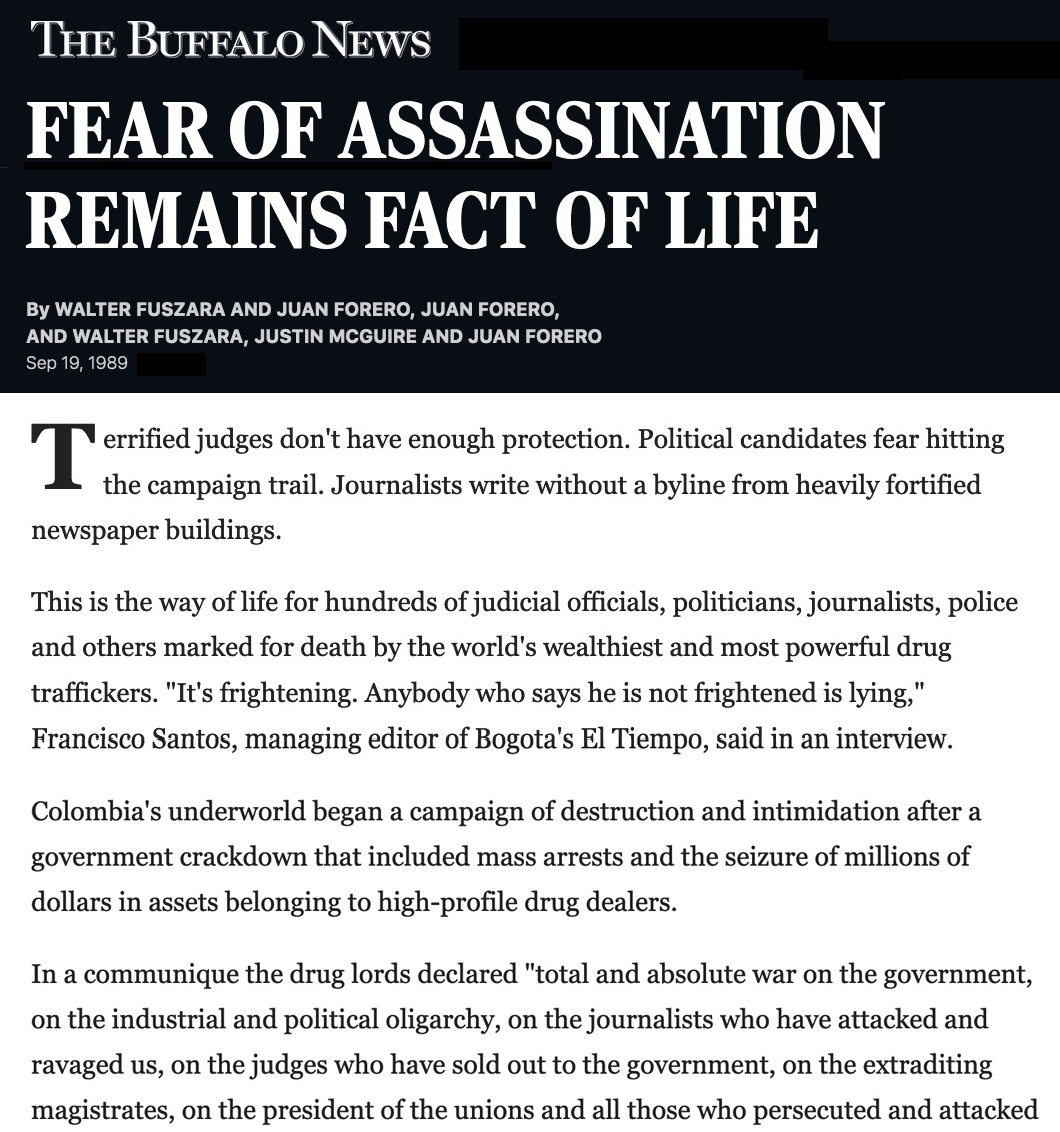
Fuszara Forero 1989 - Fear of Assassination

Fuszara Forero 1989 - Fear of Assassination
Seattle voters have seen their mailboxes stuffed not only with brochures from City Council candidates in the Aug. 6 primary election but also with negative ads and slick pamphlets from independent political-action committees (PACs) with names like People for Seattle and Moms for Seattle. Some candidates are decrying mailers sent by the PACs taking large contributions from wealthy donors. The ads have warned voters that certain candidates will perpetuate City Hall dysfunction and have used Photoshop to show homeless tents at a playground.Daniel Beekman 2019
PACs with big money launch negative ads
Many members of Congress are afraid to vote against any of the crime bills, because “if you vote against any of these measures, you'll be perceived as soft on crime or pro-crime,” said Senator Mitchell. Political groups can spotlight a single vote in a TV advertisement, he said. “There is widespread concern that a vote might be distorted.”Julia Malone 1984
Senate quietly upends US justice system (incarceration)
Push poll discussed in documentary “Lee Atwater: The Boogie Man”
Push poll discussed in documentary “Lee Atwater: The Boogie Man”
Before I lost, you would turn on the television, and each commercial break, there would be not one, but usually two, negative ads about me.Rep. Chris Carney 2015
Influence Machine: Chamber of Commerce and Corporate Capture
With committee proceedings and voting now matters of public record, lawmakers can no longer hide behind closed doors and unrecorded votes; they must act in the open. With constituents and campaign contributors watching, they must take care to protect their electoral flanks. As single-issue groups and PACs become more numerous and more forceful, sitting legislators may be less willing to risk offending any potentially decisive electoral force. Prudence dictates caution, and lawmakers may feel obliged to resist party or presidential calls for support. Where previously members could help out undetected, in the quiet of the committee room or on a standing or teller vote on the floor, at present there are dangers in doing so. The observer, more likely a group than a citizen, has greater influence in the more public setting of contemporary congressional politics. Members may be loath to act at all, preferring to entrench themselves electorally by being ombudsmen, by claiming credit for serving the district, or by limiting their policy making to “position taking,” choosing sides on substantive questions only when it is safe to do so or obfuscating their stands to minimize the risk of being caught on the wrong side of a policy issue that turns out to be controversial.Joseph Bessette 1982
Is Congress A Deliberative Body?
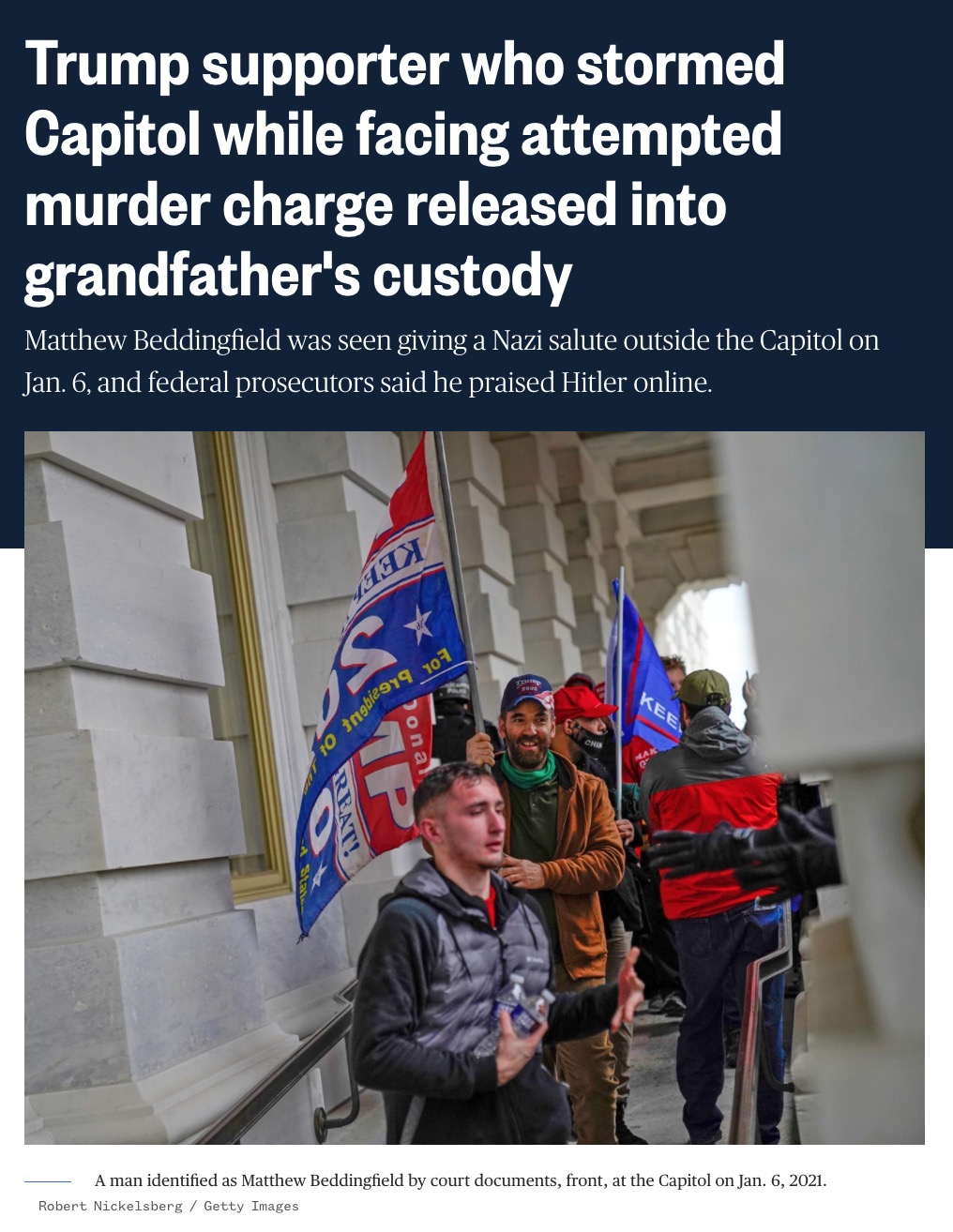
Attempted Muderer Storms Capitol and Gets Released 2022

Attempted Muderer Storms Capitol and Gets Released 2022
This election year will be the moment when individual candidate super PACs — a form of legalized bribery — become a truly toxic force in American politics. The giant ideological super PACs formed by political operatives like Karl Rove spent hundreds of millions in 2012, but didn’t produce the conservative revolution demanded by the big donors. So now the torrent of cash is heading toward smaller groups set up to promote a single candidate or, more often, to trash that candidate’s opponent.Editorial New York Times 2014
The Line at the ‘Super PAC’ Trough
A number of nonprofits with ties to major donors ran ads in the days leading to the final vote, trying to persuade the public of the bill’s merits – and pressure lawmakers to vote “yes” (Bykowicz 2017). The leader of a Super PAC with ties to Senate Majority Leader Mitch McConnell said with reference to the bill, “[Donors] would be mortified if we didn’t live up to what we’ve committed to on tax reform” (Schultz 2017). Lawmakers implied – or even outright admitted – that their donors were effectively extorting them to pass the legislation. For instance, Senator Lindsey Graham was asked what would happen if the tax bill were to fail, and he replied, in part, that “[campaign] contributions would stop” (Thorp 2017). Representative Chris Collins was even more direct: “My donors are basically saying, ‘Get it done or don’t ever call me again’” (Marcos 2017). Clayton Peoples 2020
The Undermining of American Democracy: How Campaign Contributions Corrupt Our System and Harm us All
This special procedure was utilised by a request of one-fifth of MPs when the Vote on the EU Budget 2014 – 2020 took place back in February 2013. In that instance, the special procedure was aimed at preventing national governments from bullying MPs by threatening to expose their [secret ballot] votes in this sensitive matter.University of Oxford 2017
Secret ballot voting by the National Assembly in motions of no confidence (UK, European Union)
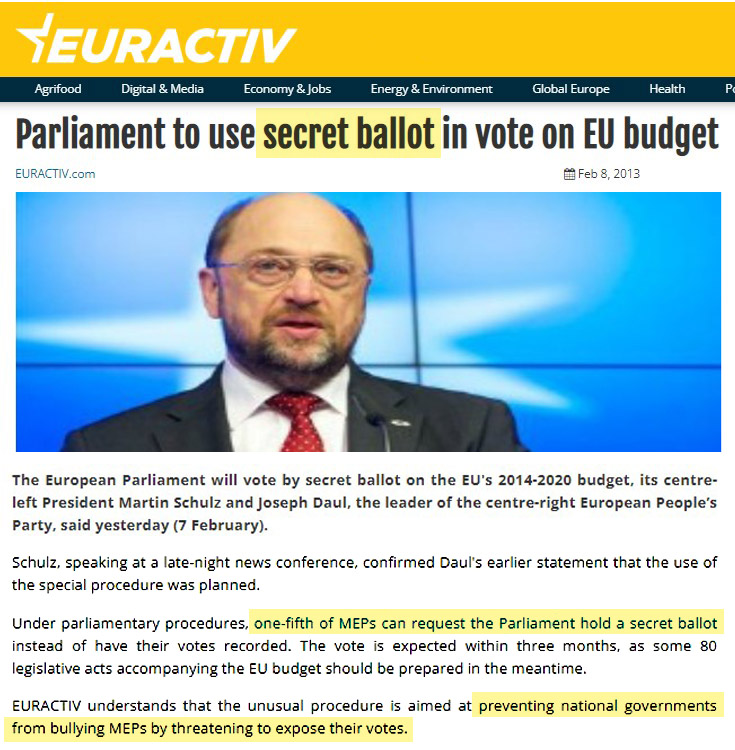
Eurpean Union Parliament to use secret ballot in vote on EU budget to prevent bullying

Eurpean Union Parliament to use secret ballot in vote on EU budget to prevent bullying
The people who are really good at legislating are good at knowing how to threaten the use of negative power.Representative Timothy Wirth 1987
The Power Game
Citizens United granted inanimate corporations and their special-interest fronts new power in our elections, not just through the corrupting ability to buy elections for favored candidates but also through the corrupting but less visible ability to threaten officeholders with a barrage of negative attack ads if they fail to cast a pro-corporate vote. Sheldon Whitehouse 2017
Captured
Attack ads accounted for about 70 percent of the airings paid for by politically active nonprofits, according to the analysis of television ads identified as positive or negative. By comparison, fewer than 20 percent of airings paid for by all political groups were critical in tone.Frank Bass 2016
“Dark Money” Groups More Likely to Sponsor Attack Ads
A 2019 PBS Frontline report highlights the power of negative advertising and campaigning. In this particular clip, Lee Atwater “The Babe Ruth of Negative Politics” talks about intimidating members of Congress.
A 2019 PBS Frontline report highlights the power of negative advertising and campaigning. In this particular clip, Lee Atwater “The Babe Ruth of Negative Politics” talks about intimidating members of Congress.
If you’re an incumbent running for reelection, and opposition research shows that your opponent once voted for or otherwise supported a tax increase — no matter how well-intentioned or necessary — you use polling to find out which label will do the most damage: “tax raiser,” “job killer,” or “establishment politician,” for example. Identify which one moves the needle the most with the audiences you need to persuade, and hammer it mercilessly until the electorate cannot separate your opponent from the phrase that turns them off.Andrew Ricci 2016
The dirty secret about negative campaign ads — they work
As long as Tea Party groups are dissatisfied with the bill, it’s really a lose-lose vote for mainstream House conservatives. Many Republicans just have no incentive right now to vote for anything that will anger conservative groups.Jonathan Bernstein 2013
GOP lawmakers, cowed by the right, drop pretense of policy sanity
One month before the Democratic primary, the Ohio AFL-CIO sent thousands of fliers to Mann’s constituents. “In 1992, union workers backed David Mann’s election to Congress,” the fliers said. “Then he turned his back on us. When you hear the word ‘betrayal,’ think of David Mann.” Richard Walsh, the AFL-CIO’s national political director, told the New York Times that Mann got what he deserved. “There’s a sense of betrayal here,” Walsh said. “we’re not afraid to punish our enemies.”Rep. Timothy J. Penny 1996
Common Cents
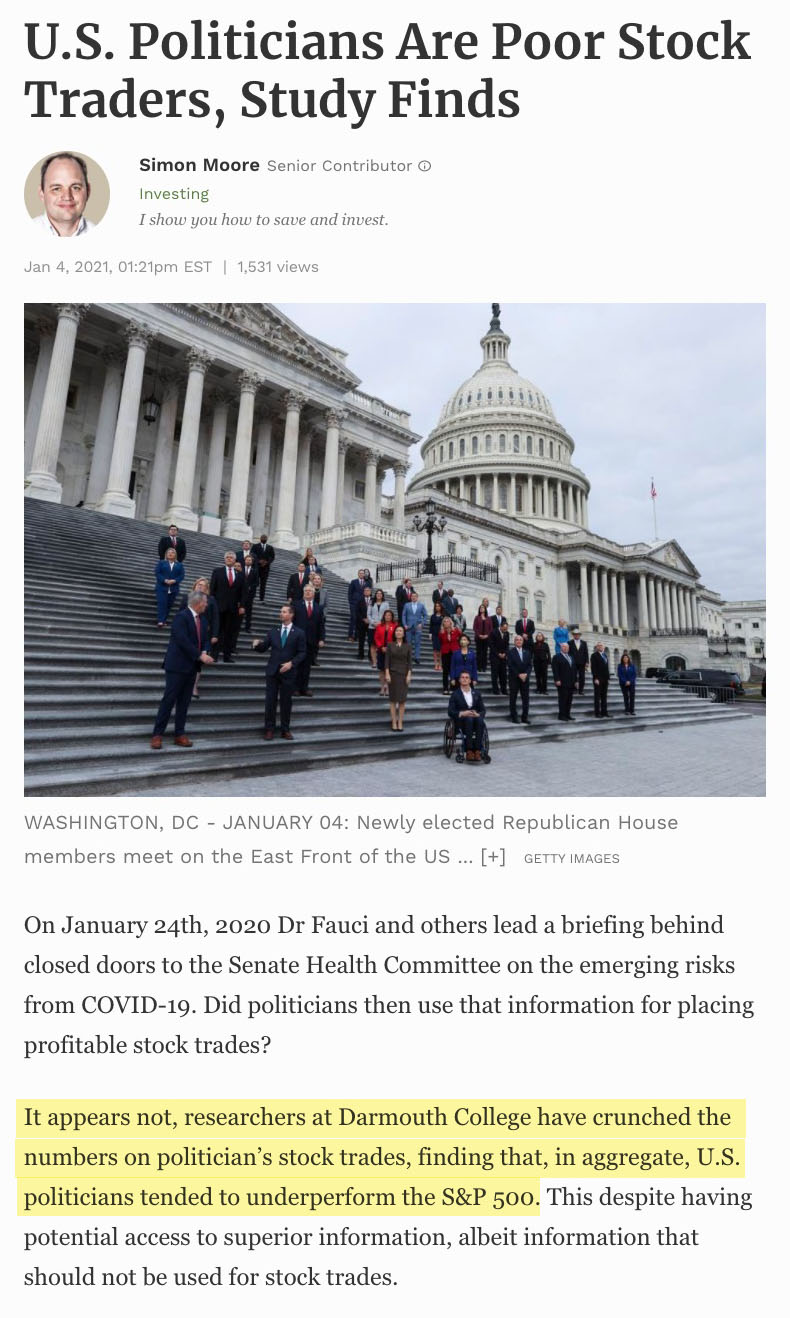
Simon Moore (Forbes) 2021 - U.S. Politicians Are Poor Stock Traders, Study Finds
Note: While this doesn’t have much to do with bribery or intimidation, we inserted it here to underline how the public narrative sees members as corrupt individuals profiting off of their inside knowledge via the stock market, when the truth is, they do worse than average.

Simon Moore (Forbes) 2021 - U.S. Politicians Are Poor Stock Traders, Study Finds
But mostly, the spectacle left us wondering what the Democrats — especially their feckless Senate leaders — plan to do with their majority in Congress if they are too scared of Republican campaign ads to use it to protect the Constitution and restrain an out-of-control president... Many of the 16 Democrats in the Senate and 41 in the House who voted for the bill said that they had acted in the name of national security, but the only security at play was their job security.New York Times Editorial Board 2007
The Fear of Fear Itself
In 1990, President Bush tried, at great political cost, to reduce the deficit. After months of secret negotiations, the White House and congressional leaders agreed on a plan that advertised $500 billion in deficit reduction over five years. The crucial vote occurred on the first week of October…At a morning meeting with Republicans the day of the vote, White House Chief of Staff John Sununu threatened that Bush would travel to the districts of Republicans who voted against him.Rep. Timothy J. Penny 1996
Common Cents
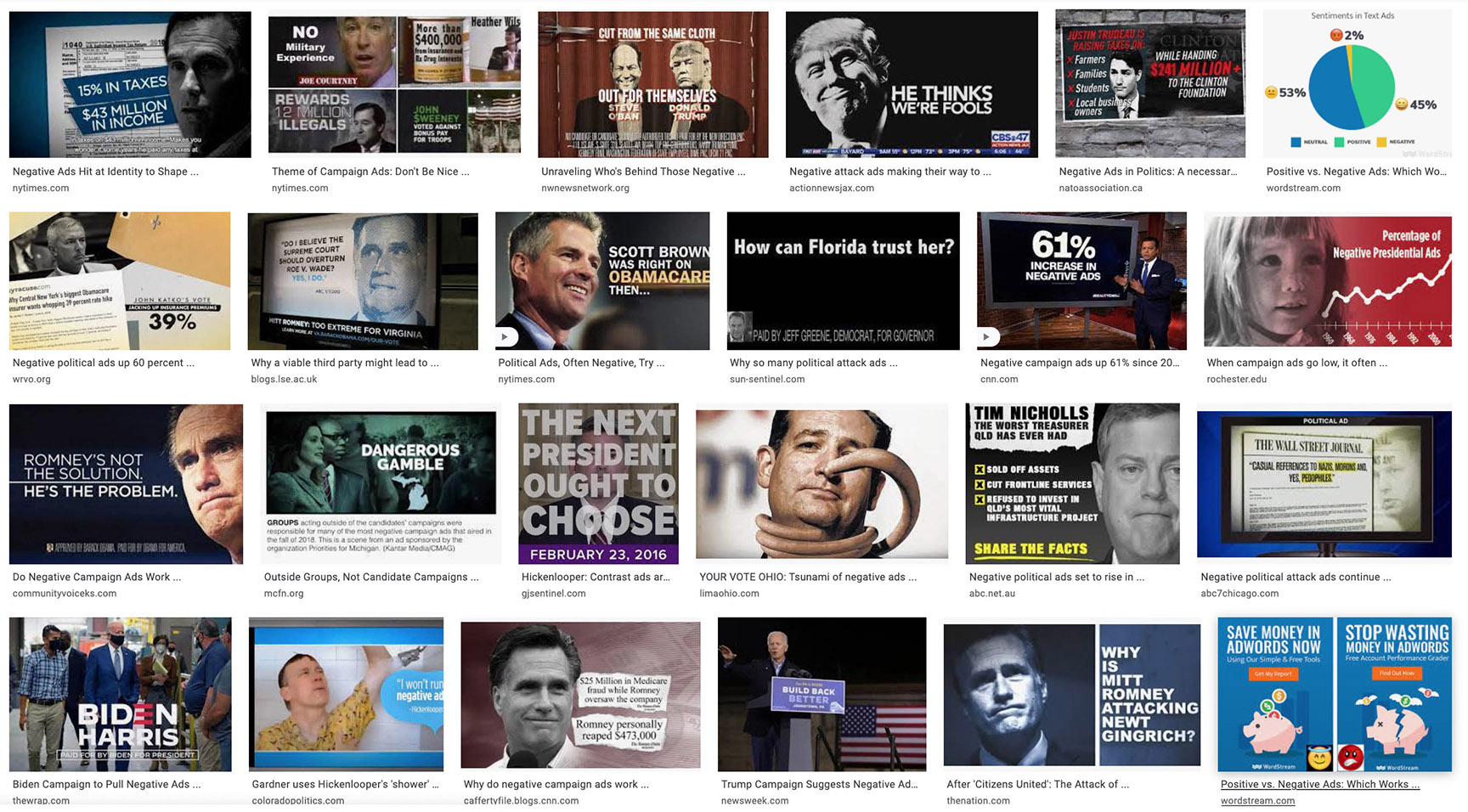
Google Search 2021 – “Negative Ads”
Note: Statistically bribery doesn’t exist on the federal level, but there are millions of examples of negative ads, slander and intimidation each year - the most salient of which are the primary use of dark money.

Google Search 2021 – “Negative Ads”
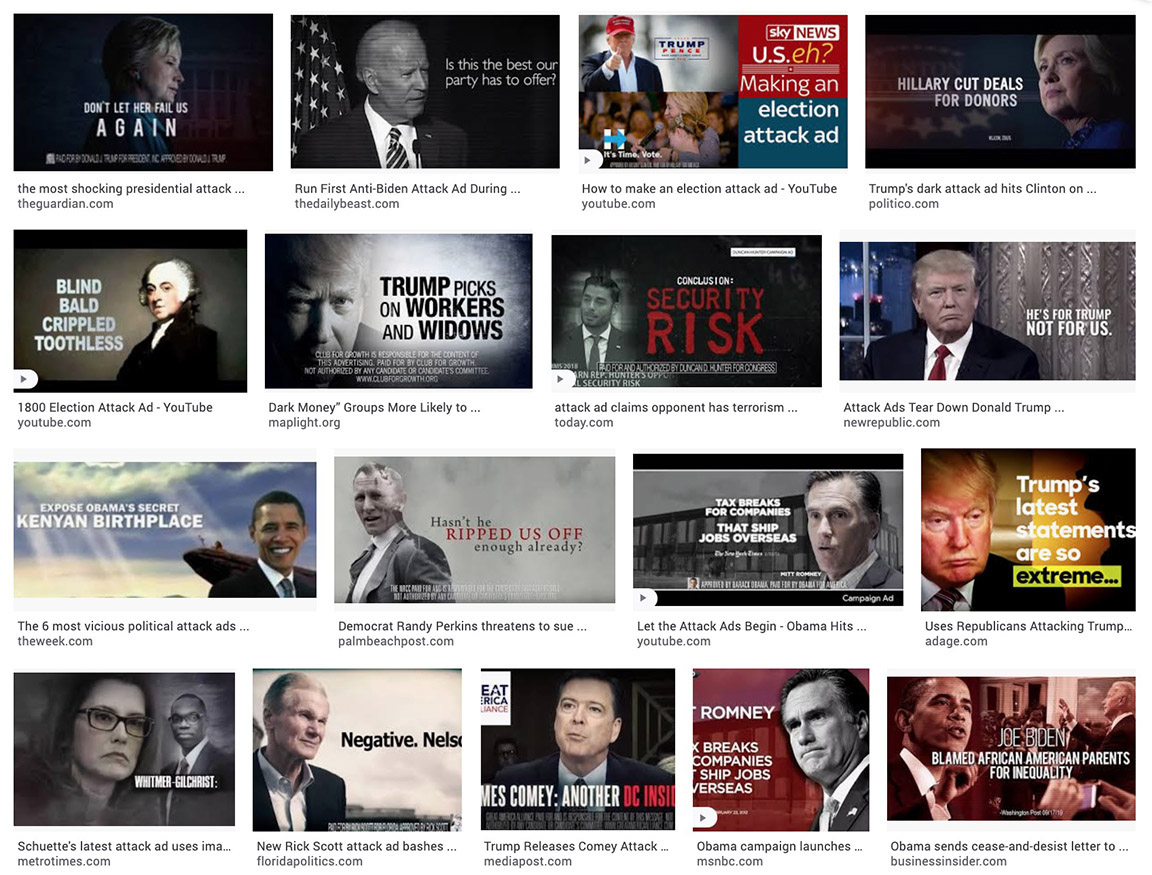
Google Search 2020 – “Attack Ads”
Note: Statistically bribery doesn’t exist on the federal level, but there are millions of examples of negative ads, slander and intimidation each year - the most salient of which are the primary use of dark money.

Google Search 2020 – “Attack Ads”
The need to generate materials for negative commercials also produces an ugly blame game in Washington. Posturing for their next campaigns, elected officials sometimes introduce legislation designed to embarrass the opposition. This sort of behavior has heightened the gridlock in Washington over the past decade.Stephen Ansolabehere & Shanto Iyengar 1995
Going Negative
Do campaign contributions from oil and gas companies influence legislators to vote against the environment (bribery), or do these companies invest in legislators that have a proven anti-environmental voting record (brubery/investment)? Using 28 years of campaign contribution data, we find that evidence consistently supports the investment hypothesis: The more a given member of Congress votes against environmental policies, the more contributions they receive from oil and gas companies supporting their reelection.Goldberg, Marlon, Wang, Linden & Leiserowitz 2020
Oil and gas companies invest in legislatorsNote: This is clearly not bribery, but calliing this action of donations an ‘investment’ is a bit duplicitous as well. These anti-environmentalist candidates surely received their money in response to environmentalist challengers, or to intimidate (via early donations) environmental challengers away from running at all. Thus, the ‘investment’ likely occurs only as a result of opposition competition. This isn’t investment, which would occur no matter the amount of competition. This is brubery.
President Museveni has shed off all pretense of niceties and its now brute force at work. At the height of the removal of age limit debate dubbed Togikwatako, the opposition MPs put up a spirited fight in parliament to defend the sanctity of the constitution. The regime was not having any of it and on 27th September, 2017 a gang (believed to be members of the elite presidential guard) invaded the house and beat up MPs leaving some of them hospitalised and others like Hon Betty Nambooze with permanent disabilities. Unfortunately, Museveni eventually got his way and the age limit was scrapped by Parliament.Miria Matembe 2019
Struggle For Freedom & Democracy BetrayedNote: During a Parliamentary discussion over the age-limit clause of the President, one that if maintained would remove the aging President Museveni from power, bullies entered Parliament and began to beat the members. The opposition groups in Parliament, seeking to maintain the age-limit, were also seeking to have a secret ballot parliamentary vote on the question. President Museveni did everything in his power to prevent that. He suceeded, the vote was open, and he (and his armed gangs) won by over 90% of the vote. Yet most agree that if the vote had been secret he would have lost. Matembe continues “[President Musevini] pitched camp in the Parliament’s chamber to personally see to it that the MPs voted as instructed.”
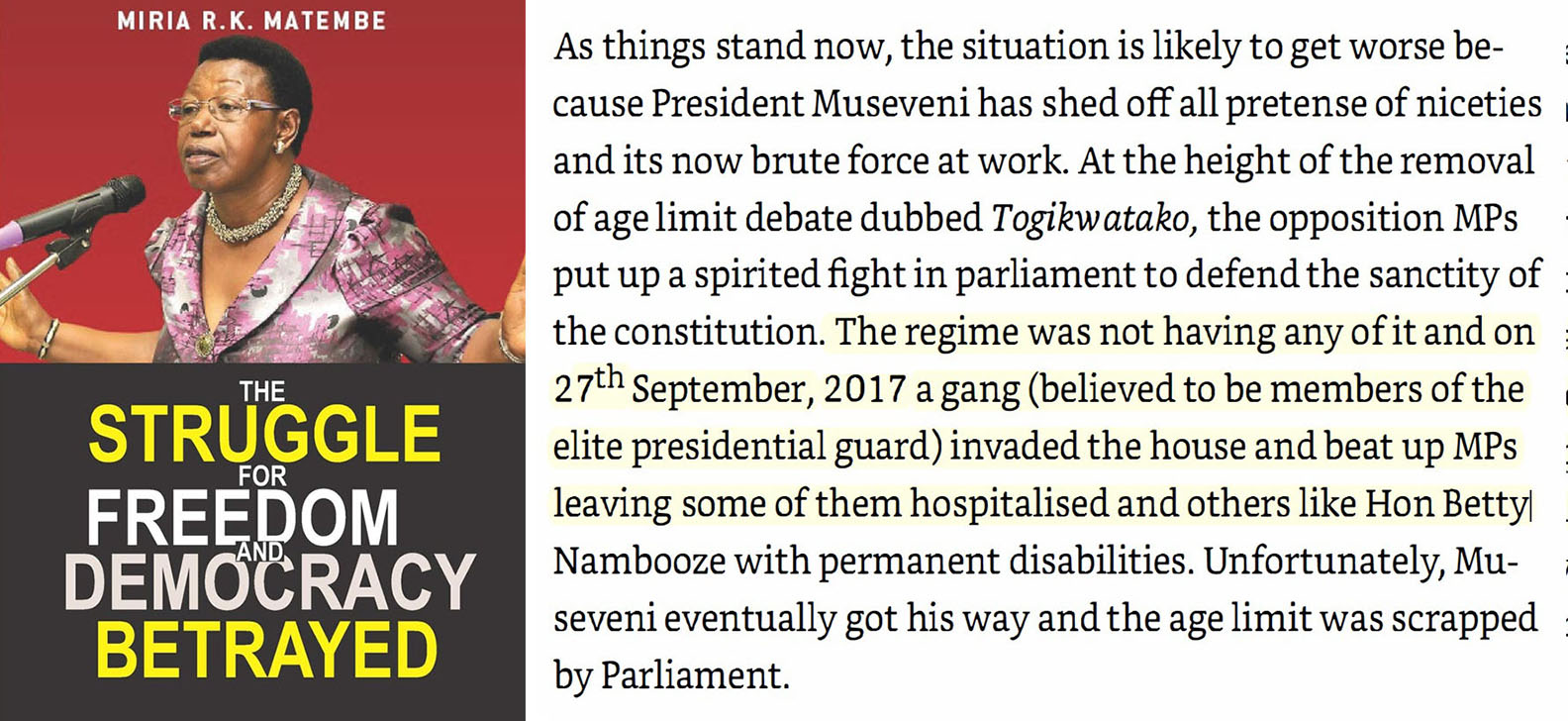
Miria Mutembe 2019 - Struggle For Freedom & Democracy Betrayed

Miria Mutembe 2019 - Struggle For Freedom & Democracy Betrayed
According to the rules, voting on the removal of the term limits was supposed to be by secret ballot. However, the government quickly moved to seek an amendment of the rules of procedures so as to make voting on this issue open, whereby each individual member would be required to verbally and openly declare YES or NO to the lifting of the term limits. My suspicion was that this change of procedure was sought that members...would be intimidated and publicly vote in favour of the motion. As a member on that Rules Committee, I vehemently opposed the amendment of this rule of procedure.Miria Matembe 2019
The Struggle For Freedom & Democracy Betrayed
Overall, AFP exhibits an ideal combination of autonomy from, and embeddedness within, GOP circles, a unique situation that helps the Koch network serve as an ideological backbone and right-wing force for today’s Republican Party. This happens not only because the Koch network throws a lot of money around, and not even because it threatens politicians with sanctions if they stray from the Koch agenda—tactics that other groups, like the Club for Growth and ATR, perfected long before AFP emerged. Rather, the most pervasive and subtle form of leverage by the Koch network on the Republican Party happens because of the flow of people back and forth between the two operations.
A concrete example nicely dramatizes how AFP’s parallel and intertwined organization can help the far right prod and pull Republicans and powerfully affect policy agendas and outcomes. In the November 2012 elections in Tennessee, a campaign operative named Andrew Ogles led successful efforts to elect Republicans to super-majority control of the state legislature. In early 2015, Bill Haslam, the very popular GOP governor of the state who had himself won re-election by an overwhelming margin, pushed a proposal to adopt a conservative variant of Medicaid expansion under the Affordable Care Act. This proposal had strong backing from Tennessee hospitals and health care businesses, as well as from the state’s Chamber of Commerce. But Tennessee’s far right was firmly opposed to the expansion. Backed by resources from national AFP headquarters, an all-out campaign to block legislative approval of Haslam’s proposal was spearheaded by the state AFP organization—led by its recently-appointed state director, none other than Andrew Ogles. In a short span, Ogles went from electing Republicans to full control of the Tennessee legislature to targeting many of those very same legislators with retribution when they showed any openness to expanding Medicaid —not just lobbying them, but also unleashing radio ads and door-to-door canvassers. In a very short time, Governor Haslam’s proposal died in the legislature. 63 Obviously, AFP-Tennessee Director Ogles knew exactly how to leverage the very Tennessee GOP legislature he had helped to elect; and his expertise and leadership allowed AFP, working with other right-wing groups, to re-set the legislature’s agenda and undercut the Republican governor’s willingness to compromise with the Obama administration. Theda Skocpol and Alexander Hertel-Fernandez 2016
The Koch Network and Republican Party Extremism
They have spent hundreds of millions of dollars, much of it through secret “dark money” channels, to elect their preferred candidates, often bankrolling negative advertising and distorting issues about which everyday Americans care.Michael Sozan 2019
Ending Foreign-Influenced Corporate Spending in U.S. Elections

William Gray 2020 - Dark Money Illuminated

William Gray 2020 - Dark Money Illuminated
Political attacks funded by Citizens United money, and the very real threat of those attacks if you don’t behave, loom over Republicans who might work with Democrats on curbing carbon pollution. These threats are particularly concrete and potent when it comes to the primary process: the Koch network has made plain that any Republican lawmaker who goes against the corporate line on climate change will be at a “severe disadvantage in the nominating process.” If a Republican in Congress were to publicly acknowledge the reality of climate change and try to do something about it, the fossil-fuel industry could handpick a Tea Party candidate and throw millions of dollars her way from behind innumerable masks to take that Republican out in the next primary. Sheldon Whitehouse 2017
Captured
Any governor can now be fired if the president believes that he has broken the law. Putin also persuaded the Duma to enact legislation reducing the tax revenues sent to the provinces. Putin’s other targets have been the media and Russia’s infamous oligarchs, whom he has threatened with raids, arrests, and imprisonment. As a strategy of intimidation, it has worked. Freedom of the press in Russia barely exists anymore.Fareed Zakaria 2003
Future of Freedom
We provide anecdotal evidence that interest groups do threaten to contribute to opposing candidates in order to extract concessions.Marcos Chamon & Ethan Kaplan 2013
The Iceberg Theory of Campaign Contributions - Political Threats and Interest Group Behavior
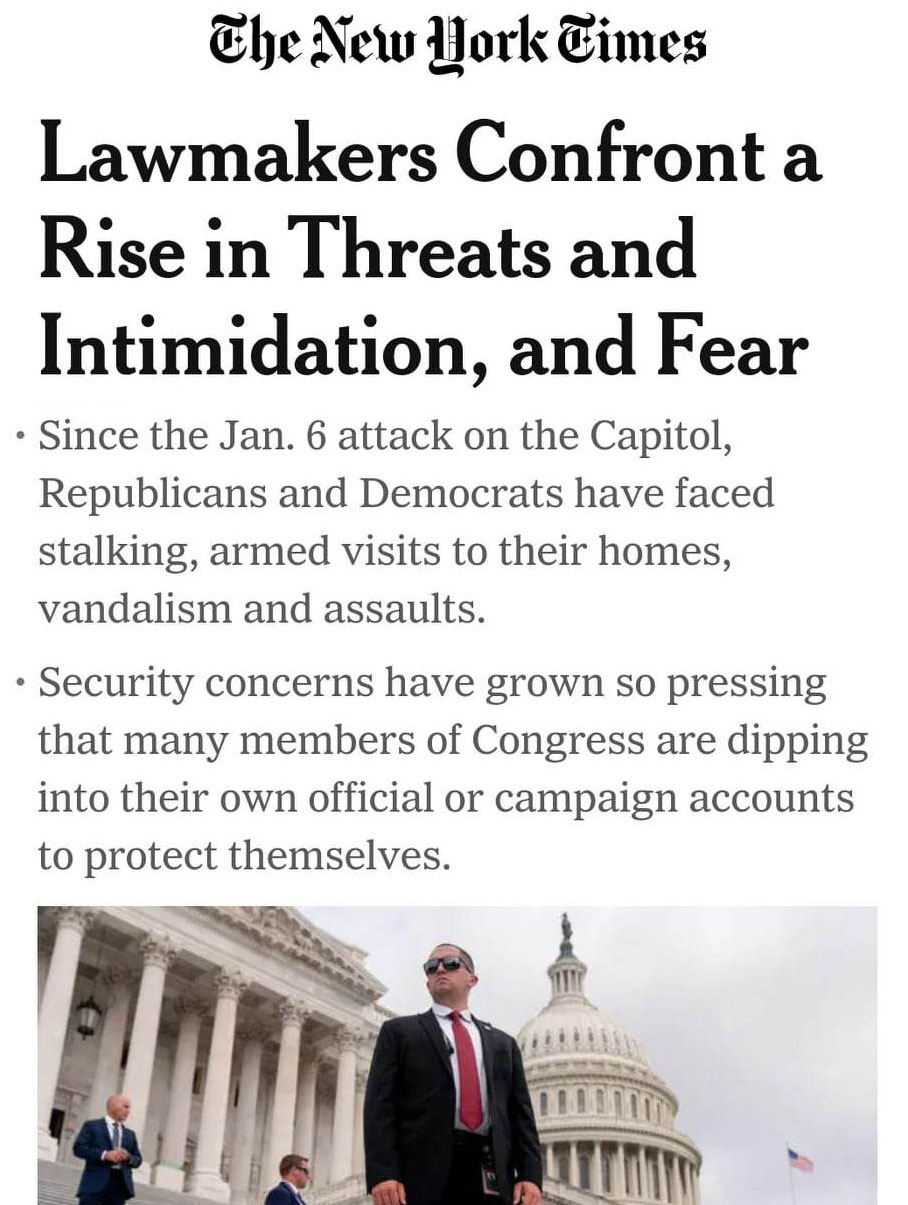
Stephanie Lai, Luke Broadwater and Carl Hulse 2022 - Lawmakers Confront a Rise in Threats

Stephanie Lai, Luke Broadwater and Carl Hulse 2022 - Lawmakers Confront a Rise in Threats
In Bangor, Maine, an unknown visitor smashed a storm window at Senator Susan Collins’s home. In Seattle, a man who had sent an angry email to Representative Pramila Jayapal repeatedly showed up outside the lawmaker’s house, armed with a semiautomatic handgun and shouting threats and profanities. In Queens, a man who had traveled across the country waited in a cafe across the street from Representative Alexandria Ocasio-Cortez’s office to confront her, part of a near-constant stream of threats and harassment that has prompted the congresswoman to switch her sleeping location at times and seek protection from a 24-hour security detail. Members of Congress in both parties are experiencing a surge in threats and confrontations as a rise in violent political speech has increasingly crossed over into the realm of in-person intimidation and physical altercation. In the months since the Jan. 6, 2021, attack on the Capitol, which brought lawmakers and the vice president within feet of rioters threatening their lives, Republicans and Democrats have faced stalking, armed visits to their homes, vandalism and assaults.Stephanie Lai, Luke Broadwater and Carl Hulse 2022
Lawmakers Confront a Rise in Threats (NY Times)
A special interest group’s threat of contributing $1 dollar to the opponent can induce the same level of support to the special interest policy as an actual $1-dollar contribution to each candidate would in a bilateral contracting setting. Even when equilibrium contributions are made, they are still leveraged by an implicit out-of-equilibrium threat. For example, sup pose a special interest group contributes $2,000 to the stronger of two candidates in exchange for its support, while threatening to contribute $10,000 to her opponent if that support is denied. This $2,000 equilibrium contribution in our multilateral contracting framework can induce the same level of support from that candidate that a $12,000 would in a traditional bilateral contracting setting ($2,000 for the actual contribution and $10,000 for the out-of-equilibrium one).Marcos Chamon & Ethan Kaplan 2013
The Iceberg Theory of Campaign Contributions - Political Threats and Interest Group Behavior
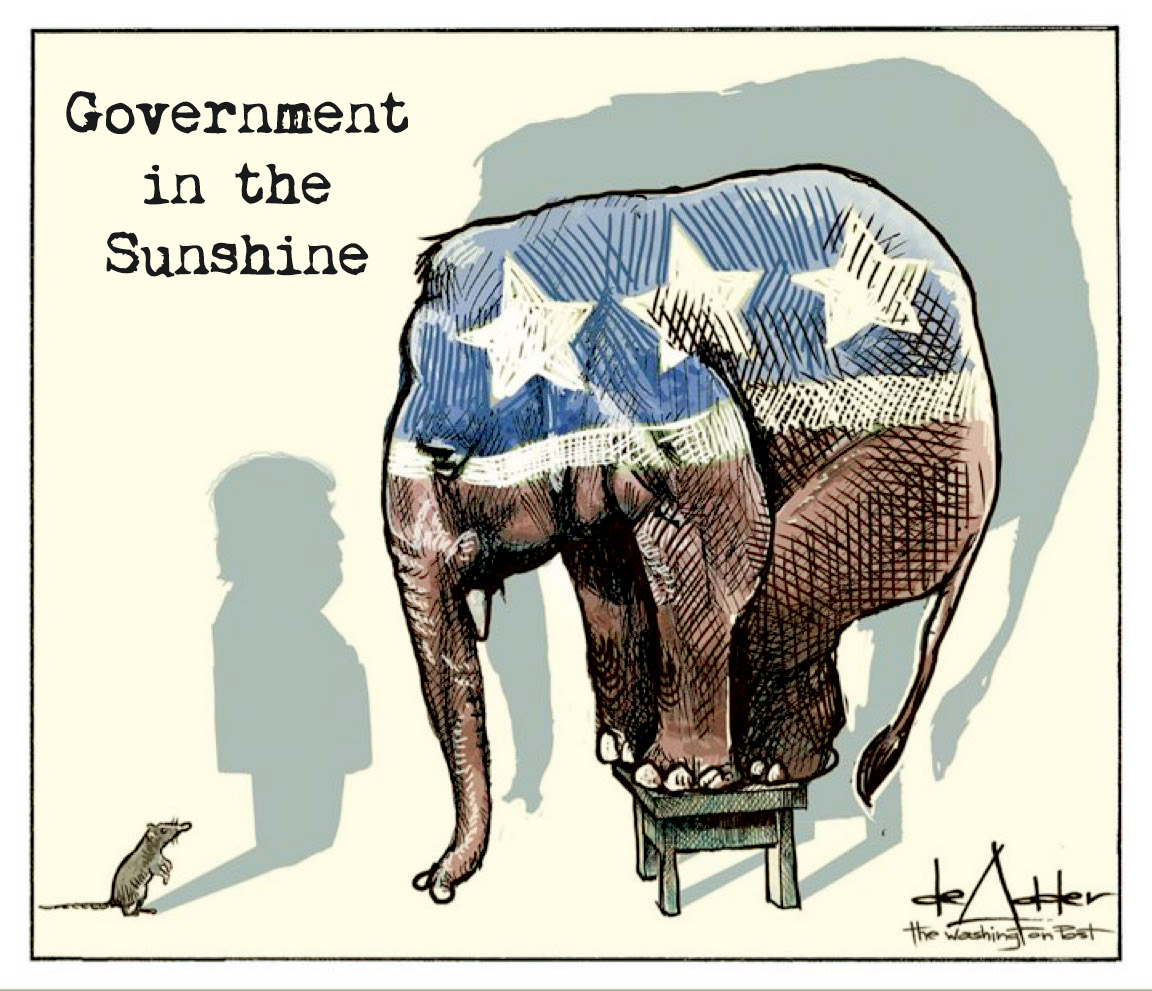
De Adder 2023 - Fear of Trump
Note: Twitter user appers to have altered original comic

De Adder 2023 - Fear of Trump
Our results show that transparency decreases embezzlement while it has no significant effect on bribery.DanielParra, ManuelMuñoz-Herrer, Luis A.Palacio 2021
The Limits of Transparency in Reducing Corruption
Within months of his inauguration, [Putin] successfully reasserted the Kremlin’s power against every competing authority and demonstrated that the old Soviet institutions have life in them yet. When formal measures were not enough he used his powers of “persuasion.” Legislators and judges who refuse to vote with the Kremlin are denied their salaries and perks (the Russian parliament does not have control over its own salaries, let alone over other governmental funds). This explains why the upper house of parliament was willing to vote for the reduction of its own power and size, not an everyday occurrence in politics. Fareed Zakaria 2003
Future of Freedom
The widespread use of security forces to intimidate journalists – from Peru to Ukraine to the Philippines – systematically weakens a crucial check on governmental power. In Latin America even a supposedly reformist democrat, like Peru’s Alberto Toledo, has routinely used his presidential powers to intimidate political opponents.Fareed Zakaria 2003
Future of Freedom
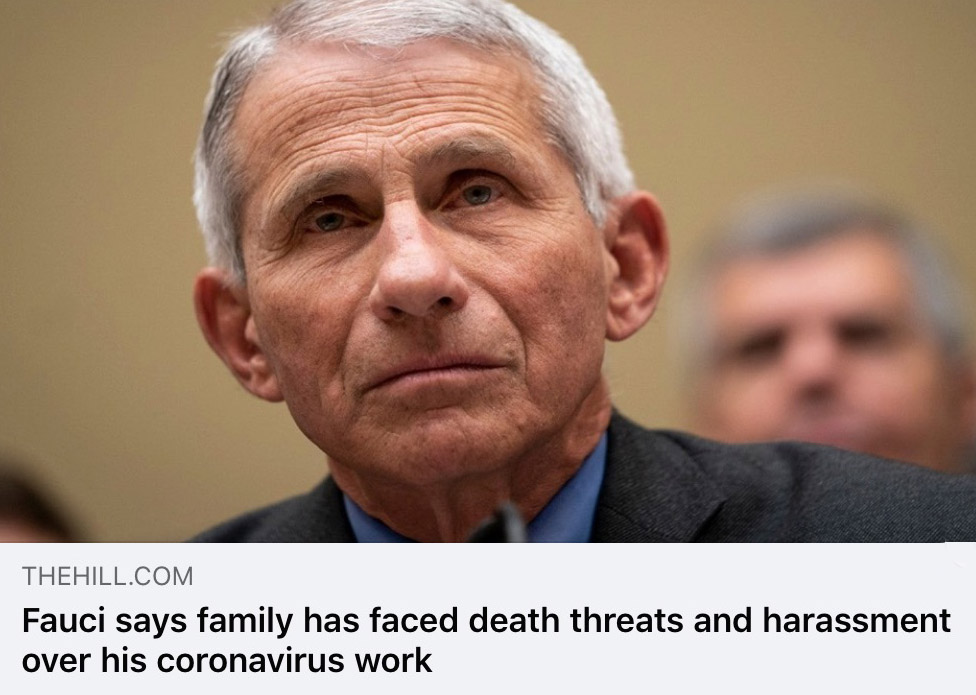
Jessie Hellman 2020 - Death Threats and Harrassment

Jessie Hellman 2020 - Death Threats and Harrassment
Politicians should have a healthy fear of being voted out of office. That is what democracy is all about – up to a point. But today politicians have an obsessive, all-consuming, permanent paranoia about always being one step away from defeat. Having lost the umbrella support and cover of parties, American politicians “walk the electoral world alone,” in British political scientist Anthony King’s words… If they do something unpopular, the party no longer protects them, Congress no longer protects them, the media no longer protect them. As King wrote, “they can be picked off one by one; they know it; they adjust their behavior accordingly.”Fareed Zakaria 2003
Future of Freedom
For the most part, these lobbyists and groups rely on the correctness of their arguments, the press, and veiled and not-so-veiled threats that legislators will be punished at the polls.Alan Rosenthal 2000
The Third House: Lobbyists and Lobbying in the States (gun control)
Grassroots campaigns thus send the message: “Don’t mess with us, or do so at your own electoral peril.” In signaling to lawmakers that group members care about an issue… an interest group exerts pressure that is different than the persuasion used in direct lobbying. The consequence is a more adversarial climate, in which the threat of electoral opposition, albeit tacit, is never far from the surface… As of 1999, members in thirty-nine of the ninety-nine state legislative bodies had computers at their desks in the chambers and could send and receive e-mail while in session. The potential for members to be hit by organized campaigns after standing committees have made their recommendations, but before a vote is taken on the floor, can have significant impact on the deliberative process.Alan Rosenthal 2000
The Third House: Lobbyists and Lobbying in the States (gun control)
Legislators can be intimidated by a group’s threat to support a challenger. The lawmaker’s attitude toward the group may undergo a subtle, or not-so-subtle, change. If a group almost succeeds in unseating an incumbent, that legislator is likely to make a greater effort to see eye-toeye with it. Accommodation may not be entirely possible, but the effort will be made. And if a legislator is defeated, the message to the capitol community is heard loud and clear. One participant in the electoral struggle acknowledges that, “if your opponents defeat a legislator on your side, it has tremendous impact. … We [then] have to defeat one of theirs to get on track.” Groups willing to target close races, oppose incumbents, take dramatic action, and commit people as well as other resources to the fray can be formidable. As the director of one such group declared: “When we win, we win big. When we lose, we lose big.” In some state campaigns environmental groups are effective. For example, New Jersey’s environmentalists get into races where they can make more of a difference. Their contributions to candidates are in kind—a canvass, media work, radio ads, literature drops—and they operate according to their own campaign plan. Their “resource endorsements” have had considerable effect. One year, for instance, they campaigned for a Democratic challenger who won in a marginal district. Although he had not been an environmentalist when he declared his candidacy, he ended his campaign as one. Then, serving in the legislature, he became a leading spokesman for environmental interests. Alan Rosenthal 2000
The Third House: Lobbyists and Lobbying in the States (gun control)

Bloomberg 2022 - Trump Campaigns To Eliminate not to Support Senators

Bloomberg 2022 - Trump Campaigns To Eliminate not to Support Senators
Campaign professionals profess they would love to make positive ads, chock-full of nutritious information. But they say candidates who run those ads usually wind up giving graceful concession speeches that make people say, “How nice.” Winners get to cast votes in Congress and appear on The Daily Show. Graceful losers watch from the sofa.Scott Simon 2010
How To Destroy Your Political Opponent
George Stephanopoulos took notice of what had been done to Dukakis, what his man allowed be done to him that nasty summer and fall of 1988. “When I arrived, we had a seventeen point lead. Then came the summer assault. The Bush campaign, led by Lee Atwater, opened up a disciplined, ruthless and sustained series of attacks on Governor Dukakis’s record and character. Flags, furloughs, the Pledge of Allegiance. By August’s Republican convention, our lead was gone, our candidate was a caricature and our campaign was effectively over.” On November 8, 1988, Bush defeated Dukakis 54 percent to 46 percent—an 8 point edge. A quarter of the American electorate had changed its mind about who it wanted as its next president.Chris Matthews 1999
Hardball
OpenSecrets Blog reported last December, with all that money sloshing around in the network of Koch-backed groups, one of the network’s key players, Sean Noble, a relatively unknown Republican operative [who funnels dark money to attack ad groups] from Phoenix, took the opportunity to pay three LLCs he controlled, all to the tune of tens of millions of dollars. Divorce records recently uncovered by ProPublica suggest that Noble’s personal cut was at least $3 million, not too shabby for the head of an organization that appears to have done little more than channel huge sums of other people’s money into a tangle of conservative nonprofits. Noble’s operation funded groups that routinely mislead voters in attack ads that ran around the country, and at least for now, he seems to have been rewarded fantastically. For America’s top consultants, this appears to be less an aberration than it is par for the course. As Democratic consultant Hank Sheinkopf told The Daily Beast in 2012, the post-Citizens United gold rush is “the greatest windfall that ever happened for political operatives in American history.” The media’s relative indifference to this self-enrichment may stem, in part, from the fact that consultants “are great sources and valued customers of the big media companies,” Aitken writes.Robert Maguire 2014
The Dark Economics of CampaigningNote: Given that 95% of dark money is used to purchase attack ads, brubery is likely the principal driver of corruption in government. But the beneficiaries are not politicians, they are the billionaire-owned media giants and political consultants. “Noble’s operation funded groups that routinely mislead voters in attack ads that ran around the country, and he seems to have been rewarded fantastically. For America’s top consultants, this appears to be less an aberration than it is par for the course. As Democratic consultant Hank Sheinkopf told The Daily Beast in 2012, the post-Citizens United gold rush is “the greatest windfall that ever happened for political operatives in American history.””
In an area where most children were white and attended public school, the busing issue began to cut. The people of northern Virginia were not all enthusiastic about having their kids bused off to the mean streets of downtown D.C. Polls showed that the incumbent was getting killed, particularly in the normally Democratic working-class areas. Just a few days from election, it seemed to be all over for him. Then, the Friday before the election, his consultant Arnold Bennett created a campaign flyer that was a true work of art. It was a simple offset sheet that contained a picture of the Washington Monument with a school bus aimed directly at it. The text hit the Republican opponent right between the eyes: “John Watkins believes it is constitutional to bus your children into Washington.” The literature was staggeringly effective and, in an odd way, accurate. Watkins had indeed argued the need for a constitutional amendment to prevent interdistrict busing. He had said that without such an amendment the courts could not prevent such busing. He had in fact implied that it might be judged constitutional to “bus your children into Washington.” With this audacious reversal, the incumbent was able to seize a highly explosive charge and redirect the blast to the man who had lit the fuse. By distributing the material only to working-class neighborhoods, where the busing issue was cutting politically, he avoided upsetting his more liberal constituents who drove Volvos and sent their children to private school. By striking just three days before election, he made counterattack impossible.Chris Matthews 1999
Hardball
Like the American NRA, the British gun lobby felt cornered and victimized by anti-gun sentiment. The Sportsman’s Association threatened to “target every MP who votes against the legitimate ownership of handguns,” adding, “We will look at the constituency, find the strongest opposition candidate and back that person to beat the sitting MP, who will be out. Our supporters want to punish these people for being small minded.” The NRA is well known in the US for using similar tactics. A leaked NRA memo once revealed, “our methods have an extremely efficient ‘political cost exchange ratio’ making it exceedingly expensive, difficult and unpleasant for the target to remain in office. Victory springs from imparting excruciating political pain in unrelenting political attacks on a single politician as an example to others.”Gwendolyn M. Martin 2003
Designed to Kill: Gun Control and the Columbine Massacres
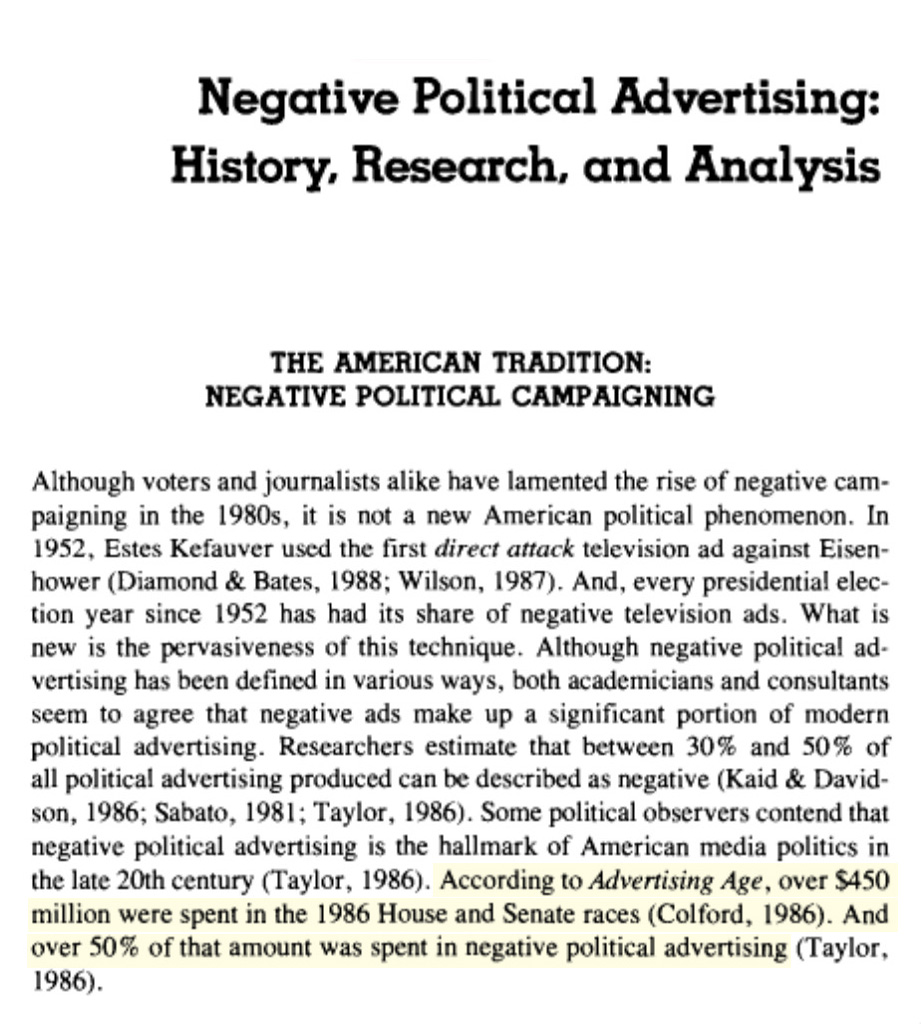
Karen S. Johnson-Cartee & Gary Copeland 2013 - Negative Advertising

Karen S. Johnson-Cartee & Gary Copeland 2013 - Negative Advertising
The NRA threw its support behind a newcomer in the Republican primary. By summer’s end, the woman who had been one of Tennessee’s most powerful Republicans and ardent supporters of gun rights was done in by hardball tactics. Maggart said, “They did this to send a message: ‘If you don’t do what we want, we will annihilate you.’” The message has not been lost on lawmakers across the nation, including those in the U.S. Senate, where a proposal to expand background checks for gun purchases died April 17 in the face of the NRA’s staunch opposition.Scott Hingham & Sari Horowitz 2013
NRA tactics: take no prisoners
The Chamber of Commerce had sponsored an astounding 27,500 TV ad spots around the country... and in many states most or all of the commercials slammed incumbents for their health care votes. The Chamber’s attacks served to punish Democrats who’d stood on the wrong side of the health care fight — and, by removing them, ensure the takeover of the House by a Republican majority... Between the Chamber and its partners in spending, the sheer volume of negative ads had its intended effect.Alyssa Katz 2015
Influence Machine: Chamber of Commerce and Corporate Capture
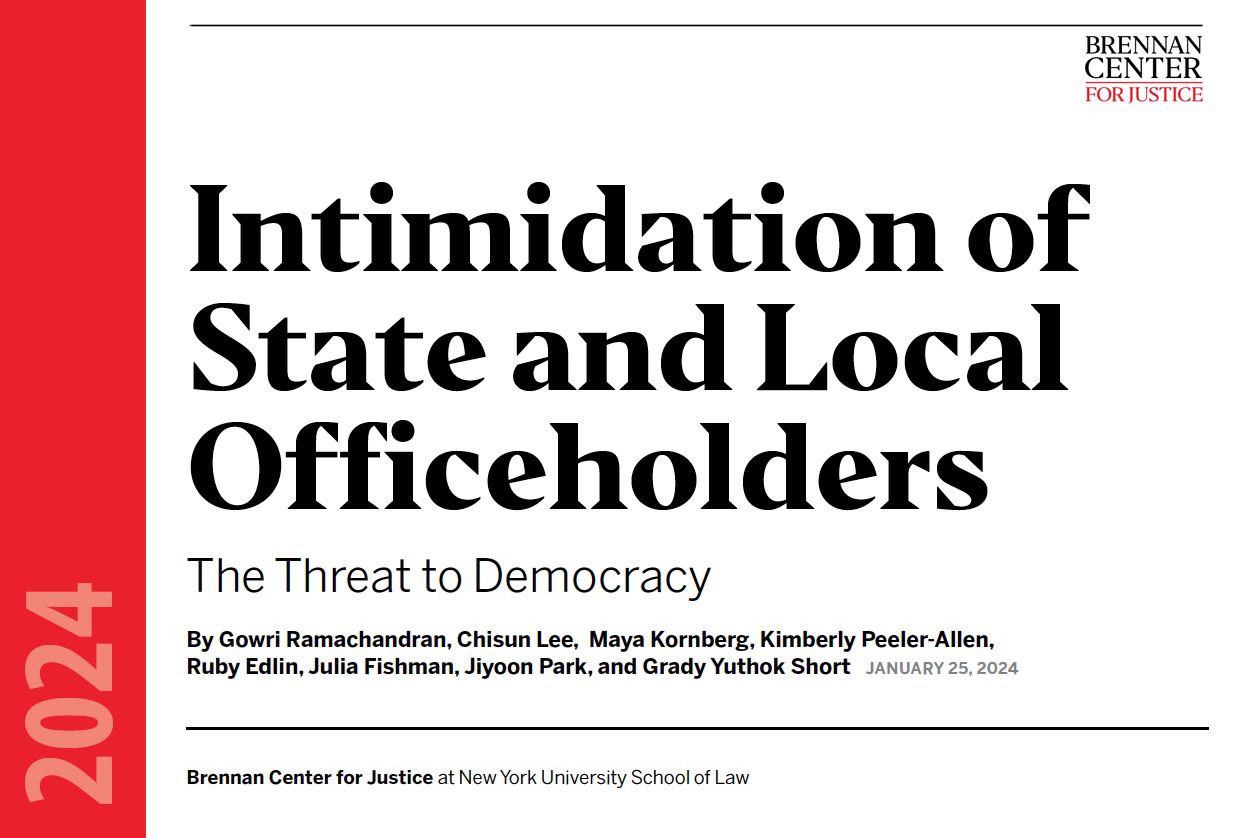
Gowri Ramachandran, Chisun Lee, Maya Kornberg, Kimberly Peeler-Allen, Ruby Edlin, Julia Fishman, Jiyoon Park, and Grady Yuthok Short 2024 - Intimidation of State and Local Officeholders - The Threat to Democracy (Brennan Center for Justice pdf)

Gowri Ramachandran, Chisun Lee, Maya Kornberg, Kimberly Peeler-Allen, Ruby Edlin, Julia Fishman, Jiyoon Park, and Grady Yuthok Short 2024 - Intimidation of State and Local Officeholders - The Threat to Democracy (Brennan Center for Justice pdf)
Health care scare ads were not the only bludgeon deployed to push members into compliance. Virtually all the ads on the Chamber’s end were vicious, often truth-bending attacks. The sheer scale of the assaults, targeting fifty-nine races and mostly crushing Democrats, had their effect. In 2010 the Chamber’s candidate won 57 percent of the time.Alyssa Katz 2015
Influence Machine: Chamber of Commerce and Corporate Capture
The delegates, especially those who’d signed pledges to ratify, were also reminded of just how much they, and their families, might lose if they continued to support ratification. Those who hadn’t succumbed to bribes began to be pelted with threats: job loss, political ruin, career destruction; their house mortgage just might be foreclosed, their loan called due, their business met with unexpected disaster. Carrie Catt was appalled by reports of blatant extortion, horrified by the idea that shadowy men working for the Antis’ corporate friends were “applying the third degree” to lawmakers in hotel rooms around the city. If house members weren’t persuaded by these techniques, perhaps they could be dissuaded—or prevented—from voting at all. Some began receiving phony telegrams claiming their wife was ill, their child injured, their house on fire, to compel them to hastily leave Nashville. Other lawmakers, known to have a weakness for liquor, were entertained for hours in the Jack Daniel’s Suite, plied with whiskey until they were in a stupor, and the resulting hangover was expected to be powerful enough to keep them from the next roll call. When the Suffs learned that one such legislator, listed as favorable to ratification, was careening down the Hermitage hallways, they made sure he was escorted by friends to his room, put under a cold shower and sobered up under a fan, then put to bed. He made roll call. Elaie Weise 2018
The Woman’s Hour
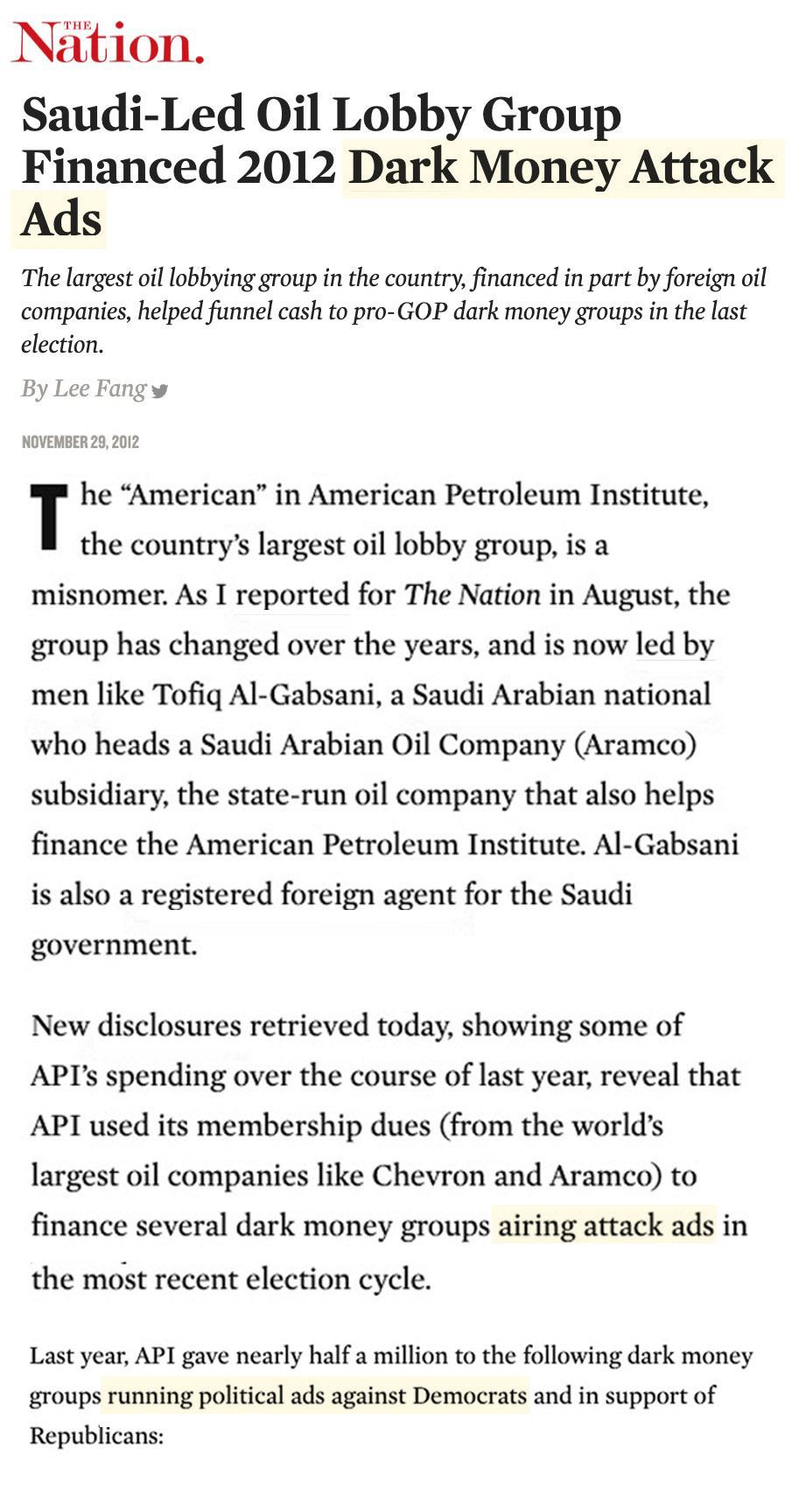
Lee Fang 2012 - Saudi’s Finance Attack Ads

Lee Fang 2012 - Saudi’s Finance Attack Ads
By threatening lawmakers, the police eviscerate the chains of their own accountability. State legislatures and the US Congress don’t just write laws on trade and taxation, they are the only group who can defund and punish police. And unlike ‘citizen groups,’ Congress has the power to launch an inquisition that could make the Watergate hearings appear like a hippy love-fest in comparison. Yet, few lawmakers run an inquisition from a state of fear. And though they are predominantly wealthy, white and male, elected officials are terrified of the police.James D’Angelo 2020
How Lobbying Killed George Floyd
One sign of AIPAC’s increased leverage has been its ability to punish adversaries. In 1982, its prime candidate for reprisal was Representative Paul Findlay, a ten-term Republican from Illinois. AIPAC attacked Findlay as a friend of Palestine Liberation Organization leader Yasir Arafat. According to Dine, Jews donated ninety percent of the campaign funds raised by Richard Durbin, the Democrat who beat Findlay. In 1984, more than forty percent of the $3.2 million contributed by Jewish PACs to Senate races went to Democratic opponents of five Republicans who voted for the AWACS sale. One of its top targets was Senator Roger Jepsen of Iowa—“J for Judas,” one AIPAC official sneered… AIPAC officials make no secret that AIPAC’s prime target in 1984 was Charles Percy of Illinois, chairman of the Senate Foreign Relations Committee, whom AIPAC had tabbed as the most influential pro-Arab member of Congress. Jewish PAC’s gave $274,144 to Paul Simon, Percy’s ultimately victorious Democratic opponent. In addition, Michael Goland, a Jewish businessman from California, spent more than $1 million in negative advertising against Percy. Even so, Tom Dine claimed after the election that Jewish efforts and money had beaten Percy and helped tip other races. “Like an Indian elephant, we don’t forget,” Dine boasted to a Jewish audience in Toronto. Both Percy and Jepsen lost close races that were affected by many factors; but unquestionably strong Jewish opposition hurt them. In 1986, another AIPAC executive told me that the “Percy factor” and the “Jepsen factor” – that is, memories of AIPAC’s opposition to them in 1984 – had swayed senators against the Jordan and Saudi arms sales, especially among Republicans facing reelection in 1986… Whatever the case, plenty of senators and House members regard AIPAC’s political clout as awesome. Overall, AIPAC has gathered strength and gained muscle by adapting to the New Washington politics: the spread of power in Congress, the potency of grass-roots lobbying, the need to be bipartisan, and the importance of throwing financial support to friends and against enemies, and then advertising the results. That is the way the new lobbying game is played. Hedrick Smith 1988
The Power Game - How Washington Works
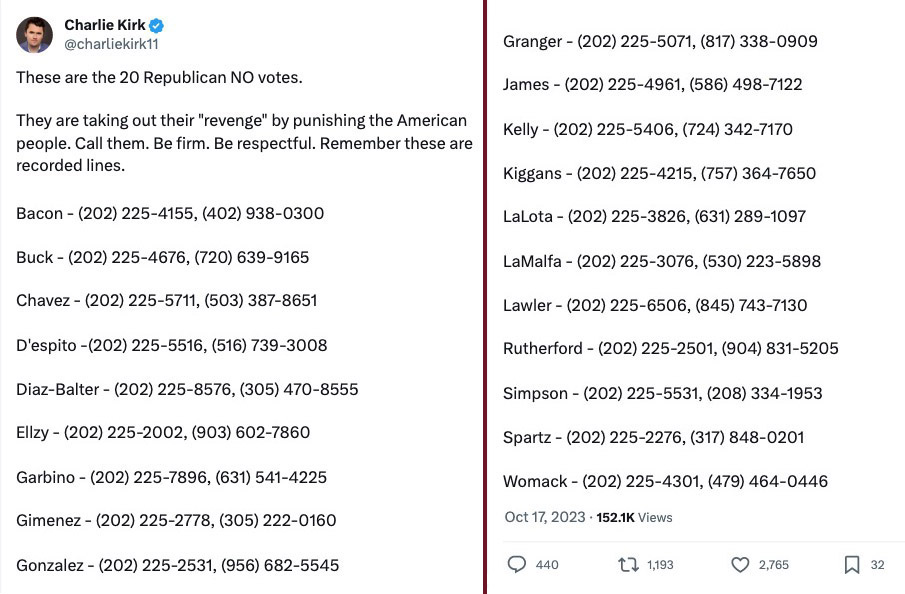
Charlie Kirk 2023 - Attacking the ‘No’ votes

Charlie Kirk 2023 - Attacking the ‘No’ votes
Of the potential negative effects by negative political advertising, only its effects on representation seem most certain. There seems to be a good deal of critical evidence that negative political advertising is affecting the way in which our representatives behave and, ultimately, the quality of life in this country. Karen S. Johnson-Cartee & Gary Copeland 2013
Negative Political Advertising
For third party producers of negative ads, social media provides a unique opportunity to expand these videos’ reach. Super PACs benefit not only from the ability to target specific voter demographics on social media platforms but also from the platforms’ natural promotion of their content. Nathan Rifkin, Digital Director for the Randy Bryce Congressional campaign, explained to the HPR how social media channels’ algorithms “reward a negative-based attack.”Ilana Cohen 2019
Attack Dogs
As negative ads tend to generate substantial commentary, they are often amplified by social media platforms seeking to connect users with popular, attention-grabbing content. Beyond amplifying their reach, social media allows third parties to retain a degree of anonymity that can increase the efficacy of their advertising. Whereas televised political ads disclose sponsors, identifying ads’ sponsors proves more difficult on social media. Jian Zang, a Harvard graduate student and creator of the Political Ads Library, explained to the HPR how super PACs often fund ads across multiple social media pages so that voters may not even realize when they are being targeted by PAC-sponsored ads. Priorities USA Action, for instance, sponsors ads on the “Nuestra Florida” Facebook page. By creating a kind of “echo chamber,” these pages can amplify singular campaign narratives that feed directly into voters’ preconceptions of the opposite party.Ilana Cohen 2019
Attack Dogs
When the Saudi arms sale came to a Senate vote… Senator Rudy Boschwitz, one of [the Israel lobby’s] leading allies, called two Republicans, Phil Gramm of Texas and Daniel Evans of Washington, off the Senate floor during the vote to meet [pro-Israel lobbyist] Michael Goland... As Evans recalled their encounter, Goland asked, “What would you think about someone using an ad that would start –” the lobbyist described the ad very vividly: the senator raising his hand, voting aye on this arms sale, and then a picture of an Arab in a kaffiyeh headdress, assembling a Stinger, an airplane taking off, an explosion, crosses in a graveyard, and reading off a list of names. “So he had it well thought out,” Evans said, “or at least he had a picture of what might be done. And when he asked me, ‘Well, what do you think?’ Hedrick Smith 1988
The Power Game - How Washington WorksNote: In this case the senators voted against Israel. So the lobbyist failed despite his threat. But there are a couple notable things about this. The lobbyist, Goland, wasn’t part of the biggest pro-Israel lobby, he appears to have been acting alone and therefore wasnt’t able to threaten as effectively. The biggest pro-Israel lobby was run by a man named Tom Dine at the time who admitted that this incident “fits the stereotype of how the pro-Isreal lobby really works.”
Just the threat of negative ads can now garner influence for lobbyists, without ever spending a dollar.Morgan Holland 2013
Separatist Tribalism
When you try to trim programs, interest groups complain bitterly and fight hard, as the four kamikaze senators discovered. But woe unto him, above all, who makes bold to grab a subsidy or a special deal by the roots and pull it out entirely. Try doing that, and the affected group flies at you with the fury of the desperate or the damned. It recruits powerful politicians to block you; it floods your office with mail; it finances your political opponents; it does whatever else it needs to do. Unless you want to be shot, stabbed, and set on fire, the cardinal rule in Washington is: Never challenge someone’s sinecure. Jonathan Rauch 1999
Government’s End (Demosclerosis)
In the new era of super PACs and non-disclosing “social welfare” groups spending millions of dollars on elections, it is no longer just access that matters. Money’s potentiality is sometimes enough to cause a skew. Just the threat of large money being spent against an elected official sometimes seems enough to get that official to shift priorities, a point that former senators (but less often current ones) publicly acknowledge.Richard L. Hasen, Bill Moyers 2016
New Thinking on Rescuing Our Politics from Plutocrats
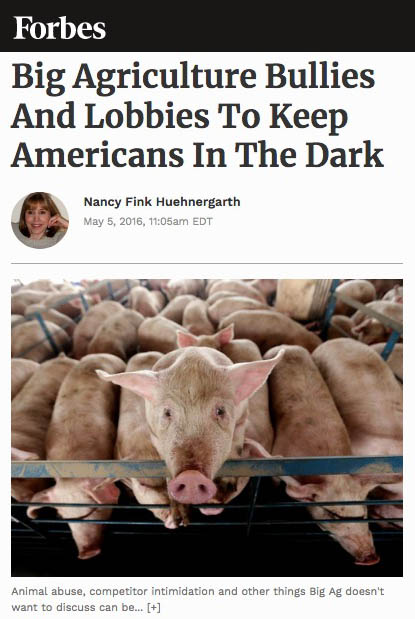
Nancy Fink Huehnergarth 2016

Nancy Fink Huehnergarth 2016
You get two kinds of money in politics. Sometimes people feel that if they can buy you early they’ll be in good shape after you get here. The other is that if they agree with you they’ll try to keep you here, and if they don't they’ll try to bounce you out.Representative David Obey 1983
Politics and Money (Elizabeth Drew)
As the political season heats up, Americans are already being inundated with the usual phone calls, mailings, and TV ads from campaigns all across the country. But this summer, they’re also seeing a flood of attack ads run by shadowy groups with harmless-sounding names. We don’t know who’s behind these ads and we don’t know who’s paying for them.President Barack Obama 2010
White House Briefing
Blame avoidance is not just a slogan; on Capitol Hill it has become a way of life. Members fear negative television commercials in their next campaign, and look for ways to deny their opponents fodder for such commercials. A classic 1986 article by political scientist R. Kent Weaver, “The Politics of Blame Avoidance,” argued convincingly that “politicians are motivated primarily by the desire to avoid blame for unpopular actions rather than by seeking to claim credit for popular ones.” Weaver concluded that much of the responsibility for this behavior lies with the voters, whose “negativity bias” makes it more useful to politicians to be against what they see the voters are against than to try to divine and pursue more positive objectives. More voters usually agree on what’s bad than on what might be desirable. Robert Kaiser 2014
Act of Congress
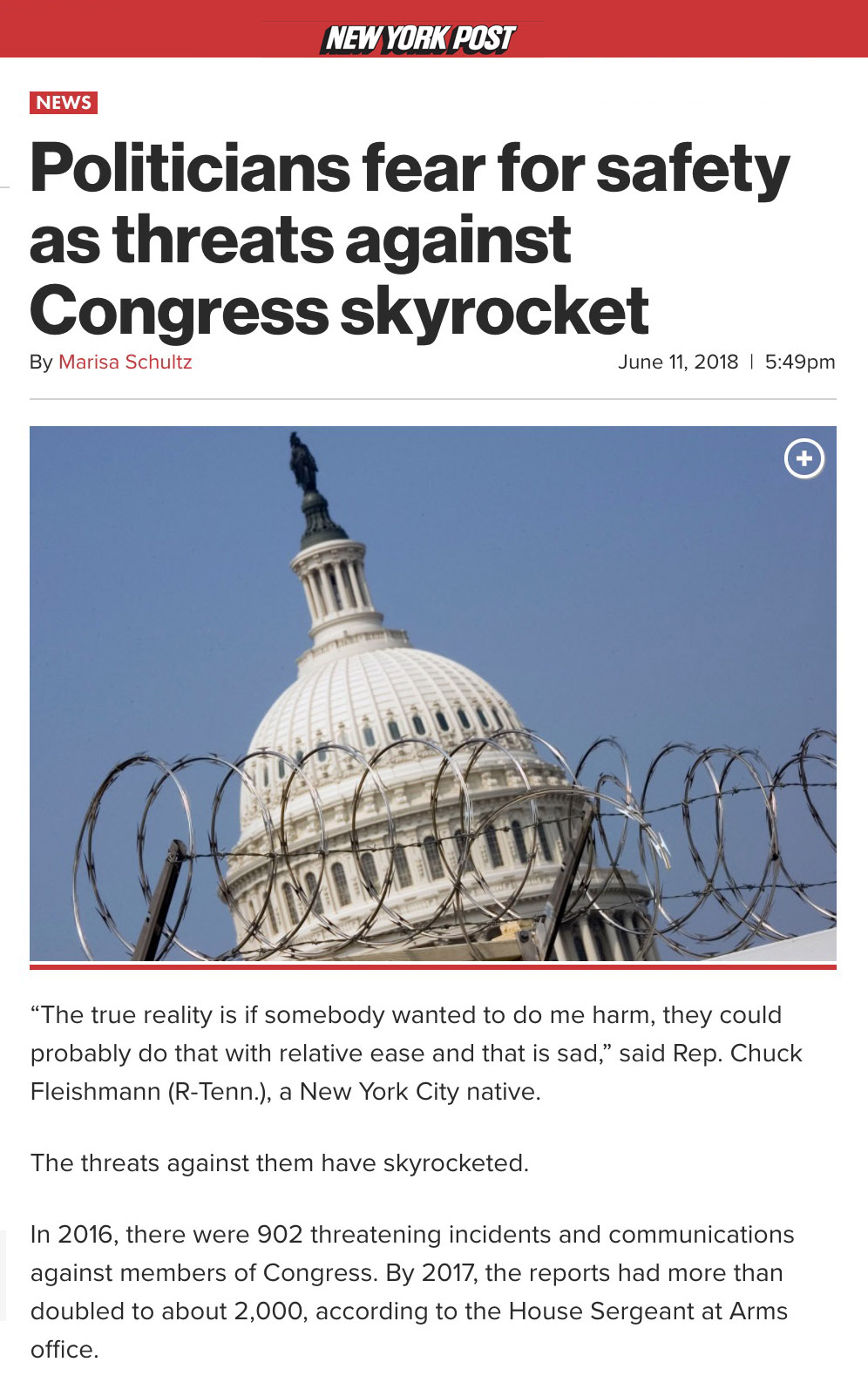
Marisa Schultz 2018 - Politicians fear for safety as threats against Congress skyrocket

Marisa Schultz 2018 - Politicians fear for safety as threats against Congress skyrocket
In electoral politics the most persuasive incentive is fear – fear of defeat. Survival in office is the paramount concern.Robert Kaiser 2011
So Damn Much Money: The Triumph of Lobbying
Barney Frank of Massachusetts, an outspoken liberal Democrat first elected to the House in 1980, recalled hearing Speaker O’Neill once say, “I am powerless to tell a member how to vote.” But DeLay told his members how to vote, and intimidated them into following his instructions. Benefits of all kinds were available only to loyalists. The small remaining band of moderate Republicans, mostly from the Northeast and Midwest, were particularly vulnerable to threats from DeLay and other conservatives who could support challenges to them from more conservative Republicans. Such challenges were mounted with the support of conservative groups such as the Club for Growth, and though few succeeded, they generally intimidated moderates. One, Marge Roukema of New Jersey, beat back two right-wing challenges sponsored by the Club for Growth, then retired in 2002 rather than face a third. Similarly, Jim Kolbe of Arizona, a moderate and gay Republican, retired in 2005 after a conservative challenger won 40 percent of the vote against him in 2004. Frank reported that moderate Republicans had said to him “more than once” that they would support him on a particular issue “after the filing deadline has passed”-the deadline by which a conservative challenger had to announce plans to run against that incumbent moderate.Robert Kaiser 2011
So Damn Much Money: The Triumph of Lobbying
Did the President attempt to coerce Members (explicitly or implicitly) by promising to withhold certain cancellations in exchange for support on other matters? Were “recalcitrant” Members punished with cancellations? Did the President pick out Republican Members to bear the brunt of his cancellations? ... The threat of cancellations will hover over House and Senate action on each affected budgetary measure, they argue, and the significance of that threat is likely to mount with each stage of legislative action, particularly as a Congressional session draws to a close.Edward (Sandy) Davis and David Rafferty (Congressional Budget Office CBO) 1998
The Line Item Veto Act After One Year
Of course, America’s partisan air war has contributed to the polarization of politics by giving parties and PACs both sticks and carrots with which to coerce politicians. Such organizations can engage in supportive independent expenditures (i.e., attack ads targeting a friendly politician’s opponent) to reward loyal politicians who adopt the party's hardcore positions. Conversely too, politicians may avoid moderate or conciliatory stances for fear of drawing the negative advertising dollars of PACs – a trend that has become common with the targeting of moderate Republicans in their primaries by right-wing groups, but began quite recently with the Americans for Tax Reform and Club for Growth’s targeting of moderate Republicans in the early 2000s and by Democratic activists’ successful defeat of Joseph Lieberman in the 2006 Connecticut Democratic primary. More generally, too, political advocacy associations can flood the airwaves with fringy message ads, thus exposing voters and politicians alike to their ideas. Josh Pacewicz 2016
Partisans and Partners: The Politics of the Post-Keynesian Society
An investigating committee, headed by Finis J. Garrett of Tennessee, thereupon proceeded to take sixty volumes of testimony regarding the NAM’s activities, which were summed up thus by Representative William McDonald, a committee member: “They did, by the expenditure of exorbitant sums of money, aid and attempt to aid in the election of those whom they believed would readily serve their interests, and by the same means sought… the defeat of others whom they opposed. In carrying out these multifarious activities, they did not hesitate as to means, but made use of any method of corruption found to be effectual… they instituted a new and complete system of commercialized treachery… The American Congress was considered by them as their legislative department… and that those legislators who dared to oppose them would be disciplined in the same manner in which they were accustomed to discipline recalcitrant employees.” Stetson Kennedy 1946
Southern Exposure
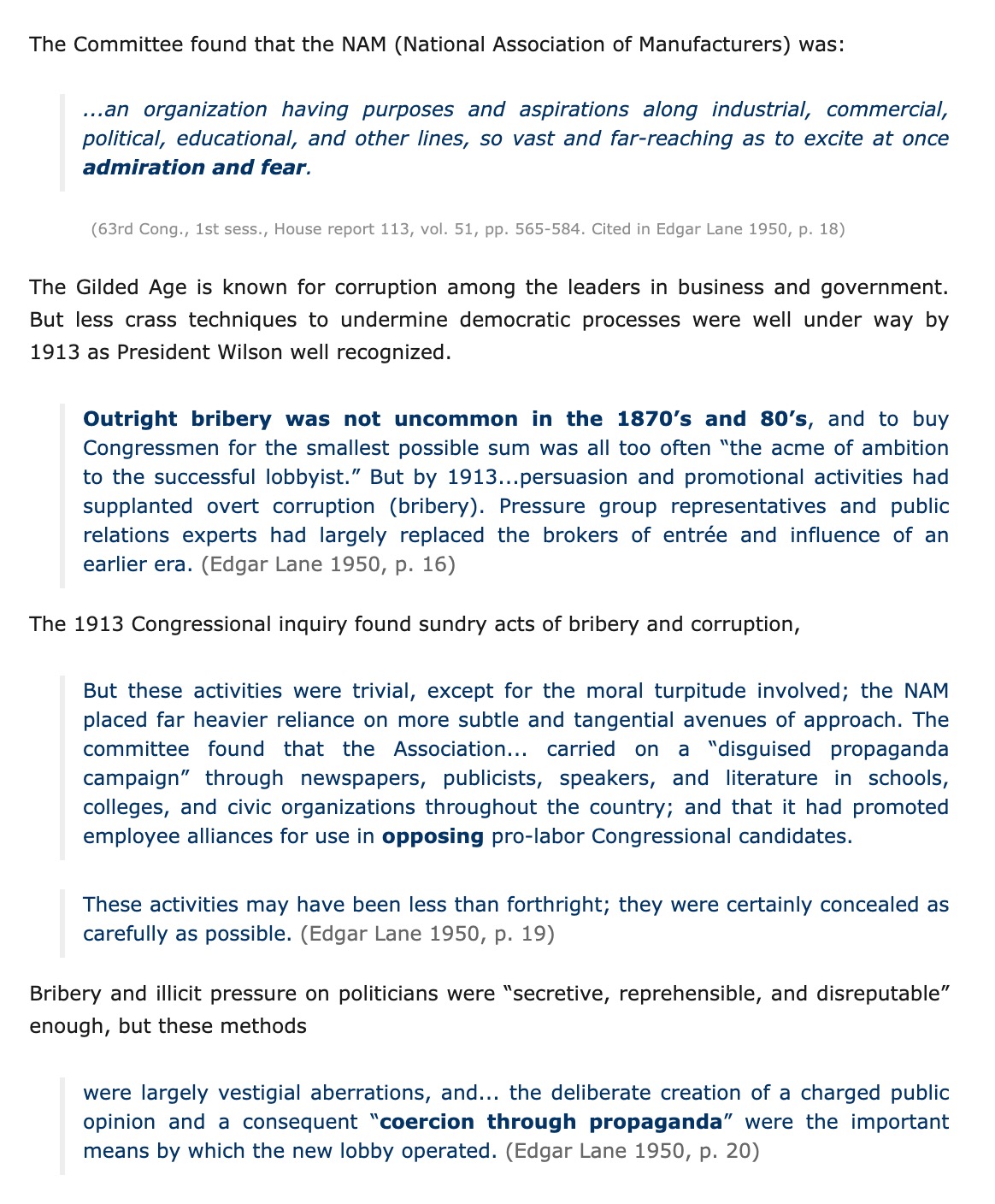
Neil Godfrey - Coercion Through Propaganda 2014

Neil Godfrey - Coercion Through Propaganda 2014
Highly circulated pamphlets with titles such as ‘The Disadvantages of Labor Unionism,’ and ‘The Goal of the Labor Trust’ and ‘Cruel Unionism’ reflected the deeply emotive character of NAM propaganda, and left no doubt as to the lengths to which the NAM and the interests it represented were willing to go to demonise and destroy anyone or anything who presented a challenge to the power and privileges it represented.Ben Debney 2010
The Rise of Corporate Americanism, 1912-1919
I didn’t at that time have any reason to think that I would ever become a vocal critic of the health care industry, because I know from just what I was doing to try to discredit you (filmmaker Michael Moore) and what the industry would try to do the discredit its critics. So I was I was afraid. And I kept talking myself out of it because of the fear of what it would be like to have the industry come after me and the fear of retaliation and not being able to define another job.Ex-lobbyist Wendell Potter 2020
Your Beloved Private Health Insurance
It is not difficult to understand why the concept of secret deliberations, out of earshot of the King, would have special appeal in the colonial assemblies, the Continental Congress, the Congress of the Confederation and the Federal Convention to frame the Constitution. And, indeed, it was frequently utilized in all of these legislative assemblies in early American history.Donald Wolfensberger 1992
Committees of the WholeNote: The first known secret committees were conducted in England in the 1600s. And the committee of the whole (which voted and deliberated in secret) was developed expressly to prevent intimidation from the King
De Alva Stanwood Alexander, a former Member of the U.S. House of Representatives, in his History and Procedure of the House of Representatives, observes of this birth of the Committee of the Whole concept in England that: It originated in the time of the Stuarts, when taxation arrayed the Crown against the Commons, and suspicion made the Speaker a tale-bearer to the King. To avoid the Chair’s espionage the Commons met in secret, elected a chairman in whom it had confidence, and without fear of the King freely exchanged its views respecting supplies.Donald Wolfensberger 1992
Committees of the WholeNote: The first known secret committees were conducted in England in the 1600s. And the committee of the whole (which voted and deliberated in secret) was developed expressly to prevent intimidation from the King
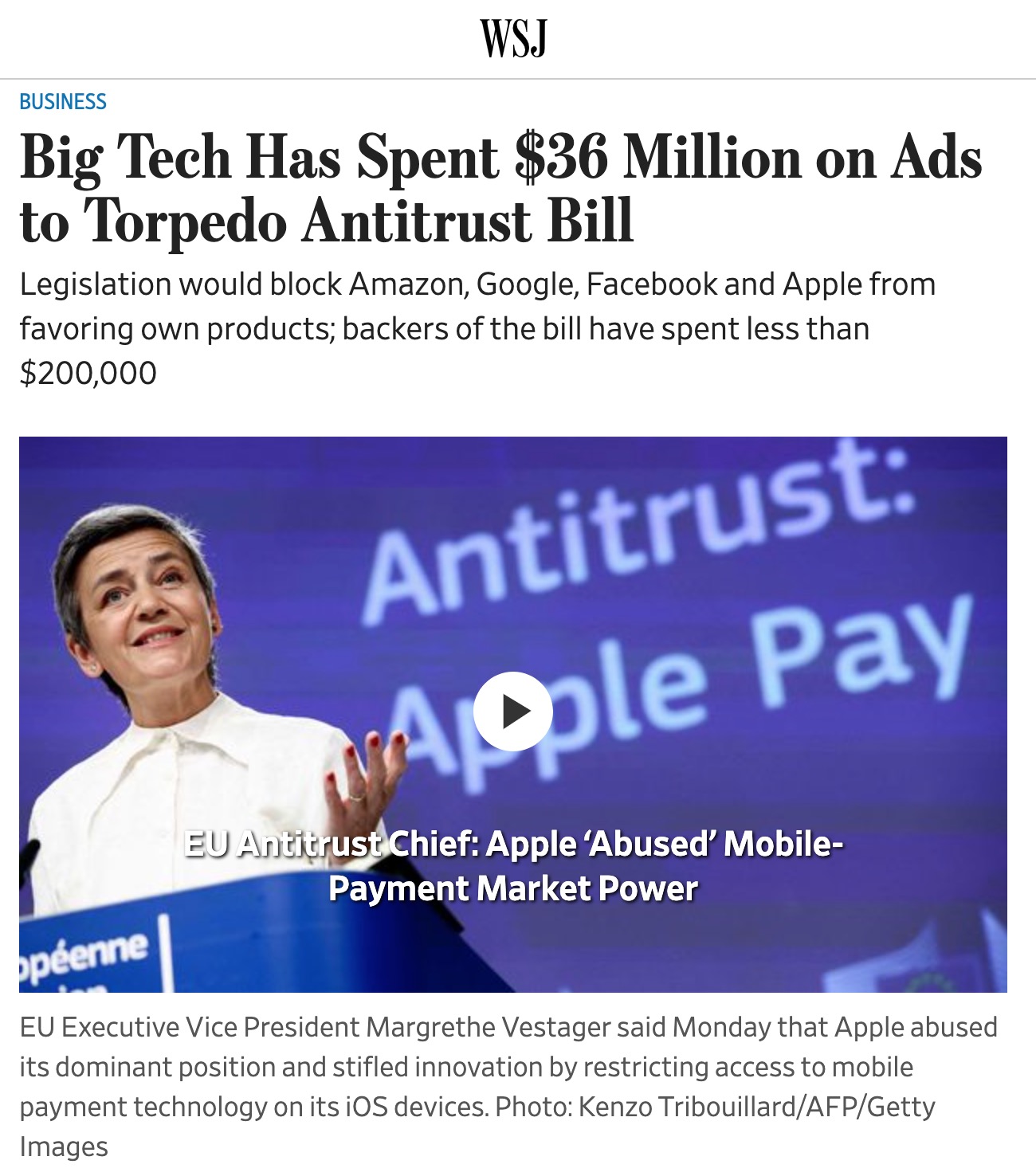
Big Tech Spent $36 Million on Ads to Torpedo Antitrust Bill

Big Tech Spent $36 Million on Ads to Torpedo Antitrust Bill
I had $40 million spent against me because I don’t do what Wall Street wants. I don’t do what tobacco wants. I don’t do what the oil industry wants. Of course, they are going to come after me.Senator Sherrod Brown 2012
Congressional Record
It’s not rocket science… legislators willingly accept the talking points from the industry and they have been led to fear that the industry will campaign against them or fuel campaign or attack ads and support their opponents if they dare to do anything other than then carry water for the industry. That is I think really what’s going on here.Ex-lobbyist Wendell Potter 2020
Your Beloved Private Health Insurance
“If you’re a lobbyist, you’re talking with a legislator and mention you’re forming a super PAC, their ears are really going to perk up just because you said the words ‘super PAC,’” said Shana Glickfield. “It’s such a big, scary thing — and can give you an extra edge of influence.”... If the candidates ignore the super PAC, Snyder said he’s prepared to launch a yet-to-be-produced advertising barrage against either candidate, regardless of who ultimately wins. These ads, he said, would be “hard-hitting” in tone and tenor.“There will be political consequences for ignoring our community and this issue,” Snyder said. Dave Levinthal 2012
Super PACs' new use: Hill lobbying
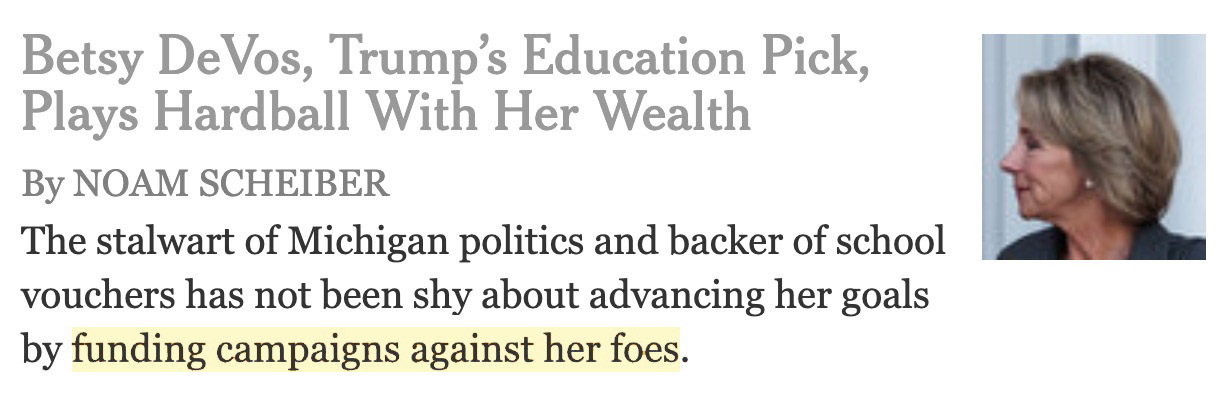
DeVos funds opponents campaigns 2017

DeVos funds opponents campaigns 2017
Members of the opposition party are routinely rewarded with presidential requests for earmarked appropriations and, occasionally, by promises not to campaign against the helpful opposition member in a subsequent campaign.David King & Richard Zeckhauser 2003
Congressional Vote Options
The most powerful, well-healed part of the American pro-Israeli Lobby is AIPAC, The American Israeli Public Affairs Committee... [They] spent millions to defeat progressives ... threatening to spend against them if they even slightly criticize Israel’s far right ... policies.Asa Winstanley 2023
Law and Disorder
Whenever either conscientious citizens or concerned lawmakers make a fuss – suggesting that maybe, just maybe, companies run by billionaires that make huge profits year after year don't need to be publicly subsidized – the policy blackmail begins: Threats of job losses, dooming a place to an eternity of economic malaise, are the currency of choice for the titans of industry.Pat Garofalo 2019
The Billionaire Boondoggle
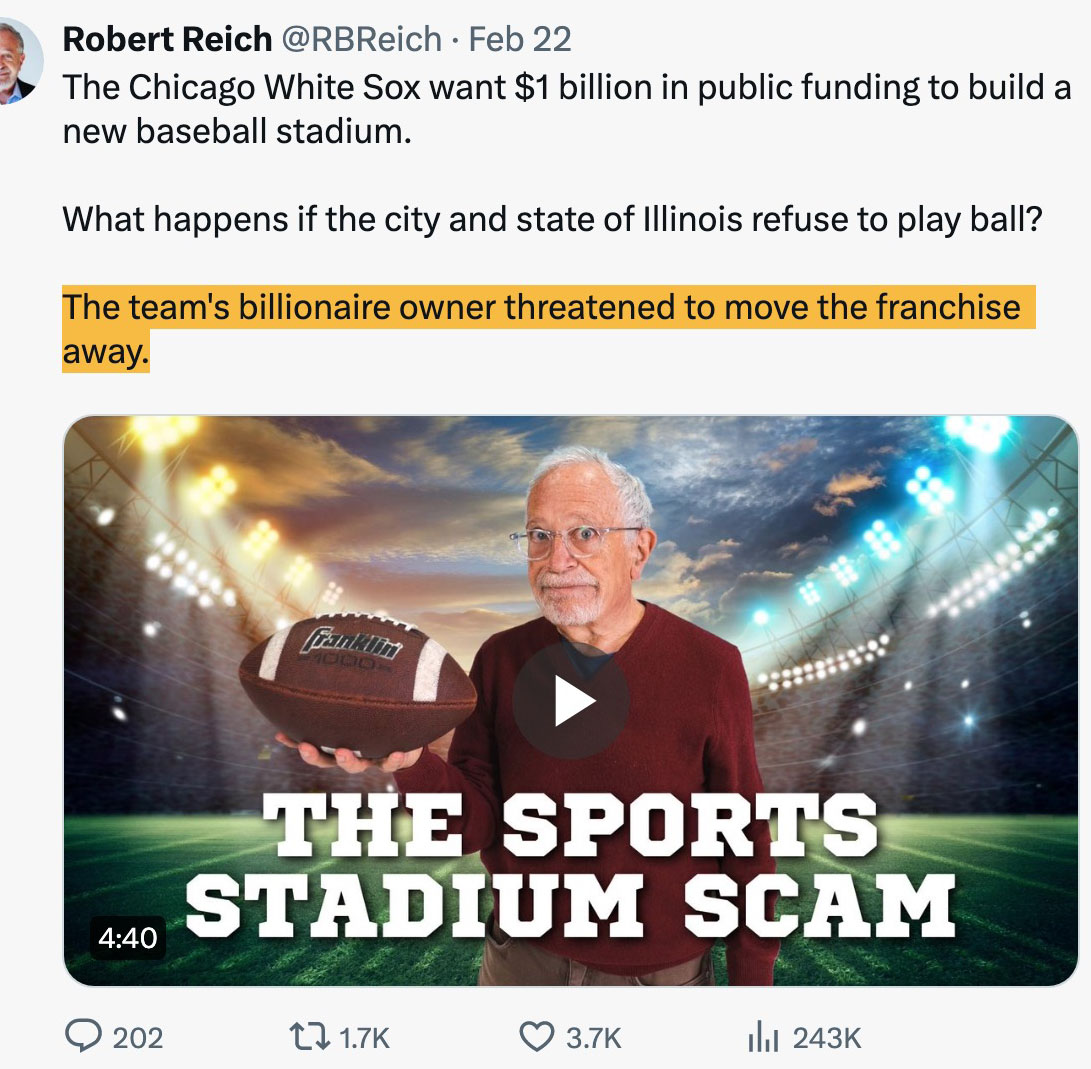
Robert Reich 2024 - Billionaire owners threatening to move sports stadiums - terrorizing legislators and fans

Robert Reich 2024 - Billionaire owners threatening to move sports stadiums - terrorizing legislators and fans
Public money is spent not on keeping citizens happy to ensure they are pliant, but on keeping corporate leaders happy so they continue making campaign donations and don’t threaten to move their businesses to some other jurisdiction.Pat Garofalo 2019
The Billionaire Boondoggle
Under such pressure from the administration, lobbyists and lawmakers who voiced doubts about Bush’s economic policies have publicly reversed themselves. “I think I should have kept my mouth shut,” Senate Finance Committee Chairman Charles E. Grassley (R-Iowa) said in one such recantation last month. The forms of pressure - exclusions from White House guest lists, a loss of access to key Bush aides, calls to dissenters’ superiors, veiled threats saying the White House has noted the transgression or even shouted accusations – convey the same message. Grover Norquist, a conservative activist who enforces loyalty for the White House, puts it this way: “If I bitch, guess what? I get coal in my socks.” The technique has served the Bush White House well by maintaining the lockstep support among Republicans needed to pass Bush policies in a closely divided Congress. “It’s fascinating the extent to which this administration has been able to hold troops in line for an extended period of time,” said Thomas E. Mann of the Brookings Institution.Dana Milbank & Jim VandeHei 2003
Bush’s Strong Arm Can Club Allies Too
Netflix’s House of Cards used a threat to abandon Maryland as leverage to ensure that its flow of public dollars wouldn’t be stopped by the state legislature...the state paid more and more money each year for the same amount of jobs, under threat that the production would leave...The threat was anything but subtle: provide us enough “incentives” – i.e. taxpayer money – to stay and we’ll take all our Maryland jobs elsewhere.Pat Garofalo 2019
The Billionaire Boondoggle
During the 16th and 17th centuries, some English monarchs sought to intimidate legislators--especially those not sympathetic to the Crown's viewpoints--through legal action. The adoption of the English Bill of Rights in 1689 sharply limited this practice by granting immunity to members against civil or criminal action stemming from the performance of their legislative duties.NCLS 2022
Separation of Powers: Legislative Immunity
After receiving death threats, Republicans say they’re afraid to vote to impeach. In weak and young democracies, especially ones with recent experience of civil war, you often see a phenomenon called “electoral violence,” in which armed groups use intimidation and force to coerce voters into supporting their preferred political parties. In the United States, it seems like we’re seeing the emergence of something more properly termed “legislative violence.” Far-right demonstrators in both DC and state capitals are using both threats and actual violence to coerce members of their own broad political faction, the Republican Party, to toe their line. In a country where firearms are omnipresent and easily attainable by legal means, legislators have good reason to take such threats seriously.Zack Beauchamp 2021
The Capitol Hill mob wanted to intimidate Congress. It’s working.
There is a disturbing reason Republicans in Congress are giving for refusing to break with President Donald Trump: They fear for their lives. According to Rep. Jason Crow (D-CO), this is a major reason why more House Republicans aren’t voting to impeach Donald Trump in the wake of the attack on the Capitol. “The majority of them are paralyzed with fear,” Crow said in a Wednesday MSNBC appearance. “I had a lot of conversations with my Republican colleagues last night, and a couple of them broke down in tears — saying that they are afraid for their lives if they vote for this impeachment.” Tim Alberta, Politico’s chief political correspondent, found in his own reporting that “Crow was right.” “I know for a fact several members *want* to impeach but fear casting that vote could get them or their families murdered,” Alberta writes. “Numerous House Republicans have received death threats in the past week.” This fear has not only affected the impeachment vote. Rep. Pete Meijer (R-MI) has said that he personally knows several House Republicans who wanted to vote to certify Joe Biden’s 2020 electoral win but were afraid for their lives if they chose to do so. Zack Beauchamp 2021
The Capitol Hill mob wanted to intimidate Congress. It’s working.
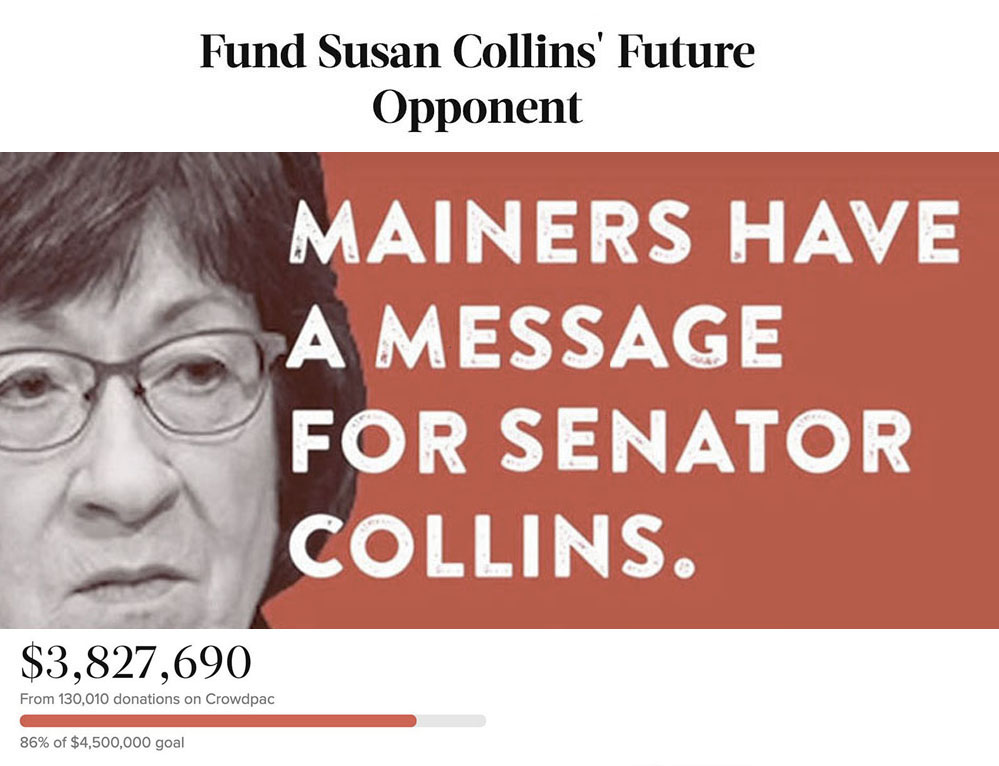
Fund Susan Collins' Future Opponent
Note: Notice how clear this message is. It says nothing about her opponent, in fact, the opponent is unknown. But this campaign is designed solely to fund that unknown person.

Fund Susan Collins' Future Opponent
Focus activities on a small group of high-publicity Congressmen... By keeping the list of targets to a small number, you insure that each effort will be more effectively run than a larger number. The strategy would be to intimidate other Congressmen into voting right, based on what they see is happening to their colleagues.Lobbyist John “Terry” Dolan
Secret Contras Lobbying Proposal (Senate Investigations)
We should attempt to get Pedro Chamovo, former editor of La Premza, before every editorial board possible and the National Press Club to scare the media. If we convince editors and reporters that the Nicaraguan government is attacking their fellow media people, this will dramatically reduce media support for Nicaragua.Lobbyist John “Terry” Dolan
Secret Contras Lobbying Proposal (Senate Investigations)
By establishing what each target vote is doing, we can adopt local lobbying efforts to each set of circumstances. For example, some Congressmen only need gentle persuasion, while others will need an outright threat of political exposure back home.John “Terry” Dolan
Secret Contras Lobbying Proposal (Senate Investigations)Note: This citation was pulled from a series of secreet lobbying proposals that were only exposed in the Senate investigations surrounding the Iran-Contra affairs. These documents give remarkable insight into the aggressive world of lobbying and the secretive tactics of one of the most feared lobbyists - NCPAC’s chairman Terry Dolan. In the proposal, Dolan refers to Members of Congress as ‘targets’ and time and again he makes it clear that the goal is not to flatter, bribe or cajole the representatives, but instead to coerce them with overt and secretive forms of intimidation. Dolan’s goal is the absolute control of Member’s publicly recorded votes.
Members of Congress from both parties, along with their families, would routinely visit our home for dinner or the holidays... This type of social interaction hardly ever happens today and we are the poorer for it. It is much harder to demonize someone when you know his family or have visited his home. Today, members routinely campaign against each other, raise donations against each other and force votes on trivial amendments written solely to provide fodder for the next negative attack ad. It’s difficult to work with members actively plotting your demise.Senator Evan Bayh 2012
Who Stole the American Dream?
“This is a classic quid pro quo as defined in our bribery laws,” Senator Collins said. “They are asking me to perform an official act and if I do not do what they want, $2 million-plus is going to go to my opponent.”Emily Birnbaum 2018
Collins: Anti-Kavanaugh opponents trying to ‘buy votes’
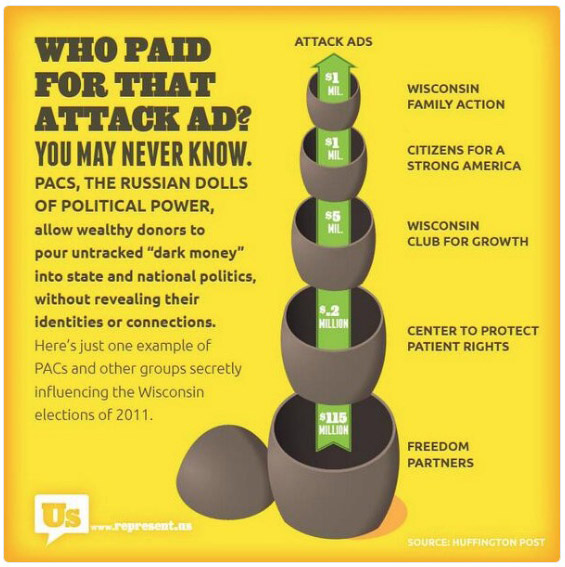
Represent.US 2013 - Attack Ads

Represent.US 2013 - Attack Ads
Some national interest groups watch the votes of all congressmen on single issues and ostentatiously try to reward or punish members for their positions; over the years some notable examples of such interest groups have been the Anti-Saloon League, the early Farm Bureau, the American Legion, the American Medical Association, and the National Rifle Association.David Mayhew 1974
The Electoral Connection
“The average American does not come down to these meetings,” Mr. Conable added. “It’s the lobbyist,” he said, who in an open session can pinpoint the committee members whose position they want to change. “During any break, they have to be physically restrained from contacting us,” he said, “and we sit there and watch them wince as we violate our alleged deals with them.”Jonathan Fuerbringer 1984
Privacy Called Spur to Tax Bill (NY Times)
Noble’s strategy was carefully targeted. He aimed the attack ads especially at the states of members of the Senate Finance Committee, which was writing the health-care bill and whose support would be needed to vote it out of the committee. The Obama White House had delegated a tremendous amount of authority to the committee’s chairman, the Montana Democrat Max Baucus, whom it was entrusting to win bipartisan support. Baucus, in turn, was trying fitfully to win the support of the committee’s leading Republican, the Iowa senator Chuck Grassley. Noble studied the committee and singled out members who might be especially susceptible to pressure, along with a few other key swing votes, narrowing his list down to those from Louisiana, Nebraska, Maine, Iowa, and Montana. With enough pressure, he believed he could even unnerve both Grassley and Baucus.Jane Mayer 2016
Dark Money
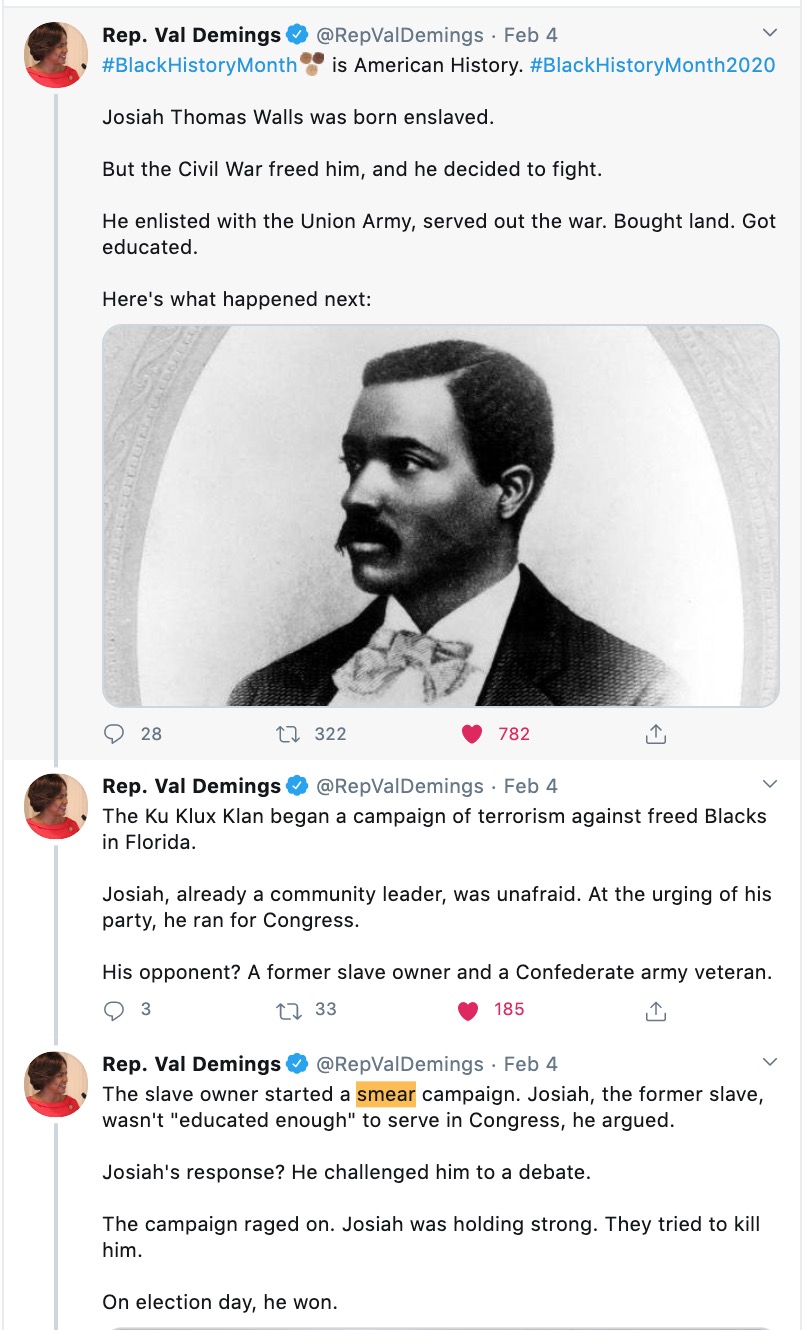
Josiah Thomas Walls 1800s smear campaign

Josiah Thomas Walls 1800s smear campaign
The film, a screed called ‘Hillary: The Movie,’ had been produced by Citizens United, an old right-wing group with a history of making vicious campaign ads.Jane Mayer 2016
Dark Money
In 2010, [Fred] Young took full advantage of the newfound freedom to spend. He contributed 80 percent of the money spent that year by SpeechNow’s super PAC, all of which paid for television ads targeting Wisconsin’s Democratic senator Russ Feingold. Feingold was a particularly symbolic target. He had been the Senate’s premier supporter of strict campaign spending laws. Standing on principle, he urged outside groups not to spend on his behalf. That fall, he went down to defeat.Jane Mayer 2016
Dark Money
Even more worrisome than outside spending’s effect on elections is the impact that it has after the election is over. Outside spending affects governance as well as elections. It is not simply the possibility that the ever-present need for campaign money may influence the bills politicians vote for or policy positions they take. It is also that the threat of outside spending against incumbent legislators may alter their behavior. Occasionally, the threat is explicit. One former Senator described a threat to “spend against me significantly and try to defeat me if I voted a certain way.” This type of concern recently garnered public attention, when a group called Crowdpac raised money in opposition to Senator Susan Collins, to be spent if she voted in favor of now-Justice Kavanaugh. A greater concern than this type of (apparent) grassroots effort is the prospect that a deep-pocketed individual, corporation, or other group will use its wealth to influence legislative decisionmaking.Daniel P. Tokaji 2018
Following the New Soft Money
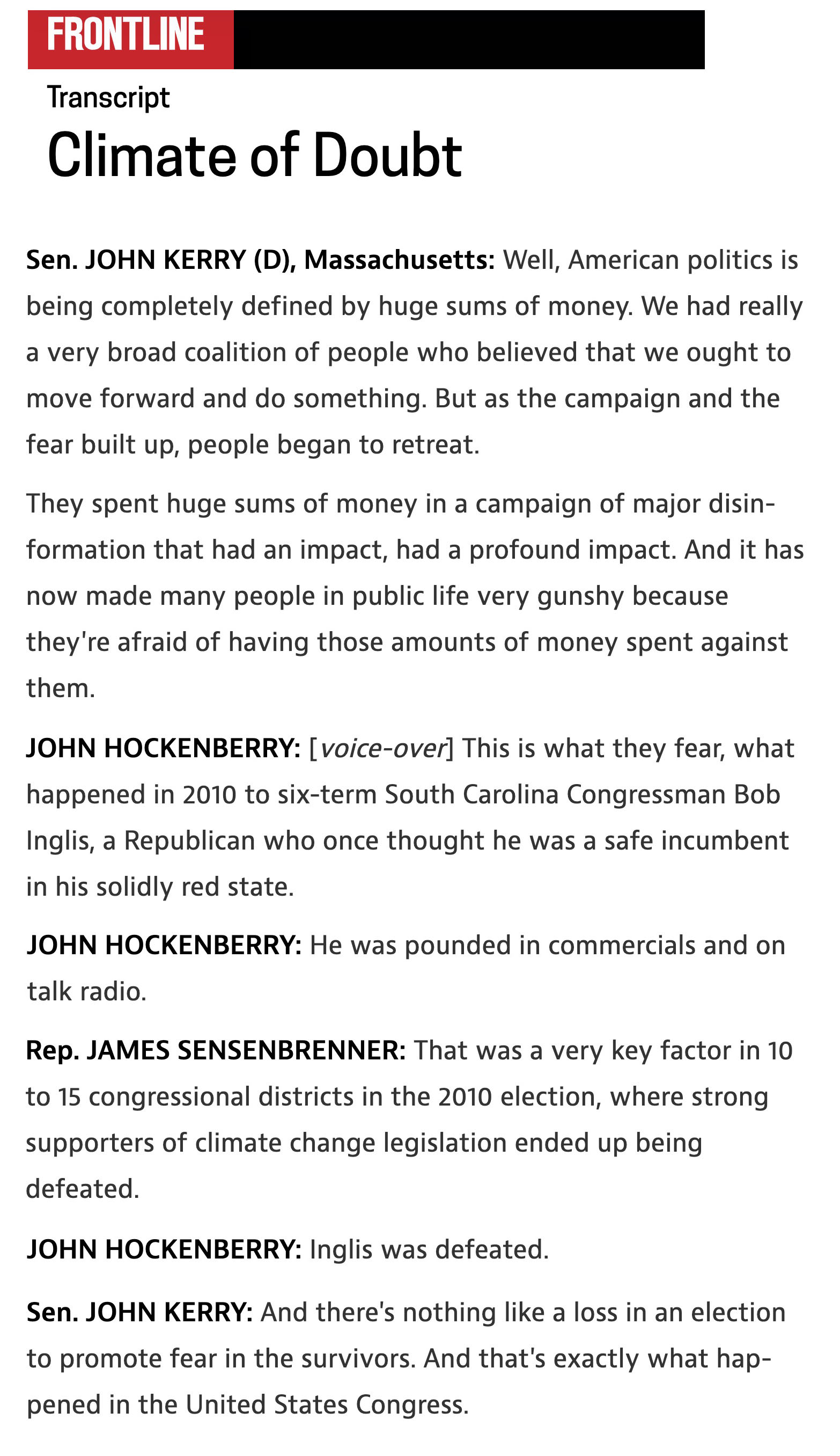
Frontline 2012 - Climate of Doubt
Note: Bob Inglis was a revered Republican congressman and a presidential hopeful, until he started talking about doing something about climate change. Big oil (Tea Party) destroyed him in the primaries running many negative ads that had nothing to do with climate. This terrifying message reverberates still through all modern day Republican primaries - “make a move on climate change you moderate Republican and big oil will gun you down!” Given that all of Inglis’ congressional votes and committee actions were required to be public actions, he had little alternative but to address the problem of climate head on. But in years past this wasn’t the case. Republicans were able to vote secretly about climate issues in both 1970 and 1990 and powerful environmental laws were passed. Ironically, global warming may be the the result of too much congressional sunshine.

Frontline 2012 - Climate of Doubt
[Sean Noble] then disbursed the Koch network’s money in accordance with what he regarded as each candidate’s odds of winning. Rather than disclose that his organization was paying for the ads, he directed the money through an array of different front groups. For instance, Noble explained to National Review that he chose a group called the 60 Plus Association, which was a right-wing version of the senior citizens’ lobby AARP, to air attack ads on Democrats.Jane Mayer 2016
Dark Money
[Sean Noble] wanted to start unusually early in order to widen the field of Democrats he could weaken. In an exuberant moment, Perriello had called the climate change fight “a gift,” proclaiming, “For the first time in a generation, we have the chance to redefine our energy economy.” Instead, it was he who got redefined that summer by a barrage of negative ads paid for not by his opponent but by unrecognizable outsiders. Perriello was an outspoken liberal in a swing district, so an obvious target. But soon mystery money was tarring Rick Boucher, too, a conservative Democratic congressman whose rural Virginia district encompassed Saltville, the factory town that the Olin Corporation had turned into a toxic waste dump.Jane Mayer 2016
Dark Money
The Willie Horton ad, for instance, had been paid for by an “outside” group run by the right-wing operative who founded Citizens United, Floyd Brown.Jane Mayer 2016
Dark Money
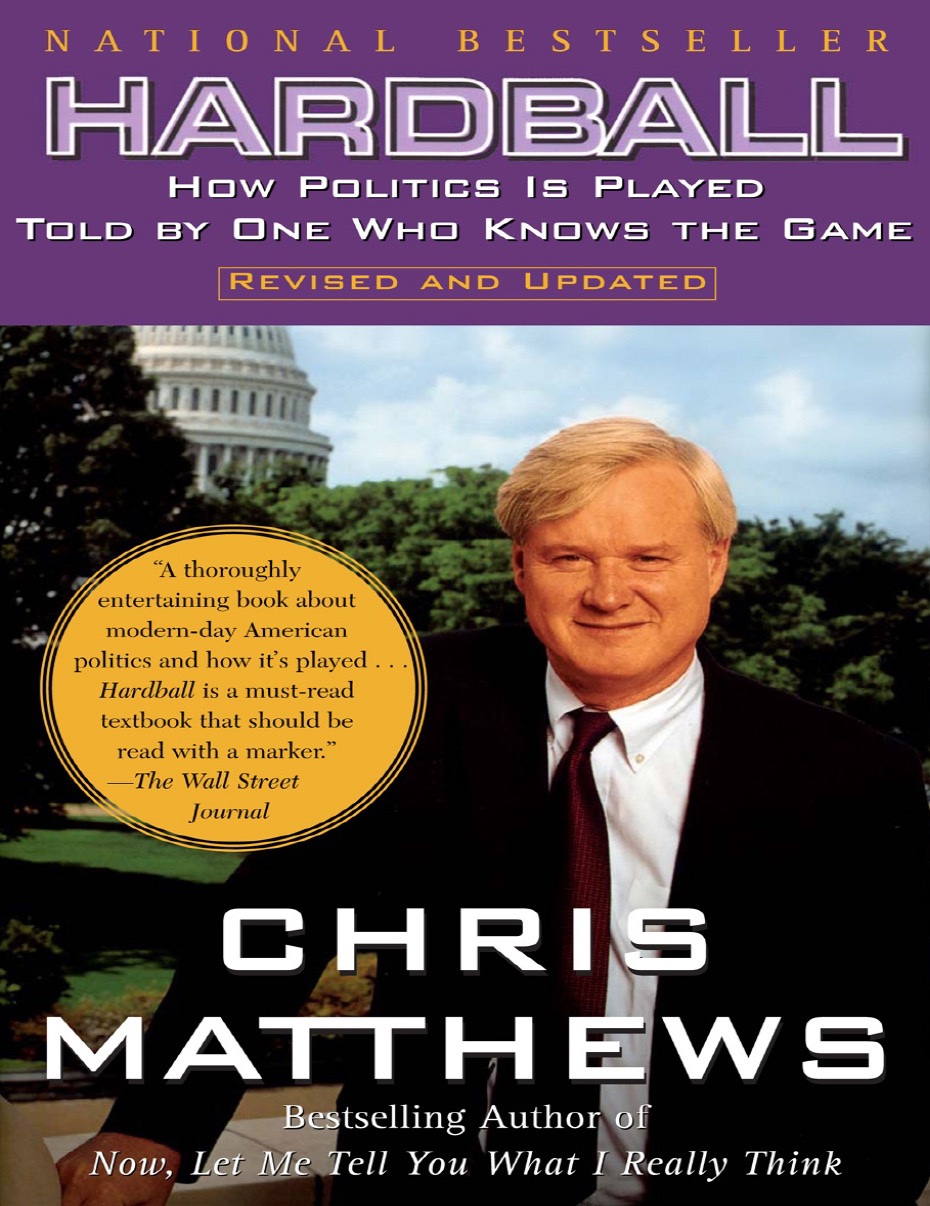
Chris Matthews 1999 - Hardball
Note: This 1999 bestseller on the dark side of politics makes no mention of bribery but endless references to negative attacks, endless uses of slander, push polls, negative information campaigns, attack ads etc.

Chris Matthews 1999 - Hardball
The Federation declares a legislator with a score of 70 percent or better a “Guardian of Small Business,” awards a pewter trophy in a public ceremony, sends out press releases to all local media, endorses the legislator for reelection, and guarantees a campaign contribution from its own PAC if he or she is in a close election. A score of less than 40 percent triggers a donation to the challenger.Douglas Arnold 1990
Logic of Congressional Action
Other presidents had been more selective, singling out specific programs for major reductions, such as impact aid, rivers and harbors projects, or hospital construction. Neither approach had succeeded. Legislators were always reluctant to cut specific programs because beneficiaries could easily trace their loss of benefits to legislators’ roll-call votes (and their champions in Congress made certain to demand roll-call votes to stimulate these electoral calculations).Douglas Arnold 1990
Logic of Congressional Action
Lessig combines the conventional money-in-politics fear with the iceberg theory, whereby the threat of an expenditure in a candidate’s race can bring a member to heel on a policy issue when he or she otherwise would remain independent. The iceberg model suggests that the influence of political funding should be measured more by the power of a threat to fund an opponent than by the effect of the spending on behalf of a candidate. Lessig insists that this threat will only get worse with independent corporate spending.Alison R. Hayward 2010
The Flawed Iceberg Model
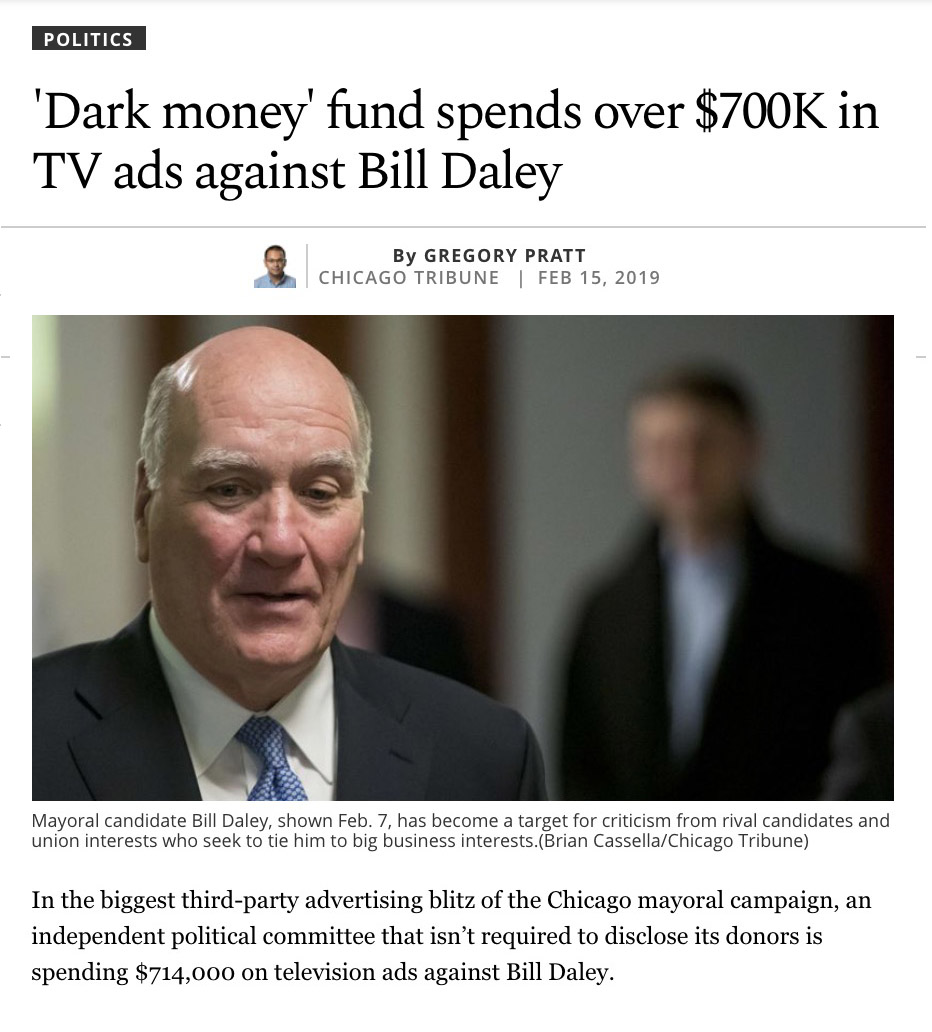
Pratt 2019 - ‘Dark money’ fund spends over $700K in TV ads against Bill Daley

Pratt 2019 - ‘Dark money’ fund spends over $700K in TV ads against Bill Daley
There is always the danger that an apparently underfunded opponent will pull an October surprise through a TV attack ad blitz or that a powerful grassroots based interest group, such as the AFL-CIO or the Christian Coalition, will throw its money and volunteers behind a sustained, targeted effort to teach a lesson to an arrogant incumbent who voted the wrong way. Peter Kobrak 2002
Cozy Politics
Frankly, one of the things that you do in these debates and elsewhere, you want to intimidate people. No, not with a gun, not with the threat of violence, but you are helped by this notion that if people disagree with you it will be painful for them. Maybe they will lose a perk, but maybe they will just be made to look ridiculous.Representative Barney Frank 2015
How to Be Likeable and Intimidating
In the 2016 election cycle, the NRA and its affiliated organizations spent more than $34 million attacking mostly-Democratic candidates running for federal offices, according to federal records compiled by OpenSecrets.org. (They spent on $15 million on positive ads).Noah Pranksy 2018
Secret NRA weapons: Negative ads, motivated voters
In 1980 a combination of persuasion by Republican Party leaders and seizing of opportunity by the managers of PACs led to an unprecedented amout of PAC money going to candidates who were challenging incumbents. The exercise was successful on two levels: it helped defeat some incumbents, and it scared the daylights out of incumbents who survived... Now it was a question not just o how much money one could raise but of how much money might go to one’s opponent.Elizabeth Drew 1983
Politics and money: the new road to corruption
Voters are faced not with responsible debate on issues of concern but with vicious 30-second TV attacks on the candidates integrity.Peter Fenn 1982
Contribution Limitations in Congress
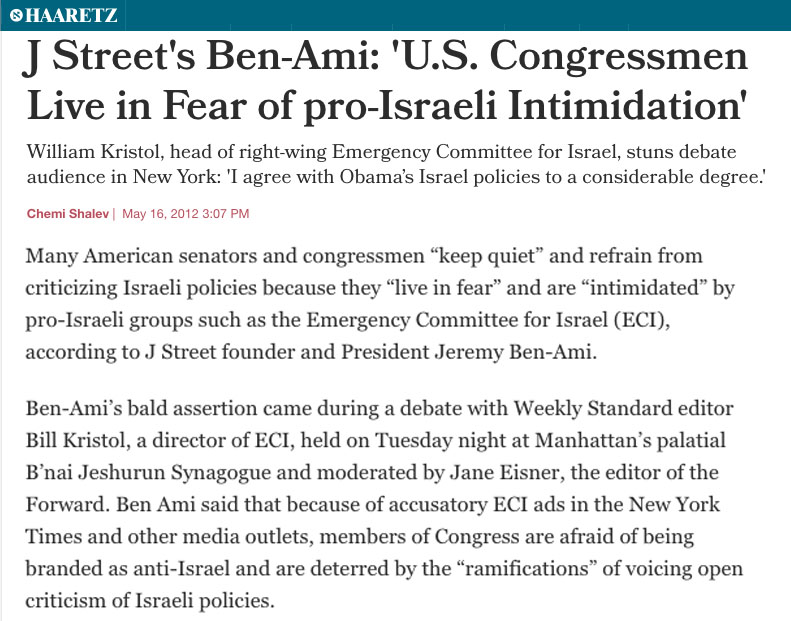
U.S. Congressmen Live in Fear of pro-Israeli Intimidation

U.S. Congressmen Live in Fear of pro-Israeli Intimidation
This ideal of representative government, that a representative is elected to use his or her good judgment to make decisions for the good of the whole, is charged with crumbling under the onslaught of negative advertising. Karen S. Johnson-Cartee & Gary Copeland 2013
Negative Political Advertising
According to the Center for Responsive Politics, “Most of the $1 million NCPAC spent on independent expenditures during the 1980 Senate races financed attack ads against incumbents. A NCPAC target could face as many as 72 negative radio ads a day and 200 television commercials per week, well before the election.”Bill Berkowitz 2012
A Demented Political Process
Tennessee lawmaker Debra Maggart was a lifetime member of America’s most powerful gun lobby, the National Riffle Association. She had an A+ rating with the group and even supported allowing guns in bars. But when Maggart decided not to back a bill allowing guns in cars – even on properties where the owners did not want guns- the NRA turned against her. The group did everything in its power to ensure her election defeat. They succeeded.Samuel Burke 2012
The risk of daring to disagree with the NRA
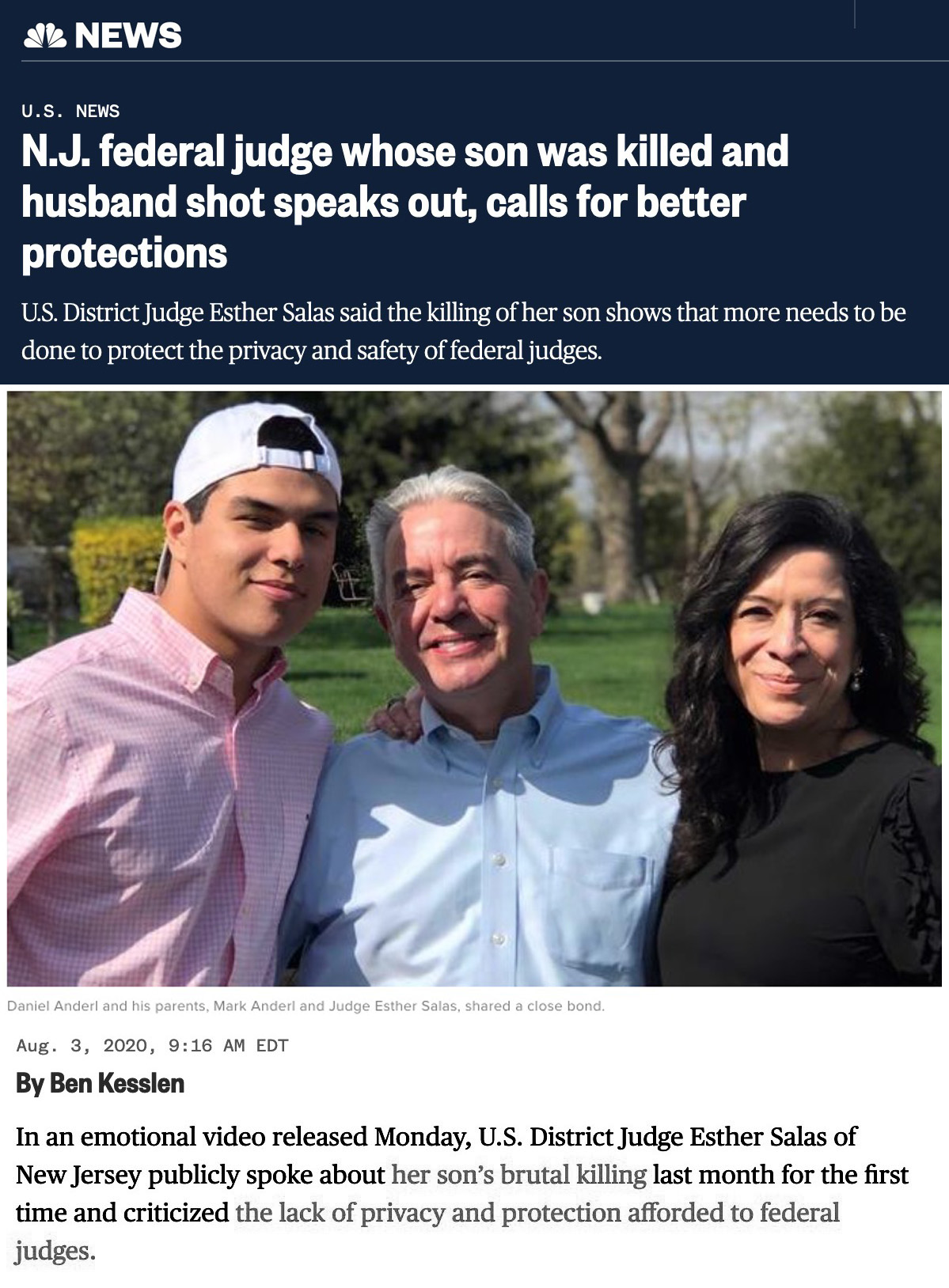
Federal Judge’s Son Killed and Husband Shot (Esther Salas)

Federal Judge’s Son Killed and Husband Shot (Esther Salas)
A fear has set in that if they vote for the bill they won’t be re-elected. It’s that plain, it’s that simple."Senator Dianne Feinstein 2013
NRA intimidation weakens weapons reform
Groups like ours, are potentially very dangerous to the political process. We could be a menace, yes. Ten independent expenditure groups, for example, could amass this great amount of money and defeat the point of accountability in politics. We could say whatever we want about an opponent of a Senator Smith and the senator wouldn’t have to say anything. A group like ours could lie through its teeth and the candidate it helps stays clean.John Terry Dolan 1980
Contribution Limitations in Congress
The second track consists of “a strong grass-roots response in the form of in-district lobbying,” targeted on the fewest representatives possible so as to maximize the pressure brought to bear on each. In referring to these members of Congress Terry Dolan uses such words as target, intimidate, and threaten. Each targeted representative should receive fifty lobbying contacts a week, preferably “in the form of personal group meetings with the Congressman in his district office,” supplemented by letters and phone calls to his Washington office. To Dolan “grass-roots pressure” meant visits from “high-dollar contributors” along with “business, labor, and media leaders” from the home district. In what Dolan accurately foresaw as “a five-month campaign” coordination would tie what happened nationally to the pressure members of Congress felt locally. “Contra leaders and victims of Nicaraguan atrocities” are to be paraded through “opinion-making centers” and then into the home districts. Expensive television commercials will be designed on the “donut” format where a hole is left in a professionally designed ad for inserting material tailored to individual representatives. “It is important that each of these advertising programs be well coordinated with each other and with direct mail activities. This will maximize the amount of grassroots activities generated and will increase the perception of the Congressman that he will have political problems if he votes wrong.”Eldon Kenworthy 1995
America/Americas - Myth in in the Making of US Policy toward Latin America
While neither responsible business interests, nor the United States Chamber of Commerce, would engage in the irresponsible tactics of some pressure groups, it is essential that spokesmen for the enterprise system — at all levels and at every opportunity — be far more aggressive than in the past…there should not be the slightest hesitation to press vigorously in all political arenas for support of the enterprise system. Nor should there be reluctance to penalize politically those who oppose it.Lewis F. Powell 1971
Confidential Memorandum: Attack of American Free Enterprise System (Powell Memo)
Even famous reformers like Bernie Sanders and Larry Lessig refer to the political system as one of ‘legalized bribery.’ Yet study after study confirms that while some bribery exists, it is statistically insignificant. By overlooking the effects of intimidation, scholars like Zephyr Teachout and Archon Fung mislead reformers. Sure, if members of Congress are venal, then we need to increase policing and transparency. But if they are being terrorized we need to increase the amount of protection and isolation. By misdiagnosing the problem these scholars open up avenues where the ‘cure’ will exacerbate the disease.James D’Angelo 2016
How Congressional Transparency Favors Special Interests
The nonprofit group Justice at Stake, which focuses on reducing the role of moneyed interests in judicial elections, asserts that “Since 2000, elected Supreme Courts have been Ground Zero of an unprecedented money war, in which competing groups have spent tens of millions on negative ads, in an attempt to pack courts with judges friendly to their agendas.”Wendell Potter & Nick Penniman 2016
Nation on the Take: How Big Money Corrupts Our Democracy
In recent years, political operatives have taken advantage of this exemption from disclosure – combined with inaction on regulating 501(c)(4)s by the FEC and IRS – to turn the groups into stealth political bombers. As Matea Gold reported in the Washington Post in the summer of 2015, “These tax-exempt groups – which can keep their donors secret even as they sponsor hard-hitting ads – are being increasingly embraced by campaign operatives looking for new ways to influence the political environment.”Wendell Potter & Nick Penniman 2016
Nation on the Take: How Big Money Corrupts Our Democracy
As the National Journal noted in a story about the Clinton health care plan headlined “Lost Cause,” the HLC mounted a multipronged attack including grassroots organizing, lobbying by corporate chief executives, and public relations efforts. At the same time, it ran ads around the country raising the specter of health care rationing and warning of bureaucratic interference with patients’ rights. All of this was done under the name of the HLC, not the individual companies that funded it.Wendell Potter 2010
Deadly Spin
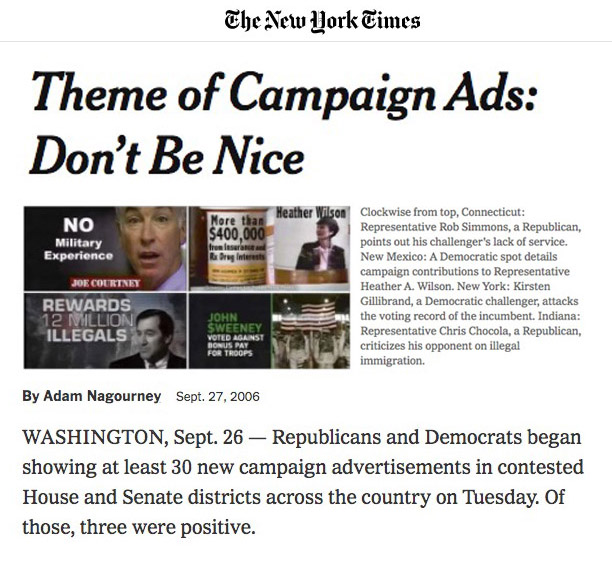
Adam Nagourney 2006 - New York Times

Adam Nagourney 2006 - New York Times
While the “Harry and Louise” ads got much of the credit for killing the Clinton plan, the HLC’s stealth campaign was arguably more effective where it counted. The HLC aired radio ads blasting Health Security and warning that it could lead to “Washington bureaucrats deciding how much care can be given to you and your family.” The Ridley Group, a Washington-based communications firm, produced the ads, which encouraged listeners to call a toll-free number to tell Congress how much they hated the Clinton plan. When callers dialed the number, they reached Bonner and Associates, a “grassroots” lobbying firm that patched the calls through to members of Congress. The HLC’s Bailey told the National Journal that at the peak of the ad campaign, about five thousand calls a day were being generated. The campaign was targeted to specific committees and specific votes...The group’s operations were comprehensive and sophisticated. Its lobbying and PR activities were focused on all of the congressional districts where voters were about evenly split.Wendell Potter 2010
Deadly Spin
If the White House agreed to the industry’s demands, drug companies would finance a $150 million ad campaign in support of what by then was beginning to be called Obamacare. It probably didn’t have to be said what would happen if the White House refused to accept the industry’s terms – drug companies would spend whatever it would take to kill reform, as they had done when the Clintons were in the White House.Wendell Potter & Nick Penniman 2016
Nation on the Take: How Big Money Corrupts Our Democracy
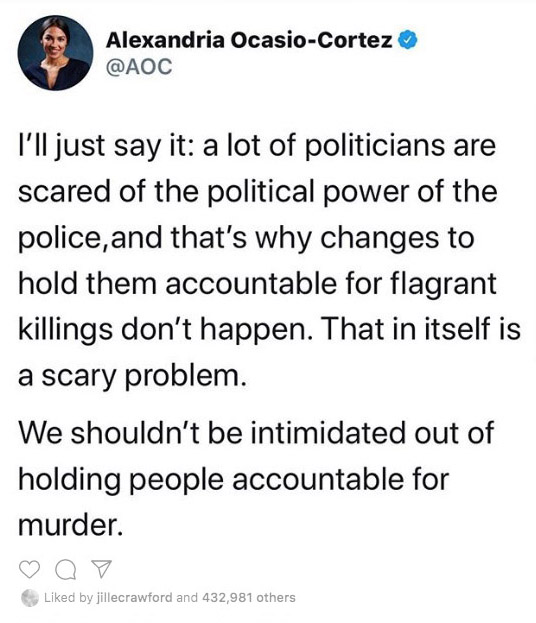
Alexandria Ocasio-Cortez 2020 - Police Unions Threaten Politicians
I’ll just say it: a lot of politicians are scared of the political power of the police, and that’s why changes to hold them accountable for flagrant killings don’t happen. That in itself is a scary problem. We shouldn’t be intimidated out of holding people accountable for murder. - by AOC via Twitter

Alexandria Ocasio-Cortez 2020 - Police Unions Threaten Politicians
I’ll just say it: a lot of politicians are scared of the political power of the police, and that’s why changes to hold them accountable for flagrant killings don’t happen. That in itself is a scary problem. We shouldn’t be intimidated out of holding people accountable for murder. - by AOC via Twitter
The Chamber of Commerce... lavished even more money on Washington lobbying, targeting members of the House and Senate who could expect to face the wrath of attack ads if they didn’t get in line. It could not only pick members; it also told them how to vote while they were in the Capitol.Alyssa Katz 2015
Influence Machine: Chamber of Commerce and Corporate Capture
In approaching the typical member, a pressure group has no need to tell him outright that future political support or opposition depends on how the member votes on a particular bill or whether, over a long period, the member acts favorably toward the group. The member understands this without being told. The member knows that when the vital interests of some group are at stake, a vote supporting those interests normally would win the group’s friendship and future support, and a vote against them would mean the group’s enmity and future opposition.Congressional Quarterly 1982
The Washington Lobby
Full transparency in government, in professional-client relations, and in personal life can do great harm. It threatens privacy. It threatens relations of intimacy that invariably are built on closely held confidences. In government or other decision-making groups it inhibits honest conversation. It may expose vulnerable individuals or groups to intimidation by powerful and potentially malevolent authorities.Michael Schudson 2014
The Rise of Right to Know
The Carter presidency carries a surprising political significance. It marked the arrival of an active, innovative conservative organizer at the Republican National Committee (RNC), William Brock. Brock was an establishment political figure – a former congressman and cabinet member – and a gifted organizational reformer... Brock’s key innovation was the energetic expansion of direct-mail operations, which allowed the GOP to tap its strongest supporters and raise unprecedented sums. With Democrats controlling Washington, Brock could maximize the use of the negative appeals on which direct mail thrives.Jacob Hacker & Paul Pierson 2010
Winner-Take-All Politics
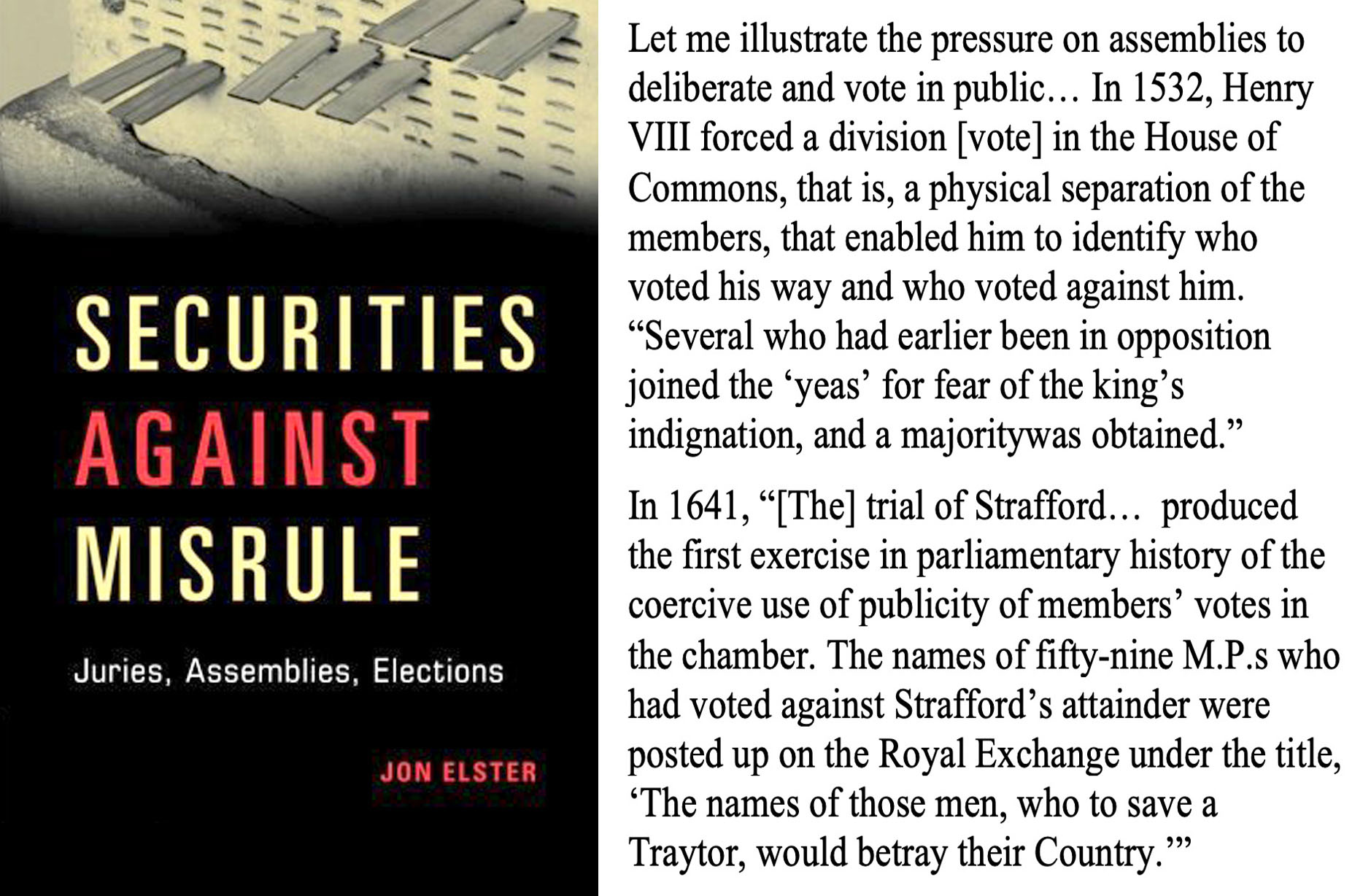
Jon Elster 2013 - Securities Against Misrule
Text: Let me illustrate the pressure on assemblies to deliberate and vote in public… In 1532, Henry VIII forced a division [vote] in the House of Commons, that is, a physical separation of the members, that enabled him to identify who voted his way and who voted against him. “Several who had earlier been in opposition joined the ‘yeas’ for fear of the king’s indignation, and a majority was obtained.” In 1641, “[The] trial of Strafford… produced the first exercise in parliamentary history of the coercive use of publicity of members’ votes in the chamber. The names of fifty-nine M.P.s who had voted against Strafford’s attainder were posted up on the Royal Exchange under the title, ‘The names of those men, who to save a Traytor, would betray their Country.’”

Jon Elster 2013 - Securities Against Misrule
For 2012, the Kochs’ chamber pulled in an astonishing $255 million in anonymous contributions and spat them back out at a constellation of groups—including the U.S. Chamber—which in turn used the funds to buy ads attacking President Obama, Democratic candidates for Congress, and the Affordable Care Act.Alyssa Katz 2015
Influence Machine: Chamber of Commerce and Corporate Capture
In February 2020, [President Nayib] Bukele ordered the military to surround the legislature in an effort to intimidate legislators into approving an anti-crime bill.Clare Ribando Seelke 2021
El Salvador: Authoritarian Actions and U.S. Response
The U.S. Chamber thanked the bill’s sponsor, Steve Stivers, in the best way it could: by helping him get elected to Congress in 2010, with more than $260,000 in campaign ads attacking the Democratic incumbent, Mary Jo Kilroy. He was one of dozens of Republicans who were swept into office that fall aloft the Chamber’s $33 million in election advertising, spending that helped hand the GOP control of the House of Representatives. In Ohio alone five Republican challengers supported by the Chamber ousted incumbent Democrats.Alyssa Katz 2015
Influence Machine: Chamber of Commerce and Corporate Capture
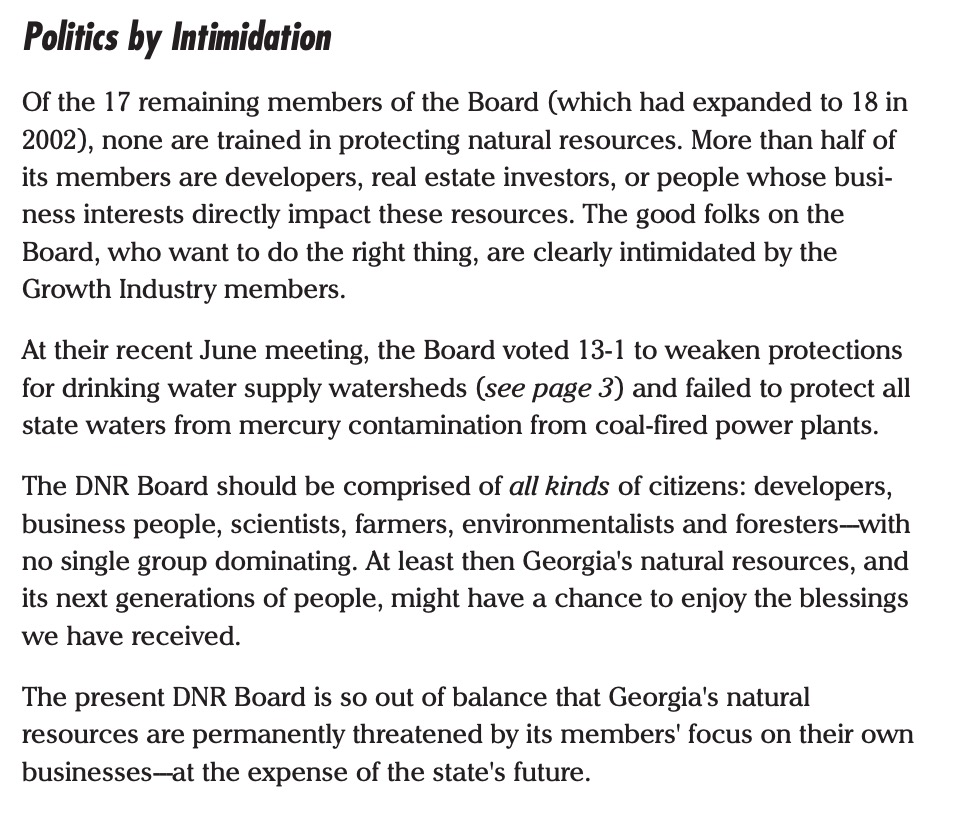
Natural Resource Board Stripped of Environmentalists - 2007

Natural Resource Board Stripped of Environmentalists - 2007
Having succeeded in undermining the bill, the Chamber went on to attack the losing side. Claire McCaskill (D-MO) and Sherrod Brown (D-OH), two of the letter’s signers, were among the senators who voted for the bill even though they could expect to face blistering campaigns from the Chamber and local businesses for doing so. In the 2012 election they were, predictably, slimed in ads by the Chamber as big-government monsters, but both survived. Jim Webb (D-VA) and Evan Bayh (D-IN) voted for the bill and retired rather than seek reelection under threat of such attacks.Alyssa Katz 2015
Influence Machine: Chamber of Commerce and Corporate Capture
Encouraged by the most conservative Republicans, the NFIB mobilized heavily against the Clinton plan, [financing] an aggressive campaign of negative ads and grassroots mobilization. It emerged successful.Jacob Hacker & Paul Pierson 2010
Winner-Take-All Politics
[Minister of National Defense of El Salvador] Munguia Payes was also accused of attempting to intimidate legislators when he attended a December 6 plenary session in the Legislative Assembly on lifting the immunity of a general accused of arms trafficking with three uniformed military officers; legislators ultimately lifted the immunity for General Jose Atilio Benitez.US Department of State 2017
Human Rights Reports
The origins of the speech or debate clause stemmed from the kind of practices that limited the freedom of U.K. parliamentarians. During the 16th and 17th centuries, the British monarchy often used the threat of criminal prosecution to intimidate legislators and prevent them from acting against the crown. King James II, for example, ordered the prosecution of the speaker of the House of Commons for publicizing alleged plots between James II and the King of France to reinstate Catholicism as England’s official religion. Concerns over the king’s actions led Parliament to place a clause in the English Bill of Rights that prevented prosecution for legislative acts.The Conversation 2022
Enforcing unprecedented subpoenas for GOP lawmakers turns on complex legal precedent going back centuries
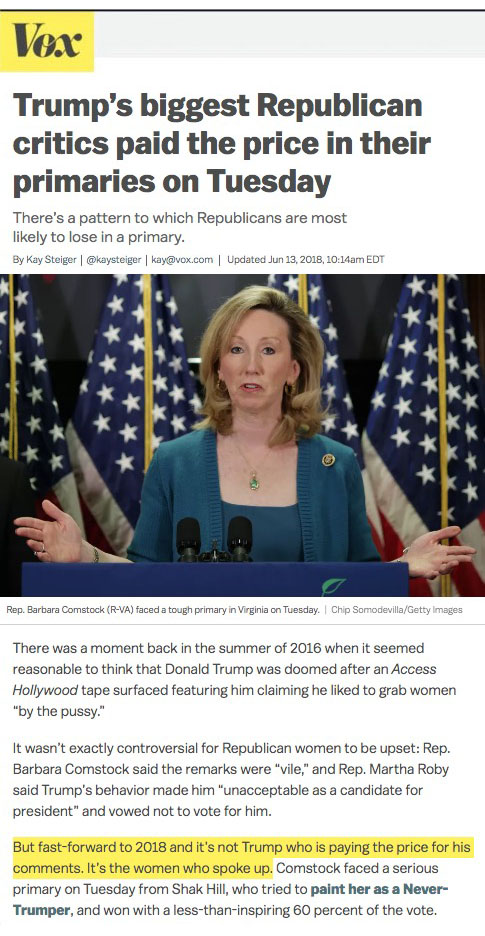
Trump’s biggest Republican critics paid the price in their primaries on Tuesday

Trump’s biggest Republican critics paid the price in their primaries on Tuesday
The wealthier the organization, the more negative advertisements and opponents they could fund.James D’Angelo 2017
The Dark Side of Sunshine
The modern lobbying industry relied on intimidation and fear. Suddenly, representative’s positions in committees (which had been almost entirely secret for 200 years) were used as ammunition against them. Terrified of standing out, members voted in unison and partisanship shot up. James D’Angelo 2017
The Dark Side of Sunshine
Month after month of argument without agreement, coupled with relentless negative ads and anti-Washington rhetoric from GOP leaders, softened public support while deflating the administration’s supporters.Jacob Hacker & Paul Pierson 2010
Winner-Take-All Politics
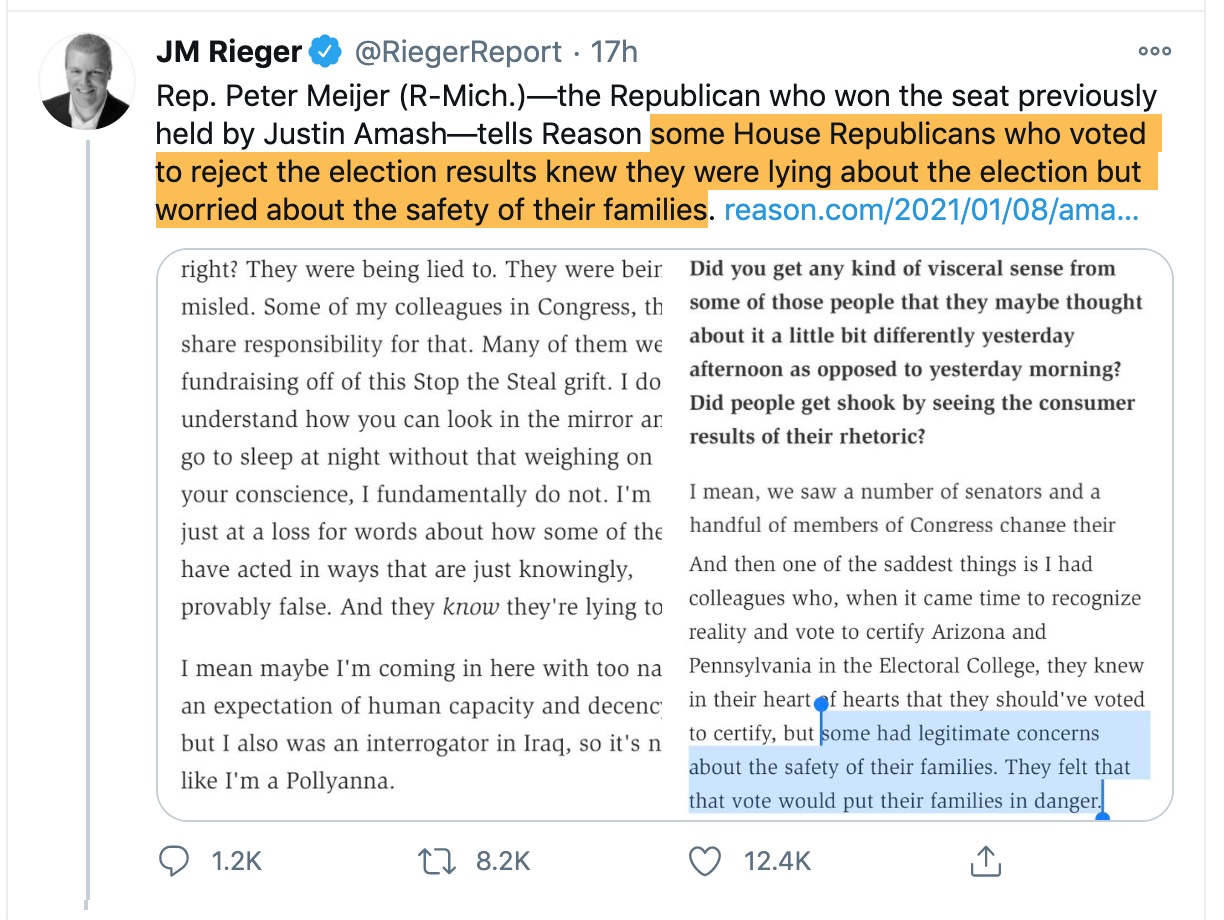
J.M. Rieger 2021 - Intimidation via Twitter

J.M. Rieger 2021 - Intimidation via Twitter
It is virtually impossible to buy a decision...I have never met a member of Congress whom I felt I could bribe with any amount of money.Lester Milbrath 1963
The Washington Lobbyists
Sen. Joe Manchin said Thursday if the National Rifle Association hadn’t interfered by telling [threatening] lawmakers their votes on background checks would be factored into its grading system, the bill would have passed. “If they hadn’t scored it, we’d have gotten 70 votes,” Manchin said. Mark Kelly, Gabby Giffords’ husband, said fear lead senators to vote “no” on the bill. “If that [gun control] vote had been a secret ballot, I bet you it would have passed with 80 votes… A lot of the senators that we met with over the past days and weeks–you know, we discussed this legislation with them, we talked about how it would work, what it would do, and most of them – actually, almost all of them – said that they were in favor of the policy on the merit.” Gabby Giffords, herself a victim of gun violence, called out the “cowardice” of senators in a New York Times op-ed following Wednesday’s gun vote.Sarah Muller 2013
The NRA ‘made a big mistake’ on gun bill
Instances of outright corruption are rare. While they make good news stories when they do occur, the media’s fascination with scandal has done a disservice to political accountability.Lee Drutman 2015
The Business of America is Lobbying
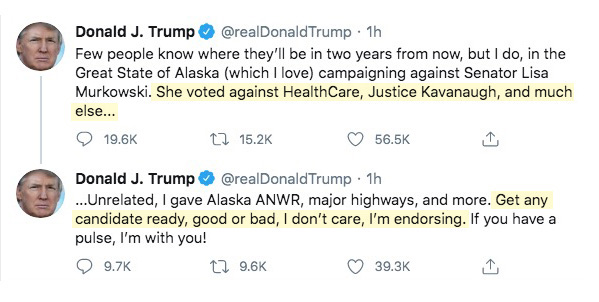
Donald Trump 2020 - Twitter Brubery

Donald Trump 2020 - Twitter Brubery
In an earlier era of American politics, from the 1960s through the 1980 presidential campaign, most of the political commercials on television were “positive,” meaning they emphasized a candidate’s purported qualities. But by the late 1980s it was more typical to spend television money on “negative” commercials – mostly thirty-second spots that found fault with the candidate’s opponent. The professionals who exploited the new technologies as the politicians’ hired guns looked at 1986 as a turning point; that year negative commercials dominated the “air wars” – the candidates’ televised commercials – in contests all over the country, and they worked.
Roger Ailes loved negative commercials, and defended them vigorously. “I don’t agree with this idea about negative campaigning being so awful,” he said after the 1988 election. “Americans learn a lot from these spots.” What they “learned” from Ailes-produced spots in that campaign were profoundly misleading descriptions of Governor Dukakis’s record in Massachusetts. One Bush commercial asserted that Dukakis had failed to clean up the badly polluted Boston Harbor: “As governor he had the opportunity to do something about it but chose not to.” In fact, a court decision in Massachusetts had forced Dukakis to set up a new agency and initiate a $6 billion program to clean up the harbor. Bush’s commercial featured a picture of a warning sign in the harbor: “Danger Radiation Hazard No Swimming.” The sign was decades old, and had been posted near a Navy yard where nuclear submarines had once been repaired. Another Ailes-produced spot showed a stream of mean-looking men wearing prison uniforms walking through a revolving door while an announcer criticized “the Dukakis furlough program” that allowed dangerous criminals to leave prison on weekend passes. The commercial provided exaggerated statistics about a program that had been initiated by a Republican predecessor to Dukakis. The Democrat had actually ended the furlough program.Robert Kaiser 2009
So Much Damn Money
That Gingrich campaign was consistent with the changing nature of campaigns at the time, when “going negative” became popular, particularly among conservative Republican candidates. Humphrey in New Hampshire and Jepsen in Iowa both relied on negative campaigning to win their races that year. This was the era of fast-growing campaign costs. The technology of politics was changing, and the newest techniques were expensive. It cost money to take polls, make and broadcast television commercials, send large quantities of direct mail, and hire professional campaign workers. The use of all of these was still rare in House and Senate campaigns in the early 1970s, but was widespread by 1978 and commonplace soon thereafter – and ever since. One aggressive promoter of negative campaigning was the National Conservative Political Action Committee, one of the organizations for which Viguerie raised money by mail. NCPAC identified six senators it wanted to help defeat in 1980, and conducted its own negative campaigns against each, spending nearly a million dollars. NCPAC was an “independent” committee with no direct ties to the campaigns it was supporting. Like Gingrich, Terry Dolan, the young leader of NCPAC, put ends ahead of means. He invented reasons why voters should reject the senators he had targeted. In Idaho, for example, a NCPAC television spot showed an empty missile silo while a voice in the background said Senator Frank Church, then the chairman of the Senate Foreign Relations Committee, had “almost always opposed a strong national defense.” It turned out the empty silo had housed a Titan missile, an out-of-date model long since replaced by the smaller, more powerful Minuteman, which Church had supported. Other advertisements accused him of voting for a pay increase for senators that he had actually opposed, and of promoting abortion, which he generally opposed. Robert Kaiser 2009
So Much Damn Money
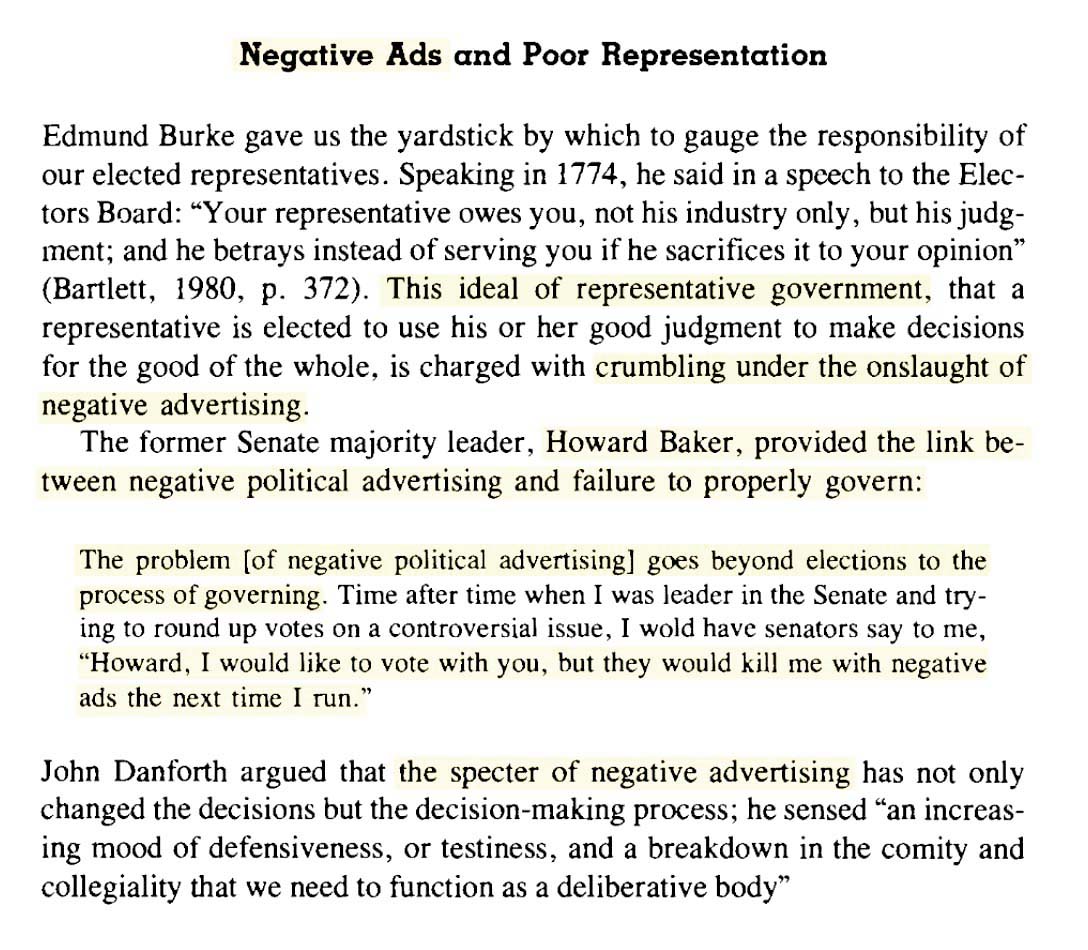
Johnson-Cartee & Copeland 2010 - Negative Political Advertising

Johnson-Cartee & Copeland 2010 - Negative Political Advertising
This time, however, the new apparatus of business organizations was prepared. The Business Roundtable helped assemble a huge coalition of other leading umbrella organizations (such as the Chamber of Commerce) as well as hundreds of firms. Together, these groups launched a diversified attack—one that House Speaker Tip O’Neill would describe as the most intense he had seen in twenty-five years. Business organizations worked on public opinion – orchestrating a campaign of op-ed pieces and magazine articles designed to frame the proposed $15 million agency as a massive expansion of government authority. The coalition unveiled its new capacity for grassroots mobilization, flooding Congress with calls, letters, and visits from influential constituents. Finally, it targeted moderate Democrats elected in 1974 and 1976 – many of them representing suburban districts that had traditionally been Republican. These efforts turned an anticipated easy victory for consumer advocates into an unexpected rout.Jacob Hacker & Paul Pierson 2010
Winner-Take-All Politics
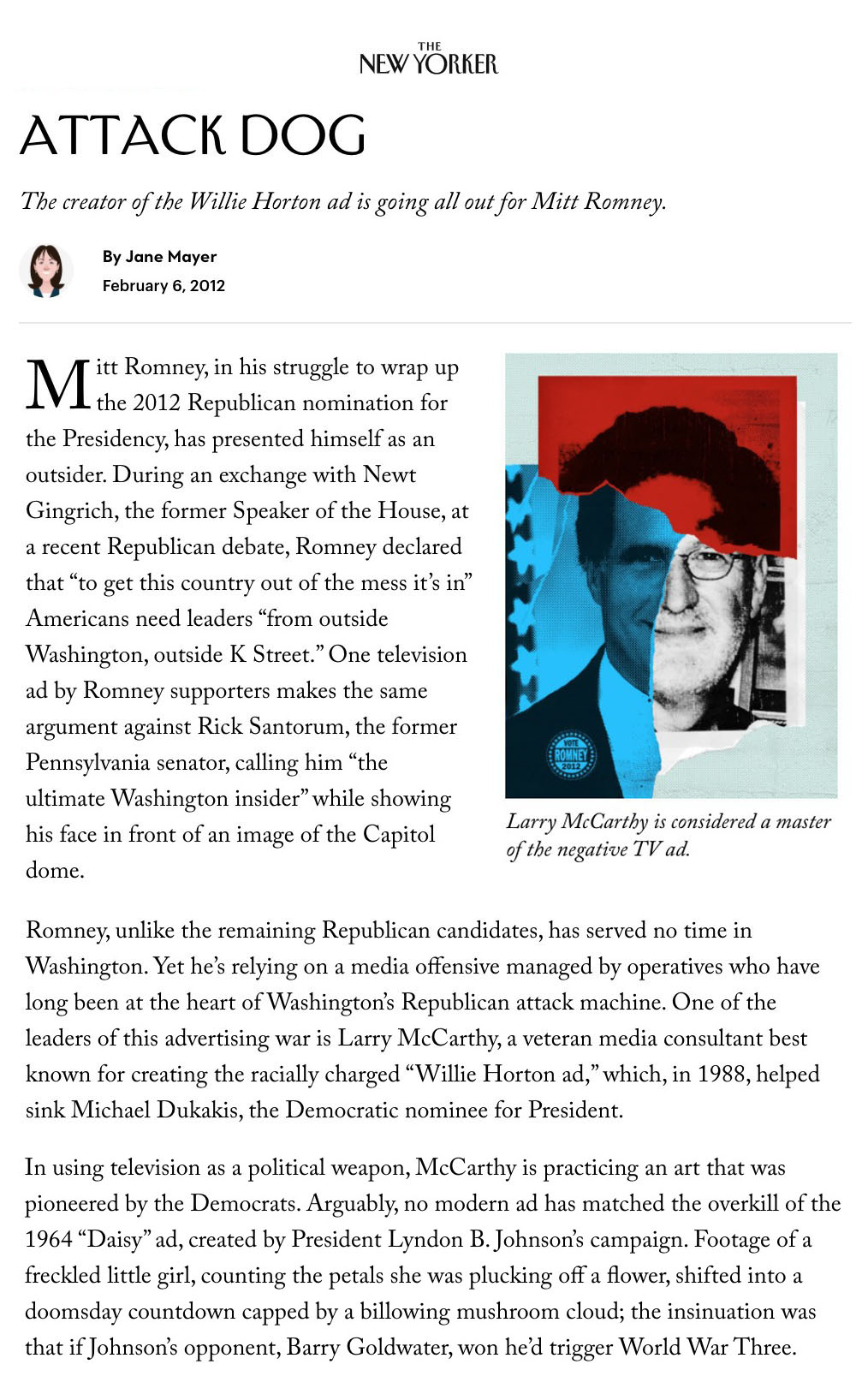
Jane Mayer 2012 - The New Yorker

Jane Mayer 2012 - The New Yorker
Sean Noble was the Koch Brother’s dark money man. And his strategy was carefully targeted. He aimed the attack ads especially at the states of members of the Senate Finance Committee, which was writing the health-care bill and whose support would be needed to vote it out of the committee. Noble studied the committee and singled out members who might be especially susceptible to pressure, along with a few other key swing votes, narrowing his list down to those from Louisiana, Nebraska, Maine, Iowa, and Montana. Noble needed to generate “grassroots” pressure on the potentially persuadable senators, but constituents weren’t yet engaged. The stakes grew as the Senate approached its summer recess. “We knew we had to make that summer absolute hell,” he told National Review.Jane Mayer 2016
Dark Money
That fall, television ads began appearing in states like Montana, where the Democratic senator Max Baucus was already under attack from members of the Koch network on the health-care issue. “There is no scientific evidence that CO2 is a pollutant. In fact, higher CO2 levels than we have today would help the Earth’s ecosystems,” the ads said, urging viewers to tell Baucus not to vote for the cap-and-trade bill, which would “cost us jobs.” The sponsor for the ad was a group curiously called ‘CO2 Is Green.’ Quietly funding it, according to Steven Mufson, the energy reporter for The Washington Post, was Corbin Robertson, owner of the country’s largest private cache of coal.Jane Mayer 2016
Dark Money
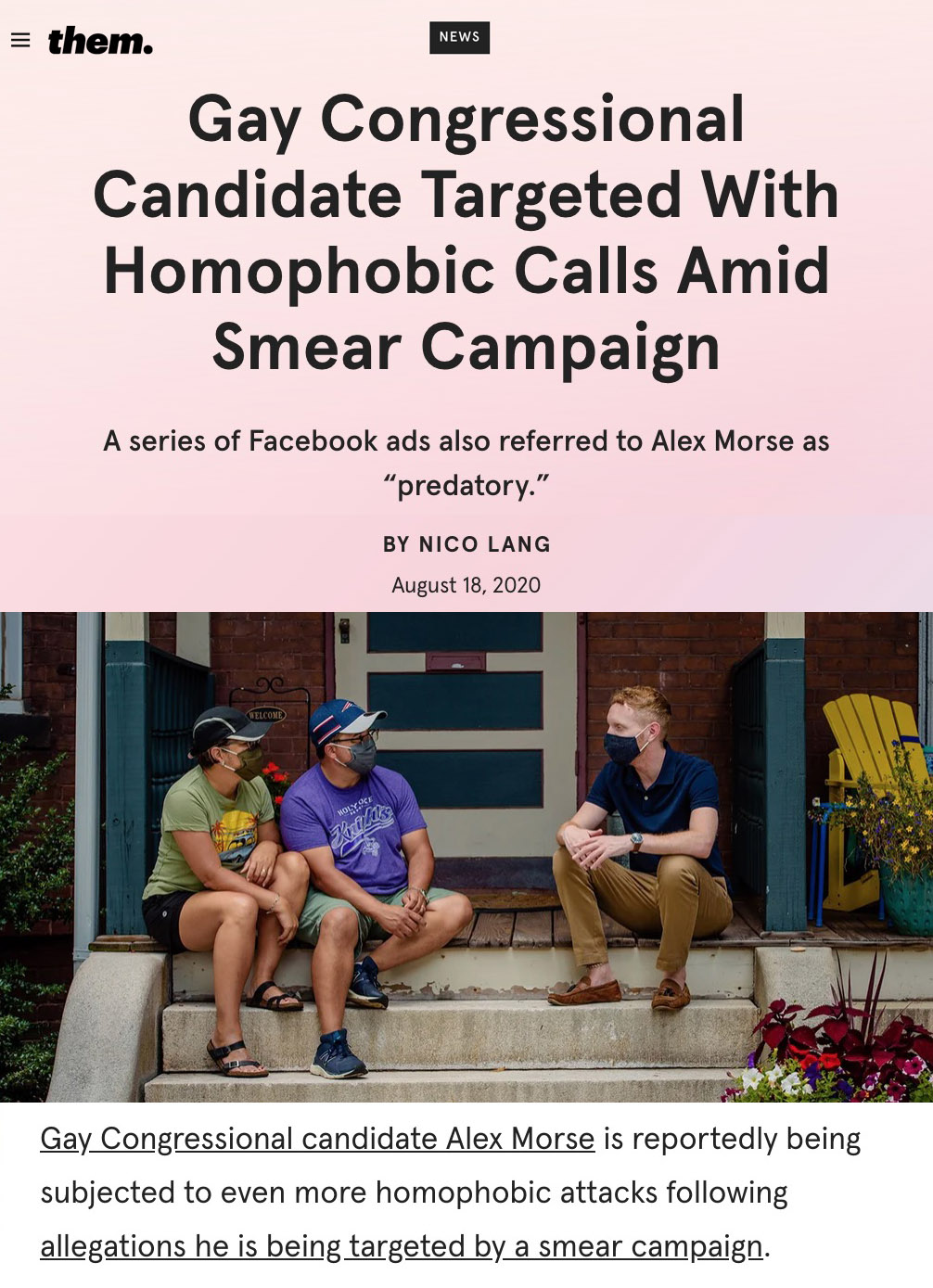
Nico Lang 2020 - Gay Congressional Candidate Morse Targeted With Smear Campaign

Nico Lang 2020 - Gay Congressional Candidate Morse Targeted With Smear Campaign
Grassley, who was under bombardment from anti-health-care ads paid for by the Koch network, made clear he would not provide bipartisan support. Jane Mayer 2016
Dark Money
Rare is the congressman who is never threatened by the power of the lobbies. Some of these same groups control or exert an influence on many thousands of organized votes. It is well recognized that in some district where their strength is heavily concentrated they can easily make or break a legislator, or would-be legislator. It is for this reason that legislators from areas strongly manned with a certain type of economic interest cannot ignore the interest’s lobby agent with impunity, but rather must treat these lobbyists with some deference. A legislator who shows little interest in the counsels of the interest’s lobbyist may be sure of receiving certain attentions from the home district. When the lobbyist reports back that the Congressman’s attitude is lacking, the harassed legislator finds himself flooded with telegrams, letters, and phone calls, all devoted to showing him the error of his ways and pointing out the possible dire consequences of his attitude.John Grattan Metz 1956
The Lobby - The Third House
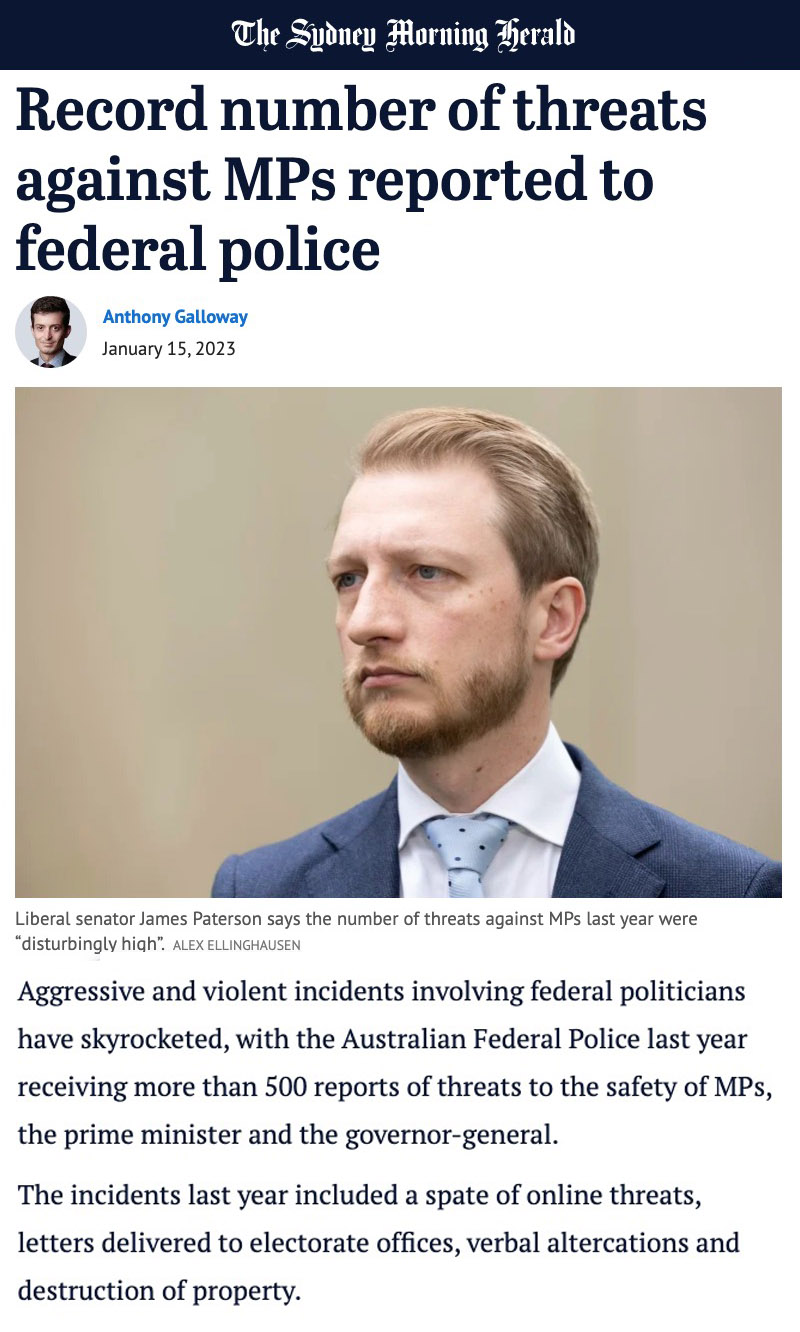
Anthony Galloway 2023 - Record number of threats against MPs

Anthony Galloway 2023 - Record number of threats against MPs
The efforts of congress to regulate the efforts and methods of the lobbyists has resulted from its fear of the lobbies.John Grattan Metz 1956
The Lobby - The Third House
To make the anticipated attack ads, Koch's Sean Noble again chose Larry McCarthy, the veteran media consultant who was known for his ability to distill a complicated subject into a simple, potent, and usually negative symbol. McCarthy had a reputation for being a particularly shrewd consumer of O, or opposition research on the rival candidates he was targeting. He was an old hand at making disreputable ads for “outside” groups that wanted to be seen as unrelated to the candidates for reasons of legal and political hygiene. By saying the ads were “independent expenditures,” candidates got deniability. The Willie Horton ad, for instance, had been paid for by an “outside” group run by the right-wing operative who founded Citizens United, Floyd Brown. It was the same group that later made the film attacking Hillary Clinton and that gave its name to the corporate speech test case.Jane Mayer 2016
Dark Money
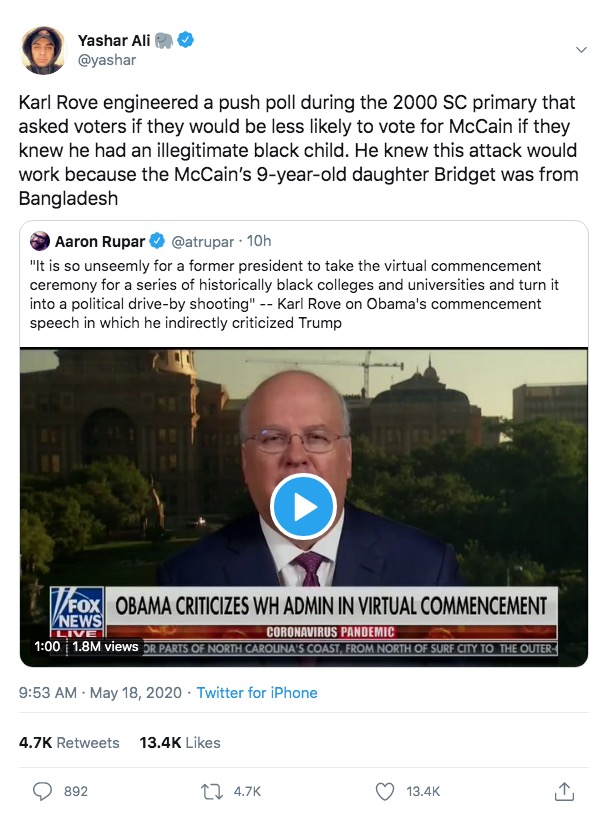
Yasha Ali 2020 - Push Polls via Twitter

Yasha Ali 2020 - Push Polls via Twitter
Michael Mann contended that “the fossil fuel industry is an oligarchy.” Some might dispute that American oil, gas, and coal magnates met the dictionary definition of a small, privileged group that effectively rules over the majority. But it was indisputable that they funded and helped orchestrate a series of vitriolic personal attacks that would threaten Mann’s livelihood, derail climate legislation, and alter the course of the Obama presidency.Jane Mayer 2016
Dark Money
Rauner and his wealthy allies are trying to use their millions to tip the scales this year by heavily funding challengers in key races.Dan Petrella 2016
Election will test power of incumbency
An array of liberal Internet activists is urging Democrats to vastly expand the 2006 congressional battlefield by recruiting and funding challengers in dozens of districts that have been virtually conceded to the GOP, like the one represented by Pitts. Those calls are drawing new energy from Democrat Paul Hackett’s narrow defeat this month in a special election in an Ohio district where Republicans usually romp. Rep. Rahm Emanuel of Illinois, chairman of the Democratic Congressional Campaign Committee, has responded to the pressure from liberal activists by saying he intends next year to fund Democratic challengers for 50 Republican-held seats, about double the number the campaign committee backed in 2004.Ronald Brownstein 2005
Campaign Battlefield May Grow
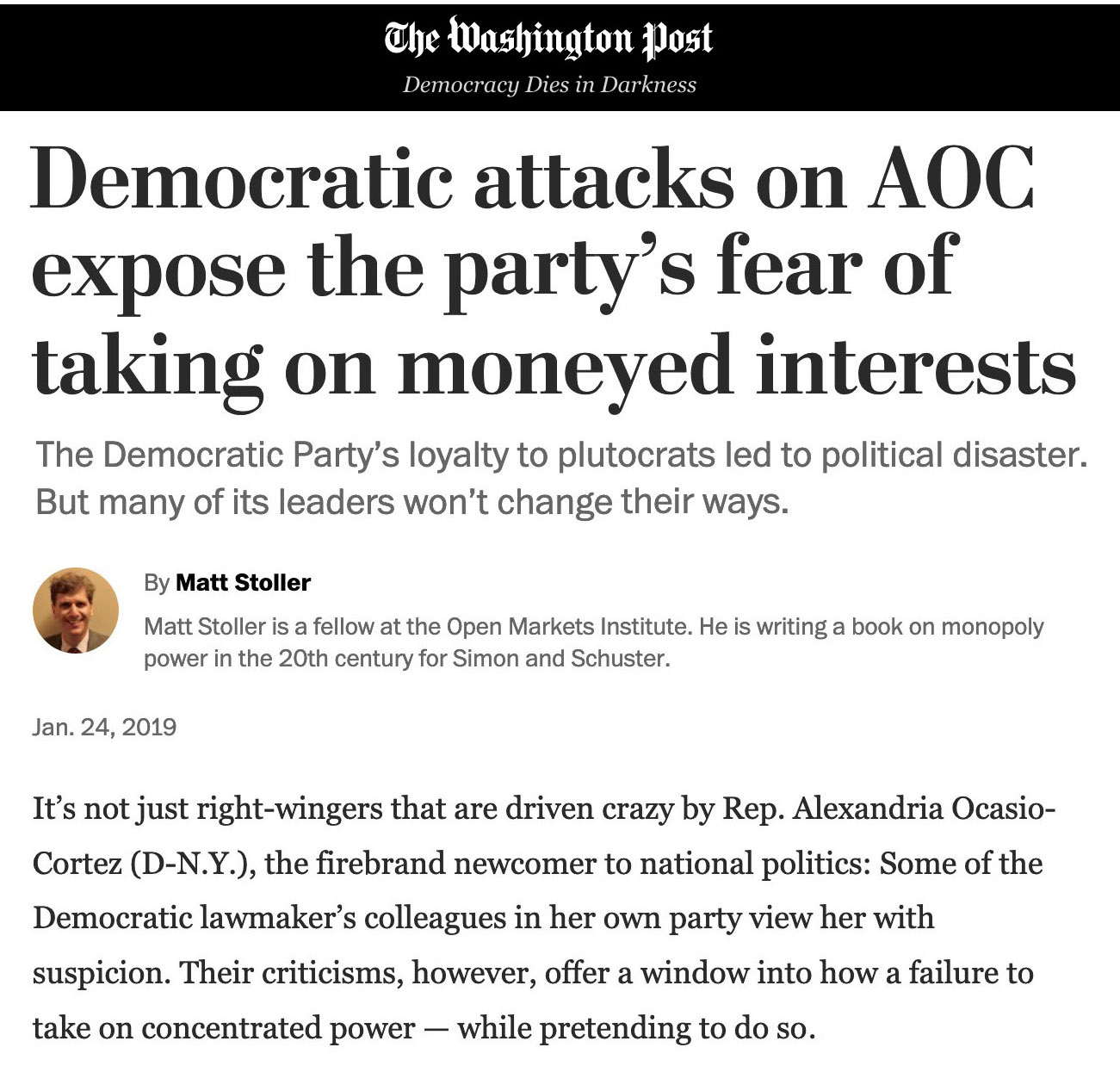
Matt Stoller 2019 - Fear of Moneyed Interests

Matt Stoller 2019 - Fear of Moneyed Interests
Put bluntly, candidates attack out of fear: fear that the opposition will throw the first punch, fear that they will appear weak if they don’t respond in kind. In politics the best defense is a strong offense, and negative advertising is the most expedient way to fend off the opposition’s attacks.Stephen Ansolabehere & Shanto Iyengar 1995
Going Negative
One of the most controversial PACs is NCPAC, which uses… negative advertising to defeat liberal incumbents. “Our goal is a conservative Senate, and this is the best way to get it,” says NCPAC’s chairman, John T. “Terry” Dolan, of his organization’s decision to advocate defeat of an incumbent without openly promoting any opponent. NCPAC’s tactics have been hailed by some as an effective use of legal campaign practices, but castigated by others as Machiavellian and dishonest. Regardless of whose perception is right, the group’s tactics have caught the attention of the political world. In 1980 NCPAC targeted six liberal Democratic senators; four of them were defeated.Congressional Quarterly 1982
The Washington Lobby
The corridors were thronged with students and graduates organized by legislative districts to threaten with punishment at the polls any legislator who failed to accede to their wishes... The clear merit of the position in favor of maintenance of high standards...almost went down before the intensity and the violence of an organized onslaught, conducted largely by methods of terrorism under the cloak of opening the door of opportunity to the poor man.Henry Parkman, JR 1938
Lobbies and Pressure Groups: A Legislator's Point of View
But then another election loomed, and the Teachers’ Lobby, tested by the struggle and wise from experience, brought up their big guns. They went directly into the election districts. When they could, they changed the prospective vote of a legislator by the threat of opposition by a qualified candidate in the primary; where they could not do that, they went to the other party and supported the candidate in return for his pledged support of repeal. The upshot was the change of a few crucial votes. The lobbyists had adopted the last and most powerful weapon in the arsenal of the lobby, the fear of reprisal.Henry Parkman, JR 1938
Lobbies and Pressure Groups: A Legislator's Point of View
It is often said that what is driving the chase for money on the part of candidates for Congress is the ever-increasing cost of campaigning, but that gets it backward. [Instead] a candidate feels compelled to spend so much money because his opponent is spending so much, or might spend so much, or groups intent on his defeat might spend so much.Elizabeth Drew 1983
Politics and money: the new road to corruption
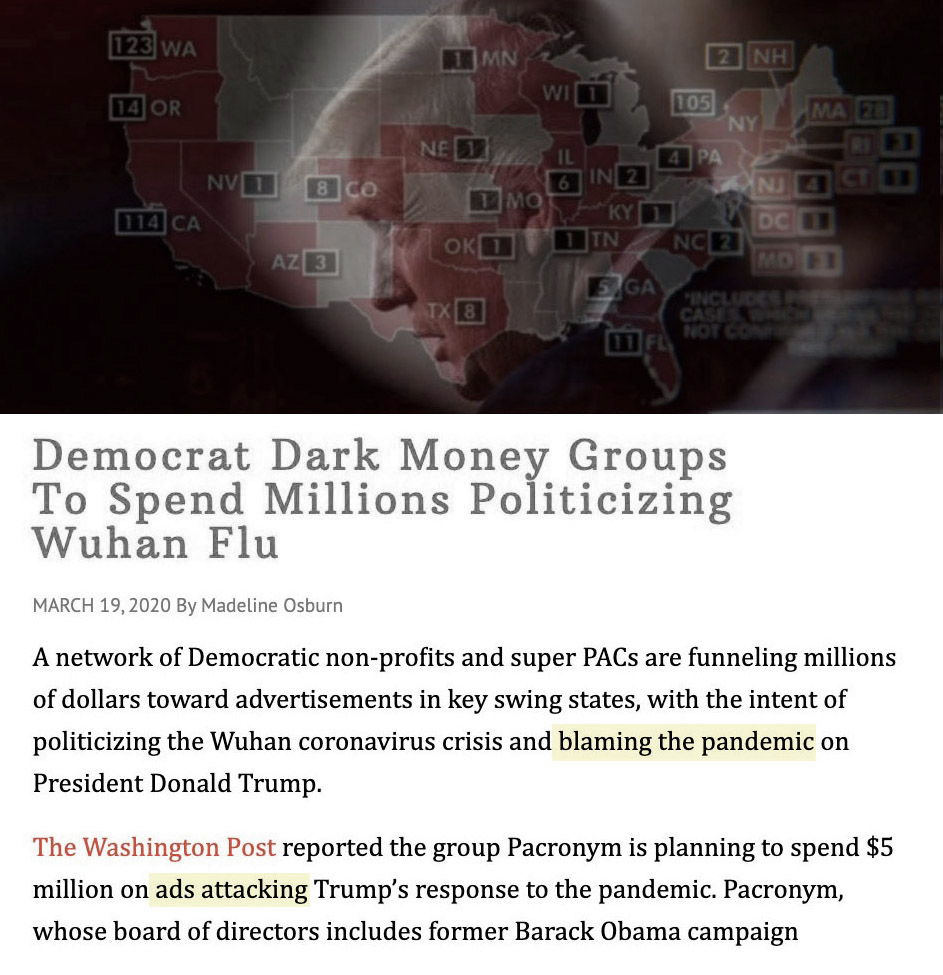
Osburn 2020 - Democrat Dark Money Attack Ads

Osburn 2020 - Democrat Dark Money Attack Ads
There is one singular new development in American politics that violates fair play, and that is negative advertising, the paid commercial, usually on TV or radio that is a sneak attack on a decent person. Not only is the negative ad the sleaziest new element in politics, it may also be the most dangerous. The first victim is the person under attack . But the greater victim is the integrity and credibility of the political system itself. For the most part, these ads are inspired and created not by practicing politicians, but by professional advertisers, media experts, pollsters, producers of television and radio commercials. Most of the things you see and hear on these commercials are dishonest and downright mean and dirty. We have all seen them, the cartoon, the simplistic image, the professional announcer who sounds like a movieland Moses condemning someone for votes on Social Security or school prayer or the debt ceiling or any other public issue. I believe that if a candidate for public office has something bad to say about his opponent, he should say it himself on the platform, on radio, on television , or wherever. He should have the courage to stand up and make the criticism himself and let the voters decide which of the two is to be believed. No candidate for public office should be permitted to hide behind the paid political announcer as if he had nothing to do with the commercial. The problem goes beyond elections, to the process of governing. Time after time when I was leader in the Senate and was trying to round up votes on a controversial issue, I would have senators say to me, “Howard, I would like to vote with you, but they would kill me with negative ads the next time I run.” I am confident that members of this committee and of Congress will find the most effective constitutional way to prevent political candidates from hiding behind negative commercial ads. The principle is a sound one. I supported it when I was in the Senate and I support it now.Senate Majority Leader Howard Baker 1985
Clean Campaign Act
In the 1996 race for the Republican presidential nomination, Steve Forbes, who was financing his own campaign, blanketed the early Iowa and New Hampshire contests with negative commercials about Bob Dole. This behavior was not well received within the party, and four years later, when Forbes ran again, a group called the Republican Leadership Council sponsored ads in which a woman says Forbes “spent all his money tearing down his opponents... Someone needs to tell Steve Forbes that if he doesn’t have anything nice to say, don’t say anything at all.”Stephen Hess 2000
The Little Book of Campaign Etiquette
There are some who feel that pro-Israel activism on college campuses can cross the line from advocacy to outright intimidation. One highly publicized accusation comes from former US President Jimmy Carter, who complained of great difficulty in gaining access to a number of universities to discuss his new book Palestine Peace Not Apartheid which criticized certain Israeli policies.President Jimmy Carter 2007
Palestine Peace Not Apartheid
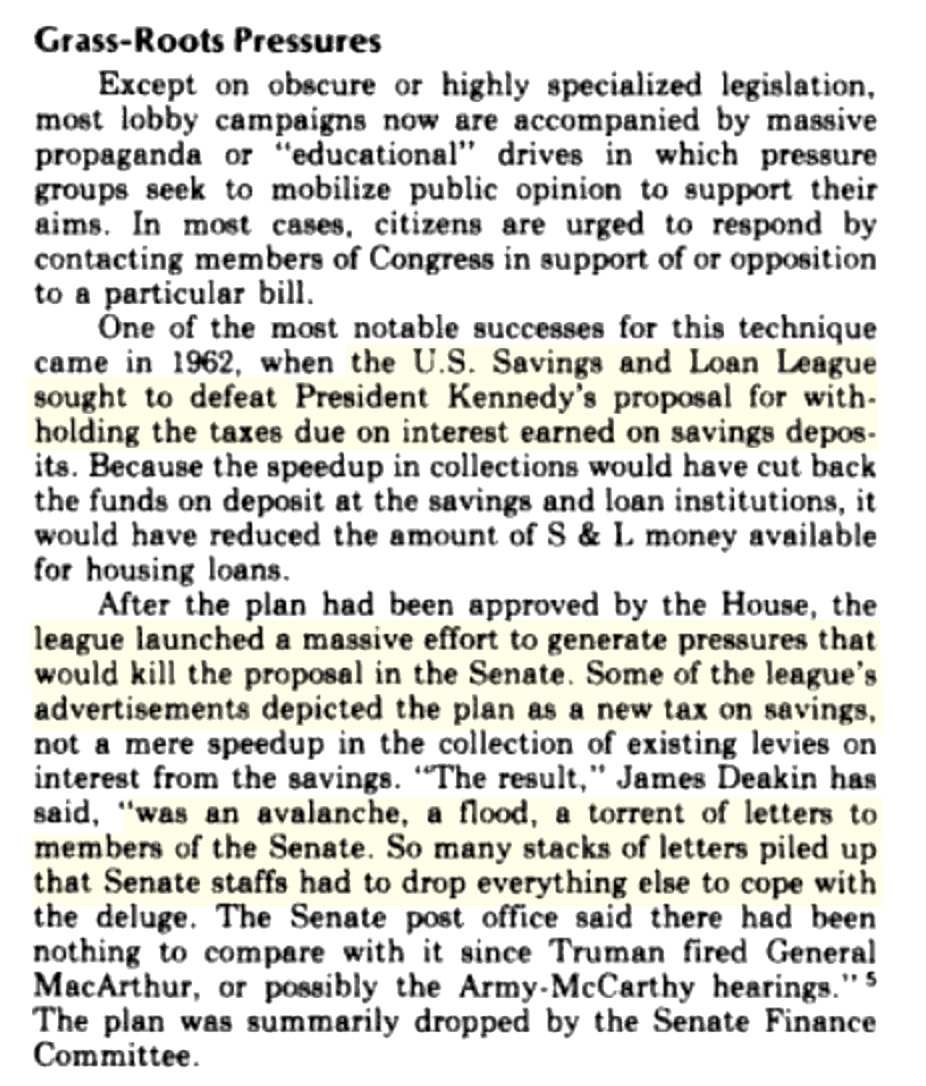
The Washington Lobby - CQ Press 1979

The Washington Lobby - CQ Press 1979
Many scholars have studied the use of negative advertising in campaigns and what motivates candidates and groups to run negative ads. Recent elections, however, have seen a dramatic increase in advertising by outside groups, particularly by so-called “dark-money” organizations, which do not disclose their donor information. This study questions whether dark-money groups are more likely to engage in negative advertising. By examining the more than 13,000 outside-group expenditures from the 2010 through the 2014 congressional elections, it finds that outside groups are, indeed, more likely to use negative ads when they conceal their donor information. Additionally, while liberal and conservative groups are roughly equally likely to use negative ads, conservative groups are most likely to use anonymously funded negative advertisements. This could be, at least in part, due to the support conservative groups receive from organized businesses, which generally seek to conceal their political activities from public scrutiny.Daniel Chand 2017
“Dark Money” and “Dirty Politics”: Are anonymous ads more negative?
A candidate enteering politics now must systematically make the rounds of the interest groups and win their approval...once there, he mus tworry about maintaining the group’s support or about finding other groups to support him or about casting some vote that might cause monetary retaliation.Elizabeth Drew 1983
Politics and money: the new road to corruption
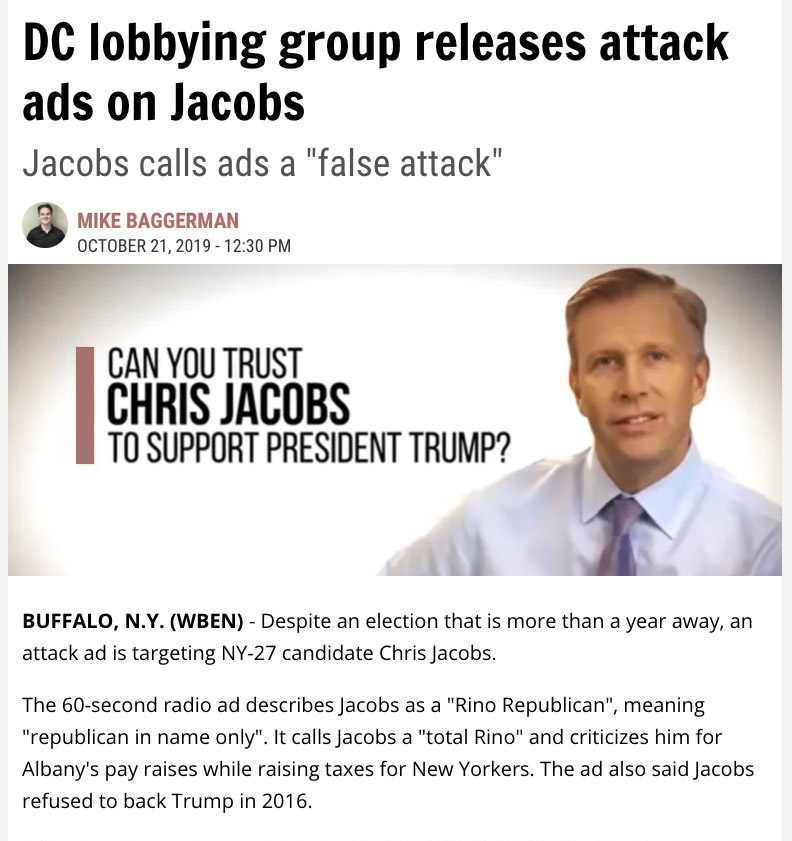
DC lobbying group releases attack ads on Jacobs

DC lobbying group releases attack ads on Jacobs
In between periods an election is held between the incumbent and her challenger. An interest group finances the campaign spending of each politician. The incumbent’s probability of re-election increases along with a rise in the size of the donation he receives from the interest group, and decreases along with a rise in the size of the donation her challenger receives. Formally, let di denote the interest group’s donation to the incumbent, and let dc denote the interest group’s donation to the challenger. The incumbent’s probability of re-election is given by a function r ( di, dc), where r is increasing in di, and decreasing in dc. The interest group determines how much to give after the first-period policy is selected.William Outhwaite & Stephen Turner 2007
The SAGE Handbook of Social Science Methodology
In the 2010 Citizens United case, the court ruled that it was unconstitutional to prevent corporations or organizations from supporting or opposing particular candidates. Al-Shabaka 2018
Dark Money: Palestine, Mega Donors, and the 2018 Midterm Elections
Both the Democratic and Republican Congressional campaign committees have prepared last-minute negative tactics for use in key contests for the House of Representatives. While lobbing these political grenades in the final days before the election, they will also be hunkering in the trenches to escape potentially lethal return fire. Democrats say the Republicans “market-tested” some of the negative tactics in 1984. “In the final days of the 1984 campaign, many House Democrats, even with ‘safe’ seats, were hit with vicious and often illegal attacks” said a letter sent to House Democratic candidates. “We should expect more of the same. In fact, it has already started.” Martin Tolchin 1986
Martin Tolchin 1986 - Committees Prepare Negative Tactics
Death Threats Aren’t Bribery 2018
Note: According to the House Sergeant of Arms Office, when it comes to threats of physical violence against members of Congress, the numbers are skyrocketing. So far this year (August 1st, 2018), there have been more than 1,600 confirmed threats against members of the House. Last year, there were nearly 2,000 reported incidents, and 902 in 2016. The Senate does not publish these numbers. Full Report
Death Threats Aren’t Bribery 2018
Note: According to the House Sergeant of Arms Office, when it comes to threats of physical violence against members of Congress, the numbers are skyrocketing. So far this year (August 1st, 2018), there have been more than 1,600 confirmed threats against members of the House. Last year, there were nearly 2,000 reported incidents, and 902 in 2016. The Senate does not publish these numbers. Full Report
When Ralph Nader began his crusade against the automobile industry that ultimately resulted in the creation of the National Highway Traffic Safety Administration, General Motors did not have a single lobbyist in Washington. Rather than make a public argument against regulation, or hire a bunch of lobbyists to make their case in Washington, the company tried to discredit Nader personally. It sent private detectives to spy on him, made threatening phone calls, and sent young women (probably prostitutes) to entrap him while he shopped for groceries at the Safeway supermarket.Lee Drutman 2015
The Business of America is LobbyingNote: Taken from a book on lobbying, this citation might appear strange as Ralph Nader is not an elected official. But there are a handful of things one can note here. 1. GM’s response to the threat of Nader was not to hire lobbyists - but this makes sense because in the 1960s, before the sunshine laws, few organizations would hire lobbyists as they had little to no effect. 2. GM did not try to bribe Nader either (because bribery generally doesn’t work and it can backfire). 3. Instead the way to protect their interest was to take out those who opposed them, so they invested heavily in an attempt to discredit and threaten Nader.
The vaunted nose-counting and arm-twisting machine of the legendary Republican leader Tom DeLay.Jonathan Allen 2016
The Moment That Will Define Mike Pence
The penalties for disagreement with large and vocal constituencies have become so extreme that many senators and congressmen shrink from the very idea of compromise. This cuts against the grain of the parliamentary process and is in direct conflict with the constitutional tradition of two hundred years.Senate Majority Leader Howard Baker 1980
No Margin For ErrorNote: Baker detested anonymous attack ads and negative mailings on hot button issues. This citation explains why he claims that congressmen ‘shrink’ in fear from standing hard on the issues: “The abomination of American politics is the high-pressure use of direct mail to raise funds or to foster special interests. I would like to abolish that kind of direct mail but it would be unconstitutional. I think it is the bane of political life, and I despise it. I think it has a distorting effect and it has produced the single-issue special-interest lobbies that we now find roaring through the corridors of the Capitol in Washington and in every legislature throughout the country. Some of them have good purposes, but they are at variance with the idea of a broad-based political system based on national and state parties that appeal to a diversity of broad-based interests.”
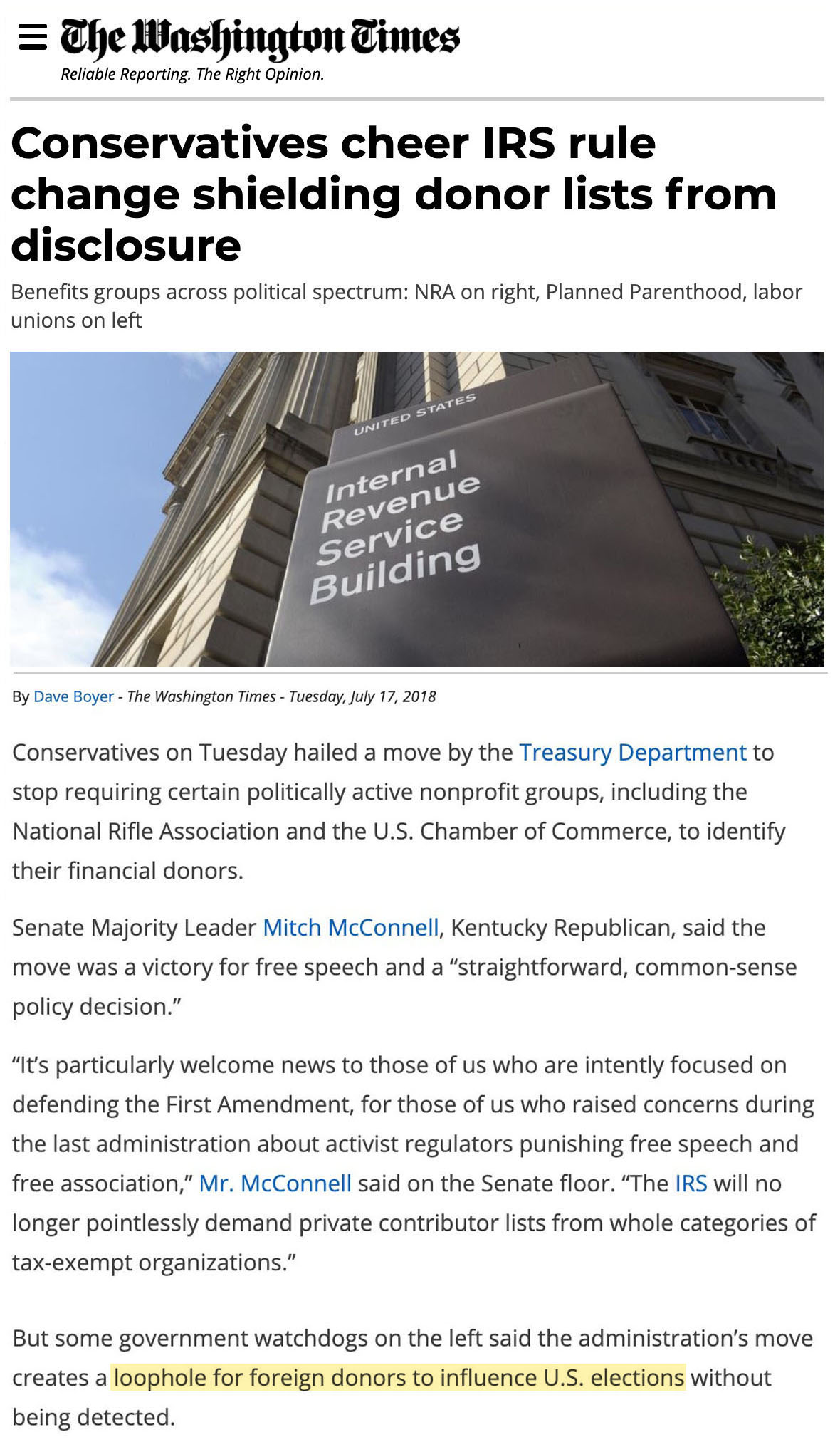
Dave Boyer 2018 - Shielding donors
Note: The more anonymous the donor, the more negative the ads they fund. The numbers scream this, as 95% of dark money advertising is negative. Thus by shielding the funders we expect far more attack ads, even from foreign entities.

Dave Boyer 2018 - Shielding donors
“What are you complaining about? They’re spending more against us than they are against you!”Sheldon Whitehouse 2017
Captured
The cavalry didn’t show up because the fear of lobbyists turning off the money spigot is greater than the fear of constituents’ anger.Charita Goshay 2019
‘We the People’ must save ourselves
In 1984, AIPAC affiliates decided that Senator Charles Percy, an Illinois Republican, was unfriendly to Israel. In the next election, Paul Simon, a liberal Democrat, won Percy’s seat. E[xecutive director of the pro-Israel lobby Tom Dine] said at the time, “Jews in America, from coast to coast, gathered to oust Percy. And American politicians—those who hold public positions now, and those who aspire—got the message.”Connie Brook 2014
Friends of Israel (New Yorker Magazine)
The American Medical Association worked hard to defeat advocates of ‘socialized medicine’ or even Medicare. More significant, the AFL-CIO made contributions in cash and kind to candidates it favoured, and vociferously advocated the defeat of legislators who, in its view, had the worst voting records in Congress.Graham Wilson 1981
Interest Groups in the United States
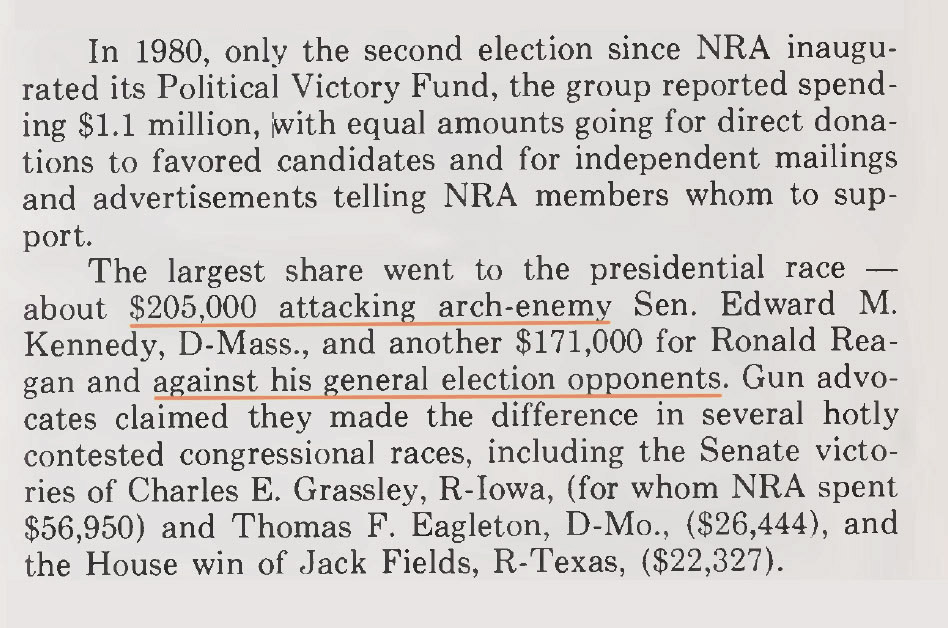
NRA Brubery in Presidential Election - CQ Quarterly 1982

NRA Brubery in Presidential Election - CQ Quarterly 1982
The U.S. Chamber of Commerce is the nation’s largest lobbying organization for businesses and it ranks as the top-spending dark money group since Citizens United. It spent approximately $130 million on political advertisements to promote and attack candidates between January 2010 and December 2016, in addition to the direct political contributions it made to candidates from its political action committee. That’s about $1 of every $6 spent on political ads by all dark money groups during this time.William Gray 2020
Dark Money Illuminated
In 2015, former US Representative, Barney Frank tells the Washington Post that intimidation and fear are important parts of the political process.
In 2015, former US Representative, Barney Frank tells the Washington Post that intimidation and fear are important parts of the political process.
Lyndon Johnson’s 1964 campaign spent a lot of money on television advertising and broadcast, according to one study, more negative spots than any campaign until that time. It released a blistering series of negative television ads designed to eviscerate Goldwater in the eyes of Democrats, independents, and nervous Republicans. The most famous of these ads went on the air on September 7, 1964. It began with a girl picking the petals off a daisy. Viewers watched her counting the petals to ten; then they heard a male voice counting down from ten to one. The camera zoomed in on one of the girl’s eyes, and a nuclear explosion filled the screen. President Johnson, in voice-over, said, “These are the stakes- to make a world in which all of God’s children can live, or to go into the dark. We must either love each other, or we must die. Another male voice said, “Vote for President Johnson on November 3. The stakes are too high for you to stay home.”
The “Daisy” spot, though it aired only once, remains the most famous of the campaign, but there were other tough-minded ads that conveyed the perception that Goldwater’s domestic policy ideas were just as radical and dangerous as his foreign policies. “Keep fear of Goldwater as unstable, impulsive, reckless in public’s mind,” Jack Valenti had advised Johnson. “This is our strongest asset. Don’t let up on the possibility of Goldwater dismantling Federal government- specific hits on Social Security, TVA, farm subsidies.”5 2 In one ad, viewers watched Ku Klux Klan members marching in their regalia, burning crosses. The narrator said, “‘We represent the majority of the people in Alabama who hate niggerism, Catholicism, Judaism, and all the isms of the whole world.’ So said Robert Creel of the Alabama Ku Klux Klan. He also said, ‘I like Barry Goldwater. He needs our help.”‘53 Another ad reviewed a series of statements Goldwater had made about Social Security. The camera focused on a Social Security card, the iconic image of New Deal liberalism, and viewers were told, “On at least seven different occasions, Barry Goldwater has said that he would drastically change the social security system . . . even his running mate, William Miller, admits that Barry Goldwater’s voluntary plan would wreck your social security.” The camera then zoomed in on a pair of hands ripping the card apart, followed by a video of Lyndon Johnson delivering a speech in which he warned, “Too many have worked too long and too hard to see this threatened now by policies which promise to undo all that we have done together over all these years.”Julian Zelizer 2015
Fierce Urgency of Now
But an effort to limit excessive powers granted government agents in the USA Patriot Act failed Thursday only because of what is becoming a favorite tactic of the House Republican leadership: Keeping open a roll-call vote beyond the traditional 15 minutes when members vote in ways the leadership doesn’t like. The leadership then descends to the House floor and twists members’ arms to abruptly change their votes. Rep. Tom Lantos, D-San Mateo, rightly called what happened Thursday a “disgrace that mocks the legislative process.” House Minority Leader Nancy Pelosi, D-S.F., called the vote-switching tactics “thoroughly un-American.” It escapes us how any legislator can with a straight face switch his or her vote on a matter of this importance in response to blatant political pressure on the House floor -- and heaven knows what other inducements. (The House ethics committee is still investigating a bribery charge arising from similar tactics during last December’s vote on the Medicare drug bill.) Pelosi is correct in calling for a Bill of Rights in Congress that would specify that “no vote shall be held open in order to manipulate the outcome.” Members should not be allowed to change their votes after they have been cast under normal roll-call rules simply just because party leaders tell them to do so.SF Gate 2004
Arm Twisting in Congress
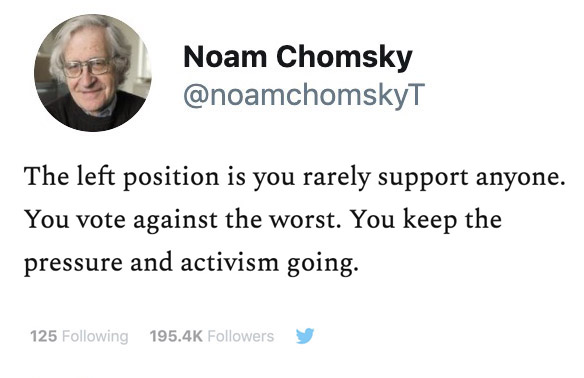
Noam Chomsky 2020 - Liberals Don’t Support

Noam Chomsky 2020 - Liberals Don’t Support
During the 1964 presidential campaign, the Democratic National Committee made unprecedented use of television spots to convey the message that… Goldwater was a dangerous extremist “who would ruin this country and our future,” as Jack Valenti put it. The DNC had signed a contract with the advertising firm Doyle Dane Bernbach, which had created many famous campaigns, among them “Think Small” for Volkswagen.Julian Zelizer 2015
Fierce Urgency of Now
When a company or industry association needs to get something done, and the political heat is unmanageable, the Chamber of Commerce can step in and take the blows on its behalf. By doing their political and lobbying spending through the Chamber, beloved brand names are never sullied with the causes they finance, whether it’s defeating climate change action, involving themselves in dark, negative electoral campaigning, or diluting financial reform.Alyssa Katz 2015
Influence Machine: Chamber of Commerce and Corporate Capture
Rep. Homan tried to add their little open standards boost to SB 1974 as quietly as possible. They wanted the modified bill to at least get through its first committee approval before anyone spotted what they had done. But Microsoft’s lobbyists were on the ball and spotted it almost immediately. Two legislative employees told Linux.com that the Microsoft lobbyists implied that elected representatives who voted against Microsoft’s interests might have a little more trouble raising campaign funds than they would if they helped the IT giant achieve its goals.Robin Miller 2007
Microsoft’s ‘Men In Black’ Kill Open Standards Legislation
An angry cohort of Americans, wealthy retirees primarily, objected to paying for the new benefits the law provided. Some already had catastrophic health insurance and resented having to pay higher Medicare premiums - in some cases as high as $800 per year - to extend this insurance to those without it. These enraged seniors took to the streets and hounded members of Congress who took part in writing the bill. In one memorable encounter, a frothing mob hurled eggs at Dan Rostenkowski, then the chairman of the Ways and Means Committee, which drafted the law, and beat the roof of his car with wooden signs as if it was a snare drum. This vocal cabal, representing a fraction of all those covered by the new law, forced Congress to undo in less than one year the single-largest expansion of the Medicare system since its enactment in 1965. It was a stunning and altogether regrettable display of how willing Congress is to respond to the loudest and most aggressive petitioners. Rep. Timothy J. Penny 1996
Common Cents
Is it appropriate to reference campaign contributions your lobbying organization gave an elected official when trying to influence their vote? Apparently a representative of the Alabama Education Association (AEA – teachers union) thinks it is... Acceptable lobbying practices? Or strong arm tactics?Cliff Sims 2013
AEA Strong Arm Tactics on Display
Although concern about the pernicious influence of moneyed lobbyists arose in America before the Civil War, a real fear of lobbyists and their money came only with the rise of big business in the late nineteenth century.Kenneth H. Winn 1998
Reform and the Erosion of Representative Government
Fear has a way of bending us. Late in the evening on day four of the trial I saw it, just 10 feet across the aisle from my seat at Desk 88, when Mr. Schiff told the Senate: “CBS News reported last night that a Trump confidant said that Republican senators were warned, ‘Vote against the president and your head will be on a pike.’”
For the stay-in-office-at-all-cost representatives and senators, fear is the motivator. They are afraid that Mr. Trump might give them a nickname like “Low Energy Jeb” and “Lyin’ Ted,” or that he might tweet about their disloyalty. Or — worst of all — that he might come to their state to campaign against them in the Republican primary. They worry: “Will the hosts on Fox attack me?” “Will the mouthpieces on talk radio go after me?”“Will the Twitter trolls turn their followers against me?” My colleagues know they all just might. There’s an old Russian proverb: The tallest blade of grass is the first cut by the scythe. Senator Sherrod Brown 2020
In Private, Republicans Admit They Acquitted Trump Out of Fear
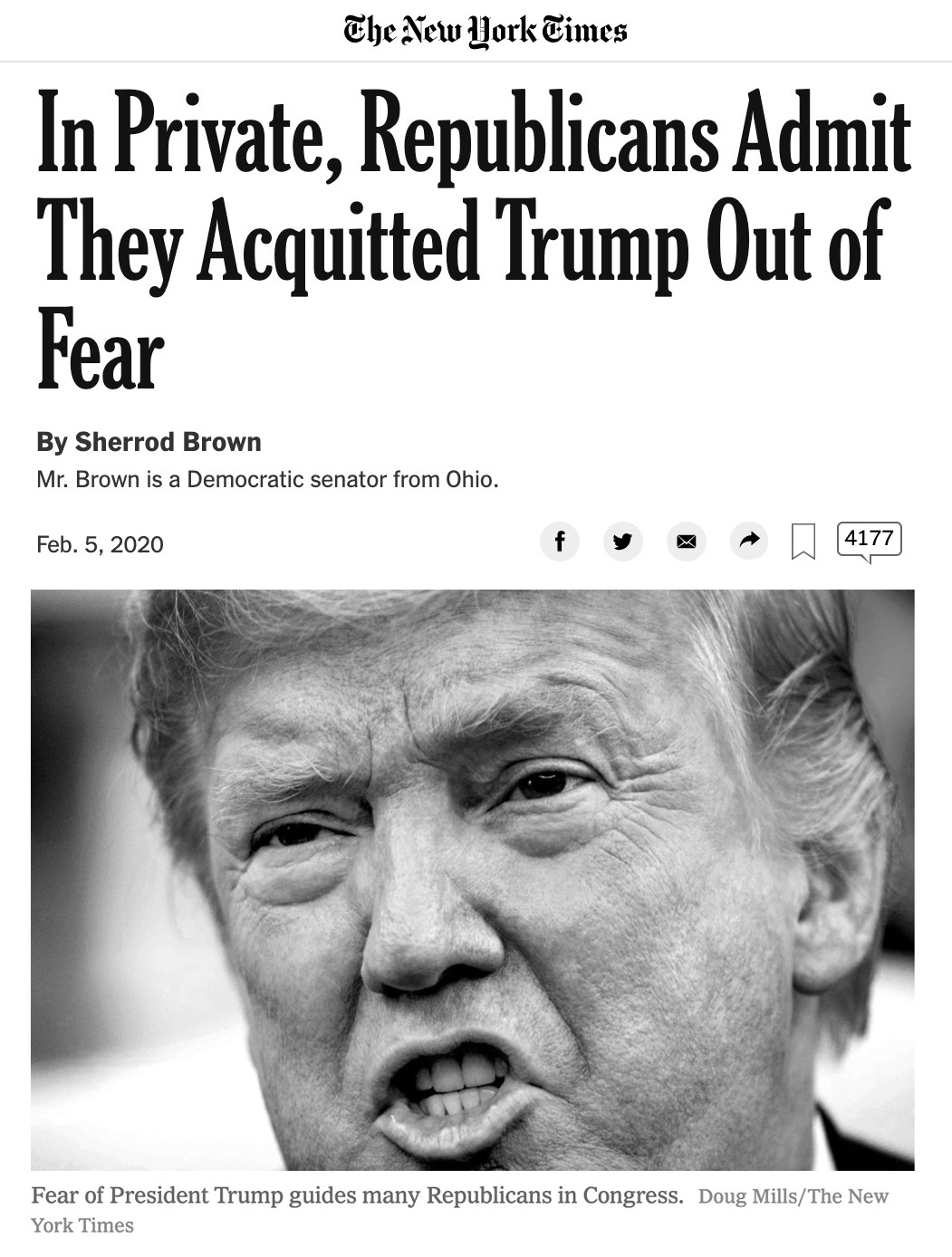
Peter Wade 2020 - ‘Vote Against the President and Your Head Will Be on a Pike’

Peter Wade 2020 - ‘Vote Against the President and Your Head Will Be on a Pike’
Microsoft is bamboozling politicians using corruptible media, not just through lobbyists who issue threats. Its boosters (in ‘news’ sites) attack the competition. “A day or two before we were going to give the speech, a couple of backbench legislators called the office – they said Microsoft had called them saying if we went ahead with the speech on open standards, open architecture and open source, they would cut spending or maybe close research and development centres in the constituencies of the those they had called.”Roy Schestowitz 2015
Microsoft’s Secret Lobbying, Bullying, and the Long History of Blackmailing Politicians Around the World
Socrates says he has often heard Charmides give excellent advice to public leaders in private conversation. Charmides replies that “a private conversation is a very different thing from a crowded debate.”I.F. Stone 1989
The Trial of SocratesNote: This conversation comes from Xenophon and not Plato and it highlights Socrates' clear ignorance to the pressures of working in the sunlight. The conversation continues as follows. SOCRATES: “In your intercourse with public men. Whenever they take counsel with you, I find that you give excellent advice, and whenever they make a mistake, your criticism is sound.” CHARMIDES: “A private conversation is a very different thing from a crowded debate, Socrates.” SOCRATES: “But, you know, a man who is good at figures counts as well in a crowd as in solitude; and those who play the harp best in private excel no less in a crowd.” CHARMIDES “But surely you see that bashfulness and timidity come natural to a man, and affect him far more powerfully in the presence of a multitude than in private society?”
“It’s clear the negative ads are what’s keeping Romney alive,” said Nelson Warfield... His campaign has deployed every tactic in the negative-campaign playbook. It has issued Twitter messages poking fun at Mr. Gingrich’s penchant for rhetorical excess . It created digital slogans and a letterhead disparaging Mr. Santorum’s long career in government (“Rick Went to Washington,” they read, “and he never came back”). It created dozens of Web videos denigrating President Obama’s economic leadership (“Obama isn’t working”). And it benefited from the advertising onslaught unleashed against Mr. Romney’s rivals by a “super PAC” backing him.Michael Barbaro & Jeremy Peters 2012
Romney Reopens Whatever-It-Takes Playbook
In 2002, when he ran for governor of Massachusetts, Mr. Romney vastly outspent his Democratic opponent. His campaign arranged for a man in a chicken costume to trail Ms. O’Brien at campaign stops, to suggest she lacked political courage. It questioned her husband’s ties to Enron, for whom he had once been a lobbyist. And it rolled out a memorable television ad that portrayed Ms. O’Brien as a hapless basset hound, asleep on the floor as sinister-looking men walked out of a building with bags of money. She lost the election by a slim margin. “When he ran positive ads, he wasn’t winning.” said Ms. O’Brien.Michael Barbaro & Jeremy Peters 2012
Romney Reopens Whatever-It-Takes Playbook
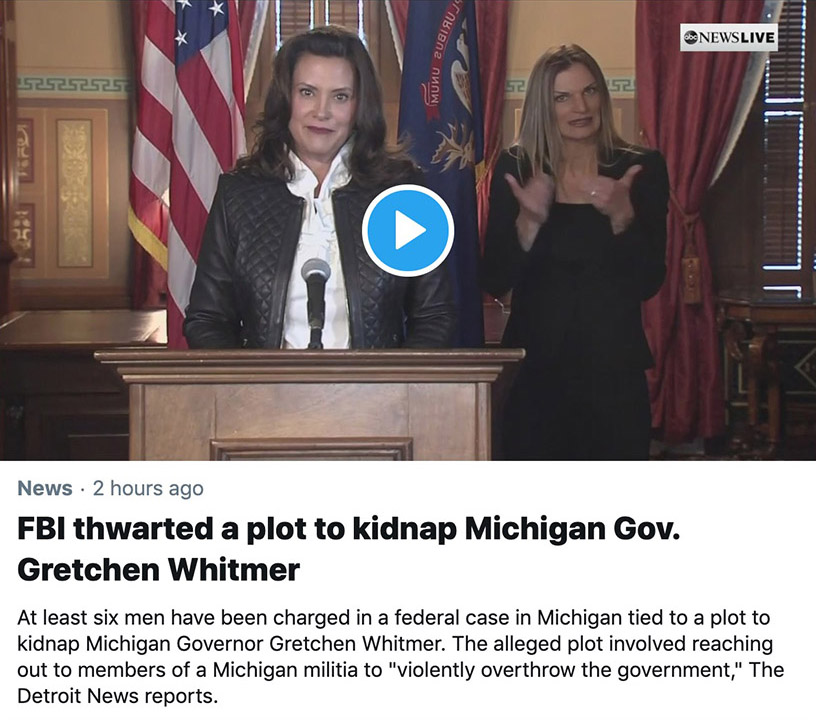
FBI thwarted a plot to kidnap Michigan Gov. Gretchen Whitmer 2020

FBI thwarted a plot to kidnap Michigan Gov. Gretchen Whitmer 2020
The bill made sense to Mr. Neuberger and he endorsed it – just as you would, or I would. It was clearly in the public interest. Poor innocent! The advertisers’ lobby began to teach him the facts of life. Here were no fine questions of public safety and order, but a vested interest threatened with pecuniary loss. The next thing Mr. Neuberger knew, the lobby had got the Signpainters’ Union to denounce the measure and call him an “enemy of labor.” This is a fearsome charge to levy against any legislator. Then came a torrent of letters from “widows and orphans” who would starve if rents from the beneficent billboard companies were cut off. Then telegrams rained in, and editorials in the papers. The legislature ran to cover, and the bill was quashed.Stuart Chase 1945
Democracy Under Pressure (Special Interests vs. The Public Welfare)
Terry Dolan, the director of the National Conservative Political Action Committee (NCPAC, pronounced “nick-pack”), developed political entrepreneurship into a more advanced business form, making a singular contribution to America’s long descent into cynicism and corruption. His innovation was to sell political results – in particular, the destruction of liberal U.S. senators, and in general, the destruction of the campaign-finance rules that limited individual contributions to a specific campaign. Subverting these two simultaneously made for a profitable business model indeed. NCPAC’s trademark was to use terrifying national direct mail solicitations to pay for local TV commercials that, in turn, set new standards for viciousness and mendacity. The model was a runaway success – when Dolan rolled it out during the 1980 elections: NCPAC targeted six Democratic senators from the West and Midwest and knocked off four of them with TV spots accusing them of weakness in the face of the Soviet threat and letters describing all they had “done to ruin America. Each of their Senate votes is like another nail in our nation’s coffin.” The resulting victories made him an overnight sensation, and as his next target Dolan chose a Democrat from Maryland, so that residents of Washington, D.C., might tremble as they saw the nickpack attack come roaring across their own TV sets. Dolan was a leader in that long parade of right-wing bullies whose open contempt for fair play exerts such a fascination over the media. He was cynical about voters, boasting that he could elect Mickey Mouse to the U.S. Senate if he chose. He was cynical about political ethics: Dolan once told a member of Congress to vote his way on a particular legislative measure or face the attack-ad consequences.Thomas Frank 2008
The Wrecking Crew
Attack ads are blanketing Iowa, fueled by millions of dollars from Gingrich’s rivals and a group supporting Mitt Romney. Mailboxes are filling up with anti-Gingrich leaflets.Michael Shear & Jeremy Peters 2011
In Murky Republican Contest, the Clearest Target Is Gingrich
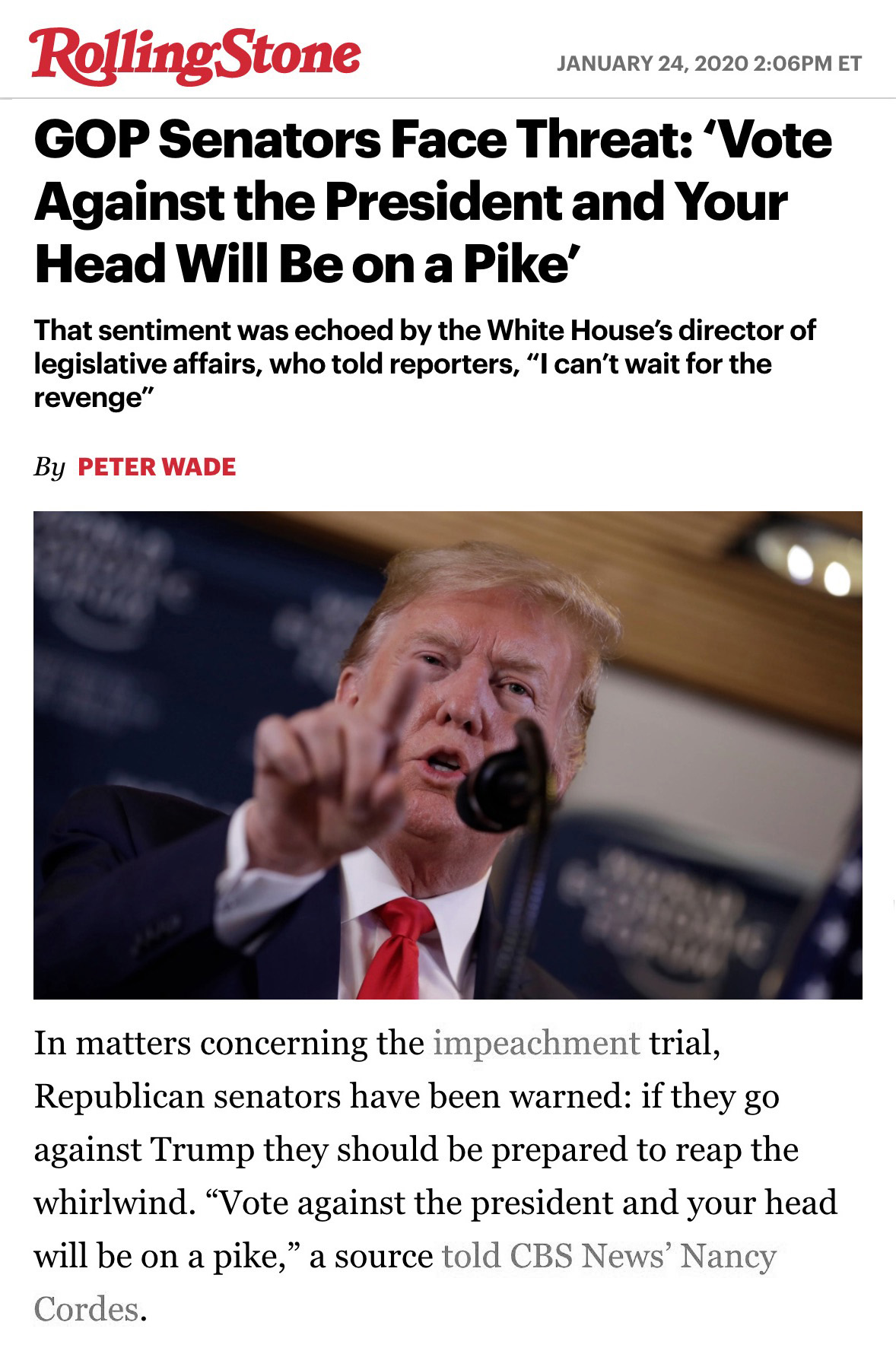
Sherrod Brown 2020 - In Private, Republicans Admit They Acquitted Trump Out of Fear

Sherrod Brown 2020 - In Private, Republicans Admit They Acquitted Trump Out of Fear
Iowans have been shown commercials with a negative message about Mr. Gingrich more than 1,200 times in the last few weeks. The biggest player by far in the state has been Restore Our Future, a “super PAC” supporting Mr. Romney. So far it has spent $2.6 million on television ads depicting Mr. Gingrich as tainted by scandal, soft on illegal immigration and corrupted by decades of work in Washington.Michael Shear & Jeremy Peters 2011
In Murky Republican Contest, the Clearest Target Is Gingrich
The lobbyist rarely has the capacity to exert pressure on congressmen in the sense of coercing them, but he nevertheless can exercise a degree of influence in a roundabout way. The massive, heavily financed grassroots campaign is the trademark of the modern lobbyist, not the cash under the table, “babes in the bedroom” approach. Glenn David Kelly, Jr. 1968
Congress and the Lobbyist
The Democrats produced a scathing report exposing what they called an “audacious” scheme by undisclosed big donors to illegally buy elections in the final moments of the 1996 campaign. It was undertaken by a suspicious shell corporation called Triad Management Services that had paid more than $3 million for unusually harsh attack ads against Democratic candidates in twenty-nine races. More than half of the advertising money came from an obscure nonprofit group whose real source of funds was a mystery, the Economic Education Trust. The Senate committee’s investigators believed that “the ‘trust’ was in fact financed in whole or in part by Charles and David Koch of Wichita, Kansas.Jane Mayer 2016
Dark MoneyNote: Mayer makes a big mistake by labeling attack ads as buying. This confirms the public suspicions of bribery. But there is no bribery here. This is all negative money.
[Television cameras turn] Supreme Court hearings into little more than live rehearsals for primary and general election campaign talking points. And some senators may feel they have little choice...If a senator doesn’t deliver the vengeance they expect here, retribution [from angry voters who seek revenge] may well come in the voting booth.Joe Ferullo 2022
Eliminate television coverage from Supreme Court
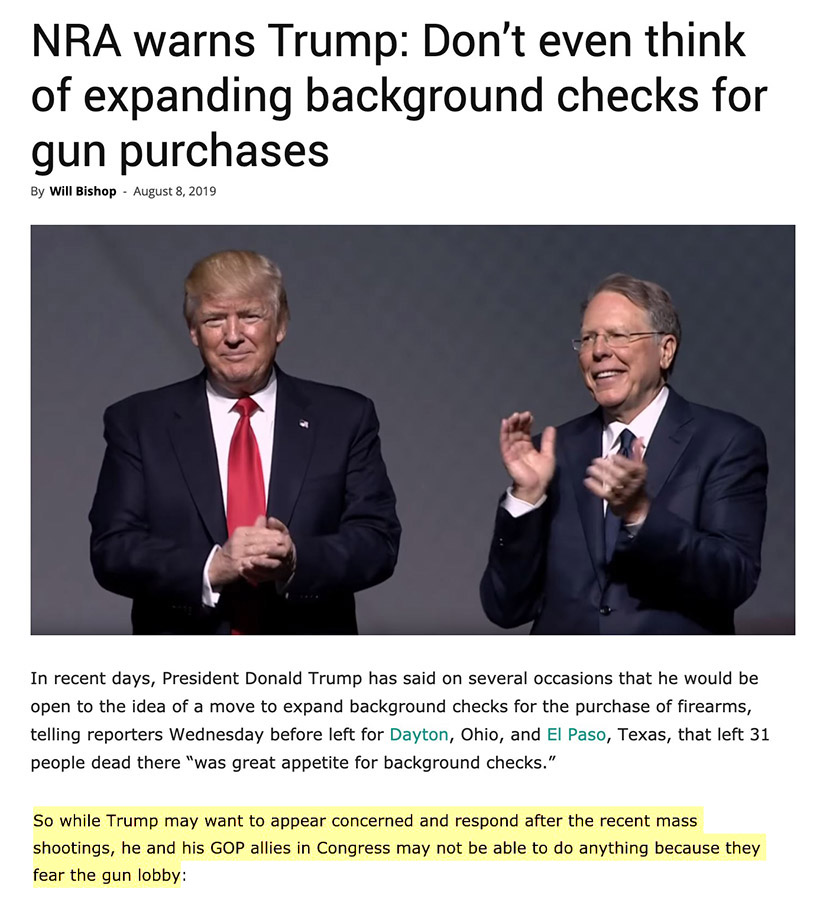
NRA warns Trump: Don’t even think of expanding background checks

NRA warns Trump: Don’t even think of expanding background checks
Interactions between advocates and officials in Washington are combative as lobbyists try to strong-arm politicians with money and threats.Christine Mahoney 2008
Brussels Versus the Beltway
Incumbents can amass huge war chests to scare off opponents.Suzanne Robbins 2018
Money in elections doesn’t mean what you think it does
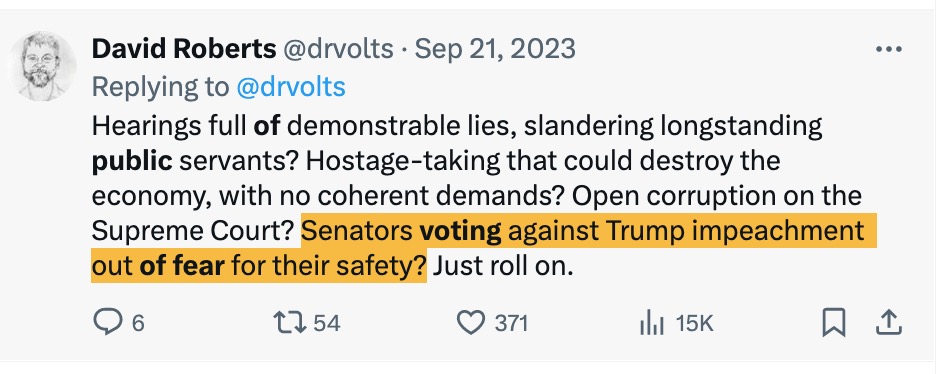
David Roberts 2023 - "Senators voting against Trump impeachment out of fear"

David Roberts 2023 - "Senators voting against Trump impeachment out of fear"
The name EMILY is an shortened acronym for the saying “Early money is like yeast - it helps the dough rise,” a tribute to the fundraising convention that receiving large amounts of early donations helps scare off challengers and attracts later donors.Christina Carr 2010
Monetary Oppression
By flogging their bosses (legislators) with the broken chains of accountability, police escape punishment.James D’Angelo 2020
How Lobbying Killed George Floyd
There are people who believe that negative campaigning in American politics is base, unnecessary and harmful to democracy. These people are naive and foolish. Negative campaigning is woven into the very fabric of all politics. Zach Carter 2016
Machiavelli Would be Disappointed
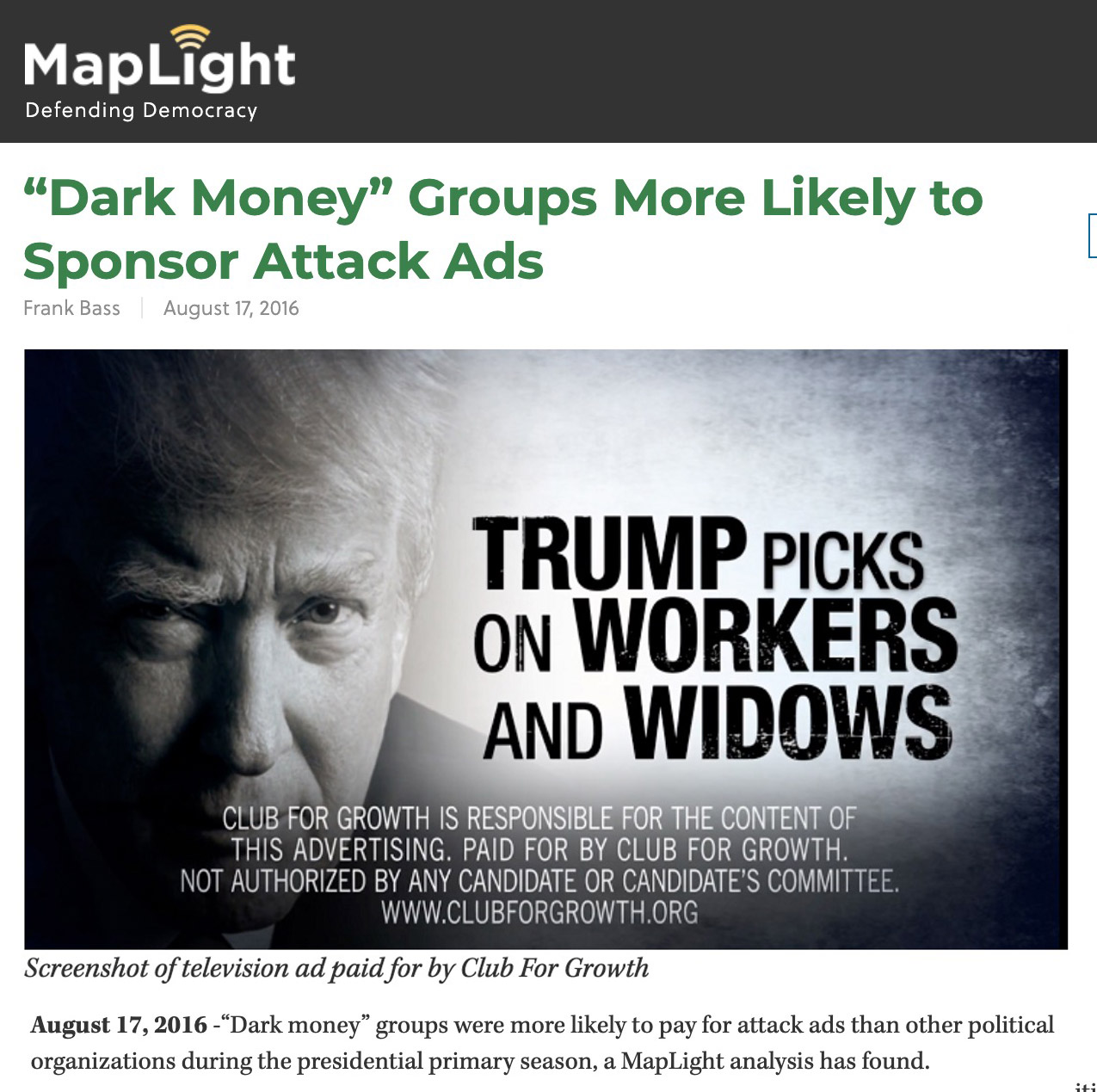
“Dark Money” Groups More Likely to Sponsor Attack Ads

“Dark Money” Groups More Likely to Sponsor Attack Ads
Negative campaigning is hardly a new phenomenon. It has almost certainly existed for as long as there have been political campaigns.Travis Ridout & Samuel Rhodes 2017
Negative Campaigning
We always knew that the Legislature was ruled by fear — fear of the House speaker and Senate president, fear of lobbyists who could withhold precious “donations,” fear of public worker unions that have the ability to mobilize thousands of voters.The Patriot Ledger 2009
It’s no mystery why legislators kowtow to public employee unions
The transformation of election laws, and the sheer amount of money spent on races, have in the last decade thrown a tremendous advantage to business, which has the power to dominate the airwaves with attack ads.Alyssa Katz 2015
Influence Machine: Chamber of Commerce and Corporate Capture


